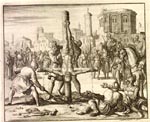

















TLW's Popescope™: Historyscope of the Roman Catholic Popes |
By T.L. Winslow (TLW), the Historyscoper™ |
© Copyright by T.L. Winslow. All Rights Reserved. |
Original Pub. Date: July 1, 2012. Last Update: Apr. 21, 2025. |

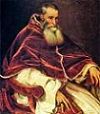







Westerners are not only known as history ignoramuses, but double dumbass history ignoramuses when it comes to the Roman Catholic popes. Since I'm the one-and-only Historyscoper (tm), let me quickly bring you up to speed before you dive into my Historyscopes.



30-40 Sorry, historyscopers, but? --it happens in the Roman province of Judea; nobody knows for sure, and it depends on whom you want to believe; a riddle wrapped in a mystery inside an enigma, the greatest coverup in history; the Great Track of Time enters not only a Dark Alley but a Black Hole, becoming an endless source of powerful fiction claiming to be fact, with the dividing line very hazy until centuries later - oh my gosh, I smell an Emmy? While visiting the Jewish Temple in Jerusalem, Jesus made a point of attacking the moneychangers (Mt. 21:12, Mk. 11:15, John 2:14-15), I wonder why?
Way back when, nobody knows, a bunch of Roman pagans got infected with monotheism, and the most bookish kind, Judaism, and despite the Jews claiming to be the Chosen People, with pagans not invited, they managed to morph exclusivist Judaism into a new one-size-fits-all version by literally twisting the Jewish Bible inside out and claiming to discover that it was there all along, but needed a prophet to reveal it to them, whose life only they can tell us about, since nobody but believers documented it, a strange wonderful brew of historical facts and unverifiable miracles.
The net result was a new religion called Christinsanity, er, Christianity, whose Aramaic-speaking Jewish founder Jesus Christ (-4 to 33) left no writings, works of art, statues, buildings, swords, armor, bling, portraits, descendants, or even newspaper accounts, worse, no body, because he was allegedly resurrected from the dead by God on Easter, visiting his believers for 40 days before being translated to Heaven, and now sits at God's right hand waiting to return and judge the world and everybody who ever lived, leaving it to his 12 Apostles to spread the word that he wasn't just a man but the Son of God, whatever that means, most followers apparently taking him for God himself, despite the intractable philosophical difficulties that rocked the Church for centuries.
Okay, he is God, who loved the world so much he gave his only begotten Son, that whoever believes in him won't perish but have eternal life (John 3:16), that is, as a man Jesus came to try to tell people that one day God will end the world, and that as God he himself judge everybody who ever lived, giving them either eternal death slash punishment, or eternal life slash joy, based on whether they ever sinned. Of course, everybody Jesus met already was covered in sin and deserved eternal death, but he promised them that if they truly repented their sins, died to the world and its sins and got born again as a child of God, then got baptized to symbolize their transformation, and sinned no more, when the Day of Judgment came he would suspend their sentence for their prior sins and admit them to eternal life, else he wouldn't, case closed, next case (1 John Ch. 3). As he went preaching, his number one message was sin no more, sin no more, read my lips, sin no more (John 5:14, 8:11).
So the original message was very direct and simple: repent your sins, and sin no more, and run the good race hoping for the crown of eternal life, no matter how much the Devil tempts you to sin or the world persecutes you, lions in the arena, no problemo. Oh yes, you get sent the Holy Spirit or Holy Ghost, which will put a shield around you so that the Devil can never make you sin, only tempt you, yes, you can go your while life without lying, coveting, committing adultery even with the eyes, and following after other gods, every possible sin worthy of death is covered in the Ten Commandments, one part of the Bible that's pure legalese and easy to translate. But you'll have to give up the world and its lures, because one day God will burn up the world and all its works (2 Peter 3:10), including history itself, and create a new heavens and a new earth, where only the worthy may reside (Is. 65:17).
To become a Christian ("little Christ") and live with Christ forever in his Kingdom of Heaven, believers must take everything about him on faith, which is good since they don't have to learn Aramaic or any history other than that in the Hebrew-Aramaic Old Testament and the Greek New Testament, consisting of the Four Gospels (Matthew, Mark, Luke, and John) and the Acts of the Apostles, and no theology other than that in the Epistles of Paul, Epistles of Peter, Epistle of James, Epistle of Jude, and Epistles of John, or any eschatology other than that in the Book of Revelation (Apocalypse), then undergo Baptism, never mind if it's totally incomprehensible. According to the New Testament, there's no need to study theology and wow Judge Christ by passing a final exam, because all you need to do is sincerely repent your sins (as defined by the Ten Commandments) and quit sinning, keep it simple stupid. But it's also bad, since it's all too easy to take Christ as a fable that was created just to support a fat and wealthy clergy class, it's doesn't take a Karl Marx. In practice, there were soon many backsliders who fell away and went back to a life of sin, and apostates who denied their faith under persecution, and the Bible was quick to tell them that if they blasphemed the Holy Spirit that was sent them when they got baptized and which protected them so that the Devil could never make them sin, and began sinning again, making them into children of the Devil, there would be no chance for a second repentance, because that would be to ask Christ to be crucified a second time, putting him to "open shame" (Mk. 3:29, Heb. 6:4-6).
This all pushed believers' hot buttons in the first century, the second century, even the third, but eventually the church developed a hierarchy, and the bishops at the top got to thinking that maybe Christ would never come back to judge the world because he was indeed a beautiful fable just designed to give them a good living off the baptized suckers, and began modifying the original formula into what's been common ever since, namely, the Devil's Religion: just join the church, let it save and baptize you, then keep paying it tithes, and you can go on sinning all your life because you are "saved" and have a pass. Of course, the Devil wants all his worshipers to believe they are saved FROM the Last Day and the Judgment Seat, and get instant transportation straight to paradise, and if you're aren't ready yet to worship him in all his evil Satanic glory, he can easily appear as an angel of light to make you feel good about it (2 Cor. 11:14), ask Muhammad and Joseph Smith, or any pope.
Sorry, but the whole point of the New Testament was to show that Christ came the first time as a savior, but will come a second time as a judge, and his forgiveness is dependent on conditions, namely, repent of your sins and sin no more, it's like a bankruptcy that gives you a clean start, you can only do it once, what do you think the judge has on his forehead, the word Dumbass. If it's not a fable then you have a summons and court date, and when you face Judge Christ naked and alone clothed with sin, sorry, he already walked a mile in your shoes and lived a far more difficult life without sinning, so he will tell you to go with your father the Devil to the Lake of Fire, where you will suffer eternally in the knowledge of being cut off from God forever. Your precious world you sold out to is burned up, there isn't even any air to breathe or ground to walk on, much less pot to piss in, and Christ's court is the ultimate Supreme Court, because he is God himself, and it'll all be done in the twinkling of an eye and there is no appeal and instant satisfaction of judgment by his bailiffs the angels, it's a Roman type court where the judge is prosecutor and defense attorney at the same time, you get perfect due process, fuck the ACLU it went to you know where.
That's the beautiful story, fable or fact, we can't know until the Last Day, if there is one. The reality of the Roman Catholic Church, of course, as we shall see, was that it was taken over by the Devil, who twisted it all to the nth degree, making the bishop of Rome the pope, who has the keys of Heaven and Hell in his hands, and can alone save you as long as you kiss his hand and other body parts, voila, the Church of the Devil that has attempted to rule the world forever. To make up for the fact that you never stop sinning, they developed the Mass where Christ is crucified for you fresh, and you eat his body and drink his blood to order like a fast food meal. One of the first big signs of its corruption was their readmittance of apostates after each persecution ended, apostates who pay their tithes that is, that's why they call it the Catholic Church, Catholic means everybody is in, as well as all their sins, they're all in, along with all their filthy lucre, bwahaha, the Devil is insuring that when the real Day of Judgment arrives nobody will be saved because Christ will decide they're all his children not sons of God. Of course the Church bet on Christ never coming back, and it's been 20 centuries, no wonder it is the richest and most corrupt outfit in the world, thanks for the memories. As for the Protestants, they started by breaking off from the Church when its corruption went over the top, but they all kept the Devil's religion of claiming their churches save people, and/or that they can go on sinning and remain saved as long as they pay their tithes, in other words, they serve Mammon rather than God and are all sellouts (Mt. 6:24). The Bible says you can be born again, but it doesn't allow you to go around saying you've been saved, since only at the Last Day will Judge Christ decide that, thus by going around claiming you're saved you're sinning by lying and taking the Lord's name in vain, and insuring you won't be, pass the popcorn.
Speaking of persecution, from the start the Jewish priests hated this blasphemous Jewish sect, which according to the Gospels made them plot to get Jesus (but stangely not his disciples) arrested and crucified by the Romans for sedition, and the tolerant polytheist pagan Romans finally had enough of them too when they refused to worship the Roman emperor as a god like every other good citizen, labeling them as atheists and traitors, and forcing the cult underground, where they mainly recruited slaves but eventually penetrated the upper classes. The spectacle of Christians being fed to wild beasts in the arena while filled with joy at the prospect of being with Christ was a powerful recruiting tool, ask Denver Broncos quarterback Tim Tebow why he paints John 3:16 on his face. Too bad, the early personalities and their organization are shrouded in mystery, leaving us mainly with the New Testament, and the takeover of the Roman Empire in the 4th cent. by the monomaniacal intolerant Roman Catholic Church gave them the opportunity to destroy, alter, or manufacture historical records, so it's one of the greatest coverups in history and we can only hope for glimmers of light and cast theories about what really happened, sorry.
Talk about coverup, the disturbing parallels between Christianity and pagan Sun worship make many suspect that Christ was a fictional figure pasted together by brainy Jews based in some library in Alexandria or Babylon out of twisted Old Testament texts foretelling the Jewish Messiah, who was supposed to conquer the world and make everybody love Jews, but obviously hasn't shown up yet, unless it was him, get it? Why would Jews conspire to foist a fictional religious founder on the pagan Roman Empire? Answer: Jews don't get mad, they get even, and this time it was for destroying Jerusalem along with its Temple and priesthood in 70 C.E. and causing the Jewish Diaspora. If that was their goal, they achieved it in spades, turning the mean cruel blood-loving superior united pagan Romans into guilt-ridden ever-schisming ever-backsliding Bible-thumping Christian whimps who were easy meat for the hordes of barbarians, tanking the once all-powerful Roman Empire in 476, and giving the wandering Jews a chance to return and restore the Jewish nation of Israel based in Jerusalem, complete with Temple and priesthood, maybe king, ask Mel Gibson about it when you catch him drunk.
Too bad, it's hard to imagine how these fiction authors could palm their writings off and get enough believers to fill a donkey cart, unless they posed as believers and made a career of it, risking persecution, which doesn't compute. Also too bad, there seems to have been a community of Christians before the writings even came out. Also too bad, by 476 the Roman Empire had split into two halves, and the Eastern Roman Empire that controlled Israel stood strong, keeping the Jews out like always. Also too bad, despite displaying a deep knowledge of the Old Testament, the New Testament doesn't read like it was written by Jews, treating them as an alien race who brought their troubles on themselves by rejecting you know who, although he was also a Jew and Christians must worship him as their Savior, what pretzel logic. No surprise, belief in Jesus Christ and respect for the Jewish Old Testament like he had didn't make former pagan Roman Christians automatically love Jews, but backfired, turning many into rabid anti-Semites, some even claiming to be the real "spiritual Jews", with the Roman Catholic and Greek Orthodox Churches both worked to keep the Jews from returning to Israel unless/until they accepted Christ, guess why the Muslim Quran displays a deep knowledge of the Old Testament and Talmud, the pretzel the pretzel the pretzel is twisty, and Christians are the salt of the Earth.
Either way, the Old Testament started it all, and the Jewish Messiah's Mission: Impossible isn't done yet, which Christians explain away as the need for the Jews to finally accept Christ before he returns to judge the world, although in the Jews' thinking that would make them into blasphemers who would face damnation by God. Yet now after 2K years, if Jesus wasn't the Messiah, why do Jews still believe in one, those stiff-necked losers? After the WWII Holocaust, why do any Jews still believe in God anyway, it was mainly atheist Jews who restored the state of Israel in 1948 after chucking the Old Testament? And after 2K years of Christ never returning as promised, how can a Christian still believe in this deadbeat dad, the umpteenth recycling of the Book of Revelation and photos of the Shroud of Turin? Oh yes, they talk to Him all the time, and that's all they need.
On top of all that, Christendom schismed a thousand ways to Sunday over the centuries, and got convolved with the government and its police and military power, getting mixed up with injustices and atrocities that stunk it up, maybe one of the sects is the true one, if Christ returns he'll tell us. The bottom line is that it takes a big brain just to attempt to straighten it all out.
Speaking of big brain, this Historyscope will concentrate on the main trunk, the Roman Catholic Church and its Rome-based papacy, and help you see all the key map points and their relation to the main sects, since this is the only way to start historyscoping them anyway.



Allegedly the first pope (30-67) was Simon Peter, AKA St. Peter (-1 to 67), a Galilean fisherman recruited by Jesus Christ along with James and John near Capernaum at the Sea of Galilee (Matt. 4:18-22; Mark 1:16-20; Luke 5:1-11). After allegedly being given the Keys to the Kingdom of Heaven (forming the basis of all later claims to papal authority) by Jesus, he was crucified upside-down at his own request, grab your bag it's on. "Behold he received the keys of the Kingdom of Heaven, the power of binding and loosing is committed to him, the care of the whole Church, and its government is given to him." Way later St. Peter's Basilica in Rome (largest Christian church in holding capacity, 60K) was built in the shape of a key.




Pope #2 (67-76) was St. Linus, who forbade women to enter a church with their heads uncovered (very Jewish of him), and allegedly created the first 15 bishops (all male). Did they really have bishops back then, or did this function arise much later, corrupting pure Christianity, which relied on a government by elders not bishops, after which they attempted to rewrite history, beginning the Church's downward slide? Pope #3 (76-88) was St. Anacletus (Cletus) (Gr. "one who has been called [back]"), who was martyred after drawing up the rules for consecration of bishops and ecclesiastical dress, making him the Ru Paul of popes.

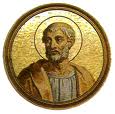


Pope #4 (88-97) was (St.) Clement (Lat. "mild", "giving mercy") I (d. 97) (allegedly consecrated by St. Peter), the first Apostolic Father of the Church, who wrote 1 (& 2) Clement to the church in Corinth, asserting the authority of presbyters (elders), and also instituted the use of the word "amen" (Heb. "truly, certainly, may it be so") into religious ceremonies. He was the first bishop of Rome for which definite evidence exists, and died by being thrown into the Sea of Pontus with an anchor around his neck by order of Trajan, who heard the rumor about their god walking on water. Pope #5 (97-105) was (St.) Evaristus (d. 105), who divided Rome into parishes, and instituted the lucky 7-member College of Cardinals. By the early 100s the Christian communities were becoming divided into episkopoi (supervisors) (bishops) (papas), presbyteroi (elders), and laikoi (laity) (sheep).



We're up to Pope #6. Call it a coincidence, but about 96 C.E. I'm so smart that I thought you were my son? About 96 C.E. (before or after Domitian dies?) aged Christian apostle St. John the Evangelist (1-100), son of Zebedee and younger brother of James the Greater, former disciple of John the Baptist, called Boanerges ("sons of thunder") by Jesus along with James for their zeal, now pastor (bishop?) of Ephesus, exiled by Domitian to the 13-sq.-mi. rocky goat isle of Patmos in the Dodecanese off the SW coast of Asia Minor dicates the ultimate Millennium Feverist handbook The Revelation (Apocalypse) of (St.) John to his scribe Prochoros from the Holy Grotto (Cave of the Apocalypse) of Patmos, where Christ allegedly visits and/or sends an angel to visit his last surviving apostle and tries to explain why he isn't coming back as soon as they all thought, and in fact he himself doesn't know, only God?; the Seven Churches of Asia (Minor) in W Turkey are addressed, incl. the Church of Ephesus, the lukewarm Church of Laodicea;, the Church of Pergamum, the Church of Philadelphia, the Church of Smyrna, the Church of Thyatira (Thyateira), and the Church of Sardis; Ch. 20 starts up Millennium Fever (MF) among Christians, the belief that Christ one day will return to Earth, conquer the "Beast", cast Satan and his followers into the abyss for 1K years, and reign as king with the resurrected faithful becoming princes and priests; but that's not all; the test is repeated, and at the end of the 1K years Satan is let loose again for a short time to recruit new followers, then put they are all put in the Lake of Fire (the second death) forever, and by now all the dead are resurrected and judged, either to eternal life or the second death along with Big S; Rev. 13:18 starts 666 Fear (hexakosioihexekontahexaphobia), the horrible-but-cool hangup that there's just something beastly about the Roman number DCLXVI (the first six Roman numerals written from largest to smallest), the idea of man (6) striving to become God, or create a trinity (666), and falling short of perfection (7), which requires the final Roman numeral M (messiah)?; some claim that Roman emperor Nero ("Neron Qesar") is meant because some mss. have 616 instead of 666; believers in the coming Chilling Millennium become known as Chiliasts; after too many of these false alarms cause all hope to be placed on the year 1000, and it proves a bust too, they switch to 1000 plus permutations of 6, 66, and 666, even using month #6 June as one of the magic keys to the big date, even though it said name not date, and some ancient mss. have 616 not 666, which not coincidentally is all the Roman numerals in order MDCLXVI, oops, no M, that's reserved for the real Messiah; call it a coincidence, but the Arabic Symbol for Allah looks a lot like the Greek letters for 666; (after returning to Ephesus?) John also writes the Gospel Accordin to John and the Three Epistles of John about this time; actually John's name is never mentioned in the Gospel According to John, but it gets attributed to him by tradition; in the Gospel of John Jesus never utters parables, but instead performs signs, and never casts out demons; in contrast to the Synoptic Gospels, which concentrate on Jesus' doings in Galilee, it concentrates on his doings in Judea and Jerusalem, displaying a first-hand knowledge of the geography prior to the Jewish Revolt of 66, and seems to show a knowledge of an ancient tradition independent of the other gospels, leading many scholars to consider it the most reliable of the four; the only gospel to describe Jesus' turning of water into wine at the wedding in Cana (2:1-11), his conversations with Nicodemus (3:1-21) and the Samaritan woman (4:1-42), and the raising of Lazarus in Bethany (ch. 11), along with the Holy Lance of Christ (spear stuck in his side to prove that he's dead after only three hours on the Cross, when most last a day or more, and despite a corpse being unable to pump blood out with a dead heart) (19:34); the only one to describe the role of Nicodemus in Jesus' burial (19:39); the only one with vocabulary not used in the rest, esp. the Gnostic-like talk in the Logos Passage (John 1:1-18): "In the beginning was the Word, and the Word was with God, and the Word was [a?] God. He was in the beginning with God. All things were made through Him, and without Him nothing was made that was made...", creating the eternal Arian vs. Athanasius Controversy: in the beginning of God's Creation did he first create the Word AKA Christ (Love?), then use him to create all else, hence Christ is a created being not God, or was the Word there in the beginning with God, thus is God, even though God has no beginning, and is eternal and uncreated?; so, as the 1st cent. ends, despite the skimpiness of history, God spoke and laid out the complete Plan of the Man in the New Testament; the whole point of Christ is to suspend God's judgment of eternal death on truly repentant sinners (Mk. 2:17, Acts 17:30) by coming the first time to save them (John 3:15-18, John 12:47) and the second time to judge them (Acts 17:31, Heb. 9:28), which is why he tells everybody that his blood will pay for their sins prior to conversion (Heb. 9:11-28), but afterwards to sin no more (John 5:14, 8:11), because sin (violating the Ten Commandments incl. having other gods, taking the Lord's name in vain, lying, stealing, coveting, murdering, committing adultery even with the eyes, etc.) is voluntary, and Christians will be sent the Holy Spirit to keep them from temptation and never sin again (1 John 3:1-10), but those who fall away are out of luck because Christ can't be crucified a second time (Heb. 6:4-6), and blasphemy against the Holy Spirit is unforgivable (Matt. 12:31-32); too bad, some Christian sects have the idea that they can get "saved" and continue sinning, when actually nobody is saved yet, because only at the End of Days will Judge Christ AKA God in Human Form open his court to judge us (Heb. 9:27), and going around claiming to be saved is sinful, taking the Lord's name in vain and lying?; the ultimate Supreme Court, the judgment is either entrance into the Kingdom of Heaven (Mt. 5:19-21, 8:11), or being cast by angels into the Lake of Fire (Rev. 20:15); maybe it's all a fairy tale, but the punchline is that nobody can be sure until they're dead, what a sales pitch.

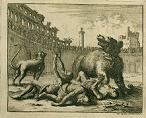











Back to the non-papal Christian Church founders. St. John's disciple St. Polycarp (69-155) of Smyrna (Izmir), Turkey was also a key figure, followed by St. Justin the Martyr (100-165), then his pupil Tatian the Assyrian (120-180), who wrote the Diatessaron, a harmony of the One and Only Four Canonical Gospels, long before Evil Roman Emperor (306-37) Constantine (Gr. "steadfast") I (the Great) (Flavius Valerius Aurelius Constantius) (271-337) allegedly suppressed the "real" gnostic gospels and made them the ones, sorry Dan Brown. Tatian was the first to declare that God created matter by the power of the Logos, with the soundbyte "The Logos, begotten in the beginning, begat in turn our world, having first created for himself the necessary matter." Next we might mention St. Irenaeus (125-203) of Gaul (France), North African Berber Tertullian (160-220) (who coined the term "Trinity"), Origen (182-253) of Alexandria, Egypt, Eusebius of Caesarea (260-340), and later St. Ambrose of Milan (337-97), North African Berber St. Augustine of Hippo (354-430), and St. Jerome (347-420) of Pannonia (Hungary).






Pope #6 (105-115) (St.) Alexander I (d. 115) was a disciple of Plutarch, who was beheaded by the Romans on the Via Nomentana outside Rome. In 113 Pliny the Younger, Roman gov. of Bithynia wrote Letters to Emperor Trajan asking what to do about the !*?! Christians, and describing how he tortured two ladies and they wouldn't give the stuff up. Pope #7 (115-25) (St.) Sixtus (Xystus) I (-125) just had to get the 666 Thang mixed up in his name, right, please do kill me. Pope #8 (125-36) (St.) Telesphorus (-136) was a Greek who composed Gloria in Excelsis Deo, and instituted the 7-week fast before Easter, making him the Richard Simmons of popes, call it a telethon, which was a big success since he was martyred,




Pope #9 (136-40) was Athenian Greek (St.) Hyginus (d. 140), who hygenically formalized the hierarchy and its privileges, ordered that all churches be consecrated, and instituted the use of godparents at baptism. In 139 he became the first bishop of Rome to adopt the title of Papa (Pope), but was laughed off, although he was martyred. Actually the title of papa was applied to all bishops until 425? Pope #10 (140-55) (St.) Pius I (d. 155) was the first to use the word "Mass", the pious do like their Mass.

In July 144 self-made Black Sea shipowner (2nd cent. Bill Gates?) Marcion of Sinope (85-160), who moved to Rome, gave a huge donation to the Church, and spent five years there studying, preaching, and writing, becoming an Apostle Paul fan, presents his new Marcionite Doctrine, showing how the bald contradictions between the gods of the Old and New Testaments, combined with Paul's statements that faith and not law saves, proves that the Old Testament Jehovah (El) (Israel) is really the Devil, and that the Old T should be thrown out, shocking the Roman Christians, who kick him out and refund his money, after which he compiles the first Canonical List of Scriptures (10 of Paul's 13 epistles, excluding the "pastoral" epistles 1 & 2 Timothy and Titus), plus the Gospel of Luke, with all references to Jehovah and the Law edited out); after he is excommunicated by Pope Pius I, he founds his own Christian Marcionite sect, which lasts until the 5th cent.; this all causes the Church to work harder to fix its own NT canon.

There was year gap till the next pope was elected, during which time in 156 bishop St. Polycarp (69-156) of Smyrna (modern-day Izmir) (seaport in W Asia Minor N of Ephesus at the crossroads of Asia and Europe, with the biggest agora in the Roman world) was martyred by the Romans in the stadium after he refused to burn incense to the emperor and repeat "Caesar is Lord", saying, "86 years I have served Christ and he never did me any wrong. How can I deny my king who saved me?"; after a voice from heaven says "Be strong, Polycarp, play the man", he insists on being tied not nailed to a stake, and they burn him, but he supposedly remains untouched, so they use a sword on him, and his blood puts out the fire, causing martyrdom to become PC among Christians, generating thousands of willing new martyrs; he leaves the 14-chap. Epistle to the Philippians, about a case of embezzlement of church funds, which quotes a hundred earlier Christian writings and only a dozen Hebrew scriptures, and refers to Paul's Epistle to the Ephesians as scripture?; The Martyrdom of Polycarp becomes a bestseller, causing martyrologies to take their place alongside apologies as a favorite Christian writing pastime.
Also in 156 Christian nutcase prophet Montanus declared himself to be the "Spirit of Truth" (the personification of the Holy Spirit in the Gospel of John), and gathered a bunch of followers, incl. a pair of "prophetesses", who had holy visions and ecstasies from Lesbos, er, God, and began preaching the "Third Testament" and the "New Jerusalem", which will descend from heaven to Montanus' home town of Pepuza, Phrygia, causing true blues to flock there.






Before being martyred, Pope #11 (157-66) (St.) Anicetus (d. 166) decreed that priests should not have long hair - like Jesus? Pope #12 (166-175) (St.) Soter (d. 175) declared matrimony a sacrament only if blessed by a priest, and prohibited women from burning incense during the congregation of the faithful - pervert, dirty old man? Lucky martyred Pope #13 (176-89) (St.) Eleutherius (-189) (a Greek) abolished the observance of Jewish kosher food customs - treyf is cool, time for some bacon and eggs, ham, perhaps a little blood pudding?

They worship the Marlboro Man? In 177 Smyrna-born (St.) Irenaeus (125-203) was appointed bishop of Lugdunum (Lyons) to attempt the conversion of the Druidic Gauls, and goes to Rome to plead with Eleutherius to deal with the ascetic Montanist movement in Phrygia, which extols virginity, uses Hebrews 6:4-6 to claim that sins committed after baptism cannot be forgiven, and whose prophets go into ecstasy and speak with God's voice in the first person, claiming to supersede the Gospels, which later turns on Romanized Carthaginian Tertullian (160-230), who becomes a Montanist and writes De Ecstasi; followers of Eastern Christianity are driven across the English Channel during the persecutions of Lyons, carrying it with them and founding the Celtic Church in Britain, which takes until 1172 to conform with the Roman Catholic Church in rites and ceremonies (664 in England, 1153 in Scotland and Ireland).

She loves you, yah yah yah yah? About 180 Smyrna-born Bishop Irenaeus of Lyons (130-202) writes Against (the) Heresies (Refutation and Overthrow of Gnosis, Falsely So Called) (5 vols.), which accuses Marcion of Sinope, Valentinus and other heretics of the One Gospel Fallacy, i.e., sticking to just one gospel to justify their misguided doctrines, the Jewish Christians sticking to Matthew, the Marcionists to Luke, the Christ-denying Gnostics to Mark, and the Valentinians to John, using Ezek. 1 to solve the equation, with the immortal soundbyte: "It is not possible that the Gospels can be either more or fewer in number than they are, for since there are four courners on the Earth in which we live, and four principal winds, while the Church is scattered throughout the world, and the pillar and ground of the Church is the Gospel... it is fitting that she should have four pillars" (3.11.7); Irenaeus then stokes Millennium Fever with the suggestion that since 6 precedes the perfect number 7, the number 666 embodies the original, present, and final revolts against God, while Jesus' number in Greek is 888 (5.28.2); Irenaeus also becomes the first writer to name the Four Evangelists (me, myself and Irenaeus?), causing later Christian paintings to show the four Gospel writers in the four corners (of the painting) as an angel (Matthew), lion (Mark), bull (Luke) and eagle (John); he denounces the 13-page papyrus Gnostic Coptic Gospel of Judas, "The secret account of the revelation that Jesus spoke in conversation with Judas Iscariot", which claims that Judas was the only disciple who understood and followed Christ (who mocks the others), and that Jesus actually asked Judas to betray him, and that therefore he's one cool dude; "Step away from the others and I shall tell you the mysteries of the kingdom"; "Look, you have been told everything. Lift up your eyes and look at the cloud and the light within it and the stars surrounding it. The star that leads the way is your star"; "You will be greater than all the others, Judas. You will sacrifice the man that clothes me"; "You will be cursed by the other generations - and you will come to rule over them"; a Coptic language copy dated to 280 is lost in the 4th cent., discovered in 1970 in a cave near El Minya, Egypt, put in a safe deposit box until it begins to deteriorate, and finally pub. in English trans. by the Nat. Geographic Society in Apr. 2006; written at a time when the Romans were killing Christians while the Christian bishops actually encouraged martyrdom, the whole thing is aimed at stopping their own bishops by guilt-tripping them?


Pope #14 (189-98) (St.) Victor I (-198) (first African pope) (first Christian author to write about theology in Latin) struggles to have Easter celebrated according to the Roman (solar-based) (first Sunday after the first full moon on or after the vernal equinox) instead of the Jewish (lunar-based) (Quartodeciman) rite. In 190 a Christian council called by him fixes the following Sunday as the day to celebrate Easter, rather than the 14th of Nisan; when the churches of Asia Minor refuse to change, he excommunicates their bishops - a victory for the Sun of God. In 197 Pope Victor debates with Polycrates of Ephesus, metropolitan of proconsular Asia over the Quartodeciman observance of Easter on the Jewish Passover, demanding that they observe it on Sunday.

In 197 despite Christ not returning as soon as he seems to have promised, Romanized pagan lawyer from Carthage Tertullian (160-230) converted to Christianity (probably aided by the spectacle of the Christians in the arena) and immediately began vigorously promoting it, becoming the first to call it the "true religion" (vera religio); his writings coin the terms sacrament, resurrection, trinity, person (in the trinity), substance, and New Testament, and gave Christianity a new lease of life by being the first written in Latin; too bad, he began speaking out against classical culture and Roman power, drawing the 3rd cent. persecutions? - and if he was black, back atcha?





Pope #15 (198-217) (St.) Zephyrinus (-217) died a martyr on Dec. 20, 217. The election of Pope #16 (217-22) (St.) (Calixtus) Callistus (-222) caused a schism, and (St.) Hippolytus of Rome (170-235) became the first antipope (rival claimant), and the only antipope to be canonized - you're a winner not a hypocrite?








On Oct. 14, 222 Calixtus I was martyred with clubs, and Pope #17 (222-30) (St.) Urban I (-230) was elected, soon justifying in an epistle the ownership of property by the formerly communistic Church, along with the elevation of bishops and the excommunication of heretics - the beginnings of Church wealth and power, and keeping people down in, you guessed it, 666 divided by the Holy Trinity. Pope #18 (230-5) (St.) Pontian (Pontianus) (-235) ordered the chanting of the Psalms and the recital of the Confiteor before death, and the use of the salutation "Dominus vobiscum". Pope #19 (235-6) (St.) Anterus (Anteros) (d. 236) died on Jan. 3, 236 after reigning 40 days, after which on Jan. 10, 236 Pope #20 (236-51) (St.) Fabian (Fabianus) (-251) was elected after a dove landed on his head during a brainstorming session of brethren.




In Jan. 251 the 15-year Cyprian Plague (ends 266) began, killing up to 5K a day in Rome, pissing off Roman Emperor (249-51) Decius (Gaius Messius Quintus Traianus Decius) (201-51), and causing him to blame the Christians for failing to recognize him as divine and incurring the wrath of the gods, launching the Decian Christian Persecution, the first gen. empire-wide persecution in their history, incl. all who will not sacrifice to him, incl. St. Fabian, who was martyred on Jan. 20; the "persecution" was a law requiring all citizens to sacrifice to the state gods and to be in possession of a libellus, a certificate from a temple confirming the act - you have to carry a libel around with you that says you're a pagan doomed to Hell or you die? Pope #21 (251-3) (St.) Cornelius (-253) took a lenient course with the lapsi, causing rival Novatian (-258), the first Roman theologian to use the Latin language to become the 2nd antipope, becoming more strict about lapsi (turncoats) than Cornelius, who excommunicated him, after which his followers set up the sect of Novatianism, which lasted for cents. Pope #22 (253-4) (St.) Lucius I (-254) was succeeded by Pope #23 (254-7) (St.) Stephen I (-257), who ordained that vestments used for ecclesiastical purposes not be used for daily wear.
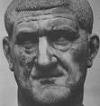



In 257 Roman Emperor #40 (253-60) Valerian (Publius Licinius Valerianus) (193-260) began the Valerian Persecution of the pesky Christians with two edicts in the same year, the 1st commanding them to sacrifice to the pagan gods, the 2nd ordering the execution of all bishops, priests, and deacons; on Aug. 2, 257 Stephen I was beheaded on his pontifical chair in the Catacombs of St. Callixtus, and on Aug. 30 Pope #24 (257-58) (St.) Sixtus II (-258) (a Greek) was elected, then martyred on Aug. 6, 258 by Roman soldiers while holding an illegal assembly in a cemetery along the Appian Way; his office remained empty for two years. Pope #25 (260-8) (St.) Dionysius (Denis) (-268) called a synod in Rome which condemned Sabellianism, they were breeding like mice in the pantry. Pope #265 (269-74) (St.) Felix I (-274) started the custom of burying martyrs under church altars and celebrating Mass on their tombs.



Pope #27 (275-83) (St.) Eutychian(us) (-283) was succeeded by Pope #28 (283-96) (St.) Caius (Gaius) (-296), who was succeeded by Pope #29 (296-304) (St.) Marcellinus (-304).


On Feb. 23, 303 the Diocletian (10th) Christian Persecution, the last and most terrible (to hear them talk?) was officially declared by Roman emperor (284-305) Gaius Aurelius Valerius Diocletianus (Diocletian) (236-316) (by Galerius?); too bad for pagans, Constantius slacked off in his Western prefecture, finally stopping in 306, although it continued in the East until 313; wealthy Christians in N Africa merely had to surrender their scriptures, causing the poorer Christians to call them traitors and lobby to have them permanently excommunicated; St. Pantaleon (b. 275) (Gr. "all compassionate") was allegedly martyred in Nicomedia, Bithynia.

In late 306 Pope #30 (306-8) (St.) Marcellus I (-308) was elected, having to deal with the problem of pardoning those who had abjured during the persecutions of the past four years until he was martyred on Jan. 16, 308.
Up to this point the Christian cult was virtually illegal, and the popes were heroes who stood up to great pressure, while the Roman Christian pop. was maybe 20%-35%, reaching a breakpoint where they had to be absorbed into the body politic or completely exterminated, like the Vietnam War era in the U.S., and even in the mean Roman Empire the relentless pressure of the barbarians at the limes (frontier fortifications) made it impossible to do number two, so no surprise, they found a way to have their cake and eat it to, pass the checkbook.

In July 306 Constantine I (the Great) (Flavius Valerius Aurelius Constantinus) (271-337) became Roman emperor, soon getting into a mortal fight with rival emperors, causing him to see his chance, yes he could do the math.


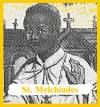

On Apr. 18, 310 Pope #31 (310) (St.) Eusebius (-310) was elected, getting into a catfight with Heraclius over the readmission of apostates that caused Roman Emperor (306-12) Marcus Aurelius Valerius Maxentius (279-312) to exile them both, after which Eusebius died on Oct. 21. On May 5, 311 Roman emperor (since 305) Galerius Maximianus (b. 250) died of a loathsome disease (cancer?) near Serdica after reversing his persecution of Christians and asking their god in vain for forgiveness. On July 2, 311 African native (probably white but blacks keep hoping?) Pope #32 (311-14) (St.) Militiades (Melchiades) (-314) was elected (2nd African pope), settling issues of fasting on Thursdays and Sundays; author of many hymns, Constantine I later gives him the House of Fausta (Domus Faustae) (Lateran Palace), where he constructed the first Basilica of St. John Lateran, becoming the official ecclesiastical seat of the bishop of Rome - maybe the black guy was the white guy's butler?
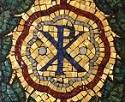
--it happens again, or, If you want them hippie dropouts to work for the system, give them a vested interest and they'll line up to get haircuts and helmets? In 312 Constantine I declared himself Augustus, invaded Italy from Gaul, and on ? defeated Maxentius at the Battle of Augusta Torinorum (Turin). On Oct. 27, 312, the night before Saxa Rubra (really sometime later and backdated as part of a govt. coverup?), while praying to Sol Invictus (the Unconquerable Sun), Constantine I allegedly had a Vision of Christ, who tells him to put the letters chi and rho (the Christian cross) on his soldiers' shields, saying "Hoc signo victo eris" (By this sign you will conquer), or "In hoc signo vinces", initials IHS, a contraction of the Greek spelling of Jesus with E changed to H, also the initials of Iesus Hominum Salvator (Jesus, Savior of Men); on Oct. 28 (Saxa Rubra) the Battle of the Milvian Bridge (Ponte Milvio) (Saxa Rubra) on the Tiber River near Rome sees Maxentius defeated and drowned by the heavily-outnumbered chi-rho-wearing soldiers of Constantine (who carries the Spear of Christ passed down from Roman soldier martyr St. Maurice?), after which the Roman Senate declared Constantine to be Augustus and pontifex maximus; in 315 the Arch of Constantine was erected between the Colosseum and the Palatine Hill in honor of the V, which was later celebrated by an annual horserace on July 5-7 called L'Ardia Di San Constantino; after this new voodoo caused his armies to be victorious, never mind the contradiction in killing for Christ, it was pagans killing pagans this time, Constantine I became sole ruler of the Western Roman Empire, and began making Christianity its official religion, with the Church as an organ of the state and himself as pagan pontifex maximus, what a politician, converting his mother Helena and breaking with previous emperors by adopting a youthful civilian image in official portraits; brought up in the monotheistic pagan Unconquerable Sun cult, going Christian isn't a big leap, esp. as he probably never understands any of its subtle doctrines, and becomes easy prey for manipulation by bishops; at least he thinks of himself as a Christian and spends the rest of his life trying to advance the Christian church in Rome, waiting to be baptized on his deathbed to wash away all possible sins; the Roman army numbered 500K-730K total, all pagan, but not for long. As the century wore on, paganism was systematically disenfranchised, persecuted, and robbed blind, until by 400 the entire Roman Empire was officially Christian, and it was illegal to be a pagan, although the majority really were pagan under the skin, no wonder that so many became hippie dropouts that wouldn't join the army or pay taxes, like the Christians used to be.
In Feb. 313 Constantine I and Licinius issued the Edict of Milan (Edict of Toleration), ending the Great Persecution, and making Christians eligible for public office, with allegedly neutral language such as "whence any divinity whatsoever in the seat of the heavens may be propitious and kindly disposed to us and all who are placed under our rule" and "we thought to arrange that no one whatsoever should be denied the opportunity to give his heart to the observance of the Christian or any religion which he should think best for himself", but in reality establishing Christianity as the de facto official religion of the Roman Empire, which is only 15%-20% Christian, but has a highly organized Church nursing centuries of grudges, and besides, the old emperor worship has failed miserably and is dying out, and the old glue that held Rome together was that all people, whatever other gods they worshiped, also worshiped the emperor, and them pesky Christians never would, so why not legalize it to get them into the system? (how else to get them tons of Christian hippies to quit protesting and dropping out, get that butch cut and join the military to fight for Rome than to stamp a big Red Cross on it and tell them to conquer in this sign?); at first the empire remains officially multireligious, and the bad habits of Christians are merely decriminalized, but the fanatical, intolerant Crucifixians are never satisfied, and once they get on the playing field they never stop working to get the tables turned on the pagans, and ultimately destroy them without mercy, but in stages, starting with the official Christian State Church granting them equal (but not really?) rights, and Constantine shifting imperial largess to Christian churches and favoring Christians in the govt., wooing the upper classes (if you know what's good for you, you will go with the new system?); the Basilica of Saint Paul Outside the Walls is built over the alleged burial place of St. Paul where followers had erected the Cella Memoriae memorial; now that the Christians are on the government dole, filthy lucre corrupts them like anybody else, and as a taste of the future there is at once a fight between the rigorist sanctimonious Donatists, followers of North African bishop Donatus Magnus of Casae Nigrae (-355) of Carthage, and the moderates over the lapsi, those who had lapsed during the years of persecution and want rebaptism in the faith, with Donatists wanting lapsi permanently excommunicated, esp. the priests, while the moderates believe that the office of priest not the priest's character gives sacrificial rites validity, and want all faithful to be members of the universal Catholic Church, not just saints; the dispute rages off and on until the 16th cent., with the Muslim invasions causing the Donatists to disappear from about 700 until the middle of the 11th cent., giving the Church time to solidify its power; the Synod of Rome in the Lateran Palace rules in favor of the moderates, but the Donatists appeal to Constantine I to keep his donations coming?


What's wrong with trying to get votes? No surprise, Pope #33 (314-35) (St.) Sylvester (Silvester) ("wooded") I (-335) became the first pope to wear a tiara. In 321 Archbishop Alexander of Alexandria convened a council which condemned and excommunicated his bishop Arius, who took refuge with Arian bishop Eusebius of Nicomedia (-341), a distant relation of Constantine I the Great, who had used his connections to get his promotions to bishop of Berytus (Beirut), Nicomedia, and later (338) Constantinople; Pope Silvester, who allegedly cured him of leprosy got Constantine I to make Sunday, the day of the Sun god Sol Invictus (official symbol the cross) the official Christian sabbath, exempted from being judicial, with its observance made a legal duty, becoming the first big step toward making Christianity the Hoover Vacuum Cleaner of the Roman Empire, absorbing all other pagan religions to get everybody to join and thus become "catholic" (Gr. "universal"); meanwhile pesky Bible-thumpers quote the Bible as proclaiming Saturday as the sabbath, but learned Catholics reply that Christ's resurrection changes it forever for Christians.




We come to the big year 325 C.E., the Tribus Unum (From Three, One) Year, which starts off with a shoe-banging Khrushchev type at the Catholic U.N. General Assembly, and turns into the biggest year in the history of Church doctrine. In 325 C.E. after trying in vain to get the warring parties to rise above their bitter Athanasius-Arius Controversy over the pre-existence of Christ and the Trinity (ultimately a theological dispute over homoousion vs. heterousion) (a purely Greek thang, which the Latins yawned off?) (an attempt to define levels in the godhead, a partial return to paganism?) (a mainly Egyptian thang, which softened Egypt up for Islam?) by citing the example of the wise Greek philosophers in a Letter to the Catholic Hotheads, Roman Emperor (306-37) Constantine I the Great (272-337), with the official title of pontifex maximus (maximum bridge-builder for the people to God and therefore equal to the apostles, giving him the right) convokes the first ecumenical (universal) (authority second only to Scripture) First Nicene Council (First Council of Nicaea) in Nicaea (modern-day Iznik) in Bithynia (NW Asia across the Bosporus Straits from his under-construction city of New Rome AKA Constantinople) on May 20-June 19, with the #1 goal of establishing the authority of bishops (as long as they are on the govt. dole and call the emperor boss?), presided over by his favorite (pro-Trinity) bishop Hosius (Osius) (Ossius) of Cordova (256-359) to decide the issue, with the Trinity side championed by archdeacon Athanasius (296-373) of Alexandria, and the anti-Trinity side by way older and higher-ranking presbyter Arius (250-336) of Alexandria, and Eusebius of Nicomedia (-341); James of Nisibis and a bishop from Persia attend; only about one-third (318) of the episcopoi (bishops) in the Roman Empire show up, with the attendants and servants beefing up the assembly to 1.5K-2K, which is conducted in Greek and presided over by the emperor, complete with his Roman bodyguard (although he is not a baptized Christian yet); the Church only sends seven official delegates, incl. two presbyters representing the bishop of Rome (pope); the debate goes on for 2 mo., with Arius uttering the immortal soundbyte: "The Son of God was a creature, made from nothing; there was a time when he had no existence; he was capable of his own free will of right and wrong; were he in the truest sense a son, he must have come after the Father, therefore the time obviously was when he was not, and hence he was a finite being", causing many to stick their fingers in their ears and run out, while St. Nicholas of Myra (270-346) hits him in the kisser; Eustathius the Great of Antioch (270-360) gives a great anti-Arian speech; finally Osius gets big-fish-in-a-small-pond layman (still really pagan and faking it?) Constantine in a back room and talks him into backing the T-side, and Der Fuhrer publicly announces that the bishops are free to vote any way their conscience dictates, only face deposition and exile to the butthole of the empire if they vote Arian; no surprise, Arius and his "Ariomanites" (Arians) are condemned by a 316-2 vote, which incl. 15 flip-flopping Arians, and 100+ Semi-Arians (who believe in a "similar" substance, homoiousion, and slide by for the time being under the don't-ask-don't tell policy?); there is actually no official vote, only a document called the Nicene Creed, the first official test of Christian orthodoxy, which makes the Trinity (Consubstantialism) (Homoousion) an official article of faith for good Roman Catholics, and which all bishops must sign or else pack their toothbrush and lose their official govt. position and income and face exile; as there is no Holy Inquisition, Arians aren't burned at the stake but allowed to run loose making converts, incl. Constantine's son and future emperor Constantius II, further fragmenting into 18 different flavors; for not signing the Nicene Creed, Arius and Eusebius of Nicomedia are exiled to a remote province of Illyricum (Illyria), and labeled as Porphyrians, their writings burned, and a death penalty proclaimed for possessing them; meanwhile Constantine's favorite sister secretly supports the Arians and works on his mind, eventually turning him into an Arian; after the council ends, Constantine issues a Letter to the Churches, declaring that all churches are to observe Easter as well as the sabbath on his pet pagan Sunday; the Quartodecimans (14th Day Christians) (observing Easter on the Jewish Passover of Nisan 14, citing Leviticus 23:5) are declared heretical, and their numbers begin to decline; the Council pub. the soundbyte: "For it is unbecoming beyond measure that on this holiest of festivals we should follow the customs of the Jews. Henceforth let us have nothing in common with this odious people... We ought not, therefore, to have anything in common with the Jews... We desire our dearest brethren to separate ourselves from the detestable company of the Jews. How, then, could we follow these Jews, who are almost certainly blinded?"; Canon 17 of the council forbids the clergy from engaging in usury, defined as charging interest higher than 1%/mo.; later the Athanasian Creed, AKA Quicunque vult ("Whoever wishes to be saved") is created; the Nicene Council causes the Paulicians to flee to Armenia in the Taurus Mts., where they practice beliefs resembling primitive 1st cent. Jewish Christianity, rejecting many Catholic dogmas, incl. worship of the cross, the Virgin Mary, the Mass, and confession (the first Protestants?); the pagan majority reacts by staging a pagan revival, with the aristocracy going back to the old prude morality of the Roman Repub., and becoming more monotheistic and mystical, meaning that there is going to be one hell of a civil war to see who takes it all?
Bottom line is Christ must be a god not a man, else how will them fickle polytheist pagans give up all their gods for him, but he can't be just a god, else they might just add him to their list and stay pagan, so he must be the one and only God so that they'll join their Sole Buyer's Club, but at the same time he was a man who worshiped God, get me some headache pills? In practice since Christ the man suffered and died for his faith, the Church has thrived by giving everyone the chance to do ditto, the word Christian means little Christ, no more sacrificing animals to Jehovah or children to Baal, Christ is the only acceptable sacrifice to God, never mind the side issue of whether it was a one-time-for-all thing, or believers must resacrifice him regularly via the Eucharist, or go for the brass ring of self-sacrifice AKA martyrdom, which takes a persecutor since suicide is a sin? Now that the Church is legit, it's no surprise that they immediately urge the emperor to persecute each other? Too bad, they too-eagerly accomodate the ex-pagans' need to worship a multitude of gods by creating a multitude of saints, incl. some recycled pagan gods, creating a dangerous extra layer, not to mention the special case of the Virgin Mary, ask me for a lecture sometime?
In 327 Eusebius of Nicomedia writes to Constantine I asking him to let him and Arius return from exile, and unbaptized-but-Arian-leaning Constantine I allows it, making Eusebius his chief spiritual advisor, learning how to be a good Arian.
Lucy and Ricky ditch run-down New York for bright sunny L.A.? On May 11, 330 after using the spoils from pagan temples in Greece and Asia to pay for it, the new improved city of Byzantium commanding the strategic Bosporus Straits, renamed New Rome is formally dedicated by Roman Emperor Constantine I as a new Rome 800 mi. E of the old Rome; it becomes known as Constantinople (Constantine's town), and becomes the foundation of the busy-bee Byzantine Empire, which lasts 1123 years (until 1453); the city's longtime crescent symbol, of Diana, goddess of the hunt (Hecate, goddess of the crossroads?) is kept, with the star symbol representing the Virgin Mary added; the myth that Constantine I Da Great was divinely appointed by God to found the city causes it to develop a mythical aura which is later used to scare off invaders, and it is usually referred to as Great City (megalopolis), Queen City (basileuousa), or simply The City (polis); located at the crossroads of the trade routes between Europe and Asia at the hub of the great eastern trade centers of Ephesus, Antioch and Alexandria, it is within striking distance of the Danube and the eastern front, and close to the Balkans where the finest soldiers come from, plus it's at the entrance to the Bosphorus on a point of land jutting out from Europe separating the Sea of Marmora on the W from the long natural Golden Horn harbor on the east, which is a natural defense point; after finally being conquered by the Muslims in 1453, it is later (1930) renamed Istanbul (Gr. "eis ten polin" = "into the city"); Constantine I imports a mob of the "Roman people" (proletariat) to give the city a Roman flavor, and founds a new Roman govt. in Constantinople complete with a Roman-style Senate (although both are limited to governing the city) and two annual consuls, and lures leading Roman citizens to move in by offering them exact reproductions of their homes and palaces; to attract the hoi poloi he begins offering free circuses and 80K loaves of bread a day, which backfires as Constantinople becomes a Greek rather than Latin city by the 6th cent.; he issues the new gold solidus coin, which reestablishes monetary stability and remains the standard coinage of the Eastern Empire until 1070; there are 72 coins per lb. of gold, compared to 60 in Diocletian's aureus; intending New Rome to be the Christian capital of the world, binding people of all nationalities with a common religion, Constantine I orders the building of the finest churches ever, incl. the Church of Holy Wisdom (Hagia Sophia), Church of the Holy Apostles (Imperial Polyandreion), and the Church of the Holy Peace (Hagia Irene or Eirene); he gives the bishop of Byzantium the title of patriarch; a few large pagan temples are closed, and the others are looted for gold; he allegedly prohibits the making of sacrifices to "false gods", and makes Latin the official language of the city; he loots Greece and Asia Minor for art treasures and places them about the city, turning it into a giant museum, incl. 400 statues in front of the Hagia Sophia; he orders libraries built and filled with Greek mss. (not that anybody reads them if they're by pagans?); the churches in the East lose their independence and come under state control; the armies of the empire are restationed so as to protect the new capital and the E borders, leaving the West and its old capital poorly defended, which dooms it in the coming cent.; meanwhile the new idea of the emperor as God's vicar on Earth complete with divine attributes was born, becoming the #1 theme of European politics until the 12th cent.
Meanwhile in 326 after most Christian documents were destroyed in the 303 Diocletian Persecution, Constantine I orders orders confiscation and destruction of all works challenging Christian orthodoxy, incl. pagan works referring to Jesus, and orders a fixed income to be allocated to the Church, and installs the bishop of Rome in the Lateran Palace. In 331 he orders new copies of the Bible created, allowing his bishops to edit them according to his wishes, making Jesus into a god and the Roman Empire into his true kingdom?; of 5K early mss. of the New Testament, none predate this event?

I went sky-diving, how do you like me now? In 335 Constantine I the Great, who flopped and became an Arian gets his brother Dalmatius, censor of Antioch to convene the First Synod of Tyre, presided over by Eusebius of Caesarea (Pamphili) (260-340), and attended by Athanasius with 48 Egyptian bishops, with the bishops not allowed to leave to consecrate the new Church of the Resurrection containing the Sepulchre of Christ in nearby Jerusalem until they earn it by reversing the 325 Nicene Council and approving Arianism; after doing that, they deposed and exiled Athanasius on trumped-up charges of breaking a chalice in a church in Maraeotis, whipping or imprisoning six bishops, and murdering a 7th, Arsenius, even though Athanasius claimed that the church doesn't exist, and produced Arsenius alive at the synod, which got him cleared of those charges, but then backfired as a charge of threatening to cut off the grain supply from Egypt to Constantinople was not thrown out; Athanasius then boldly went to Constantinople and confronted the emperor as he passed on his horse in the street, causing him to reconsider and let him go to Gaul to the court of Treves (Trier) for the next 28 mo. until the emperor died, while refusing to fill his vacant seat in Alexandria; Arianism now had the upper hand in the Roman Empire, pass the martyr applications.
In 336 Constantine I orders Anathasius to reconcile Arius with the Church and orders him readmitted to communion in the cathedral of Constantinople, but on the day set for his triumph, Arius (b. 250) dies after "his bowels suddenly burst out" in a privy (poisoned by the Athanasians or an act of God?) - one spoonful's all it takes?

On Jan. 18, 336 Pope #34 (336) (St.) Mark (-336) was elected, but he died on Oct. 7.

On Apr. 3, 337 (Easter Sun.) after banishing Jewish rabbis from his empire, Constantine I (b. 271) fell ill (poisoned by the Athanasians with a Trinity treat?), traveled to Helenopolis, then Nicomedia, was baptized by Arian (yes!) bishop Eusebius of Nicomedia (-341), and died on May 21/22, wearing the white robes of a Christian neophyte (no shamrocks in sight?); the still mainly pagan Roman Senate placed him among the pagan gods, while his sarcophagus was placed in the Church of the Apostles in an effort to make him the 13th Apostle (his birth was the most miraculous event since the Resurrection?); as soon as he grows cold, the "massacre princes" purged many of his relatives, and to make a long story short, his Arian son Constantius II (Flavius Valerius Julius Constantius) (317-61) was the survivor, launching a persecution of the Athanasians, I guess they finally got what they wanted. Too bad, emperors came and went, and Athanasius outlasted them, living to see the Nicene Creed win the final V, violins please, although the Arians succeeded in converting the pesky Goths, who swamped and dissolved the Western Roman Empire in 476, isolating the popes and their flock in a sea of heretics, which took centuries to straighten out as the Dark Ages descended, the six-reeler Mel Gibson movie is in the works.

Pope #35 (337-52) (St.) Julius I (-352) was consumed in the raging war between the Arians and Athanasians, it's my little pet theory, very simple and not complicated, I have to make a profit to stay in business, hence was an Athanasian, the eventual winner's team.
In 338 pissed-off Constantius II (who didn't give his permission) summons a synod of Arian bishops which deposes and banishes pesky St. Paul I the Confessor, and translates Eusebius of Nicomedia to Constantinople as the new archbishop (until 341); Trinitarian bishop Eustathius the Great of Antioch is deposed and exiled to Trajanopolis in Thrace, and Athanasius is exiled to Gaul - where in the hell did the tigers come from? In 339 Constantius II permits exiled Athanasius to return to his see of Alexandria, but the synod elects their own Arian archbishop of Alexandria, Pistus (Gregory?), causing prefect Philadrius to drive Athanasius into his 2nd exile (until 346), and he stays in Rome for three years, where he learns Latin and teaches the Egyptian monastic life; meanwhile Constantinus II and Constans I become co-consuls, forming a bridge locking out black sheep Arian Constantius II to give them time to think and maneuver?
In 340 Greek Arian bishop Eusebius Pamphili of Caesarea (b. 264) dies, leaving Life of Constantine (which claims that Christ's birth during the reign of Roman emperor #1 Augustus proves that the Church and the Roman Empire were meant to be partners until the Second Coming, and that Constantine I and his army saw the flaming cross in the sky with the inscription "By this sign thou shalt conquer" before crossing the Alps into Italy), and In Praise of Constantine (which promotes the political monotheist Christian sacred monarchy Caesaropapist Doctrine that a Christian Roman emperor is elevated by God to a position higher than the Church, and is a king-priest, both caesar and pope, which unites the pop., but is too late to save the West, and is ditched in the 5th cent., but after the West falls is adopted by the Byzantines in the 6th cent. with success, while the belief that the ruler was appointed by God's will lasts in the West until the 20th cent.) - Christianity is now totally legit., but the Trinity is still on the ropes?
In 340 former co-consuls Constantine II and Constans I start a catfight in Aquileia, and Roman emperor (since 337) Constantine II (b. 317) is killed, after which Constans I absorbs his brother's territory, keeping it nice and Athanasian; meanwhile Pope Julius I summons the Synod of Rome of 50 bishops, which decides that Athanasius should be restored as archbishop of Alexandria, and Athanasian Constans I then summons him to Milan.
In 341 after eunuchs, slaves, and palace girls turn Constantius II into a rabid anti-Nicene Creed Semi-Arian (homoiousion) ("the eunuchs are the natural enemies of the Son" - Gibbon, Ch. 21), he convokes the Synod of Antioch of 95+ bishops, led by Eusebius of Caesarea (260-340), which composes a Semi-Arian creed and 25 canons which are later recognized by the Greek Orthodox Church but snubbed by the Roman Catholic Church; meanwhile Constans I and Constantius II drop their Catholic catfight long enough to issue a law prohibiting pagan sacrifices (or compose it without publishing it, or publish it without executing it, as pagan sacrifices go on throughout their reigns?); meanwhile Arian champ Eusebius of Nicomedia dies, causing St. Paul to return to his episcopal throne in Constantinople, but Constantius II's fervent Arianism causes him to withdraw govt. support for Athanasian churches, become indifferent to attacks on them, and close them and confiscate their lands; meanwhile Constans I backs the Athanasians, threatening his brother with a war if he doesn't let Athanasius return to his episcopal throne in Alexandria, causing the latter to beg the archbishop 3x by letter to return before he finally does, in a triumphal manner, with all his adherents, expelling the Arian airheads with a bum shove.
In 342 the first bloodshed in New Rome (Constantinople) over religion begins when, at the orders of Constantius II, praetorian prefect Philip lures archbishop Paul I the Confessor into the Baths of Zeuxippus, then kidnaps and ships him back to Thessalonica, while rabid Arian Macedonius is driven in Philip's chariot surrounded by soldiers to the cathedral, causing a street war that kills 3,150; George of Laodicea (the Cappadocian) becomes Arian archbishop of Alexandria (until 361); Hermogenes, master-gen. of the cavalry is dragged by his heels from his palace by the Athanasians and murdered in the streets, and his body desecrated, causing Constantius to have two Athanasians beheaded for the murder at the gates of Constantinople, and to issue an edict depriving Christian ecclesiastics of their immunities if they don't accept the Arian archbishop, while banning Athanasian churches throughout the empire, beginning a persecution which incl. forcing holy bread down Athanasians' throats, and female breast torture with hot egg shells and heavy boards.
In 343 at the urgent request of Pope Julius I, Constans and Constantius II convene the Synod (Council) of Sardica (Sofia) in Dacia (ends 344) over the pesky Arian controversy, attended by Athanasius plus 94 Western (Hosius of Cordova, Servatius of Maastricht et al.) and 76 Eastern bishops (Marcellus of Ancyra, Asclepas, Perigorius of Skopje et al.); too bad, while deciding to act as a body and support the Arian views of their emperor, the Eastern bishops split and move to a new Synod (Council) of Philippopolis in Thrace, condemning Athanasius as a criminal, while the Western bishops proclaim him a saint and censure the Eastern bishops, deposing and excommunicating several of them and passing 21 canons, most about dos and don'ts for bishops; Athanasius begins his 3rd exile, hiking for Rome to the protection of Pope Julius I, where St. Paul I soon joins him - the beginning of the East-West Church Schism?
On Oct. 31, 346 Athanasius returns from his 3nd exile (begun 343) to Alexandria, taking advantage of the Persian War and civil war against Maxentius.
In 350 Arian big brain (former physician, goldsmith, and grammarian) Aetius of Antioch (-370) (AKA Aetius the Atheist to Trinitarians) becomes a deacon in Antioch, and after being deposed by Bishop Leontius moves to Alexandria, where he takes on a disciple named Eunomius of Cyzicus (-393), and founds the Anomoean (Eunomian) (Aetian) (Heterousian) branch of Arianism, which goes the extreme left of the spectrum by not only denying the homoousios of the Trinitarians and the homoiousios of the Semi-Arians, but proclaiming that the Son and Father are downright unlike (animoios) in substance, so there?

On Apr. 12, 352 Julius I died, and on May 17 (St.) Liberius (-366) (an Athanasian) was elected bishop of Rome (pope #36), in fact all the popes were since 325 were Athanasians, it was part of their job. On Aug. 4, 352 the Virgin Mary allegedly appeared to Pope Liberius and patrician Giovanni Patricio on the Esquiline Hill in Rome on the site of a temple to pagan goddess Cybele, instructing them to build a church to her, which later became the Church of Santa Maria Maggiore.
In 352 Roman emperor Constantius II called all bishops of the East to meet at the Council of Seleucia in Isauria, and all bishops of the West to meet at the Council of Rimini (Ariminum) in Italy; the Eastern council disbanded after four days of debate, but the Western council was kept under guard by Praetorian prefect Taurus for 7 mo. until they agreed to Constantius II's Semi-Arian creed.


In 353 the Council of Arles, attended by two papal legates condemned Athanasius; the refusal of the legates to condemn Arius pissed-off Pope Liberius.
In 354 now that he's sole emperor of East and West, rabid Arian Constantius II sees his chance and sends an army of 5K led by Duke Syrianus of Egypt to Alexandria to crush pesky Athanasius and his followers, and they lay siege to the city for 4 mo., pillaging and raping, while the Arians their support to George of Cappadocia (the real St. George of dragon fame?), who is placed on Athanasius' episcopal throne by Count Sebastian of Egypt, and then presides over the rape of 90 episcopal Egyptian pro-Athanasius cities; meanwhile Athanasius slips away from the Church of St. Theonas as the soldiers storm it during a service and get blocked by his sheep long enough, and goes into hiding for the next six years, while roid-raging Constantius II puts an all-out hit on him; "The doors were at length burst open: a cloud of arrows was discharged among the people; the soldiers, with drawn swords, rushed forwards into the sanctuary; and the dreadful gleam of their armour was reflected by the holy luminaries which burnt round the altar. Athanasius still rejected the pious importunity of the monks and presbythers who were attached to his person; and nobly refused to desert his episcopal station till he had dismissed in safety the last of the congregation. The darkness and tumult of the night favoured the retreat of the archbishop; and though he was oppressed by the waves of an agitated multitude, though he was thrown to the ground, and left without sense or motion, he still recovered his undaunted courage, and eluded the eager search of the soldiers, who were instructed by their Arian guides that the head of Athanasius would be the most acceptable present to the emperor. From that moment the primate of Egypt disappeared from the eyes of his enemies, and remained above six years concealed in impenetrable obscurity" (Gibbon, Ch. 21); both the Arians and Athanasians hire street singers to inculcate their beliefs, the Arian refrain being "To the Father, by the Son, and in the Holy Ghost" - meanwhile will the real Christ please stand up?
In 355 the 300-bishop Synod of Milan, called by Athanasius' sworn enemy Constantius II confirms the 353 Council of Arles, and condemns Athanasius, with all dissidents required to sign under threat of exile; strongly Trinitarian bishop Eusebius of Vercelli (Vercellae) (283-371), bishop (pope) Liberius of Rome, bishop Osius of Cordova (100 years old?) (Constantine I's favorite and the father of the Nicene Creed), bishop Paulinus of Treves, bishop (since 351) St. Dionysius of Milan (-359), bishop Lucifer of Cagliari (-371), bishop (St.) Hilary of Poitiers (Pictavium) (300-68) et al. refuse to go along, and Eusebius and Dionysius are banished to Cappadocia, Lucifer to Syria, Osius to Beraea in Thrace, Liberius to Thrace, Hilary to Phrygia, while the rest end up in the armpits of the empire (Arabia, Thebais, Mt. Taurus, Amblada); too bad, feeble Osius soon flip-flops to be allowed to return, causing Arians to crow in triumph that Athanasians are yellow chicken whimps?; Arian Felix II (-365) becomes the 3rd antipope in Rome (until 358) after the exile of Liberius, and a church assembly in Rome of Liberius' followers vows never to accept him; in exile, St. Hilary of Poitiers writes History of Constantine, in which he complains about finding few homoousian bishops; "The Homoousion is rejected, and received, and explained away by successive synods... We condemn either the doctrine of others in ourselves, or our own in that of others; and, reciprocally tearing one another to pieces, we have been the cause of each other's ruin." According to some Bible-thumpers, this year marks the start of the "1,260 days" that the woman hides in the wilderness (Rev. 12:6) until Protestantism comes to save the world from Catholicism.
In summer 357 the Third (3rd) Council of Sirmium issues the Seventh (7th) Arian Confession, declaring that both homoousios and homoiousios are unbiblical, and that the Father is greater than the Son like the Bible says; the Trinitarians call it the Blasphemy of Sirmium - stop embarrassing yourself, crybaby? In 357 Constantius II visits Rome, and is accosted by the followers of exiled Athanasian bishop Liberius, demanding his return, and caves in after a delegation of Roman noblewomen threaten to go into exile with him, allowing both him and his Arian rival Felix to remain in Rome, but thousands of protesters in the Circus crying "One God, One Christ, One Bishop!" start a bloody sedition, causing Constantius to exile Felix, after which his Arian followers are murdered by their Christian brother Athanasians - from the newsboys on K-love?
In 358 Arian archbishop Macedonius of Constantinople sends four legions of soldiers to exterminate the Athanasian Novatians of Mantinium in Paphlagonia, but they fight back with farm implements, killing 4K soldiers; meanwhile "Many were imprisoned, persecuted and driven into exile. Whole troops of those who are styled heretics were massacred, particularly at Cyzicus and Samosata. In Paphlagonia, Bithynia, Galatia, and in many other provinces, towns and villages were laid waste and utterly destroyed" (Emperor Julian the Apostate). In 358 the Council of Ancyra, chaired by Semi-Arian bishop Basil of Ancyra (Ankara) goes back to the homoousios formula; meanwhile the Fourth (4th) Council of Sirmium (1st in 347) backs a new compromise homoios ("like the Father") formula; meanwhile the Synod of Antioch, run by Arian bishop Eudoxius of Antioch (-370) goes for the Anomoean (Eunomian) (unlike substances) formula, which is condemned by the Council of Ancyra, causing their leaders to be exiled for a short time to Pepuza. Another cross on the side of the road? Also in 358 the radical Donatist Circumcellions (Agonistici) of Numidia and Mauritania in N Africa flee to the Gaetulian Desert and become Robin Hood type rebels, carrying huge clubs that they call "Israelites", and wield in battle with the cry "Praise be to God!" (almost like the later Islamic cry of "Allahu akbar"?); after taking on the Roman cavalry in the Battle of Bagai, they decide that they must be killed for their religion or else, and begin suicide attacks on pagans, and even stop travelers on the highways and order them to kill them so that they can die happy, finally throwing themselves over cliffs; "In the actions of these desperate enthusiasts, who were admired by one party as the martyrs of God, and abhorred by the other as the victims of Satan, an impartial philosopher may discover the influence and the last abuse of that inflexible spirit which was originally derived from the character and principals of the Jewish nation... The experience of [pagan historian] Ammianus had convinced him that the enmity of the Christians towards each other surpassed the fury of savage beasts against man; and Gregory Nazianzen most pathetically laments that the kingdom of heaven was converted by discord into the image of chaos, of a nocturnal tempest, and of hell itself." - Gibbon, Ch. 21.
In July 359 after Constantius II tries to impose the 358 Fourth Council of Sirmium's homoi formula, the Synod of Rimini in Ariminum (Rimini) (good name for Arians?), attended by 300-400 Western bishops contains only 80 Arian bishops, incl. bishops Auxtenius of Milan, and Valens and Ursacius of Illyricum, but even after a good show put up by Trinitarian bishop Phoebadius (-393) of Aginnum (Agen) (73 mi. SE of Bordeau), they somehow chisel an Arian meaning into the creed (the Son was like the Father, but only "according to the Scriptures", bypassing the Homo-Heteroousian language), which later causes Jerome to complain that "the whole world groaned in astonishment to find itself Arian"; the Homoousian (Trinitarian) bishops get back home, find out about the trick, reject the creed, and get back into control in the West, hardening feelings even more?; meanwhile in Sept. at Constantius II's orders the Eastern bishops meet in the Semi-Arian Synod of Seleucia in Seleucia Isauria, and by this time who cares what they did?; okay, the Anomoeans, freshly returned from exile end up getting the boot after Bishop Acacius of Caesarea (disciple of historian Eusebius of Caesaria), and exiled again to Mopsuestia in Cilicia, and later to Amblada in Pisidia, which pretty much finishes this left-wing splinter group off; not really, they make a comeback when Julian the Apostate lets them return; to give the other side a chance, Bishop Hilary of Poitiers is specially invited to attend, and furnished with post horses for his journey, and represents the Trinitarian side, engaging in bitter debates which only leave the two camps more hardened, causing Constantius II to listen to the spoilsport Anomoeans and send him packing home, where he gets Arian bishop Saturninus of Arles deposed, and becomes a hero, but gets a bad rap of trying to reconcile the Arian and Trinitarian camps with hardhead Bishop Lucifer of Cagliari and his followers; meanwhile Bishop Eudoxius of Antioch is deposed for being too heretical (?), and flees to Constantinople, and the remaining bishops sign the Creed of the Dedication.

The Roman Don't Ask Don't Tell? In 360 the First (Zeroeth?) Council of Constantinople, called by Constantius II is attended by 50 Eastern bishops and ? Western bishops; Arian bishop to the Goths Ulfilas (311-81), who works at the foot of Mt. Haemus in Lower Moesia visits Constantinople to lobby for the Arians; the heteroousians start out with the upper hand, but after Constantius II banishes Aetius, the homoousians prevail, and they overturn the 335 pro-Arian Synod of Tyre, rejecting the very use of the term "ousia" (substance), whether it be homo, hetero, or homoi, with the Creed of Constantinople, which begins: "We believe in one God the Father Almighty, of whom are all things, and in the only begotten Son of God, begotten of God before all ages, and before every beginning, through whom all things visible and invisible were made, who is the only begotten born of the Father, the only of the only, God of God, like to the Father who begat him, according to the Scriptures, and whose generation no one knows but the Father only that begat him"; semi-Arian bishop Macedonius is deposed, causing him to found the sect of the Pneumatomachi ("fighters against the Holy Spirit"), which declares that the Holy Ghost (Spirit) is a divine energy diffused throughout the Universe and not a person, denying its divinity - the original Jedi Knights?
Speaking of Jedi Knights? In 361 with the Creed of Constantinople simmering things down, just when maybe, Constantius II replies to Julian's messengers that he must step down and surrender to Gallic Arian bishop Epictetus, with the promise of a pardon, and Julian sees through this and sends Constantius' ambassador, questor Leonas back with a declaration of war, and publicly renounces the whole blasted confounded Christian religion weeks after celebrating the Christian festival of the Epiphany, declaring himself the implacable enemy of both his uncle Constantius (who murdered his family and inexplicably spared him, and which he now suddenly remembers?) and Christ, and lamenting the long years when he had to put up the pretend act; his praetorian prefect Nebridius brashly stands up for Constantinus, and a soldier cuts off one of his hands, causing him to fall at Julian's feet, who protects him with his purple mantle, but replaces him with Sallust (Saturninus Secundus Sallustius), who promises to cut taxes, after which Nebridius marries rich Constantinople babe St. Olympias (360-408) and does okay for himself; Julian then sends an army of 10K under cavalry Gen. Nevitta to Rhaetia and Noricum in Illyricum, hoping to rally the people to his side and capture their gold and silver mines, and a 2nd army under Gens. Jovius and Jovinus through the Alps to N Italy; Julian then makes a secret supermarch wih 3K soldiers through the Black (Marcian) Forest, captures a fleet of ships and sails down the Danube, arriving at Sirmium before his opponent even knows he has left the Rhine, and is received as a conquering hero, celebrating the games at the circus, then takes the narrow Succi Pass on Mt. Haemus which separates Thrace and Dacia; the Roman Senate smells the roses and recognizes him as emperor; meanwhile Sapor retreats from Syria, and Constantius II gives a speech in his camp in Hierapolis how he will soon have his rival's head adorning the city gates; as he prepares to march against him he sends Gaudentius to Africa to stop grain shipments to Rome, which puts a dent in Julius' plans; meanwhile some Sirmium legions whom Julian had coopted turn on him and hole up at Aquileia, causing Julian to send Gen. Jovian to siege them, where they prove the place virtually impregnable, giving Julian another worry, but on Nov. 3 (the gods be praised?) 45-y.-o. Roman emperor (since 337) Constantius II (b. 317), last surviving son of Constantine I dies of a fever in the town of Mopsucrene 25 mi. from Tarsus after magnanimously naming Julian as his successor, and after a little commotion caused by eunuch Eusebius trying to get another emperor elected at Constantinople, Julian the Apostate (Flavius Claudius Julianus) (331-63) becomes Roman emperor #71 (until 363), and is met at Heraclea (60 mi. away) by the pop. of Constantinople, who conduct him triumphantly to the capital, where he attends the funeral of Constantius without his diadem dressed in mourning and shedding tears; he pardons the Aquileia rebels after they kill their leaders, publicly renounces the Christianity his elders had tried to brainwash him into, proclaims his belief in Mithraism and Neo-Platonism, but instead of taking advantage of the situation and stamping out the pesky Christians (still in a minority) with a new persecution, the tolerant Emperor Julian issues an edict of toleration, permitting all religions, even intolerant Christianity freedom of worship, while unsuccessfully attempting to reinstitute a tolerant paganism with himself as an ascetic, vegetarian, razor-spurning, bath-despising, floor-sleeping philosopher-king, who is head of a polytheistic church, where "one should diligently study the systems of Pythagoras, of Plato, and of the Stoics, which unanimously teach that there are gods; that the world is governed by their providence; that their goodness is the source of every temporal blessing; and that they have prepared for the human soul a future state of reward or punishment"; he dismisses the herd of palace eunuchs, slaves, and parasites, tries and executes the eunuch chamberlain Eusebius and other ministers in Chalcedon (under Sallust Secundus, prefect of the East), revokes govt. support of Christian clergy, shifts imperial funding to the old pagan cults, forbids Christians to teach Greek and Latin lit., and allows all banished Christian clergy of every stripe to return, incl. Athanasians, Donatists, Novatians, Macedonians, and Eunomians, inviting them all into his palace to argue with each other before trying in vain to convert them to paganism with eloquent speeches; "Hear me! The Franks have heard me, and the Alamanni!"; "And though he exerted the powers of oratory to persuade them to live in concord, or at least in peace, he was perfectly satisfied, before he dismissed them from his presence, that he had nothing to dread from the union of the Christians"; he restores pagan sacrifices, and insists on slaughtering animals and reading their hearts and livers himself; nobody's perfect, so he does passively condone attacks on Christian churches? Julian appoints Sixtus Aurelius Victor as prefect of the Second Pannonia, and executes Gaudentius, praetorian viceregent of Africa, and Duke Artemius of Egypt in Antioch. Roman philosopher Gaius Marius Victorinus (280-365), who had become such a star as a teacher of rhetoric that a statue was erected to him in the Forum of Trajan in 353 converts to Christianity via a study of the Bible, causing his popularity with the regime to plummet, and next year he loses his job and retires. During his long poontang-free winter nights in Constantinople this year and Antioch next year, Julian writes The Misopogon (Beard-Hater) (satirical essay on philosophers), The Caesars, and the bestseller Twenty Years a Christian Slave and Ten More a Christian Hypocrite, or, Why the Christian Religion Sucks and Paganism Rocks, an elaborate refutation of Christianity beloved of pagans, which is later suppressed and only survives in quotations in a polemic by St. Cyril of Alexandria; too bad, all this only causes the Nicene party of the West to harden around their homoousios position? Emperor Julian the Apostate allows the Jews to return to Jerusalem, calling it "holy Jerusalem, which you have for many years longed to see rebuilt."
In 362 Emperor Julian closes the teaching profession to the pesky Christians, and wows the people by refusing the title of Dominus (Lord), and marching on foot on the calends of January with his new consuls Mamertinus and Nevitta from the palace to the senate, then declaring that the senate of Constantinople is equal to the Roman senate, and claiming himself to be a senator, which all later emperors copy; he restores the "soul" of the expiring cities of the empire (Libanius), incl. Nicopolis, Athens, Corinth, Argos, and the cities of Epirus and the Peloponnesus, and reinstates the Actiac games of Augustus. Emperor Julian underwrites reconstruction of the Temple of Jerusalem (destroyed in 70 C.E.) for the super-intolerant Jews, and allows the exiled super-intolerant Athanasius and his super-intolerant adherents Eusebius of Vercelli (Vercellae) et al. to return to Alexandria, where they convene the Synod of Alexandria, which supports the, guess, yes, the Athanasian Creed and condemns the erring Arians; meanwhile he foils an assassination plot at Antioch, and executes the son of coward Gen. Marcellus for another plot; let's not count the Anomoeans (Eunomians) out yet, they get their creed restored by the Synod of Antioch, which decrees that "The Son is in all things unlike the Father, as well in will as in substance" - maybe they should switch from abstract algebra to topology?
In 365 the term "pagan" (Lat. "rustic") is first used in the Valentinian Code to refer to civilians who refuse a military oath of Christian baptism needed to join the military; previously the term meant people of the country (pagus), derived from the Doric word for fountain; later, after the only place the old religion is still practiced is out in the country, the word comes full circle? In 365 the Semi-Arians, who now call themselves the Macedonians hold the Synod of Lampsacus, and sign the 341 Creed of the Dedication, and condemn Arian patriarch Eudoxius of Antioch, but Valens refuses to confirm their proceedings.

On Oct. 1, 366 Spanish-born Pope #37 (366-84) (St.) Damasus I (304-84), a notorious ladies' man nicknamed "matron's ear tickler", who surrounded himself with an entourage of young bi men, and hired a gang of hit men to storm the Julian Basilica and murder his nearest rival and all his supporters was elected, but deacon Ursinus (Ursicinus) (-381) was elected antipope by adherents of Liberius, starting a war while he ruled in Rome for several mo. until 367.
In 370 C.E. is the first record of Infant Baptism, which considers that the act of baptism rather than the person's faith is what saves, which spawns a long series of protesters called Anabaptists (Gr. "ana" = re), who face persecution for rebaptizing adults; the Roman Catholic Doctrine of Complete Regeneration and Washing of All Sins by Baptism regards all those who have been washed in the baptismal font as becoming pure as the virgin snow, along with Christ popularly being called the Ichthys (Fish).

In 374 Aurelius Ambrosius, son of a praetorian prefect and consul of Aemilia is elected (St.) Ambrose (340-97), bishop of Milan, showing how the upper echelon of the powerful are rising in the Church; he begins ingratiating himself with Gratian, prodding him to revoke the edict of toleration and scotch the pagans completely, which only takes two years. In 378 Ambrose writes De Fide (Of the Faith); written at the request of emperor Gratian, promulgating the doctrine of de fide divine et ecclesiastica (of divine and ecclesiastical faith), that any doctrine revealed by God or defined by an ecumenical council or the pope is "de fide definita", i.e., a dogma, a truth of faith or morals that is mandatory to accept or be accused of heresy; claims that the Goths are the evil nation of Gog mentioned in Ezekiel 39:10-11.

In 378 a watershed is reached in Roman and Catholic history when Rome becomes er, Roman Catholic, after Roman bishop Damasus I is tried, convicted and sentenced to death for adultery by a synod of 44 bishops, but that doesn't phase Roman emperor #66 (367-83) Flavius Gratianus (Gratian) (359-83), who in 379 gives him the recently-abolished pagan title of pontifex maximus (maximum bridgemaker to God), along with its secular powers (immunity from prosecution by the synod?), making him the first real pope, B.A. (bad attitude), virtually an emperor in his own right, able to use the police power to crush religious opponents (thus insuring the complete takeover of the Roman Catholic Church by Satan, who slithers from one set of bridgemaker franchises to the other, taking the masses with him by creating the "man of lawlessness" - 2 Thess. 2:3?); the Roman Senate, starting with the Anician Family speedily announces its conversion, followed by the Roman pop., after which plain old-time paganism became virtually kaput by 395, with the favorite Greek pastime of pederasty punished by burning at the stake; "The ruin of paganism, in the age of Theodosius, is perhaps the only example of the total extirpation of any ancient and popular superstition; and may therefore deserve to be considered as a singular event in the history of the human mind. The edifying example of the Anician family was soon imitated by the rest of the nobility... The citizens who subsisted by their own industry, and the populace who were supported by the public liberalty, filled the churches of the Lateran and Vatican with an incessant throng of devout proselytes. The decrees of the senate, which proscribed the worship of idols, were ratified by the general consent of the Romans; the splendour of the capital was defaced, and and the solitary temples were abandoned to ruin and contempt. Rome submitted to the yoke of the Gospel... The generation that arose in the world, after the promulgation of the Imperial laws, was attracted within the pale of the Catholic Church, and so rapid, yet so gentle was the fall of Paganism, that only twenty-eight years after the death of Theodosius, the faint and minute vestiges were no longer visible to the eye of the legislator." - Gibbon, Ch. 28; too bad, to finish paganism off, the Church sells out to it?; "It must ingenuously be confessed, that the ministers of the Catholic Church imitated the profane model they were so impatient to destroy... As the objects of religion were gradually reduced to the standard of the imagination, the rites and cremonies were introduced that seemed most powerfully to effect the senses of the vulgar. If, in the beginning of the fifth century, Tertullian or Lactantius had been suddenly raised from the dead, to assist at the festival of some popular saint or martyr, he would have gazed with astonishment and indignation on the profane spectacle which had succeeded to the pure and spiritual worship of a Christian congregation. As soon as the doors of the church were thrown open, they must have been offended by the smoke of incense, the perfume of flowers, and the glare of lamps and tapers, which diffused at noon-day a gaudy, superfluous, and in their opinion, sacrilegious light." - Gibbon, Ch. 28; too bad, the few true Christians who don't sell out to the system, such as Jovinian, Vigilantius, and the Waldenses end up fleeing to the mountains, where they can only last so long unless a miracle happens; therefore the Gothic revolt, which starts right at this time and ends up destroying the empire by 476 and keeps the pope from ruling a centrally-run Western world and finishing off the last true Christians fulfills Rev. 12:15-17 ("The dragon poured water like a river out of his mouth after the woman, to sweep her away with the flood. But the Earth came to the help of the woman, and opened its mouth and swallowed up the flood which the dragon cast out of its mouth. Then the dragon was angry with the woman, and went off to make war on the rest of her offspring, on those who keep the commandments of God and bear testimony to Jesus"), and is thus a good thing, or is this just a case of Protestant hindsight being 20-20?; Also in 378 Pope Damasus and a Roman council send a book containing their latest take on true Church doctrine to Constantinople, which later agrees with the 381 Council of Constantinople.

On Feb. 27, 380 the Edict of Thessalonica (Cunctos Populos) is issued by all three reigning Roman emperors, ordering all Roman subjects to profess Nicene Christianity, making it the state religion; Roman Emperor (379-95) Theodosius ("God's gift") I the Great (347-95) issues the Epistula on the Nicene Creed, declaring Nicene Creed "Catholic Christianity" as the only legal imperial religion, ending state support of paganism; all heretical variations of Christianity, esp. Arianism are to be punished as crimes against the state, reversing Constantine I the Great's 313 Edict of Toleration, and ending the theological debate by fiat; religious freedom and toleration become kaput in Europe for the next thousand years.
In 380 concern for the increasing number of Greek-speaking Christian churches causes Latin to be adopted as the official language for the Roman Catholic Mass, whose name comes from the words "Ite, missa est" with which the priest dismisses the congregation.
In 380 C.E. the First Council of Saragossa in Zaragoza, Spain is convoked to condemn the Priscillianists, an extreme ascetical sect led by Priscillian of Avila (-384) in S Gaul that is gaining ground; Gratian sides with the synod - so often my subjects fail to do what I want and I have to have their heads cut off?
In 380 Bishop St. Ambrose of Milan orders the burning of a synagogue, calling it "an act pleasing to God", and when Theodosius I orders the synagogue rebuilt, Ambrose excommunicates him until he grovels and repents, the incident being used by churchmen to break with obsequious Eusebius of Caesarea and claim separation of church and state as dual authorities.
This is war, this is war, yeah yeah yeah? About 380 the perpetual virginity of Mary is such a rage with Christians that Tertullian's writings of 208 get mashed, supported mainly by Helvidius (Helvetius), claiming that the references in the Gospels to the "brethren" of Jesus (1 Cor. 9:5, Gal. 1:19, Mark 6:3, Mt. 13:55) refer to later sons of Mary by Joseph; instead bishop Epiphanius of Salamis (310-403) proposes the more PC theory that they are sons of Joseph by a former marriage, and Jerome proposes the even safer theory that they are sons of Alpheus, the husband of Mary's sister, and hence only Jesus' cousins.
In May-July 9, 381 the First (Second Ecumenical) Council of Constantinople (2nd universal council since Nicaea in 325) of 150 Eastern Orthodox bishops, called by Gratian and Theodosius I condemns Constantinople patriarch (since 380) Maximus the Cynic, replacing him with his rival Gregory of Nazianzus, who is ousted in favor of dark horse candidate Nectarius (-397), then censures the council; it supports the 230 Synod of Iconium, and reaffirms and standardizes the various versions floating around of the "Faith of the 150 Fathers", AKA the Nicene Creed, rounding it out more fully to make them pesky *!?! criminal heretic Arians shut the f--- up, as well as the pesky Pneumatomachians, and clearly proclaims the Enanthropesis (taking of humanity) of the Word, as well as the doctrine of the Holy Ghost, 3rd person of the Trinity; it also declares Chiliasm (Millennialism) (Millennium Fever) (MF) to be a heresy; on July 30 Theodosius I ratifies its four canons (condemning Arius, setting fixed jurisdictional limits for bishops, ranking Rome as #1 and Constantinople as #2 in honor and dignity, and condemning Maximus and his followers), after which three more are framed next year; Bishop Ulfilas attends for the Arian side, and leaves wanting to get not mad but even, which he does by the conversion of the Goths?; just when the Church is on the brink of greatness, Constantinople bishop Nectarius is nominated as patriarch #1 of Constantinople, and declared 2nd in rank to the bishop of Rome (leaving the bishop of Alexandria out in the cold desert?), starting the East-West Schism in the Church as #2 tries harder?
In 382 after the bishops of the West object to the election of Nectarius and asks for a common East-West synod to reconsider it, causing Emperor Theodosius to summon a new synod in Constantinople, causing them to assemble in early summer, only to receive a letter inviting them to the Council of Rome (Damasine Synod), called by Pope Damasus I and attended by St. Jerome, forcing them to send just three bishops (Syriacus, Eusebius, and Priscian) with a letter, it fixes the canon of New Testament as the same books Athanasius listed in his Festal Letter, and also fixes the canon of the Old Testament.
In 383 Theodosius I begins a campaign to root out Arianism in the Eastern Roman Empire, passing laws forbidding Arian meetings; by 384 Arianism as a force is kaput, with only scattered pockets remaining, which didn't stop them from sending missionaries across the Rhine and Danube to convert the Germans; from now on every Roman emperor automatically takes the side of the pope against schismatics or heretics, which ultimately backfires as they welcome the Muslims as liberators.
In 383 Evagrius of Ponticus (345-), who had spent time in Constantinople, where he found it hard to resist the temptations of the flesh, particularly a married woman, then spent time in Jerusalem and still wasn't cured moves to a monastic community in Kellia, Egypt, developing the concept of the Seven Deadly Sins, actually eight: anger, avarice, discouragement, fornication, gluttony, pride, sorrow, and vainglory; Pope St. Gregory I the Great later revises it to seven, with the Latin mnemonic SALGIA (superbia, avaritia, luxuria, invidia, gula, ira, acedia) (pride, envy, greed, extravagance or lust, gluttony, wrath, sloth), with the corresponding holy virtues being humility, patience, charity, chastity, temperance, kindness, and diligence; the fact that they aren't listed in the Bible strengthens the Catholic tendency to go beyond it?


On Dec. 11, 384 Damasus I died, and on Dec. 15 Pope #38 (384-99) (St.) Siricus (Siricius) (-399) was elected, becoming the first to assume the official title of Godfather, er, Pope (Gr. papa = "father"), getting pissed-off by the intrusion into church authority of Spanish-born Roman emperor (383-8) Magnus Maximus (Maximianus) (335-88), and showing his new muscle by executing the heretic Priscillian of Avila and his followers; Priscillian becomes the first Christian burned alive for heresy (in Treves), beginning a long tradition of heterodoxy and heresy in S Gaul, the Dan Brown novel is in the works.
In 391 under the influence of Christian supremacist Bishop Ambrose of Milan, Theodosius I closed the Olympic Games, and in 392 he made Roman Catholicism the official religion of the Roman Empire, banning all others completely, incl. private pagan worship, causing a last ditch pagan revolt, which he quashed in 394, after which paganism as a force in the Western Roman Empire was kaput. Too bad, Theodosius I began putting the Church out of reach of the state, not only exempting the clergy from taxes like Constantine I did, but relieving them of all fiscal obligations to the state, weakening the tax system; he also allowed the Church to develop canon law with its own tribunals, and tolerated bishops mitigating sentences via the right of sanctuary; no wonder when Rome fell the Church had a state within the state ready to take over.
In 393 the popular writings of ex-monk ("the Epicurus of Christianity") Jovinian (Jovinianus) (-405) (Jovial Anus?), which claim that a virgin is no better than a wife in the sight of God, that abstinence is no better than thankful partaking of food, that a person baptized with the Holy Spirit and water cannot sin, that all sins are equal, and there there is but one grade of punishment and another of reward in the future life, piss-off St. Jerome, who pub. Contra Jovinianus, in which he claims that he "amidst pheasants and pork rather belched out than breathed out his life", causing Pope Siricius to convene a synod in Rome, and St. Ambrose to convene another one in Milan to condemn him, and he is severely whipped and condemned to perpetual exile on a desert island; they also condemn Bishop Boner, er, Bonosus of Sardica for maintaining that Mary had other children after Jesus, and proclaim that Mary remained forever a virgin, because even Jesus passed through her womb magically like he did the closed tomb during his resurrection - I guess the tomb door was rolled away only so that it could be inspected later?
 On Nov. 8, 397 French bishop (St.) Martin (Lat. Mars the god of War) of Tours (316-97) dies in Candes, Gaul,
leaving the soundbyte: "There is no doubt that the Antichrist has already been born. Firmly established already in his years, he will, after reaching maturity, achieve supreme power."
On Nov. 8, 397 French bishop (St.) Martin (Lat. Mars the god of War) of Tours (316-97) dies in Candes, Gaul,
leaving the soundbyte: "There is no doubt that the Antichrist has already been born. Firmly established already in his years, he will, after reaching maturity, achieve supreme power."
In 397 the Third (3rd) Council of Carthage, attended by Augustine compiles an official Bible canon, accepting the Big 27 Books of the modern-day New Testament, but incorporating the Apocrypha; the Eastern churches reject the latter.

On Nov. 26, 399 BBQ Chef Pope (since 384) Siricus died, and on Nov. 27 Pope #39 (St.) Anastasius I (-401) was elected, condemning self-castrating Origenism.
In 399 as another Millennium Fever date approaches, epidemics and social upheavals along with real and imagined Goth invasions rock the Roman Empire, incl. cannibalism, mass suicide, noble ladies begging in the streets, oh my?

On Dec. 19, 401 Pope (since 399) Anastasius I died, and on Dec. 22 Pope #40 (St.) Innocent I (-417) was elected, beginning the not-soinnocent claim that the pope is the custodian of the apostolic tradition, AKA the Petrine Theory, based on a twisted interpretation of the Gospels (Matt. 16:16-18, Luke 22:31-32, John 21:16-17), which considers the bishop of Rome as the automatic successor of the Apostle Peter (who may never have lived in Rome?), to whom Jesus had allegedly given "the power of the keys of the Kingdom of Heaven", and therefore the Church should have universal jurisdiction over all dioceses, with the bishop of Rome as the head, complete with the power to define doctrine and exercise admin. and disciplinary control - the towels in the executive washroom are kinda scratchy?

In 404 whimpy Western Roman emperor (395-423) Flavius Honorius (384-423) moved the capital to Ravenna, leaving Rome open to barbarian invasions, forcing the popes to step up as mayors. In 406 the German tribes incl. the Arian Vandals breached the Rhenish (Rhine River) frontiers, and it was all downhill from there.
In 405 Pope Innocent I issued the first Index Prohibitorum (List of Prohibited Books); all remaining pagan libraries were served notice that everything they've got is on the list?

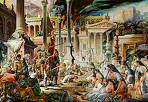


On Aug. 24-27, 410 after invading Italy, Visigoth king Alaric I and his army sacked Rome (say again?), leaving churches alone since they're still Christians, if heretic Arians, then head S towards Italy's granary in N Africa; Alaric I dies on the way to Sicily after losing his fleet and being turned back, and is buried in the bed of the Busento River; his brother-in-law Ataulf (Atawulf) (Athavulf) (Athaulf) (Ataulphus) (-415) succeeds him, vowing to destroy the very name of Rome (home of the heretic Nicean Council crowd of bishops?), causing head bishop Pope Innocent I to leave the city until 412; the woes of the prostrate city cause St. Augustine of Hippo (354-430) to produce his 22-vol. escapist work (about a holy Augustus ruling an invincible holy city of Rome?) The City of God, as the real City of God is no longer able to protect what's left of the Western Roman Empire from the heavy G.I. Joe and hairy Barbie-doll barbed Arians (barbarians)?; he at first claims "Behold, from Adam all the years have passed, and behold the 6,000 years are completed", but as the world keeps going he teaches that the Church should ditch the Book of Revelation because the Kingdom of God has actually arrived with its new political power, and imagines the Church as a worldwide empire acting as the instrument of the Holy Spirit to gradually transform the world, but preaches that the heavenly New Jerusalem should be the goal rather than the earthly one; he pushes the doctrine of "Totus Ubique" (the whole of God everywhere), invents the notion of the inner self, explores the inner relationship between the soul and God along with the idea of divine grace, and all with the cool language of a Roman-trained rhetorician, dissing the Donatists by claiming that saints and sinners should all be part of the Catholic Church, and will be separated at the End of Time, with the mystical secret brotherhood of saints forming the City of God, and the sinners forming the Twin City of Hell; "That which man builds man destroys, but the city of God is built by God and cannot be destroyed by man", its role being "to inspire men and women to organize their communities in the image and likeness of the heavenly city"; the operational message is that Christians should get out and convert violent barbarians, giving the Roman Catholic Church its Mission: Impossible for the next five cents.; too bad, his work is later used to justify persecution of heretics and Jews because membership in the Church is mandatory; Pope Innocent I laps it up and becomes a groupie? - duh, Jesus said be no part of this world (John 17:14-16)? In 412 Pope Innocent I returned to Rome and took the lead in the reconstruction of the city (the Catholic way?), insisting that all Western bishops recognize him as head in matters of worship.
In 411 the Synod of Carthage sees St. Augustine debate the Donatists, swinging many of them to orthopedic orthodoxy, after which Pelagius moves to Palestine, causing Augustine to send Gallecian-born theologian Paulus (Paul) Orosius (375-419) to meet with him.

In Mar. 415 after Alexandrian bishop (since 412) St. Cyril expels the Jews from Alexandria, Hypatia (b. 370), the Neoplatonist librarian of Alexandria, who supports Orestes, pagan prefect of Alexandria for opposing persecution of pagans and Jews is jumped in her chariot, stripped naked, and dragged through the streets to the newly-depaganized Caesareum Church, and murdered by a mob of Coptic Christian monks (from Nitria?) led by Peter (working for Archbishop Cyril under the influence of Pulcheria), ending the Hellenistic Age; her skin is scraped off with sharpened oyster shells and she is set on fire while still alive?; the first burning by Christians of a witch?; meanwhile St. Augustine writes "The true image of the Hebrew is Judas Iscariot, who sells the Lord for silver. The Jew can never understand the Scriptures and forever will bear the guilt for the death of Jesus."
In June 415 the Synod of Jerusalem sees Paulus Orosius communicate the decisions of the 411 Synod of Carthage and read several of St. Augustine's writings against Pelagius; too bad, the Greeks in attendance don't understand Latin, and Pelagus counters with the immortal soundbyte: "Et quis est mihi Augustinus?" ("Who is Augustine to me?"), after which Jerusalem archbishop John II accuses Orosius of heresy in front of the synod, causing him to later write "Liber Apologeticus" in his defense. On Dec. 26, 415 the relics of St. Stephen are uncovered in Palestine, and taken by Paulus of Orosius to Braga, Spain via Hippo so he can deliver letters from Jerome to St. Augustine, his meeting causing him to come up with the idea for a new work against paganism, Historiae Adversus Paganos (7 vols.), which he finishes in 416-7 before disappearing from history. Nonfiction: St. Augustine of Hippo (354-430), Liber ad Orosium contra Priscillianistas et Origenistas; his reply to Paulus Orosius' "Commonitorium". Paulus Orosius (375-419), Commonitorium Consultatio sive Commonitorium ad Augustinum de Errore Priscillianistarum et Origenistarum (Warnings and Reminders by Augustine Against the Errors of the Priscillians and the Origenists).
In 416 after coming to believe that the act of baptism not the believer's faith saves them, the Catholic Church (Roman and Greek) made Infant Baptism compulsory, resulting in hordes of unconverted adults, and spawning various protesting movements later called Anabaptist, Baptist, etc., who faced persecution for rebaptizing believing adults, with as many as 50M (40K/year?) killed for their beliefs. In ? the Roman Catholic Church began to baptize by sprinkling rather than immersion, creating more schisms, with the Greek Orthodox Church rejecting sprinkling and pouring. In ? the Roman Catholic Church adopted infant Communion, but dropped it in ?


On Mar. 12, 417 Pope Innocent I died, and on Mar. 18 Pope #41 (St.) Zosimus (Zosimas) (-418) (a Greek) was elected. On Dec. 26, 418 Pope Zosimus died, and on Dec. 28 Pope #42 (St.) Boniface I (350-422) was elected; on Dec. 27 Eulalius (-423) was elected by a rival faction of the clergy (until Apr. 419), and the two popes began a bareface deadly hilarious power struggle.

In 417 the preaching of Pelagianism (denial of the doctrine of original sin and affirmation of the freedom of the will, claiming that man is capable of spiritual good unaided by divine grace and that Adam's fall only involved himself), originated by British monk Pelagius (360-420) is outlawed by the Council of Carthage - causing him to leave Dodge in a hurry? In 418 he settles in Palestine.
In 419 Emperor Honorius calls a synod to decide who should be pope (first intervention by an emperor in a papal election), and when it can't decide he orders both claimants out of Rome so he can call a 2nd synod, but Eulalius uses force to occupy the Lateran until he is expelled, after which the 2nd synod deposes him in favor of sheepier Boniface on Apr. 3; Honorius then issues a decretal requiring unanimous election of popes; Boniface goes on to run a tight ship with strict rules and support St. Augustine against the pesky ascetic Pelagians.

In 420 long eclipsed by the symbol of the fish, the cross comes in vogue again, and is carved on the panel of an ivory Roman casket, becoming the earliest portrayal of the Crucifixion to survive to modern times.
In 421 Moron, er, Mormon's son Moroni, last of the Nephite prophet-historians seals the sacred records known as the Book of Mormon (inscribed on gold plates) in a stone box and hides them "up unto the Lord" in a hole in the ground, then returns as an agnel in 1823 to visit lucky prophet Joseph Smith in his bedroom on Sept. 21 and tell him where to dig them up on a hill near Manchester, Ontario County, N.Y., and after being prevented for four years by the angel, he finally does it on Sept. 22, 1827, and in just three more years (which makes seven years, natch) the great news is pub. to a grateful world - that, yes, right store, right price, just what you're looking for at a mighty nice price, the original Elvis and the golden record?

On Sept. 4, 422 Pope Boniface I (b. 350) dies, and on Sept. 10 Pope #43 (St.) Celestine I (-432) is elected, becoming the first bishop of Rome to adopt the Roman emperor's celestial title of pontifex maximus (maximum bridge-builder to God, i.e., the only bridge to God for people in communion with the Church), and to claim that he is more equal than the other bishops in Christendom, using the Petrine Theory to appropriate the title of "papa" (Gr. "father") to the bishop of Rome alone (until now it was applied to all bishops?); the title of pope doesn't get all its modern connotations until the 600s when the Muslims are slamming them and they become like a losing sports team whose coach demands total control, although the title began to be routinely used in the 500s in the days of Theodoric the Great of Italy (-526), when a synod declares the pope to be pure from all sin and exempt from human judgment - did they ever hear of stream pollution? In 423 Emperor Theodosius II issues an edict in which he remarks "The pagans that remain, although now we may believe there are none." In 424 after being celestially pissed-off by Celestine I, the Eastern Christian Church based in Constantinople declares itself independent at the Council of Dadiso; meanwhile the Third Gen. Synod of the Persian Church (Synod of Dadyeshu) confirms the Catholicos of the Church of the East as the "Patriarch of the East", no longer subject to Rome or Antioch.


In 431 the Third (3rd) Council of Ephesus, called by Theodosius II and Valentinian III and attended by 250 bishops convenes, presided over by (St.) Cyril of Alexandria (376-444), going on to condemn Chiliasm (Millennialism) (Millennium Fever) (MF) as a dangerous superstition, and condemning Montanus as a heretic, which doesn't stop his sect from surviving until Pope Leo I forcefully exterminates them by 461; the council also condemns the nasty nested heresy of Nestorius (386-451) (which denies the Theotokos, or that Mary is the Mother of God, but allows her the title of Christokos, or Mother of Christ), deposing him as patriarch of Constantinople on June 22; it also endorses the Hypostatic Union, the doctrine that Jesus had two natures, and was/is truly God and truly man simultaneously, but without mixture (alteration, absorption or confusion) of the two; Celestine I tries to impose himself as the supreme pontiff of Christianity, but is brushed off (leave it to the Church historians to fix up the history books ex post facto)?; of course, the well-nested Nestorians won't change, and split from the Byzantine Church as the Assyrian Church of the East, helping to split the East from the West in conjunction with the struggles over Monophysitism, becoming the early-warning tremors of the East-West Church Schism; meanwhile Bishop Rabbula of Edessa burns the writings of Theodore of Mopsuestia, and the Christian School of the Persians in Edessa is closed by the Romans; the independence of the church of Cyprus from the patriarch of Antioch is declared, and confirmed by Emperor Zeno in 488, causing the Acts of Barnabas to be written to strengthen their claims.
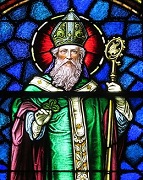

On July 28, 432 Pope Celestine I sends Scottish-born Roman future monk Patricius, AKA (St.) Patrick (387-461) (who was captured by Irish pirates in the Severn Estuary at age 16 along with thousands of others, and lived as their slave on townless roadless Pirate Island Ireland as a shepherd in Mayo County for six years, developing a love for the Emerald Isle, then escaped to England and became the pupil of Germanus of Auxelle) back to Ireland as bishop after special training to help Palladius in converting the Druids and Arians; he lands in Saul (Gael. "Sabhall Phadraig" = Patrick's Barn) in County Down E of Downpatrick ("Patrick's Stronghold") in SW Ireland, quickly converting local chieftain Dichu, who gives him a barn for church services; allegedly the Druids had predicted his arrival with the prophecy: "Adze-head [the Irish form of tonsure, done to the front part of the head] will come with a crook-head staff [crosier]; in his house head-holed [the first reference to the chasuble, named after a cottage or casa] he will chant impiety from his table [the altar]; from the front [the eastern] part of his house all his household [attendant clerics] will respond, 'So be it! So be it!' [Amen! Amen!]", as mentioned in Muirchu's 683 Life of St. Patrick; too bad, he allegedly introduces the distillation of usquebaugh (whisky) (whiskey) ("water of life") from oat and barley beer to the Irish, causing the Dalriadic Scots to later bring it with them to Scotland; Ireland is ruled by king Loigaire MacNeill, who presents Patrick with great obstacles, and after lighting a paschal fire on the Hill of Slane opposite the king's council on the Hill of Tara and inviting the Druids to do their worst, he goes on to baptize 120K and found 300 churches in Meath, Ulster, and Connaught, establishing the bishopric of Armagh in Ulster; it takes a cent. after his 461 death to convert all of Ireland, meanwhile turning it into a center of learning, causing it to later begin sending mendicant peregrini (wanderers for Christ) throughout Europe as far as Kiev, wearing the half-corona hairstyle (bald across the front), rough-spun habits, and cowls with rope belts and sandals, bringing literacy to Dark Age Europe, eventually setting up stalls at Charlemagne's court, shouting "Knowledge for sale"; St. Patrick allegedly creates the Celtic Cross by adding the Irish Sun.

On July 27, 432 Celestine I dies, and on July 31 Pope #44 (St.) Sixtus III (-440) is elected.
In 434 Gallic Christian writer St. Vincent of Lerins (-445) defines "Catholic" as "That which has been believed everywhere, always, and by all. This is what is truly and properly Catholic" - by doing this we add sweetness to taste?


On Aug. 19, 440 Sixtus III dies, and on Sept. 29 Pope #45 (St.) Leo I (the Great) (-461), a highly cultivated Roman and foe of the Manichaeans is elected, becoming the first pope to enunciate the theory of the mystical unity of St. Peter with his successors, and to attribute his own doings and sayings to him; Roman emperor (425-55) Placidus Valentinianus (Valentinian III) (419-55) confers upon him jurisdiction over all bishops in the Western Empire, making him the first "real" pope? (the first great pope?); he goes on to exterminate the pesky Montanists (founded in 156).
On Nov. 8, 441 the First Council (Synod) of Orange (2nd in 529) in S France, presided over by Hilary of Arles passes 30 canons, incl. the right of asylum, and the duty of celibacy for all in the clerical state, even deacons and widows. In 443 (452?) the Synod of Arles in S Gaul formulates 56 canons, incl. excluding neophytes from major orders, requiring married men aspiring to the priesthood to give up you know what, and forbidding the consecration of a bishop without the assistance of three other bishops and the consent of the metropolitan. In 444 Pope Leo I the Great changes the method of calculating the date of Easter so that Good Friday will not be on a Roman sports day; too bad, some outlying churches don't get the message, causing a split for cents. In 445 Emperor Valentinian III endorses the authority of the bishop of Rome, issuing an edict declaring him the "head of all the churches of the West", with all bishops commanded "to hold and observe as a law whatever it should please the bishop of Rome to ordain or decree" - when I say no Easter during a Super Bowl, I mean it?
The incessant backstabbing by Christian bishops, usually on an East vs. West basis reaches a rare moment of total absurdity, as if anybody should care if Christ is mono, bi, duo, multiplexed, time-shared, or what? On Aug. 8, 449 the Second Council of Ephesus (Robber's Council), convoked by emperor Theodosius II convenes before Western bishops can arrive, leaving 198 Eastern (mainly Egyptian) ones to decide if Constantinople Patriarch (St.) Flavian (Phlabianus) (-449) had justly excommunicated and deposed anti-Nestorian Archimandrite Eutyches (380-456) last Nov. 8 (after being put up to it by Bishop Theodoret of Cyrus) for refusing to admit that Christ has two natures, and after the military is called in to intimidate recalcitrants, Eutyches ends up getting restored and Flavian deposed and exiled after being struck, after which he dies a few days later in Lydia, while his supporters Theodoret, Domnus II of Antioch and Eusebius of Dorylaeum are ditto, and the Alexandrine doctrine of "one nature" is upheld; after Pope Leo I learns about it, he gets pissed off at the antics and calls it a "robber synod"; the 451 Council of Chalcedon repudiates it.

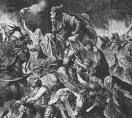
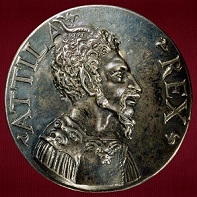
In 451-2 mean Asian midget (Calmuck?) Attila (Gothic for "little father"?) the Hun (the Mundzuk) (406-53), the "Scourge of God" (Flagellum Dei) and his hordes of 850K horsemen deal the West a fatal blow, stick them with a fork.

Meanwhile on Oct. 8-Nov. 1, 451 the Council of Chalcedon (Fourth Ecumenical Council) of 500 bishops in Chalcedon across from Constantinople, called by Emperor Marcian and presided over by the patriarch of Constantinople accepts Pope Leo I's interpretation of the Trinity, and promulgates the doctrine of Mariolatry (worship of the Virgin Mary), causing a split between the Syriac Orthodox Church of Antioch, Coptic Orthodox Church of Alexandria, and later the Armenian Apostolic Church on one hand, and the Latin Roman and Greek Byzantine Churches on the other over the life-death matter of whether Christ, who was both God and man, had one composite incarnate nature "from two" natures, human and divine, now known as the Orthodox doctrine, or was "in two natures", known as the Monophysite ("single nature") doctrine, with Christ's human nature "dissolved like a drop of honey in the sea" in his divine nature, and thus had a divine soul or mind combined with a human body; the emperor sides against the Monophysites, and the council affirms the power-drive formula that Jesus had two natures, and was/is truly God and truly man simultaneously, but without mixture (alteration, absorption or confusion) of the two, and declares the 449 Second Council of Ephesus a "robber synod" and annuls its proceedings, causing the persecution of Monophysite churches in Egypt and Syria to begin, which ends up adding to the permanent split between the Eastern and Western empires, although for the time being the council grants the See of Constantinople the same privileges of honor as the See of Rome, with the primacy going to the Roman See; Armenian abbot (St.) Euthymius the Great (377-473) of Palestine is instrumental in getting the eastern monks to accept the council's decrees.
Also in 451 the Synod of Milan, held by 19 bishops of N Italy accepted the Epistola Dogmatica of Pope Leo I, setting forth the orthodox doctrine of the Incarnation against the Nestorians and Eutychians.
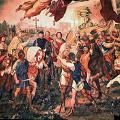
In 452 after some Huns reached the gates of Rome, Valentinian III sent a 3-man delegation led by Roman sen. Avienus and Pope Leo I, who met Attila in Mincia (near Mantua); Pope Leo I then showed why he's the Great by wowing Attila with his witch doctor voodoo jive honky act, making him see visions of Peter and Paul (and/or other celestial spooks) hovering over him and threatening him with instant death if he attacks the Holy City of Rome (and reminding him of what happened to the last dude who sacked Rome, Alaric?); after seeing plague break out among his men, food supplies run low, and Roman reinforcements coming from the east, Attila struck a secret peace agreement, then returned across the Alps to Pannonia (Hungary) with his bloated, well-laid, treasure-carting Huns, and died in 453 on his wedding night to his umpty-umpth wife.
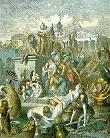


455 The Vandals vandalize Rome? On Mar. 16, 455 Roman emperor (since 425) Valentinian III (b. 419) was murdered in the Campus Martius (Field of Ares) in Rome while watching war games by his own guards Optila and Thraustila (followers of Aetius avenging his murder, as well as Scythians working for Sen. Petronius Maximus, whose wife Valentinian had tricked into hanky-panky in the palace?), along with his advisor Heraclius; Valentinian III becomes the last emperor of the Theodosius family; Petronius Maximus (397-455) becomes Roman emperor #94 of the West (until 455) (first of the "shadow emperors", puppet rulers presiding over Rome's demise with short-lived reigns) after forcing Valentinian III's wife Eudoxia to marry him and distributing bribes; he lasts 77 days before being killed on May 22, causing Eudoxia to paradoxically call for help from the (educated, moral, literate, civilized?) Vandal pirates from Carthage under Genseric (Gaiseric), king of Africa (Attila the Hun deja vu?), who are more than happy to cross the Mediterranean, then after Pope Leo I trots out and tries his Attila Voodoo Jive Honky Act in vain, sack Rome (not destroying a single bldg. but only pillaging after Pope Leo I the Great talks to him?) for two fun-filled weeks (June 2-16), carrying away the empress and her two daughters, plus what was left by the Visigoths in 410, incl. the C.E. 70 Jerusalem spoils of Titus, which sink on the return voyage to Carthage (and have yet to be found by Indiana Jones?); the Vandals use the spoils to pump up their lifestyle, incl. fine bldgs., art, and poetry, without becoming effete and degenerate?; the loss of the N African granaries strangles Rome, assuring its fall, making the Vandals responsible for plunging the West into the Dark Ages?; on July 9 Eparchius Avitus (395-457), master of soldiers and ambassador to the Visigoths is proclaimed Roman emperor #95 of the West by the Gallic army, and enters Italy on Sept. 21; Pope Leo I's efforts to stop Genseric, along with his shine with Attila add to the prestige of the papacy after the Western Roman Empire falls, and he becomes the first pope to claim to possess "plenitudo postestasis" (fullness of power of jurisdiction) over the entire Church, and to become virtual mayor of Rome, with political, civil, financial, and defense responsibilities, backing the Petrine Theory bigtime and launching the Big Plan to Build Papal Power that takes five cents. to complete.
On Mar. 17, 461 C.E. (by tradition) Ireland's patron St. Patrick (b. 387) dies in Saul after having allegedly driven the snakes out of Ireland and used the 3-leaf hop clover shamrock to illustrate the concept of the Trinity, foiling the evil Arians and Druids at the same time; "May the enemies of Ireland never eat bread nor drink whisky, but be tormented with itching without benefit of scratching" (traditional St. Patrick's Day toast); really dies in 493?; really lives to age 120?; buried in Downpatrick (Gael. "Dun Padraig" = "Patrick's stronghold") 20 mi. S of modern-day Belfast.


On Nov. 10, 461 Pope (since 440) Leo I dies, and Pope #46 (St.) Hilarius (Hilary) (-468) (a Sardinian) is elected - it would have been hilarious if he had been the pope in 476? On Feb. 28, 468 Pope (since 461) Hilarius dies, and on Mar. 3 Pope #47 (St.) Simplicius (-483) is elected, seeing the Western Roman Empire end during his reign, and the simplistic schism with the churches of Armenia, Syria, and Egypt (Copts) begin.





On Jan. 18, 474 Roman Byzantine emperor (since 457) Leo I dies of dysentery, and is succeeded by his infant grandson (son of his daughter Ariadne) Leo II (-474) as Roman emperor #101 of the East; on Feb. 9 his daddy, Ariadne's Isaurian husband Trascalisseus (Trasicodissa) makes himself co-emperor Zeno (426-91), Roman emperor #102 of the East (until 491); in June after Leo I names him to stop Glycerius, Dalmatian cmdr. Julius Nepos ("nephew") (430-80), husband of Leo I's niece marches into Ravenna and claims the purple as Roman emperor #103 of the West (until 480), and Glycerius gives up without a fight, being made bishop of Salona (Solin) in Dalmatia; the Western Roman Empire now consists of Italy, part of the Balkans, and footholds in N and S Gaul; the Vandals begin launching pirate attacks on the coasts of Italy; on Nov. 17 Leo II dies, and Zeno (who probably did you know what) becomes sole Eastern emperor, causing Leo I's widow Aelia Verina (-484) to depose "the worthless and ungrateful servant on whom she alone had bestowed the sceptre of the East" (Gibbon, Ch. 39), and replace him with her brother Flavius Basiliscus (-477) as Roman emperor of the East #104 (until 477). On Jan. 9, 475 he is proclaimed Augustus in Constantinople, and drives Zeno into exile in his home mountains of Isauria.

The Roman Empire is suffering Seinfeldian shrinkage? In 475 a treaty is signed by Roman emperor Nepos with Euric, recognizing the Visigoths as masters of most of Gaul and Spain in exchange for restoring the Provence region of Gaul to imperial control; meanwhile Nepos appoints German tribesman (half-German and half-Roman?) Orestes Augustus (-476) (former asst. to Attila the Hun and husband of the daughter of Count Romulus of Petovio in Noricum) as master of soldiers (big mistake?), and after the Roman Senate abandons Nepos for his Eastern ties, Orestes stages a coup in Ravenna on Aug. 25, becoming Roman emperor #105 (until 476), causing Nepos to flee to Dalmatia, where he rules with the backing of the Byzantine emperor and is recognized in Gaul; Orestes then gets his teenie son (by his Roman wife) (known only for his beauty) Romulus Augustus (Augustulus) (Momyllus) (461-77?) crowned as Western Roman emperor #106 (last) (until 476) on Oct. 31; "The appellations of the two great founders, of the city and of the monarchy, were thus strangely united in the last of their successors." (Gibbon, Ch. 36).



In Aug. 476 Flavius Odoacer (Odovacer) (435-93), Herulian Visigoth chief gen. of the Germanic tribes in the Roman army leads a revolt over a baksheesh matter (free homes in Italy), captures Ravenna, and kills Orestes in Pavia; on Sept. 4 (Sept. 7 Gregorian) (Mon.) Romulus Augustus (461-77?) (AKA Augustulus), the boy emperor of Rome in Ravenna becomes the Last Roman Emperor of the West as he is deposed and exiled to the castle of Lucullus in Campania in S Italy (with 6K pieces of gold per annum allowance) by Odoacer, who proclaims himself Roman emperor of the West, petitioning Emperor Zeno to recognize him as a patrician and ruler of Italy on behalf of the Eastern Empire; Zeno accepts on the last part, but insists that exiled Julian Nepos (d. 480) remain Roman emperor, which he does, on coins; 753 + 476 - 1 = 1228?; the Dark Ages begin as 1.2K years of progress of civilization becomes kaput in Europe thanks to barbarians and Christian hostility to paganism, which to them incl. all pagan scientific, literary, historical, and cultural works, making all scientists forever suspect of being in league with the Devil by the Christian masses, an impediment that ends in ?, and the very idea of wanting to live for "the world" when the Kingdom of Heaven is dangled in front of your eyes to seem pointless?; "So it was in utter social decay and collapse that the great slave-holding 'world-ascendency' of the god-Caesars and the rich men of Rome came to an end" (H.G. Wells, Ch. 37) - so who is the last emperor, Romulus Augustus or Nepos?

In 481 Childeric I died, and 15-y.-o. son Clovis I (466-511) became king of the Germanic Salian (still pagan) Franks (later, first king of all the Franks) on the right bank of the Rhine River, who are known for their blue Germanic eyes, going on to convert to Roman Catholicism and kick the Arian Visigoths out of France in 507, after which the Franks allied with the papacy against the Byzantines and pesky Arian Lombards in Italy, rekindling dreams of a new Roman Catholic Western Roman Empire that was German on the secular side and Latin on the religious side.

On Mar. 10, 483 Pope (since 468) Simplicius died, and on Mar. 13 Pope #48 (St.) Felix III (II) (-492) was elected. In 484 Pope Felix III, pissed-off at the Monophysite-leaning Henoticon excommunicated Byzantine emperor Zeno and the patriarch of Constantinople, beginning the Acacian Schism (ends 519) - just because we're down on the political scene, we ain't kissing your butts theologically?

On Mar. 1, 492 Pope (since 483) Felix III died, and on Mar. 1 Pope #49 (St.) Gelasius I (-496) was elected (last African pope until?), declaring Feb. 14 as Valentine's Day to honor martyred Bishop Valentine, defending the supremacy of the Roman See of Peter over that of kings, inserting the "kyrie eleison" into the Mass, and instituting the code for the uniforming of rites and ceremonies.

In 493 at the instigation of the Byzantine emperor, mainly to get them off his back, the Arian Ostrogoths under king (since 474) Theodoric ("ruler of the people", "people's king") (the Great) (the Amaling) (the Strong) (454-526) took over Italy and killed Odoacer, and believe it or not Theodoric loved Roman culture and tried to unite the two peoples, and even worked with the heretic (to him) pope; too bad, it was a Planet of the Apes situation, and when he died the poor defensive Latins were crushed in the civil and other wars and rapidly began winking out, after which the Franks became their only hope.
Meanwhile, dreams aside, the Western Roman Empire now kaput, Rome descended into the Dark Ages, as proved by a lot of popes' portraits turning into Bozo the Clown :)



On Nov. 21, 496 Pope (since 492) Gelasius I died, and on Nov. 24 Pope #50 Anastasius II (-498) was elected, condemning Traducianism (a baby's soul is inherited from the parents) in favor of Creationism (God creates each new soul individually). On Nov. 19, 498 Pope (since 496) Anastasius II died, and on Nov. 22 Pope #51 (St.) Symmachus (-514) was elected; on Nov. 22 Laurentius (Lawrence), archpriest of Santa Prassede was elected antipope by a pro-Byzantine faction supported by Byzantine Emperor (491-518) Anastasius (Dicorus) I (431-518) and Arian Ostrogoth king (474-526) and Italian king (493-526) Theodoric the Great, who installed him in the Lateran until 506; on Mar. 25, 501 Pope Symmachus celebrated Easter, following the old Roman cycle, while the Byzantines observed it on Apr. 22, causing the movement to depose him in favor of Laurentius to gain momentum; on Oct. 23, 502 the Synodus Palmaris, called by Theodoric the Great absolved Pope Symmachus of all charges.

On July 19, 514 Pope (since 498) Symmachus died, and on July 20 Pope #52 (St.) Hormisdas (-523) was elected, decreeing that a bishopric should not be bestowed in privilege.

In 515 Italian prelate (St.) Benedict of Nursia (480-544), after becoming disgusted with Roman vice and retiring at age 14 to the lonely rocks of Subiaco (Sublaqueum) Lake to lead a hermit's life for three years, causing his fame to spread and multitudes to flock to see him, then founding 12 monasteries near Subiaco, composed the Regula Monachorum (Regula Sancti Benedicti), the Benedictine Rule, earning him the title of "Founder of Western Monasticism"; Pope Horn, er, St. Hormisdas authorized the Benedictine Order and Benedict's Abbey of Monte Cassino, which he founded in 529 on the site of an old temple of Apollo on a hill enclosed by a fortifying wall over the small town of Cassino (Casinum) (halfway between Rome and Naples), then rededicated to John the Baptist, going on to live in it for life and leave a famous sepulcher - before I knew it I was helping people?
In 521 the Sedia Gestatoria (portable throne) for popes was first mentioned by Bishop Ennodius of Pavia; as time goes by it got richly adorned and covered with silk, with two golden rings on each side through which long rods pass, carried on their shoulders by 12 red-uniformed footmen; at a papal coronation three bundles of tow are burned before him as he sits in it while the MC chants "Sancte Pater sic transit gloria mundi" (Holy Father, so passes the glory of the world).


In 523 Byzantine Emperor (518-27) Justin (Justinus) I (Flavius Iustinus) (the Elder) (450-527) issued the severe Edict of 523 against the Arians, puzzling King Theodoric the Great of Italy, who couldn't understand why these narrow-minded intolerant so-and-sos don't practice lofty toleration of the other side like he does. On Aug. 6, 523 Pope (since 514) Hormisdas died, and on Aug. 13 Pope #53 (St.) John I (-526) was elected, becoming the first Roman pope to visit rival city Constantinople in 525, when Theodoric the Great sent an embassy consisting of him and four leading Roman senators to Justin I seeking annulment of the Edict of 523, but the latter refused them and criminalized mere veneration of the Roman pope by his Byzantine subjects, causing Theodoric to retaliate both ways, arresting the pope on his return from Constantinople, and prohibiting the exercise of non-Arian (Roman) Catholicism in his domain; the pope and emperor struck a secret deal for fear of Theodoric's Arian anti-Roman Catholic kinsmen, and several Roman aristocrats joined the conspiracy, which Theodoric discovered.

On May 18, 526 Pope (since 523) John I died in prison in Ravenna, and on July 12 ailing Theodoric the Great, Arian king of the Ostrogoths threw out the choice of the Romans and got Felix of Samnium (SC Italy), son of Castorius elected Pope #54 (St.) Felix IV (III) (-530). Too bad, after Theodoric's death on Aug. 30, 526 his Ostrogoth kingdom of Italy began falling apart, and was taken over by the Byzantines in 555.
On July 3, 529 the Second Council of Orange (first 441), presided over by Bishop Caesarius of Arles condemns the freewill doctrines of the Pelagians and Semi-Pelagians, and confirms the doctrine of Original Sin of Augustine of Hippo, which claims that the only free men are those who live in accordance with divine will after God chooses them for salvation, with there being no way that men can earn salvation, which made it hard to make new converts until Pope St. Gregory I watered it down, saying that in receiving the Church's sacraments and following its moral teaching, believers demonstrate that God's grace has come to them.


On Sept. 22, 530 Pope (since 526) Felix IV died, and on Sept. 22 Pope #55 Boniface II (-532) (a German Ostrogoth) was elected under the influence of Arian Ostrogoth king (526-34) Altharic (516-34), becoming the first Germanic pope, but no surprise, on Sept. 22 the Roman priests elected Antipope Discorus (Dioscoro) (-530), and both were consecrated on Sept. 22 (7th antipapal schism); Discorus died 22 days later on Oct. 14. On Oct. 17, 532 after the Nika Revolt in distant Constantinople stunk it up, Pope (since 530) Boniface II died, becoming the first pope not to be sainted - his bonny face obscured by his German nose? After the Nike Revolt and its put-down sunk in, the Byzantine emperor attained the status of not quite God but God's regent on Earth, with church and state becoming one, and the govt. owning the land and controlling industry as well as thought; until the early 13th cent. the emperors had a fantastic ambition to restore the Roman Empire with the entire Mediterranean as their lake, the pesky Muslims making it impossible, as if the Romans wanted this either without an end to the religious schism.

On Jan. 2, 533 after Mercurius was elected Pope #56 John II (-535), he was consecrated, becoming the first pope to change his name upon election - if his name had been Freddie he'd be a queen?

On May 8, 535 Pope (since 533) John II died, and on May 13 Pope #57 (St.) Agapetus (Agapitus) I (-536) was elected. Meanwhile in 535 the Krakatoa Volcano in Malaysia at 105 deg. E, 5 deg. S exploded, splitting the island of Sumatra asunder and creating the islands of Java and Sumatra separated by the Sunda Strait, reducing daylight to four hours and affecting crop growth for 10 years; did this accelerate the coming of the Dark Ages by encouraging fleas in Africa to multiply, bringing the plague?



In 536 Ostrogoth king (since 534) Theodahad (-536) sent Pope (since 535) Agapetus I to Constantinople, where he stood up to Byzantine emperor (527-65) Justinian I (Flavius Petrus Anicius Sabbatius Justinianus) (482-565) and his wife (St.) Theodora (500-48) ("whose threats, however, terrify me not"), and deposed Theodora's pro-Monothelite puppet Anthimus from the Byzantine See, then personally consecrated his successor (until 552) Mennas (-552), earning sainthood in the Orthodox Church; on Apr. 22 Agapetus I was poisoned by Theodora, and on June 8 with Theodahad's support subdeacon Silverius was elected Pope #58 (St.) Silverius (-537).

On Nov. 11, 537 after being forced to renounce the papacy, Pope (since 536) Silverius was assassinated in exile in Ponza, and on Mar. 29, 538 the son of Pope #52 Hormisdas was elected Pope #59 Vigilius (-555).
In 538 the Second Council of Orleans orders Jews to stay indoors during Holy Week for their own protection, and prohibits them from holding public office.
In 543 Emperor Justinian I issued an edict condemning the Three Chapters; Pope Vigilius refused to sign it, and was ordered to Constantinople, finally signing off on it in 553, then on June 7, 555 dying in Syracuse en route to Rome.
In 553 the Second Council of Constantinople (Fifth Ecumenical Council), called by Emperor Justinian I and presided over by the patriarch of Constantinople, and attended by 165 bishops over protests by Pope Vigilius condemned the doctrine of Origen that Hell is purgatorial only, and that all, even devils will eventually be purified and restored to happiness, and makes Hell a place of eternal punishment only for mortal sins, with Purgatory reserved for venial sins; Nestorian Theodore of Mopsuestia was also condemned - one out of how many heretics will break a bone due to osteoporosis during their lifetime?



On Apr. 16, 556 Pope #60 Pelagius I (-561) was elected, his election influenced by Justinian I since Rome was now a province of the Byzantine Empire. On Mar. 3, 561 Pope (since 556) Pelagius I died, and on July 17 Pope #61 John III (-574) was elected, old fart Justinian I's last hurrah, retiring to the Roman catacombs in 571 to protect eunuch Byzantine gen. Narses (478-573), who was fighting trumped-up treason charges, returning to the Lateran Palace when he died.


On July 13, 574 Pope (since 561) John III died, and on June 2, 575 Pope #62 Benedict I (-579) was elected, facing a Longobard (Lombard) siege of Rome. On July 30, 579 Pope (since 575) Benedict I died, and on Nov. 26 Pope #63 Pelagius II (-590) was elected, laboring to promote the celibacy of the clergy; for starters priests must say the Divine Office every day - that'll keep their minds off it, I'll pretend I'm kissing the lips that I'm missing and hope that my dreams come true?
On Apr. 5, 582 (Easter) Eutychius I (b. 512) died, and Emperor Tiberius II made ascetic Hagia Sophia deacon John IV (the Faster) (Nesteutes) (-595) the patriarch of Constantinople (until 595), becoming the first to use the title "ecumenical patriarch", pissing-off Pope Gregory I, who calls it "diabolical arrogance", adding that anybody using it is the Antichrist, instead opting for "servant of the servants of God".
In 585 the 43-bishop Third Council of Macon in Burgundy is held, decreeing that women don't have a soul - not (a later frameup).

In May 589 the Third (3rd) Council of Toledo convenes, led by Spanish archbishop (St.) Leander of Seville (534-601), who delivers the closing sermon Homilia de Triumpho Ecclesiae ob Conversionem Gothorum (Triumph of the Church and Conversion of the Goths), with the soundbyte: "The peace of Christ has destroyed the wall of discord which the Devil had built up, and the house which division was bringing to ruin is united in and established upon Christ the cornerstone"; Arianism is now declared a heresy, and the repressive laws set out in the Council of Elvira are reinstituted, incl. forced conversion of Jews, who unsuccessfully try bribing Reccard I, causing St. Gregory the Great to praise him and send him gifts consisting of a piece of the True Cross, fragments of the chains of St. Peter, and some hairs of St. John the Baptist (really a chip off his chair, some old jewelry from one of his hos and some short hairs from his crotch?); the council adds the Filioque Clause to the Creed of Constantinople, changing "ex patre procedit" to "ex patre filioque procedit", i.e., the Holy Ghost proceeds from the Father and the Son, pissing-off the Greek theologians, who insist that he proceeds not from but through the Son; actually, while the clergy was for using royal power to clamp down on the pesky Jews, the fact that they are rich and well-connected throughout the Mediterranean causes them to be tolerated, with Reccared I eliminating the death penalty for Jews proselytizing among Christians and ignoring a request from St. Gregory to use force to end Jewish trade in Christian slaves in Narbonne, but the prohibition on Jews holding public offices in which they can impose penalties on Christians is retained.

On Feb. 7, 590 as the plague raged in Rome, Pope (since 579) Pelagius II died of it after leading a sevenfold procession in Rome which seemingly ended it, as proved by an angel appearing to him from Castel Sant'Angelo to announce it; on Sept. 3 Benedictine monk Gregory (first monk to become pope) was elected Pope #64 (St.) Gregory I (the Great) (540-604) (supposedly against his will), becoming the last of the four great Latin fathers, and the first of the medieval male chauvinist Roman Catholic Church prelates, bridging the classical Greco-Roman tradition with the medieval Roman-German one; although he continues to wear a monk's robe, he immediately takes over as an unauthorized secular prince, leading the fight against the Arian Lombards and the claims of the patriarch of Constantinople to be the #1 bishop, citing divine authority; he tightens clerical discipline, stressing celibacy (if not chastity?), divides Church revenue into four shares (bishop, clergy, poor, church bldgs.), continues the ancient imperial grain doles in Rome and elsewhere, repairs aqueducts, reforms the city admin., and allies with the Benedictines at the expense of the bishops, giving them bishop-proof charters and sending them on missionary campaigns in Britain, Gaul, Italy, Sicily, Africa, and Sicily; his men begin codifying the best Church Gregorian Chants, which derive from Jewish services and rely heavily on antiphonal singing of hymns by choirs in unison (no part-singing), and introduces the papal-style Servus Servorum Dei ("Servant of the Servants of God"); a fan of St. Augustine of Hippo, he writes The Book of Pastoral Care, which becomes a std. clerical textbook for cents.; his Dialogues popularize his crypto-pagan ideas about angels, demons, devils, relic worship, miracles, Purgatory, and allegorical interps. of the Bible; a disciple of St. Benedict, he imposes the Benedictine Rule upon all Latin monasticism, and gets nearly all orders to comply; he encourages Christian missionaries to speed up the absorption of pagans by absorbing pagan traditions into Catholic "universal" ritual as needed, saying they should meet the pagans half-way and so bring them into the Church, e.g., by absorbing their pagan festival of Tammuz or Bel or Nimrod on midsummer day (June 24) as the Festival of the Nativity of St. John; each Catholic church is turned into a Disneyland of saints? - get them in any way you can, we'll take it from there, and get them into the music? On Feb. 16, 600 Pope Gregory I decreed that "God bless you" is the correct response to a sneeze. In 601 he sent a group of clergy from Rome to Kent to assist St. Augustine in converting the pagans, incl. abbot Mellitus (-624); on June 17 he writes Mellitus the Epistola ad Mellitum, instructing him to convert the Anglo-Saxons gradually, not destroying pagan temples but converting them to Christian churches while integrating pagan rituals and customs, "For there is no doubt that it is impossible to cut off every thing at once from their rude natures; because he who endeavours to ascend to the highest place rises by degrees or steps, and not by leaps." In 602 he wrote an epistle to the faithful to avoid "following the perfidy of the Jews" by observing the Sabbath on Saturday; it's okay for the Anglo-Saxons to keep their pagan Easter (named after the Anglo-Saxon spring goddess Eostre or Ostara) eggs as long as they are recast in PC Christian terms, with no mention of Ostara changing her pet bird into a rabbit, Osterhase, which lays brightly colored eggs to give to kids to symbolize fertility; instead, since eggs are forbidden for the 40 days of Lent preceding Easter, think of it as a diet breaker?; since Easter is the season for baptisms, and converts wear brand-new white robes to symbolize their rebirth, it becomes popular to take a long walk in one's new clothes after Easter Mass?
In 604 St. Augustine of Canterbury consecrated Mellitus (-624) as bishop #1 of the Anglo-Saxon kingdom of the East Saxons after he converted king Saeberht (Saberht) (Saebert) of Esse (-616) to Christianity, and with help from his overlord King Aethelberht of Kent they built a church in London dedicated to St. Paul as Mellitus' new seat, becoming the start of St. Paul's Cathedral; St. Augustine died on May 26.


On Mar. 12, 604 Pope (since 590) Gregory I the Great (b. 540) died, and on Sept. 13 Pope #65 Sabinianus (Sabinian) (-606) was elected; on May 26 Gregory's favorite missionary St. Augustine of Canterbury also died after turning England into a base for reform of the Frankish Church and for conversion of the remaining pagan Germans in the British Isles and the Continent.


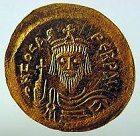

On Feb. 22, 606 (since 604) Pope Sabinianus died, and on Feb. 19, 607 Pope #66 Boniface III (-607) was elected, with Byzantine Emperor (602-10) Phocas (Phokas) (Gr. "a seal") (-610) bestowing the title of Universal Bishop (Pope) upon him; he died on Nov. 12 - 66, 607: no wonder the world didn't end? On Aug. 25, 608 Pope #67 (St.) Boniface IV (-615) was elected after a 9-mo. vacancy, and was consecrated on Sept. 15, obtaining the permission of the emperor to convert the Pantheon (rebuilt by Emperor Hadrian in 118-128) into a church, St. Maria Rotunda ad Martyrs, becoming the first pagan church in Rome converted to a Christian church, instituting All Saints Day on Nov. 1.



On May 25, 615 Pope (since 608) St. Boniface IV died, and on Oct. 10 Roman-born priest Adeodatus was elected Pope #68 (St.) Deusdedit (Adeodatus) (Lat. "dedicated to God") I (-618), and was consecrated on Oct. 19, becoming the first priest to become pope since John II in 533; he went on to reverse the practice of appointing monks to admin. positions, replacing them with priests, and ordained 14 priests, the first papal ordinations since Pope Gregory I the Great; he was the first to use lead seals (bullae) on papal documents, causing them to be called Papal Bulls - Deus edits my bullshit? On Nov. 8, 618 Pope (since 615) St. Deusdedit I died in Rome after surviving an earthquake and leprosy epidemic, and on Dec. 23, 619 Pope #69 Boniface V (-625) was consecrated after the start of his pontificate was delayed for 11 mo., instituting the privilege of sanctuary in churches. On Oct. 25, 625 Pope (since 619) Boniface V died, and on Oct. 27 Pope #70 Honorius I (-638) was elected, building new churches in Rome.

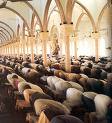

On June 8, 632 illiterate polygamous Arab warlord and self-appointed final prophet of the god Allah Muhammad (570-632) died after spending 20 years conquering and converting the pagan tribes of the Arabian Peninsula, leaving no male heir, eventually causing a succession dispute that led to a permanent schism between Sunnis and Shiites, but immediately causing the Great Jihad to be launched to convert the world to his new religion of Islam, starting with religious cleansing of the Christians and Jews in the Arabian Peninsula and surprise military attacks on the Christian Byzantine Empire and Zoroastrian Persian Empire, with the goal of permanent takeover followed by conversion of the populace, a complete absorption of the land and people like the Borgs in Star Trek, it's the Religion of Peace after you surrender and accept their peace terms. The offensive caught them all by surprise, and was extremely successful, allowing the Arabs to conquer Persia and put a big dent in the Byzantine Empire, incl. conquering the Christian-Jewish Holy Land and Egypt, followed by N Africa, and Roman Catholic Spain starting in 711. The popes were initially totally ignorant of Muhammad and his strange militaristic religion that forced believers to prostrate themselves in a mosque-fort 5x a day, and thought of him as a Christian heretic, but after they absorbed the horrible Quran enough to realize that Allah considers them the heretics or infidels who don't deserve to have any political power but wants Muslims to rule the world, with all options on the table and Paradise promised to martyrs, they believed him to be the long-feared Antichrist, with Christian historians trying to twist his birth or death date to 666, as if that mattered. For the next thousand years the Great Jihad continued to pound on Christendom, killing or enslaving tens of millions until it was stopped in 1683 in Vienna, and the Muslim World put into de facto quarantine as a criminal enterprise until the mid-late 20th cent., by which time the Church was becoming irrelevant to the post-religion New World Order jet set, and ill-considered mass immigration from the backward Muslim World to the West began, who knows how much blood will flow because of high-placed history ignoramuses.

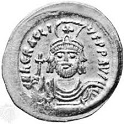





On Oct. 12, 638 Pope (since 625) Honorius I died, and in Oct. Pope #71 Severinus (-640) was elected, but Byzantine Emperor (610-41) Heraclius (Heraklius) (Herakleios) I (575-641) refused to grant his confirmation until he signed the Ekthesis, which was proclaimed in 638, making the Monothelete doctrine the official doctrine of the shrinking Orthodox Church; after holding out for 18 mo., he was consecrated on May 28, 640, and died 3 mo. later on Aug. 2; on Dec. 24 the son of Venantius was elected Pope #72 John IV (-642), writing to the Irish about the Easter Controversy and Pelagianism. On Oct. 12, 642 Pope (since 640) John IV died, and on Nov. 24 Pope #73 Theodore I (-649) (a Greek) was elected, being referred to in a 643 letter by Archbishop Sergios of Cyprus as the successor of St. Peter and the Rock upon which the Cock, er, Church is founded - sure, now that the pope is a Greek?

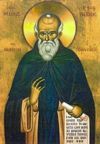
On May 14, 649 Pope (since 642) Theodore I dies (poisoned?), and on July 5 Pope (#74) (St.) Martin I (-655) (a deacon from Todi) (former papal uncio to Constantinople) is elected, becoming the first (only) pope consecrated without approval of the Byzantine emperor, ordering Emperor Constans II to repudiate the Monothelite doctrine, and convening the Lateran Council of 649 in Rome on Oct. 5-31 (three years in the making) ("in form as well as substance a manifestly Byzantine affair"), attended by 105 bishops, 104 from the W side of the Byzantine Empire (Italy, Sicily, Sardinia, Corsica, Africa) (35% Greek-speaking), which condemns it, becoming the first time a pope attempts to convene an ecumenical council independent of the emperor, athough it doesn't achieve ecumenical status; the council's canons are written by Maximos Confessor (Maximus the Confessor) (580-662) of Constantinople, creating the irony that the denunciation of Constantinople's theology comes from the "collaboration of a Greco-Palestinian pope and a Constantinopolitan monk emploing a style of theological discourse whose tradition was purely Eastern"; the council pisses-off Emperor Constans II, who orders Pope Martin I and Maximos Confessor arrested.
On June 17, 653 after getting pissed-off by the Lateran Council of 649, Pope St. Martin I of Rome and Maximos Confessor are arrested by the exarch by order of Emperor Constans II, then deposed and banished for treason, increasing the alienation of Italy from their former bosom buddies in the Eastern Roman Empire - which side's monks created the pretzel?
On Sept. 16, 655 Pope (since 649) St. Martin I died in exile in Cherson with his name retained in anathema, and not mentioned by his successors for 75 years; meanwhile on Aug. 10, 654 Pope #75 (St.) Eugene I (-657) was elected, going on to receive young St. Wilfrid on his first visit to Rome this year and consecrate 21 bishops after sending legates to Constantinople bearing letters to Emperor Constans II informing him of his election but avoiding mention of the Monothelite Thang, after which they returned with a tortuously-worded synodical letter from Patriarch Peter, which was read in the Church of St. Mary Major in 656, causing the clergy and laity to loudly reject it and make him promise not to accept it, pissing-off the Byzantine clergy, who threatened to depose him until the pesky Muslims diverted their attention.

On June 2, 657 Pope (since 654) St. Eugene I died, and on July 30 Pope (#76) (St.) Vitalian (-672) was elected, becoming the pope to ride the wild year 666, arriving on May 27, 669, and hitting it off by spreading delectable scare stories about them terrible Arab Antichrists - it's the Year 666, five heads and ten eyes, that was just the donkey - as the Good Book says, all things comes to them who wait?

In spring 664 under Northumbrian King Oswy's guidance the Synod of Whitby ("white farm"), hosted by abbess (St.) Hilda of Whitby (614-80), and dominated by Ripon abbot (St.) Wilfrid (Wilfrith) of York (634-709) debates whether the Roman Catholic Christianity of Augustine of Kent or the Celtic Christianity of Aidan of Northumbria should be the one and only for England, and ends with King Oswy deciding that Kent tastes good like a Christianity should, along with an agreement over the date of Easter and the adoption of the Peter-keyed Roman Catholic faith for Northumbria; the Celtic rite, centered in Lindisfarne Abbey in Northumbria under Bishop Finian is replaced with the Roman rite, centered in Canterbury, Kent; the Celtic Church now begins to decline (ends 1172), and there is a unified English church before there is an English nation?


666 This year was high on religious terror and Millennium Fever (MF), and it became more and more dangerous to not have your head right in Christian lands; meanwhile the Arab onslaught on Christendom is so out of the blue and ill-understood that the Christian View of Muhammad is a total blank, with most not even knowing that the invaders had a new prophet or what his name was, believing only that the attacks were by pagans and were a punishment of God for their own sins; an anon. Byzantine document written in Palestine between 634-40 titled Doctrina Iacobi Nuper Baptizati (The Teaching of the Recently-Baptized Jacob) contains the soundbyte about Muhammad: "He is deceiving. For do prophets come with sword and chariot?... You will discover nothing true from the said prophet except human bloodshed"; it is not until Arab Christian monk-priest St. John of Damascus (676-754) begins writing on Islam that Christendom finally get clued in, with the new term "false prophet" coined and used ever since, with later biographers placing his death in 666 to cinch their view that he is the feared Antichrist, while others change his name to Mahmound, meaning Devil Incarnate, it was a war of disinformation on both sides.

On Jan. 27, 672 Pope (since 657) Vitalian died, and on Apr. 11 Roman-born Benedictine monk of St. Erasmus Church (on the Caelian Hill) Pope #77 Adeodatus (Deusdedit) (Lat. "dedicated to God") II (-676) was elected, giving Venice the right to choose its doge in his campaign to suppress Monothelitism.

In Apr. 674 the Muslim Saracen navy passes unimpeded through the Hellespont and lands troops near Hebdomon Palace 7 mi. from Constantinople, but they are repulsed, with Greek Fire (a flamethrower that puts people and ships on fire and can burn on water, invented in 673 by Syrian engineer refugee Callinicus) used against them by the busy buzzing Byzantines for the 1st time, causing the soldiers of Blallah to back off and plunder the coasts of the Propontis until Sept., then retreat to Cyzicus Island for the winter; (being mindless killing machines?) they repeat this cycle every year until 678 before giving up with the loss of 30K troops.

On June 17, 676 Pope (since 672) Deusdedit II died, and on Nov. 2 the son of a Roman named Mauricius was elected Pope #78 Donus (Domnus) (-678), going on to pave the forecourt of St. Peter's Church, and pave the quadrangle in front with great blocks of white marble; after a colony of Nestorian monks is discovered in the Syrian Monasterium Boetianum in Rome, he confiscates it and disperses them to other religious houses.


On Apr. 11, 678 Pope (since 676) Donus died, and on June 27 Pope #79 (St.) Agatho (577-681), a 100-y.-o. Sicilian-born Greek was elected, becoming the first to take the Papal Oath, which begins "I vow to change nothing of the received tradition." On Nov. 7, 680 having beaten off the Muslim threat to Constantinople, Byzantine Emperor (669-85) Constantine IV (652-685) convened the Sixth Ecumenical Council (Third Council of Constantinople) (ends Sept. 16, 681), where a letter from Pope St. Agatho helped decide the pressing issue of the popular new Syrian-Armenian doctrine of Monothelitism (a new 2N1W variant of 1N2W Monophysitism that claims that Christ doesn't have one nature, divine, and two wills, divine and human, but two natures, divine and human, and one will, divine), which was rejected as heretical on Sept. 16, 681 after 18 meetings in favor of the 2N2W Orthodox doctrine after Syrian-born deacon St. Andreas (669-740) gave great speeches winning them over; the council condemned all Monothelites, incl. Pope Honorius I (who was deposed and excommunicated), ending the East-West Schism temporarily; proof that the doctrine of papal infallibility hadn't been formed yet?; Constantine IV also promised Pope Agatho to abolish the tax popes had to pay to the imperial treasury at their consecration; meanwhile the Byzantine church had to absorb the impact of losing Monophysite-friendly Syria and Egypt, along with its patriarchs of Antioch, Alexandria, and Jerusalem, while trying to avoid pissing off Pope Agatho, who became the first Roman pope to interpret Luke 22:31 in support of papal claims to the primacy of the succession of Peter. In Sept. 681 the Sixth Ecumenical (Gen.) Council in Constantinople closed after finally repudiating the Monothelist doctrine, proclaiming that Christ had not one but two wills, and reaffirming the 451 Council of Chalcedon; it also approved a dating system based on the Creation of the World according to the Septuagint trans. of the Bible, dating it to Sept. 1, 5508 years 3 mo. and 25 days before the birth of not-one-but-two-two-two-wills-in-one Christ.






On Jan. 10, 681 Pope (since 678) Agatho died before learning the good news from Constantinople, and on Aug. 17, 682 Pope #80 (St.) Leo II (-683) (a Sicilian) was elected, starting the practice of sprinkling holy water on people during religious functions, for that sweet but still sexy kind of look, the original wet t-shirt contest. On Aug. 3, 683 Pope Leo II died, and on June 26, 684 Pope #81 (St.) Benedict II (-685) was elected. On May 8, 685 Pope (since 684) Benedict II died, and on July 23 Pope #82 John V (-686) was elected. On Aug. 2, 686 Pope (since 685) John V died, and on Oct. 21 Pope #83 Conon (-687) was elected - is he a barbarian? On Sept. 21, 687 Pope Conon died, and on Dec. 15 Pope #84 (St.) Sergius (Lat. "servant") I (-701) was elected, ordering the Agnus Dei ("Lamb of God") to be sung by the clergy and people at the Mass - he works from nine to five and then?





On Sept. 9, 701 Pope (since 687) Sergius I died, and on Oct. 30 Pope #85 John VI (-705) (a Greek) was elected. On Jan. 11, 705 Pope (since 701) John VI died, and on Mar. 1 Pope #86 John VII (-707) (another Greek) was elected, going on to prevail upon the Anglo-Saxon clergy to renounce their secular style of dress. On Oct. 18, 707 Pope (since 705) John VII died, and on Jan. 15, 708 Pope #87 Sisinius (Sisinnius) (a Syrian) was elected, but he died 20 days later on Feb. 4 while trying to rebuild the crumbling walls of Rome, and on Mar. 25 Pope #88 Constantine (Constantinus) I (-715) (another Syrian) was elected. In Oct. 710 at his request Pope Constantine visited Byzantine Emperor (685-711) Justinian II Rhinotmetus (Cut Nose) (668-711) in Constantinople (until Oct. 711) to resolve the differences arising from the 692 Quinisext Council; Justinian II confirmed the privileges of the Roman See, and became the first Byzantine emperor to kiss the Roman pope's foot, becoming the first claim to universal jurisdiction of the papacy?; the negotiations were conducted by future Pope Gregory II; Pope Constantine became the last pope to visit the Byzantine emperor in Constantinople - pardon me but I smell a coverup here?


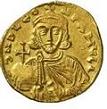

On Apr. 9, 715 Pope (since 708) Constantine was killed in Rome by mutinous troops, and on May 19 Pope #89 (St.) Gregory II (the Younger) (Dialogus) (-731) was elected, becoming the largest landowner in Italy; Duke Theodo II of Bavaria traveled to Rome to confer with him, a first for a Bavarian duke. In 718 English Benedictine monk St. Boniface (673-755) (Winfrith) (Wynfrith) (Winfrid), who became abbot of the monastery in Nursling, Hampshire in 717 was authorized by Pope Gregory II to preach Christianity to all the tribes of Germany, causing him to begin missionary work on the E frontiers of the Frankish kingdom among the Germans, followed by Thuringia, Bavaria, Friesland, Hesse, and Saxony, becoming the Apostle of Germany; in 722 he was made a bishop. In 726 Byzantine emperor (717-41) Leo III the Isaurian (Isaurican) (680-741) and his son Constantine V issued an edict forbidding veneration of sacred images (icons) (based on Exodus 20:3-5), followed by another ordering their destruction, pissing off the pop. and starting the Iconoclasm (Gr. "image breaking") War (ends 787); pressure from the Muslim pop. made them do it?; meanwhile Leo III attempted to crack down on Italy and make it obey him rather than the pope as secular prince, levying heavy taxes on the great landowners, which really got to Pope Gregory II, biggest landowner of all. In 730 Gregory II convoked a synod which condemned iconoclasm as heretical and excommunicated all iconoclasts incl. Leo III; too bad, the messengers carrying the papal letter were arrested in Sicily, and the letter never made it to Constantinople; Leo III kept the heat on, sending troops on search-and-destroy missions for sacred images hidden in lofts and wells and under beds, and removing the Roman province of Illyria (which later became Bulgaria) from papal jurisdiction, which the pope didn't much object to, later proving to be a mistake when Bulgaria goes Greek Orthodox. On Feb. 11, 731 Pope (since 715) Gregory II died, and on Mar. 18 Pope #90 (St.) Gregory III (-741) was elected, excommunicating all iconoclasts, confirming the split with the Byzantine Church, and opening the doors to the papal pipe dream of a revivified Western Empire with pope slash emperors at the helm.


On Nov. 28, 741 Pope (since 731) Gregory III died after being defeated and humilated by his enemies the Byzantine iconoclasts, weakening the papacy and opening the way for the final Lombard advance on Italy, and on Dec. 3 Pope #91 (St.) Zachary (Zacharias) (Zacharius) (690-752), a Greek born in S Italy and known for his trans. into Greek of "The Dialogues of St. Gregory the Great" was elected. In 751 Charles Martel's son Pepin III the Short, mayor of the palace sent letters to Pope Zachary asking him who is the true king of the All-Meat Franks, the man who holds the power (him), or the weak figurehead weenie-roaster royally-blooded Merovingian king (descendant of Clovis) Childeric III; when Pope Zachary says go for it, and his successor Stephen II seconds it "because he was not useful" (quia non erat utilis), Childeric III was dethroned and tonsured (deposit et detonsit) (his long hair being a symbol of his dynasty and royal rights, like the Beatles, er, Sampson?), and Pepin III the Short (Younger) (714-68) was elected as the new king of the short, er, Franks (first Carolingian king) at a gathering of Frankish nobles in the Merovingian capital of Soissons, and anointed and crowned at the Abbey of St. Medard, officially deposing Childeric, who is packed off to the Monastery of Saint-Bertin next year with his son Theuderic (Saint-Omer and Saint-Wandrille?); the Merovingian Dynasty (founded 496) ended, and the Carolingian (Carlovingian) Dynasty (House of Pepin) was founded (ends 987); Pope Zachary became the first Roman pontiff to invest a sovereign, laying the foundation for future papal temporal authority and creating strong bonds with the Carolingians to back them up; Franks and Kraut, er, France and Germany stayed united until the death of Peptol-Bismol, er, Pepin's grandson Louis I in 840.


On Mar. 15, 752 Pope (since 741) Zachary (b. 690) died after persuading the Lombards to quit occupying papal bldgs. in Italy and restore many territories and towns to the Church, and on Mar. 22-23 a priest named Stephen was elected Pope #92 Stephen II, then died in a few days (Mar. 25-26) unconsecrated, and on Mar. 26 Pope #93 Stephen III (II) (-757) was elected (forever confusing people with the II or III bit?); the Sedia Gestatoria was ditched when the people of Rome carried him around on their shoulders; he crossed the Alps into France to implore Pepin II the Short, who was officially elected king by the Frankish magnates that year to defend Rome from Lombard attacks - since as a dwarf he'd know all about being carried around on peoples' shoulders, and those tall guys' ass crack odor probably got in his nostrils? On Aug. 12, 754 Carloman (b. 706), mayor of Austrasia died, and St. Boniface crossed the Alps to meet Pope Stephen III and anoint his brother Pepin III the Short as Patricius Romanorum (a Byzantine legal title, but what the heck, it's Franks?), thereby enabling the Carolingian Dynasty to supplant the Merovingian Dynasty with official papal sanction as regent and protector of Italy to bolster his title of king of all the Franks; Pepin in return promised the Church the lands in Italy which the Lombards had taken from Byzantium, then marched to Italy and defeated Aistulf in Rome, giving several lands in C Italy to the pope, incl. the Pentapolis and Ravenna (along with the exarchate), which became the Papal States, the later foundation of the temporal power of the papacy (until 1870). In 755 English missionary St. Boniface (b. 673) was martyred by a band of pesky pagan Frisians in Dokkum, West Friesland (modern-day Holland). In 756 the Lombards under Aistulf attacked Rome but were defeated by Pepin the Short, who reduced Lombardy to a vassal state, then handed control to Pope Stephen III, who became the first pope-king; the Donation of Pepin gave the reconquered lands officially to the Byzantine emperor, but tacitly recognized the claims of the papacy as heirs of the Roman Empire in Italy; from then on the Carolingians maintained a protectorate over the papacy, developing a mental complex that they and their French language and culture were the class of Europe, superior especially to the Germans which they sprang from.



On Apr. 26, 757 slap-happy King, er, Pope (since 752) St. Stephen III died, and on May 29 his brother became Pope #94 (St.) Paul I (-767). On June 28, 767 Pope (since 757) Paul I died, and on July 5 Pope #95 Constantine II (-768), brother of Toto of Nepi forcibly claimed the papal throne. On July 31, 768 Pope (since 767) Constantine II was deposed by papal pretender Philip, then killed on Aug. 6, and on Aug. 7 Pope #96 Stephen III (IV) (720-72) was elected.

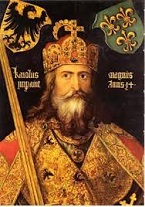
On Jan. 24, 772 Pope (since 768) Stephen III (IV) died, and on Feb. 1 Pope #97 Adrian (Hadrian) I (-795) was elected, reigning over 23 years, the longest for the next millennium (when Pius VI beats him by 6 mo.), going on to found the temporal sovereignty of the popes by using Frankish king (768-814) Charlemagne (Carolus Magnus) (Karl der Grosse) (Charles the Great) (742-814) to get the pesky Lombards out of the way, and restored the walls of Rome along with the aqueducts. In 773 Charlemagne broke off his attack on the pesky pagan Saxons to invade Italy allegedly to answer an appeal from Pope Adrian I to repel an attack by Desiderius, but really to achieve the big dream of conferring imperial status on the Franks as the nearest substitute to the wet dream of a papacy that rules everybody and everything secularly and religiously. In June 774 after a 9-mo. siege, Charlemagne took starving Pavia, captured his father-in-law Desiderius, declared himself king of the Lombards, and forced him to retire to a monastery; Desiderius' son Adalgis (-788) held out in Verona, then fled to Constantinople to seek aid; Charlemagne then conquered Spoleto and Benevento, and began to annex the Lombard Kingdom (N half of Italy), claiming the Lombard crown, making Bologna a free city, then visited Rome and confirmed his daddy Pepin the Short's 756 donation of territory to the pope while making it plain that he's sovereign even in the papal lands, allowing the pope a primacy in honor only, like the Byzantines did; meanwhile the pope was finally rid of the pesky Lombards and Byzantines (and their hated exarch), allowing him to keep the peninsula from being united in a centralized secular govt. until the 19th cent.; the Carolingians (successors of Charlemagne) became Italy's protector against all attackers (esp. the Muslims) until they became kaput in 987, while participating in papal elections.
In 778 Pope Hadrian I in a letter to Charlemagne first indirectly mentioned the dubious document known as the Donation of Constantine (Constitutum Domini Constantini Imperatoris), dated Mar. 30 (of 315/317?), granting to the papacy "the city of Rome, and all the provinces, places and cities of Italy and the western regions" (the Papal States), claiming that Emperor Constantine I the Great resigned his title of emperor and donated it to the pope, who returned it to him with the implication that it is forever the pope's to give and take away; it also claims that Constantine I already gave the lands to the popes and that Pepin was merely restoring them; it is exposed as a forgery in 1440 by Lorenzo Valla; meanwhile the papacy tries to steal the imperial title from the Byzantine emperor and give it to the Frankish Carolingian kings by using the DOC as justification; the pope stops dating papal documents by the emperor's regnal year and begins using Charlemagne's; by next decade the popes begin sending official announcments of their election to the Frankish kings instead of the emperors.

In 787 the Second Council of Nicaea (Seventh Ecumenical Council) (last council with reps of the churches of Rome and Constantinople), called by Byzantine Empress (since 780) Irene (752-803) supports her view of the veneration due to sacred images and icons, and regulates them, claiming to end the Iconoclasm War (begun 726) and reunite the Eastern and Western Catholic Churches; too bad, her successor Emperor Nicephorus is an iconoclast, and ramps the war back up; the Nicean Church where the council was held was turned into a mosque after the Muslims conquered it in the 14th cent.

On Dec. 25, 795 Pope (since 772) Adrian I died, and on Dec. 26 Pope #98 (St.) Leo III (750-816) was elected, sending the keys of St. Peter's Tomb and a banner to Charlemagne as the symbols of his sovereignty in Rome as king of Italy. On Apr. 25, 799 Pope Leo III was attacked by employees of Pope Adrian I's jealous nephews on his way towards the Flamian Gate during the St. Mark's Day procession, dashed to the ground, and his eyes and tongue attacked in an unsuccessful attempt to root them out, and he completely recovers and flees to Charlemagne for protection.
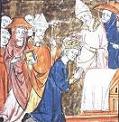
The Lion Trinity is born in Rome? On Dec. 23, 800 after being sent back to Rome by Charlemagne and kept in protective custody, Pope Leo III clears himself of Roman accusations of moral turpitude and is reinstated; on Dec. 25, 800 (Christmas Day) Frankish king (since 768) Charlemagne (Carolus Magnus) (Karl der Grosse) (Charles the Great) (742-814) is crowned emperor of Rome by surprise as he is kneeling in prayer in the 4th cent. Church of St. Peter in Rome before St. Peter's tomb, and triple-threat Leo III pops up from the shadows and places a crown on his head, hailing him as Caesar and Augustus, with the rehearsed clergy and people shouting "Charles Augustus, crowned great and peace-loving emperor of the Romans, life and victory", causing Charlemagne to allegedly utter the soundbyte that he would never have entered the church that day if he had known the pope's intentions (he wanted to be crowned emperor in France sans the pope so he wouldn't owe him?); the term "Holy Empire" is used in 1157, and "Holy Roman Empire" in 1254; after trying to mollify the outraged Byzantines for stealing their imperial title by satisfying himself with "emperor, king of the Franks and Lombards", Charlemagne tries to erase the lost years since 476 C.E. and refound the Western Roman Empire (ends 1806), while his master the pope tries to make himself the supreme bishop of Christendom, reserving the title of Pope (Papa), and introducing azymes (unleavened bread) into the Eucharist; too bad, Leo III becomes the only pope in history to bow before an earthly king, but he later backtracks and asserts the right of popes to crown all emperors, who must bow before them, and later artists redraw the scene to make it PC; too bad, after stirring up the Norse Vikings, the resurrected Western Empire lasts less than 30 years after Charlemagne's 814 death (until 843); at first the game is to challenge the Byzantine emperor's claim of universal temporal sovereignty and not get their butts kicked, and of course he refuses to recognize Charlemagne's newfangled imperial title, but Big C starts out to change their minds the tried and tested way with negotiations to marry Byzantine Emperor (since 797) Irene and unite the two empires (she proposed to him); too bad, she was deposed and exiled to Lesbos in 802.
In 809 Charlemagne, who could read but not write, and "wanted to add a word or two to the creed, just as the Emperor William II wanted to write operas and paint pictures" (H.G. Wells) proposed at the Synod of Aix-la-Chapelle (Aachen) to adopt the filioque (the words "filio que" added to the Nicene Creed), so that the Holy Spirit proceeds from the Father and the Son instead of the Father alone, but Pope Leo III rejected it, after which it was deliberately reinstated to force a break with the Greek Church?


On June 12, 816 Pope (since 795) Leo III (b. 750) died, and on June 22 Pope #99 Stephen V (IV) (-817) was elected, travelling to Rheims to crown Charlemagne's son Louis (Ludwig) I the Pious (the Fair) (the Debonaire) (778-840) as HRE in Rheims, strengthening the papacy by making his presence at imperial coronations seem like a requirement; not satisfied with that, he makes a play, and even though Louis I's daddy Charlemagne schooled his son to take the crown from the altar and crown himself, he whimps out when the pope objects and lets him do it; not being called the Pious for nothing, Louis I gets rid of his father's mistresses, banishes his loose unmarried sisters to nunneries to stop the dirty business of marrying them off for political reasons, reforms the Church, and gives aid to the poor, all of which is too Christlike to keep his daddy's empire up to its old Roman glory, and it begins to decline in importance.






On Jan. 24, 817 Pope (since 816) Stephen V died, and on Jan. 25 Pope #100 (St.) Paschal I (-824) was elected, and Louis I the Pious gave him the islands of Corsica and Sardinia, with the Pactum Hludovicianum confirming papal territory; Paschal liked to dig up the catacombs, eventually "translating" some 2.3K martyrs. On Feb. 11, 824 Pope (since 817) Paschal I died, and on May 11 (June 6?) Pope #101 Eugene (Eugenius) II (-827) was elected, going on to found seminaries, along with the Roman Curia. In 826 he held a council in Rome, which decreed that ignorant bishops and priests are to be suspended until they acquire sufficient learning. On Aug. 27, 827 Pope (since 824) Eugene II died, and on Sept. 1 Pope #102 Valentine (-827) was elected, living less than 1 mo. (rules for 40 days?) before dying on Sept. 16; on Sept. 20 Pope #103 Gregory IV (-844) was elected. On Jan. 11, 844 Pope (since 827) Gregory IV died, and archdeacon John was proclaimed pope by popular acclamation, but in Jan. Roman noble Sergius was elected Pope #104 Sergius II (-847) by the nobles, intervening to save John's life, after which Sergius was consecrated by the nobles without seeking ratification by the Frankish court.

In 846 the Muslim Arab Saracens sacked Brindisi on Italy's heel, and conquered Taranto (until 880); on Aug. 28 another force from Sicily sailed up the Tiber River and attacked Rome, and sacked it and stripped its treasures, incl. St. Peter's Church, which they desecrated, until the Lombard army of Duke Guy (Guido) I of Spoleto (-860) arrived and chased them to Gaeta, where naval reinforcements from Naples led by Duke Sergius I Naples arrived just in time, defeating them in the naval Battle of Licosa Point off Paestum; the Muslims destroyed a Venetian fleet, but in Nov. a storm damaged their fleet, and their great invasion of the pope's home base fizzled. On Jan. 27, 847 Pope (since 844) Sergius II died, and on Apr. 10 the son of Radoald was elected Pope #105 (St.) Leo IV (-855) (four straight sainted Leos), building the 1-mi. Leonine Wall W from the Castle of Sant'Angelo (N of St. Peter's Church on the Vatican Hill) (finished 855) in case the pesky Muslims return, and refurbishing and embellishing St. Peter's.

On July 17, 855 Pope (since 847) Leo IV died, and in Aug. Bibliothecarius was elected Pope Anastasius, but he was invalidated in Sept., and on Sept. 29 Pope #106 Benedict III (-858) was elected.



Eggs Benedict jokes here? In 857 (1099?) is the alleged date of the death of Popess (Pope) Joan (Johanna) (John Anglicus), a covered-up real or legendary female pope in drag, who studied in Fulda, became a top scholar, then went with her lover to Athens in drag to study science, then to Rome, becoming secy. to the Roman Curia, then a cardinal, before being elevated in 855 to pope, and after 2.5 years in office unexpectedly gave birth to a child (by papal librarian Anastasius, who briefly was antipope?) in the middle of the street while walking (atempting to mount a horse) on the narrow Via Sacra near the Colosseum (which later becomes Vicus Pulchisa or Shunned Street) en route to the Vatican from the Lateran, causing the enraged mob to tie her by the feet to a horse's tail and drag and stone her for half a league, and future popes to detour to the right to avoid the street, and a special porphyry marble chair to be constructed with an open crotch seat so that the pope's testicles can be verified during coronation ("testiculos habet"); a bust of her is later relabelled Pope Zacharias? - the 007 of popes?



On Apr. 17, 858 Pope (since 855) Benedict III died, and on Apr. 24 Pope #107 (St.) Nicholas (Gk. "people of victory") I (the Great) (-867) was elected with the influence of HRE (855-75) Louis II the Younger (825-75), who just happened to be in the neighborhood of Rome, and later led the pope's horse for some distance in his camp; he became one of the only "great" popes between Gregory I and Gregory VII, originating the policy that no bishop may be elected or deposed without papal approval - hang your stockings with care?
In 863 a synod held in the Lateran sided with Ignatius and condemned Photius, and when Byzantine emperor Michael II refused to reinstate Ignatius, Pope Nicholas I excommunicated Photius, who refused to step down, after which Michael II threatened the pope with military action to depose him, beginning the Photian (First Great) Schism of the Catholic Church; the pope sent a reply pointing out that the emperor had submitted to the invading Slavs and Saracens, with the soundbyte "Yet while these pagans with impunity conquer, burn, and lay waste [your territories], we, Catholic Christians, are menaced with the vain terror of your arms. Ye release Barabbas, and kill Christ" - the wizard wars begin?

In 863 Greek brother missionaries ("the apostles of the Slavs") (monks from Salonika) (St.) Cyril (Constantine) (826-69) and (St.) Methodius (815-85) were sent by Pope Nicholas I to Moravia, and begin making converts.



In 867 after a pissing contest with rival Ignatius, son of Emperor Michael I, who had been deposed for condemning PM Caesar Bardas (brother-in-law of Empress Theodora) for divorcing his wife to live with the widow of his son, and was backed by Pope Nicholas I, Patriarch of Constantinople (since 857) Photius (815-97) excommunicated Pope Nicholas I, who returned the favor, and the Photian Schism between the Roman Catholic and Greek Orthodox Churches began; it was saved when Basil I became emperor in 867 after murdering Bardas and Emperor Michael III, and deposed Photius and restored Ignatius, only to see him die soon afterward in 877, causing him to restore Photius anyway. On Nov. 13, 867 Pope (since 1858) St. Nicholas I died, and on Dec. 14 75-y.-o. Cardinal Adrian was elected Pope #108 Adrian (Hadrian) II (792-872).
On Oct. 5, 869 the (last) Eighth Ecumenical Council (Fourth Council of Constantinople) (Ignatian Council), called by Byzantine Emperor (867-86) Basil I the Macedonian (811-86) over the Photian Schism opened at St. Sophia Church (ends 870); Photius was tried, condemned, and excommunicated, but got reinstated in 877 with the approval of Pope John VIII, but in Nov. 879 he reconvoked the Eighth Ecumenical Council at St. Sophia Church, which undid everything done by the council of 869, after which Pope John VIII excommunicated him, the patriarch returned the favor, and the schism was back on until ?; the two churches first began to be known as Roman Catholic and Greek Catholic; from then on all ecumenical ("empire-wide") councils were called by the Roman popes not the Byzantine emperors (first in 1123).
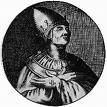

On Dec. 13, 872 Pope (since 867) Adrian II died, and on Dec. 14 Pope #109 John VIII (-882) was elected, defeating an Arab attack on Rome in 876 at the naval Battle of Circeo, then in May 878 taking refuge from the Saracens in Arles, where he was sheltered by Boso V (-887), who in 879 became Frankish king #1 of Provence.





On Dec. 16, 882 Pope (since 872) John VIII died, and the same day Pope #110 Marinus I (-884) was elected. On May 15, 884 Pope (since 882) Marinus I died (poisoned?), and on May 17 Pope #111 (St.) Adrian (Hadrian) III (-885) was elected. In Sept. 885 Pope (since 882) St. Adrian III died in San Cesario on a trip to visit Charles the Fat in France, and in Sept. Pope #112 Stephen VI (V) (-891) was elected. On Sept. 14, 891 Pope (since 885) Stephen VI died, and on Oct. 6 Pope #113 Formosus (816-96) was elected. On Apr. 4, 896 Pope (since 891) Formosus died, and in Apr. Pope #114 Boniface VI was elected, serving only 15 days; in May Pope #115 Stephen VII (VI) (-897) was elected; furious with his choice of Ahnuld, er, Arnulf of Carinthia for HRE, he convened the Cadaver Synod, which ordered the body of Pope Formosus to be exhumed, dressed in pontifical vestments, placed on the papal throne in the Lateran, and put on trial (a teenie deacon hides behind him and acts as his voice?); after he was condemned, his appointments were invalidated, his blessing fingers (first three on right hand) hacked off, and his body stripped to a hair shirt and thrown into the Tiber River - no broomstick up his ass?



In Aug. 897 Pope (since 896) Stephen VII was deposed by an insurrection, dressed in a monk's habit, thrown into a dungeon, and strangled, and in Aug. Pope #116 Romanus (-897) was elected, and died in Nov.; in Nov. Pope #117 Theodore II (-897) was elected, and died 20 days later - bad year to be elected pope? In Jan. 898 John of Tivoli was elected Pope #118 John IX (-900).
This brings us to the Millennium Fever Maximus 10th cent., where some went thisaway, others went thataway, and some just went all-out into sin and partied hearty, especially in Ground Zero, the Celestial Sin City of Rome, where the papacy lost the protective power of the crumbling Frankish Carolingian monarchy (ended 987), and was kicked around by the Roman nobility until the middle of the 11th cent.; in the first half it resigned itself to the End of Days being near, not by becoming repentant and holy, but by trying to see if it could become as corrupt as Hell? As H.G. Wells puts it, "The state of Rome in the tenth century is almost indescribable."

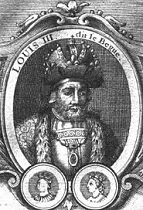


In Jan. 900 Pope John IX (since 898) died, and in May-June (Feb. 1?) Pope #119 Benedict IV (-903) was elected. In 901 Louis III the Blind (880-928), son of Boso I of Provence was crowned HRE by Pope Benedict IV (until 905), appointing German nobleman Theophylact as military head of Rome before he left, who set up permanent shop as Count Theophylact I of Tusculum (863-925), controlling election to the papacy and letting his former ho wife Theodora talk him into putting her lovers on the papal throne, bringing the wonderful artist-formerly-known-as era of the Papal Pornocracy (Rule of the Hos) (904-63) - welcome to The View? In Aug. 903 Pope (since 900) Benedict IV died, and in Aug. Pope #120 Leo V (-903) was elected, then was assassinated after ruling for 30 days in riotous Rome; Pope Christopher was elected in Sept. In Jan. 904 Pope (since 903) Christopher was invalidated, and on Jan. 29 Pope #121 Sergius III (859-911) (a known pedophile, enjoying sex with underaged girls) was elected; his 15-y.-o. mistress Marozia (890-937) (daughter of Count Theophylact of Tusculum and Theodora) became the mother of Pope Paul XI, aunt of Pope John XIII, and grandmother of Benedict VI.

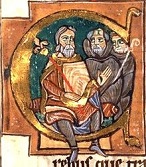
On Apr. 30, 909 William I "the Pious", Duke of Aquitaine, Count of Auvergne (875-918) founded the Benedictine Cluny (Gael. "from the meadow") Abbey in Burgundy on the site of his hunting lodge, consecrated to St. Peter and St. Paul, led by abbot #1 (until 925) (St.) Berno of Baume (850-927) under direct papal jurisdiction, but with the pope's hands tied with respect to the power of transferring title or appointing an abbot without the consent of the monks, going on to become the #1 monastery in Europe within a cent. by benefitting from the lack of oversight from anarchic Rome, choosing abbots of high social backgrounds, and allowing affiliates to accept royal patrons, with the abbots becoming internat. statesmen, reaching its max influence from the mid-10th cent. through the 12th cent.; the first female members were admitted in the 11th cent.; Berno institutes the Benedictine Cluniac Reforms; for awhile the duke forgets to remove his hunting dogs to make room for the monks.







On Apr. 14, 911 Pope (since 904) Sergius III died, and in June Pope #122 Anastasius III (-913) was elected. In June-Aug., 913 Pope (since 911) Anastasius III died, and in Aug. Lando of Sabina, son of Taino was elected Pope #123 Lando (-914), becoming the last pope not to adopt a name used by a predecessor (until ?) - the original Lando Calrissian? In Mar. 914 Pope (since 913) Lando died, and in Mar. archbishop John of Ravenna was elected Pope #124 John X (-928) after his babe Theodora, ruler of Rome had him transferred and talked her hubby Count Theophylact I of Tusculum into it - reversing the usual roles when sleeping one's way to the top? In June 915 after getting fed-up with their raids, the Battle of Garigliano near Minturno (modern-day Lazio) in WC Italy (ancient city of Minturnae) on the Garigliano River saw the Christian League of Mezzogiorno (S Italy), formed and led personally by Pope John X, incl. Landulf I of Benevento and Capua, Guaimar II of Salerno, John I and his son Docibilis of Gaeta, Gregory IV and his son John of Naples, plus forces of Italian king (since 888) Berengar I from Spoleto and the Marche led by Duke Alberic I of Spoleto and Camerino, plus Byzantine forces from Calabria and Apulia under Bari strategos Nicholas Picingli siege the pesky Muslim fort, push them to the nearby hills until they run out of food, and capture or kill them all as they make a run for the coast to escape to Sicily; in Dec. big hero Berengar (Berengarius) I of Italy (845-924) was crowned HRE by Pope John X (until Apr. 7, 924). In May 928 after Pope (since 914) John X was arrested in the Lateran and imprisoned in Castel Sant'Angelo by Marozia (daughter of his mistress Theodora) and her new hubby Guy of Tuscany (-929), he was smothered, and Marozia seized power, getting puppet Pope #125 Leo VI (-928) elected in May; he died in Dec., and in Dec. puppet Pope #126 Stephen VIII (VII) (-931) was elected. In Feb. 931 Pope (since 928) Stephen VIII died, and in Feb.-Mar. Pope #127 John XI (910-35), illegitimate son of Pope Sergius III and Marozia (daughter of John XI's mistress Theodora of Rome) was elected, and mommy Marozia ran both Rome and him. In Dec. 932 after King Hugh of Italy slapped him at the wedding, Alberic II stirred up a Roman mob to overthrow him and his mommy Marozia, and he became ruler of Rome (until 954), marrying Hugh's daughter Alda in 936, who gave birth in 937 to son Octavian (later Pope John XII) whom Alberic nominated as pope on his deathbed in 954.


In Dec. 935 Pope (since 931) John XI died, and on Jan. 3, 936 Pope #128 Leo VII (-939) was elected. On July 13, 939 Pope (since 936) Leo VII died, and on July 14 Pope #129 Stephen IX (VIII) (-942) was elected - poor coverup for Pope Joan here?


In Oct. 942 Pope (since 939) Stephen IX died, and on Oct. 30 St. Ciriacus was elected Pope #130 Marinus II (-946), setting out to restore Rome as the moral capital of the world before the Big Three Cherries, although he must not be able to count since he's way too early :). In early May 946 Pope (since 942) Marinus II died, and on May 10 Pope #131 Agapetus (Agapitus) II (-955) was elected.
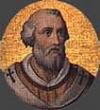

In Oct. 955 Pope (since 946) Agapetus II died, and on Dec. 16 18-y.-o. Octavius (Ottaviano), son of Alberic II, and grandson of Marozia was elected Pope #132 John XII (937-64); a foot-long bisexual and avowed atheist known for his dozens of lovers of both sexes, incl. his father's former concubines, whom he rewards with tracts of papal land, he turned the Lateran into a brothel, summoned the Devil during one of his orgies, and became known for molesting female pilgrims in er, St. Peter's Church, then having a cardinal castrated for criticizing him; he began the papal practice of choosing dual names - good idea for an adulterer? Does XII or Octavius mean the number of inches?


A new kink in the chain of fools in Rome? In the 960s the Crescentii (Crescenzi) Clan took over Rome and the papacy (until 1012), with the Ottaviani subclan dominating the city of Rome, and the Stefaniani subclan dominating the Sabine region. On Feb. 2, 962 after being invited to Rome by grateful Pope (since 955) John XII (937-64) to end the feudal anarchy of Rome and revive the dead (since 924) Holy Roman Empire (ends 1806) (which is only called the Roman Empire until 1157) as its new Charlemagne, Pope John XII crowns German king (since 936) Otto (Otho) I (the Great) (912-973) as Roman emperor of the West, and crowns his wife (St.) Adelaide (931-99) as empress, shifting the old Roman-Frankish alliance to Roman-German; too bad, the resurrected Roman Empire Pt. III gets off on the wrong foot when this pagan-inside Saxon lets it go to his head and considers himself higher than the pope, ordering all future bishops of Rome to swear fealty to him while claiming the right to approve papal elections, starting a perennial fight which takes until 1122 (Concordat of Worms) to work the bugs out of, even worse, an eternal struggle for supremacy between pope and emperor, which the pope usually wins at the expense of making the emperors and nationalists bitter, leading to the Protestant Reformation of the 1500s. In 963 after HRE Otto I the Great sieges Berengar II in San Leo, and Pope John XII enters into negotiations with his son Adalbert, Otto I made his 3rd expedition to Italy, deposed John XII, and on Dec. 4-6 put Antipope Leo VIII (-965) on the papal throne, then negotiated unsuccessfully with Byzantine emperor Nicephorus II for an alliance between the Eastern and Western empires.



On May 14, 964 after being found guilty in absentia of incest, adultery, and murder, and excommunicated, Pope (since 955) John XII died from the effects of a beating at the hands of a man who eight days earlier found him in bed with his wife (bashed in the head with a hammer?); when the news reached Rome, they considered him to be lucky to die in bed, even though not his own?; on Mar. 1 the Romans expelled Antipope Leo VIII, and on May 22 elected Benedictus Grammaticus Pope #133 Benedict V (-965); Otto I marched on Rome and captured Benedict V on June 23, then took him to Hamburg. On Mar. 1, 965 Antipope (since 963) Leo VIII died, and on July 4, 965 Pope (since 964) Benedict V died in Hamburg; on Oct. 1 John Crescenzi, bishop of Narni was elected Pope #134 John XIII (-972), going on to try to best Pope John XII (by 1 inch?) with his adulterous exploits, incl. with his father's concubine and his own niece, hanging a city prefect by the hair from the big bronze statue of Marcus Aurelius. On Sept. 6, 972 after introducing the custom of blessing and the naming of bells, Pope (since 965) John XIII was murdered by a husband who caught him bonking his wife.



On Jan. 19, 973 Benedict of St. Theodore, son of Hildebrand was elected Pope #135 Benedict VI (-974). In 974 Roman adherents of self-styled Roman patrician John Crescentius II Numentatus (of the Marble Horse) (-998), son of Theodora, and brother of Pope John XIII stirred up an insurrection in Rome, threw Pope Benedict VI into prison in Castel Sant'Angelo, and in June created Franco as Antipope Boniface VII (-985); in July Benedict VI died in prison, and Boniface VII looted the treasury of the Vatican Basilica and fled to Constantinople; in Oct. Pope #136 Benedict VII (-983) was elected. On July 10, 983 Pope (since 974) Benedict VII died, and on Dec. 1 HRE Otto II selected Bishop Peter Campanora (Canepanova) of Pavia (a Lombard) to become Pope #137 John XIV (-984), the first non-Roman pope in a long time, which pissed-off the Roman pop., who invited Antipope Boniface VII back. On Aug. 20 after he returned to Rome from Constantinople and made him a prisoner, Pope (since 983) John XIV died in prison in Castel Sant'Angelo within 4 mo., and Boniface VII claimed to be pope again. On July 20, 985 Antipope (since 974) Boniface VII was murdered, and his body taken by a mob and dragged to the Lateran Palace, where it was thrown under a statute of Marcus Aurelius, and later given a Christian burial by clerics; in Aug. Pope #138 John XV (-996) was elected; on Jan. 31, 993 he became the first pope to canonize somebody, Bishop Ulrich of Augsburg.


In 996 16-y.o. Otto III (980-1002) reached the age of majority and began his rule, and was crowned king of the Lombards, then traveled to Rome to end rival John Crescentius II's sway and obtain imperial coronation from Pope (since 985) John XV, but the latter died first (Mar.-early Apr.), causing him to reside in Pavia until a new pope could be elected; on May 3 his learned Saxon 1st cousin Bruno of Carinthia was elected Pope #139 Gregory V (970-99) (1st German pope), and crowned HRE Otto III in Rome on May 21; not amused, John Crescentius II began a civil war in Rome (ends 998); meanwhile Otto III made Rome his imperial seat (unlike his grandfather Otto I, who chose Quedlinburg), striving to make it the capital of the Holy Roman (Western) Empire like in the good ole days.
In 999 the grip of Millennium Fever (MF) in Christendom is at 100% strength, with the faithful believing that the world will end in the Big Year 1K (Y1K), and many leaving their homes and giving all their belongings to the poor; the hysteria doesn't die down for at least four years; HRE Otto III stays close to the con in Rome; meanwhile China doesn't give a fart - maybe only after China is Christianized will the world have to worry about Christ coming back?

The first German pope is followed by the first French pope as the approach of the big 1000 causes the Italians to hide behind them? On Feb. 18, 999 Pope (since 996) Gregory V (b. 970) died, and on Apr. 2 HRE Otto III's tutor Gerbert of Aurillac was elected Pope #140 Tweety, er, Sylvester (Silvester) II (946-1003) (first French pope); Otto III, who just happened to be a learned mathematician and philosopher declared the 8th cent. Donation of Constantine to be a forgery; because he was learned and studied with the Muslim Moors he was regarded by the common people as a magician in league with the Devil, e.g., he is said to have tried to impose the Arabic (really Hindu) number system on Christians, incl. the newfangled zero, and to have invented the pendulum clock - that newfangled zero must have seemed groovy to the worldly, and pure terror to the pious? Otto and Sylvester worked to revive the ancient glory of Rome, and set up a Byzantine-style court ("Renovatio imperii romani"), with an imperial palace on the Aventine Hill, further alienating the Millennium Fever-struck Roman pop. - wonder why they're taking out 999-year leases and mortgages when the world is ending next year?

The dreaded and eagerly anticipated year 1000 arrived, when the world pop. was 200M-300M, incl. Constantinople: 300K, Rome: 35K, and Paris: 20K; the thriving Chinese Song Dynasty under Emperor Xianping was the world's most populous empire; the Muslim Umayyad Caliphate thrived in Spain, N Africa, the Middle East, and C Asia. The original myth of the female orgasm? This was the last year of the 10th cent. in the Julian Calendar as well as the last year of the first millennium, and was a leap year starting on Mon.; the papal chancery now dated all documents using the Anno Domini (A.D./B.C.) system for the Julian Calendar - perhaps they now can't cover up that the world has a long future ahead of it before (if ever) he comes baaack, but don't want the world to regress to the pagan state that existed before he arrived? The Terreur de l'An Mil (Millennium Fever) (MF) gave many in Christendom a big buzz, mainly in France, which used the Julian Calendar, and mainly among monks, since the clerks still used regnal years, although rumors spread to the gen. pop. The Early Middle Ages ended, and the High Middle Ages began, with major changes in W European life, incl. the rise of medieval communes, the resurgence of city life, the appearance of the burgher class, the revival of long-distance trade with the Mediterranean, the founding of the first univs., the rediscovery of Roman law, and the beginnings of vernacular lit.; meanwhile the Byzantine Empire enjoyed its Golden Age in Greece and Turkey. In this cent. the failure of Christ to return caused him to go from being portrayed as "Christ triumphant" to "the Christ of pain", becoming his main act by the 13th cent. Please allow me to introduce myself, I'm a man of wealth and fame? In 1000 "Emperor of the World" HRE Otto III made Rome the permanent residence of the HREs, then made a pilgrimage to Aachen, where he opened his hero Charlemagne's Tomb, and found him seated in a marble throne, which was used for the coronation of Holy Roman emperors for cents. - the heady power of the zero in the year one-zero-zero-zero, man this must be like being king of the world at the batting-1000 point in Christian history?
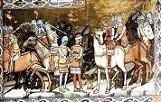
On Mar. 27, 1000 Pope Sylvester II granted the title of king (apostolic majesty) to Hungarian ruler (St.) Stephen I (the Great) (969-1038), and appointed him papal vicar for his new Roman Catholic country, with a mission to kick Orthodox Christian and pagan butt, then sent him a crown for his coronation on Dec. 25, 1001; St. Stephen I went on to found St. Peter and St. Paul Monastery in Buda.

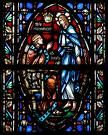

On May 12, 1003 Pope (since 999) Sylvester II (b. 946) died; on June 13, 1003 Crescentius II' son John got Pope #141 John XVII (-1003) elected, but he died on Nov. 6.; he then got Pope #142 (St.) John XVIII (-1009) elected in Jan. 1004. In July 1009 Pope (since 1004) John XVIII died, and on July 31 Peter Pig's Snout (Bucca Porci), son of Peter the Shoemaker was elected Pope #143 Sergius IV (-1012).
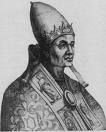
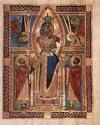
On May 12, 1012 Pope (since 1009) Sergius IV dies, along with the head of the Crescentii clan, giving the rivals their chance, and on May 18 Count Theophylact of Tusculum (son of Count Gregory of Tusculum) is elected Pope (#144) Benedict VIII (980-1024), becoming the first of the Tusculan popes (until Apr. 9, 1024), although he is a layman (being a count counted?); meanwhile on May 18 layman Antipope Gregory VI is crowned by a small faction, claiming to have been crowned first, and after being expelled from Rome he went to see German king (1002-24) (St.) Henry II (the Saint) (973-1024), who promised to look into his case while stripping him of his papal insignia. On Feb. 14, 1014 after Henry II went on his 2nd Italian campaign and expelled Gregory VI in favor or Benedict VIII, the latter crowned him HRE in Rome, and Henry II got the Nicene Creed inserted together with the filioque clause into the Roman Mass, going on to become the only German king to be canonised.


On Apr. 9, 1024 Pope (since 1012) Benedict VIII died, and in May his brother Romanus, another layman was elected Pope #145 John XIX (-1032), becoming the first pope to grant an indulgence in return for alms bestowed - give a mouse a cookie and he'll ask for a glass of milk? In 1025 Italian Benedictine monk Guido d'Arezzo (991-1050) wrote Micrologus, introducing the 4-line staff and solmisation (u, re, mi, fa, so, la, ti) to music, whose syllables are taken from the initial syllables of the first six verses of the hymn to John the Baptist Ut Queant Laxis: "Ut queant laxis, Resonare fibris, Mira gestorum, Famuli tuorum, Solve polluti, Labii reatum"; Pope John XIX invited him to Rome to explain it to him.





On Mar. 27, 1027 German king (since 1024) Conrad II the Salian (990-1039), husband of HRE Otto I's granddaughter was crowned HRE by Pope John XIX in Rome. In 1032 Pope (since 1024) John XIX died, and in Oct. he was succeeded by his 12-y.-o. nephew Theophylact (grandson of Count Gregory of Tusculum, who used his wealth and private army to get him elected) as Pope #146 Benedict IX (1020-85) (until 1045); the new testosterone-soaked (9-in. bent?) bishop of Rome became known for his dissolute life, bestiality, witchcraft and Satanism, and wild bisexual orgies, whooping it up and giving the Dark Ages a bad name, ordering murders while hiding in the Lateran Palace for fear of assassination. In 1043 Pope Benedict IX, known for hiding in the Lateran so he could indulge in total sexual degeneration finally had to celebrate a public Mass, and his enemies hatched a plot to strangle him with ropes hidden in their robes; too bad, "about the sixth hour of the day there occurred a solar eclipse which lasted until the eighth hour. All faces were as pale as death, and everything that could be seen was suffused with the colors of yellow and saffron" (Burgundian monk Radulfus Glaber), all of which gave the pope time to flee back to the basilica for safety. In Jan. 1045 24-y.-o childish, arrogant, cruel, bisexual orgy-loving Pope (since 1032) Benedict IX was driven from the city, and on Jan. 20 out of disgust with his reign Bishop John of Sabrina was elected Pope #147 Silvester (Sylvester) III (-1045); too bad, he died on Feb. 10, and Benedict declared him an antipope and claimed to still be pope, but in order that he might abdicate and still marry well, he sold the papacy for a large sum of money to his godfather, Archpriest John Gratian, who on May 5 became Pope #148 Gregory VI (-1046), the first Saxon pope and the first one to form an army.



On Apr. 10, 1046 Pope Benedict IX was reelected, and leaving three rival claimants for the papacy siting in Rome; in the fall German king (since 1039) Henry III (the Black) (the Pious) (1017-56) crossed the Alps at the head of a large army to straighten things out, making the three rivals depose themselves at a synod in Rome; on May 1 Pope (since 1032) Benedict IX resigned; Pope (since 1045) Gregory VI resigned at the Council of Sutri over accusations of simony, and died on Dec. 20; on Dec. 25 after visiting Archbishop Adalbert I of Saxony turned it down so he could continue converting the pesky pagan Wends, Henry III's choice, German (Saxon) bishop Suidger became Pope #149 Clement II (-1047) (2nd German pope), crowning Henry III as HRE in Rome; Clement II became the first of three reforming German popes, incl. Leo IX and Victor II, who affirmed the imperial right of nomination to the papacy. On Oct. 9, 1047 Pope (since 1046) Clement II died, and in Nov. diehard Pope Benedict IX seized Rome, reclaiming the papacy on Nov. 8. On July 17, 1048 after a session with St. Bartholomew, Pope (since 1032) Benedict IX resigned for the 4th and last time, and was replaced on July 7 by Poppo as Pope #150 Damasus (Damascus) II (-1048) (3rd German pope), ending the long era of the papacy being the political football of Roman families; too bad, he died 23 days later on Aug. 9 from malaria; still, Benedict IX learned his lesson and became a monk in St. Basil Monastery in Grottaferrata - where he got all the nuns and altar boys he wanted without having to put a wedding ring on their fingers first?


On Mar. 12, 1049 HRE Henry III's relative Bruno was elected Pope #151 Leo IX (1002-54) (4th German pope), launching needed reforms, causing the Church to reverse its moral degeneration for the rest of the cent. after being spurred by Italian churchman (St.) Peter Damian (Pietro Damiani) (1007-72) - he eats all the worms and spits out the germs?



Meanwhile the final East-West church split happened. In 1052 Constantinople Patriarch (since 1043) Michael I Cerularius (Caerularius) (Kerularios) (1000-58) closed down the Latin-rite churches in Byzantium for using unleavened bread in their rites, and in 1053 he declared war on the pope and the Roman Catholic Church via a letter condemning fasting on Saturday, celibacy, and the use of unleavened bread for the Eucharist. Meanwhile on June 18, 1053 after Pope Leo IX returned to S Italy with a Swabian-Italian army under Prince Rudolph of Benevento, and agreed to a joint attack with the Byzantines on the Normans at Siponto (Manfredonia), he was intercepted on the way by the Normans under Count Humphrey of Hauteville and Richard I Drengot at the Battle of Civitate (Civitella del Fortore), and the Normans slaughtered the pope's army even though they were outnumbered, and were inferior in stature to the German mercenaries; Pope Leo IX was captured by other Normans under Robert Guiscard (Lat. "the Fox") (1016-85) and forced to ratify their conquests in S Italy and pardon them, founding the Norman Kingdom of S Italy; the alliance between Duke William II the Bastard of Normandy (future William I the Conqueror of England) and HRE Henry III was broken, freeing William to invade England in 1066 - Pythagoras and Boudicca roll over in their graves? On Apr. 19, 1054 Pope (since 1049) Leo IX died, and the papal chair remained empty for a year. On July 4, 1054 Chinese astronomers noted a "guest star" in the constellation Taurus, the star Zeta Thauri in the Crab Nebula (later known as a source of gamma rays); it was visible in daylight for 23 days and at night for two years; American aborigines saw it, along with Arab astronomers, but no European recorded it - maybe this is a sign that a new country will be born on July 4 halfway to China in America, which will never be ruled by the ever-split Church? 900 years before Joseph McCarthy a demogogue accuses the Church of infiltration by agents of an evil power, and it ends up with no head? On July 16, 1054 after Byzantine patriarch (since 1043) Michael Cerularius disputed Pope Leo IX's claim to jurisdiction in S Italy over the Norman takeover, and lifestyle disputes over unleavened bread (azymes), celibate clergy, Saturday fasts et al. reached the breaking point, Constantiopole Studion monk Niketas Stethatos (Nicetas Pectoratus) wrote a bestseller, not stressing that, but instead attacking the Roman Catholics on theoretical lines, making a big thing of their addition in 633 of the 2-word "filioque" clause ("and from the Son") to the 381 First Council of Constantinople Creed, claiming it denies the supremacy of the Father in the Trinity (even though filio and non-filio churches had coexisted peacefully up till now?); after reading it and blowing his top, patriarch Michael Cerularius and his whole church were excommunicated by deceased Pope Leo IX's delegate, Benedictine cardinal Humbert of Silva Candida (Moyen Moutier), and he responded by excommunicating the pope and the entire Roman Catholic Church, and the hard-hearted Second Great Schism (last) of the churches of Rome and Constantinople began (ends 1965?); from now on the Greek Orthodox Church, led by the ecumenical patriarch of Constantinople rejected the supremacy of the Roman Catholic pope and the use of the word "purgatory", and only accepted the authority of its first seven ecumenical councils; Orthodox priests were permitted to marry, but only those from celibate monastic orders could become bishops (enjoying all the hos they can buy?); the major patriarchates were Constantinople, Alexandria, Antioch, and Jerusalem, with the Church of Russia added in 1598 - if you start me up, if you start me up I'll never stop?


In 1055 after a 1-year vacancy, Swabian count Gebhard was elected Pope #152 Victor II (1018-57) (5th and last German pope until 2005); continuing the reveral of moral degeneration by battling simony and clerical concubinage, and allying with HRE Henry III to protest the 1039 claim of Spanish king of Castile (since 1029) and Leon (since 1037) Ferdinand I the Great (1017-65) to be emperor of Spain, implying that he was usurping the HRE and claiming headship of all of Christendom.


In May 1056 HRE (since 1039) Henry III the Black (b. 1017) met with Henri I of France in Ivois, and the hotheaded French king challenged the German king to single combat, after which Henry III fled during the night back to Germany, falling ill on the way and dying on Oct. 5 in Bodfeld in the Hartz Mts.; he was succeeded by his 6-y.-o. son Henry IV (1050-1106), with his pious mother Empress Agnes (Gr. "pure") of Poitou (Poitiers) (1025-77) as regent (until 1065), who let the lay and clerical magnates sell the store, appropriating royal resources and sovereign rights with impunity.


On June 28, 1057 Pope (since 1055) Victor II (b. 1018) died in Tuscany, and on Aug. 2 (Feast of Pope St. Stephen I) Pope #153 Stephen X (IX) (-1058) was elected, going on to prohibit matrimony among blood relations - it took this long? On Mar. 29, 1058 Pope (since 1057) Stephen X died, and on Jan. 24, 1059 Gerhard of Burgundy (Gerard de Bourgogne), bishop of Florence was elected Pope #154 Nicholas II (-1061), holding an Easter synod which passed a new law requiring papal elections by cardinals only. In Aug. 1059 the Treaty of Melfi was signed by Pope Nicholas II and the Normans, making Robert Guiscard and Richard of Aversa, prince of Capua into papal vassals with the power to take S Italy from the Greeks, and Sicily from the Muslims; Apulia was given to Robert Guiscard and raised from a county to a duchy by the pope - you're the apulia of my eye?



On July 27, 1061 Pope (since 1059) Nicholas II died, and on Sept. 30 reform party leader Bishop Anselm the Elder of Lucca (favorite of Hildebrand) was elected Pope #155 Alexander II (-1073); too bad, on Oct. 28 an assembly in Basel of anti-reform German and Lombard bishops convoked by Empress Agnes (regent of HRE Henry IV), presided over by imperial chancellor Eilbert elected Bishop Peter Cadalus of Parma as Antipope Honorius II (-1072), and assembled an army to back him up. On Apr. 14, 1062 after the army of Antipope Honorius II, backed by Empress Agnes and the nobles marches to Rome to claim the papal seat from Pope Alexander II by force, and Alexander II's backer, rich converted Jew (baptized by Pope Leo IX) Leo de Benedicto Christiano (Benedictus Christianus) (past backer of papal candidate Gerhard of Burgundy AKA Pope Nicholas II, whose son Peter later became Antipope Anacletus II, other son Giordano became the first patrician of the Roman Commune in 1143, and daughter married Roger I of Sicily) tries in vain to stop them through negotiations, a short battle gives him control of St. Peter's Church, after which Duke Godfrey III (the Bearded) of Lorraine (997-1069) arrives in May and gets the rivals to let young German king Henry IV decide the matter, causing Honorius II to withdraw to Parma and Alexander II to return to his see in Lucca; too bad, Henry IV is kidnapped in Kaiserswerth (modern-day Dusseldorf) by his princes, led by anti-Honorius Cologne archbishop (1056-75) (St.) Anno II of Cologne (1010-75), who stage a coup, send Empress Agnes to a convent in Fructuaria in Piedmont, Italy, and assume the regency under Bremen-Hamburg archbishop (since 1043) Adalbert of Bremen-Hamburg (1000-72); Anno II and Adalbert divide the monasteries between themselves, later sharing with Mainz archbishop Siegfried I, further robbing the crown blind; meanwhile in Oct. the Council of Augsburg recognizes Alexander II as pope, and gets Honorius II excommunicated next year, which doesn't stop him from holding a counter-synod in Parma, telling them to piss off, and heading back to Rome, holing-up in the Castel Sant'Angelo, owned by Leo. In early Jan. 1068 Leo de Benedicto Christiano had the gates of the Leonine City thrown open for Duke Godfrey the Bearded of Lorraine and his wife Marchioness Beatrice of Tuscany, who immediately took over Tiber Island then attacked the Lateran, forcing Antipope Honorius II to flee back to Parma on Jan. 14, after which Leo allied with Hildebrand and Pope Alexander II against him, and he became kaput.
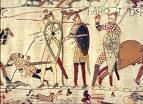

On Dec. 25, 1066 after an epic struggle to invade Saxon England over the Channel and conquer it that involved a comet and Pope Alexander II, French-speaking transplanted Norwegian Duke William (Guillaume) II the Bastard of Normandy was crowned William I (the Conqueror) (1026-87) at Westminster Abbey, after which the English kings used their isolated position off the W coast of Europe to thumb their noses at the popes worse every year until Henry VIII broke off completely in 1533.


On Apr. 21, 1073 Pope (since 1061) Alexander II died, and on Apr. 22 his faithful midget chancellor Hildebrand of Sovana was elected Pope #156 Gregory VII (1023-85) (until May 25, 1085), going on to initiate the Gregorian Reform to stamp out sin in the Church, incl. the keeping of wives and mistresses by priests, and work to make the papacy strong, clericalize the Church, and arrogate supreme authority to the papacy over all the rising rulers and princes around him, requiring them to literally kiss his foot, causing German bishops to oppose his confirmation; as a safety move, he prohibited Bible reading as leading to pesky heresy; meanwhile he kept his own mistress, Countess Mathilda of Tuscany (Canossa) (1046-1115), whose husband Duke Godfrey IV the Hunchback (-1076) spread stories about him being an atheist; not that he's all bad, since he gets off on scourging himself and watching others being scourged - sad reversal of the Jesus story? In 1074 he excommunicated mean old Norman Robert Guiscard, and also excommnicated all married priests - Jesus did not marry Mary Magdalene? In 1075 HRE Henry IV ignored German bishops and sanctioned Pope Gregory VII's confirmation, but after defeating some Saxon rebels he flopped, as the abolition of lay investiture (secular princes granting bishops and abbots the lands constituting their benefices along with the political rights and duties they exercise, incl. when the benefices are sold and free election of bishops is denied) would reduce his power in Germany, and began the Investiture Dispute (Controversy) (Contest) (ends 1122), one of the biggest church-state struggles in the Middle Ages; Gregory VII opened play by condemning the practice under penalty of excommunication, issuing the 27-point bull Dictatus Papae, formalizing the claims of world dominance of the Roman Catholic Church and the supreme authority of the popey pope pope pope over both church and state; no slouch himself, William I the Conqueror of England defied the pope and continued to control the appointment of English bishops and abbots, allowing no pope to be acknowledged without his consent, and forbidding the entrance of papal legates or letters into England without royal permission - love isn't enough to keep them together? In Jan. 1076 Pope Gregory VII was condemned by the German bishops at the Synod of Worms, and retaliated by dethroning and excommunicating Henry IV. In Jan. 1077 a faction of German nobles elected antiking duke of Swabia (1057-79) Rudolf of Rheinfelden (1025-80), brother-in-law of Henry IV with the approval of Pope Gregory VII's legates, but before the pope confirmed him, in Jan. excommunicated HRE Henry IV went as a penitent to Canossa Castle in Reggio Emilia, Italy and stood for three days in the courtyard bareheaded and barefooted awaiting an audience with the Christlike-not papa, who granted him absolution, causing the phrase "Going to Canossa" to be coined by Bismarck in the 1870s. Speaking of Christlike, in 1078 Pope Gregory VII prohibited Jews from holding offices in Christendom - Christ might get pissed? In 1079 Pope Gregory VII issued a decree regulating cathedral schools, paving the way for independent univs.

In Mar. 1080 Pope Gregory VII excommunicates and deposes HRE Henry IV again, but in June a synod of German and N Italian prelates deposes Gregory VII, electing reformer bishop (former friend of Gregory VII) Guibert or Wibert of Ravenna as Antipope Clement III (1025-1100) (until Sept. 8, 1100). On Mar. 21, 1084 HRE Henry IV captures Rome and imprisons Pope Gregory VII in Castel del Sant'Angelo; on Mar. 24 Guibert of Ravenna is enthroned as Pope Clement III at St. Peter's, crowning Henry IV as HRE; Henry IV and Clement III then invade Apulia and Tuscany, while Robert Guiscard's Norman army sacks Rome, causing a great fire, to the delight of their contingent of Sicilian Muslims; the horrors of the sacking cause Gregory VII to leave Rome with his allies; the five great imperial Roman Forums (Original, Caesar's, Augustus', Nerva's, Trajan's), which had survived all these cents. (with appreciable deterioration) are pretty much destroyed, and the remains partially buried, with the few habitable bdgs. turned into fortresses; Henry IV has the last laugh in the Investiture Controversy, allowing monastic brewing rights to be ignored or revoked and court brewhouses (Hofbrauhauses) to be established to cash in on some of that yummy money, after which many monasteries switch to wine growing, benefitting from the Medieval Warm Period (950-1250). On May 25, 1085 Pope (since 1073) Gregory VII (Hildebrand) (b. 1023) dies as the guest of the Normans in Salerno.

The Ronald Reagan of the Byzantines pumps up the defense budget while promising voodoo economics? On Apr. 1, 1081 after Byzantine gen. Alexius Comnenus revolts, seizes and plunders Constantinople with a force of mercenaries, and overthrows Nicephorus III, he is crowned as Byzantine emperor Alexius I Comnenus (Alexios I Komnenos) (1048/56-1118) (until Aug. 15, 1118), refounding the Comnenus Dynasty and turning it around, beginning the Komnenian (Comnenian) Restoration (ends 1185); too bad, he appeals to the pope to help stem the Seljuk tide, as everybody can see that the supposedly moribund divided Muslim empire not only has risen again but seems on the brink of destroying them all, leading to the First Crusade in 1096-9; the military aristocracy finally takes over the empire and promises big Vs in years to come, while Alexius I reforms the finances and uses the surplus to buy off his enemies?

On May 24, 1086 after Gregory VIII recommended him on his deathbed, and he stalled until the papal throne has been vacant for 12 mo. minus 1 day, Desiderius (Dauphar) (Dauferio) (Dauferius) Epifani, eldest son of Prince Landulf V (-1033) of Benevento, abbot of Monte Cassino 8 mi. S of Rome was forcibly dragged to the Church of St. Lucy and invested in the red cope with the name of Pope #157 Victor III (1026-87), starting a winnerless contest with Antipope (since 1080) Clement III (Guibert), who forced him to flee Rome on May 28, where he resigned in Terracina and retired to Monte Cassino for almost a year.
On May 9, 1087 after accepting reelection in Capua under pressure of Prince Jordan I of Capua, and being restored to power in Rome by the Normans, who drove Antipope Clement III's soldiers out of St. Peter's Church, Victor III (b. 1026) was crowned pope, then returned to Monte Cassino on May 17 while his troops took the Vatican, the Leonine City, and Trastavere, then answered a summons from his ally Countess Matilda of Tuscany to return to Rome, only to see the antipapal forces take St. Peter's Church back in late June, causing him to withdraw to Monte Cassino again; in Aug. a synod in Benevento renewed Clement III's excommunication along with lay investiture, and proclaimed a Crusade against the Saracens of N Africa; too bad, Pope (since 1086) Victor III (b. 1026) took sick and died on Sept. 16 - not even a pope can be in two places at the same time?
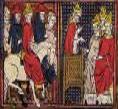
On Mar. 12, 1088 Odo (Udo) (Otho) (Otto) of Lagery (Chatillon) (a Cluny Benedictine monk born in Chatillon-sur-Marne) was elected Pope (#158) Urban II (1042-99) (2nd French pope after Sylvester II in 999) (Pope Urban I was in 220-30), continuing the fight with Antipope Clement III, excommunicating him and defeating his forces in Rome, and reexcommunicating Henry IV over his demands about investiture; meanwhile pissed-off Prague bishop Jaromir came to Rome to protest the new Moravian bishop Andrew I, then died in Esztergom in N Hungary as he prepared to fight him, causing Jaromir to storm off to Rome to protest to Pope Urban II; being from the Champagne region of NE France, the pope declared that the wine of Champagne (Ay) is the best in the world. In 1089 Antipope Clement III reclaimed Rome, and Pope Urban II anathematized him from outside the city walls, going into exile in S Italy for three years. In 1091 HRE Henry IV captured Urban II's supporter Matilda of Canossa, and in Oct. 1092 Henry IV's army was defeated by Matilda of Canossa's army at the Battle of Canossa, causing his son Conrad to switch sides, and by Easter 1094 he finally sat on the papal throne in Rome; meanwhile about this time Cardinal Deusedit pub. Libellus Contra Invasores et Symoniacos et Reliquos Schismaticos, giving him some ammo in the big fight, arguing that the temporal authority has no right of ecclesiastical investiture.
In 1095 Pope Urban II introduced the Callagium, an annual tax on clergy who keep mistresses, reducing their use while increasing clerical urban, er, metro, er, homosexuality?


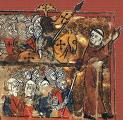



In 1095 the Fatimids of Egypt under emir (sultan) Aphdal take advantage of the quarrels among the Seljuks and take Palestine incl. Jerusalem and Tyre; Peter the Hermit (Peter of Amiens) (1050-1115), a priest of Amiens in Picardy (a former soldier under the counts of Boulogne, who took holy orders after his wife got old and ugly) visits the Holy Sepulchre in Jerusalem, gets pissed-off at the "sufferings of the natives and pilgrims of Palestine", and goes to ecumenical patriarch of Constantinople (1084-1111) Nicholas III Grammaticus (-1111) lobbying for Byzantine emperor (1081-1118) Alexius I Comnenus (Alexios I Komnenos) (1048-1118) to take it back, but is stonewalled, causing him to land in Bari and meet with Pope (1088-99) Urban II (Otto de Lagery) (1042-99), who shines to the idea, telling him to go out and preach the cause, which he does with gusto in Italy and France; "His diet was abstemious, his prayers long and fervent, and the alms which he received with one hand, he distributed with the other: his head was bare, his feet naked, his meagre body was wrapped in a coarse garment; he bore and displayed a weighty crucifix; and the ass on which he rode was sanctified, in the public eye, by the service of the man of God... every breast glowed with indignation when he challenged the warriors of the age to defend their brethren, and rescue their Saviour... The most perfect orator of Athens might have envied the success of his eloquence... and Christendom expected with impatience the counsels and decrees of the supreme pontiff" - Gibbon, Ch. 58; the whole story is phony baloney, made up by later writers as a coverup?; meanwhile, after receiving a letter from Byzantine emperor Alexius I seeking help against the Seljuks, Urban II hastily summons a church council to discuss the problem (really the opportunity to unite the two churches under himself); the 200-bishop, 4K-clergy, 30K-laity Council of Placentia hears Byzantine ambassadors pleading their Western European Christian brethren to come save Constantinople from the Turks, to take the battle to Muslim Asia before the Muslim Turks take the battle to Europe (later used by U.S. Pres. George Dubya Bush?), revealing the pope's true reason for the Crusade; like Bush, he wants Congress to approve it first, so he calls the 8-day Council of Clermont in Auvergne, France (his native country), which he attends on Nov. 27 with 13 archbishops, 225 bishops, and 400 priests, while thousands of adoring laity (plus lords and knights) attend; it proclaims the Truce of God (a suspension of hostilities four days of each week), places women, priests, husbandmen and merchants under the protection of the church from the current private wars, and the nine Christian Crusades to Jerusalem begin with the First Crusade when on Nov. 27 Pope Urban II gives a Killer Sermon, calling for an end to private wars among Christians and an all-out effort to sweep the Muslim infidels back and restore the site of the Holy Sepulchre into Christian hands, sweetened by a plenary (paid in full for all sins) indulgence for enlistment, telling them not to do it for vengeance but for contrition or penance; (you had to be there, but) as the crowd shouts "God wills it, God wills it!" (Deus vult, Deus vult!) (Deus lo volt) (Deix el volt), the pope exclaims, "And let this memorable word, the inspiration surely of the Holy Spirit, be forever adopted as your cry of battle, to animate the devotion and courage of the champions of Christ. His cross is the symbol of your salvation; wear it, a red, a bloody cross, as an external mark, on your breasts or shoulders, as a pledge of your sacred and irrevocable engagement"; after great numbers of clergy and laity get red and put the bloody cross on, and ask popey to lead them into battle, he, ahem, begs that his official duties preclude him from taking time from his busy schedule, and appoints Bishop Adhemar (Ademar) of Le Puy (-1098) (the first bishop he ever elevated) as his legate to the Crusades in Dec., and Count Raymond IV of Toulouse (Raymond I of Tripoli) (Raymond of Saint-Gilles) (1038-1105) as the military cmdr., with instructions to depart for the Holy Land on Aug. 15 of next year (Festival of the Assumption); meanwhile Urban II stays far from the action, traveling around in the rear giving more speeches to raise more suckers, er, soldiers and support; not to be left out, Benedictine brain man Guibert of Nogent (1055-1124) informs the Crusaders that Jerusalem must be seized as a necessary prelude to its eventual capture by Antichrist, followed by the Second Coming of Christ, with the soundbyte "The End of the World is already near" - he meant 1099, the next available Millennium Fever year?
By 1096 the Holy Roman Empire stretched from Italy to Jutland, but why not add the Holy Land, eh? In 1096 European Jewish merchants, finding it unsafe to do business because of the First Crusade resort to moneylending in a big way for the first time to finance Muslim butt-kicking - and it becomes a way of life for ever more?
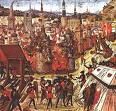
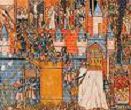

On Apr. 8, 1099 to satisfy skeptics of the Holy Lance, Peter Bartholomew was put through the "Trial of Ordeal" (fire) at the insistence of conniving Flemish priest Arnulf Malecorne of Choques (Rohes) (-1118), who hoped to take Adhemar's place in the Crusader ranks; Peter ran very smooth and very sexy through the 12-in. path in a 14-ft.-long pile of 4-ft.-high burning faggots, but was badly burned and died of his injuries on Apr. 20, and the Holy Lance "soon vanished in contempt and oblivion"; meanwhile after Jerusalem is captured Arnulf becomes Latin patriarch of Jerusalem #1 (and again in 1112-18) - Gibbon, Ch. 58. In May the ragtag Crusaders, 40K strong incl. 5K cavalry (knights) left Antioch to Laodicea, down the seashore through Tripoli, Tyre, Sidon, Acre, Ashkelon, and Caesarea to the brass ring city of Big J, Jerusalem, arriving with 1.5K cavalry and 12K healthy foot soldiers. through Tripoli, Tyre, Sidon, Acre, Ashkelon, and Caesarea to the brass ring city of Big J, Jerusalem. On June 7 after the Egyptian Fatimids under Caliph #9 Abul-Qasim Ahmad al-Mustali (Mostali) bil-Lah (1074-1101) offered safe passage to the Holy Sepulchre along with expensive gifts, all in vain, and the Crusaders waited 10 mo. after the defeat of Kerboga "to enjoy the luxury of Syria" (Gibbon), 13K Crusaders begin the Siege of Jerusalem (pop. 200K); the 40K Egyptian defenders under Iftikhar al-Dawla (Arab. "pride of the dynasty") defeated the early assaults while awaiting reinforcements, which were too late, allowing the Crusaders to conquer the city on July 15 after (you guessed it) 40 days; on July 15 First Crusade leader Godfrey (Godfroi) de Bouillon (1058-1100), duke of Lower Lorraine, whose camp was pitched on Mount Calvary entered Jerusalem, and his Crusaders merrily began a 3-day massacre of the pop., killing 70K for Christ (incl. driving quaking Jews to their synagogue then burning them alive), while the flag of Godfrey's Jerusalem Cross flew over the city; "If you want to know what was done to the enemies found in the city, know this, that in the portico of Solomon and in his Temple, our men rode in the blood of the Saracens up to the knees of their horses" - Godfrey de Bouillon and Raymond Daimbert, Letter to Pope Urban II from Jerusalem; "They went together through the streets with their swords and spears in hand. All that they met they slew and smote right down, men, women, and children, sparing none... They slew so many in the streets that there were heaps of dead bodies, and one might not go nor pass but upon them that so lay dead... There was so much blood shed that the channels and gutters ran all with blood, and all the streets of the town were covered with dead men." (William of Tyre, 12th cent.); the Crusaders took the crescent off the top of the Dome of the Rock and replaced it with a cross, then built a Christian altar, only to see the Muslims take it back in 1187 and reverse the process.

On July 29, 1099 Pope (since 1088) Urban II (b. 1042) died without learning the good news that his bloody red Crusaders won the Super Bowl after being pumped by his rave Clermont Council pep talk of 1095, and on Aug. 13 Italian Cluniac monk and cardinal (since 1076) Rainerius was elected Pope #159 Paschal II (-1118), carrying on Hildebrand's policy against secular investiture; Antipope (since 1080) Clement III had been beaten, and lost most of his influence, dying on Sept. 8, 1100 in Civita Castellana, after which bishop Theodorus of St. Rufina was elected antipope in his place, but never held any real power - you can't compete with a successful foreign war?






Where's my eye shadow? About 1099 (Crusader capture of Jerusalem) the Priory of Sion (scion of Zion?), a secret brotherhood to protect some kind of terrific secret about Jesus Christ being the secret husband of redheaded Mary Magdalene and leaving a sacred bloodline in S France was allegedly founded in Rennes-le-Chateau, France; a hoax spread by French draftsman Pierre Athanase Marie Plantard (1920-2000) in France in the 1950s, and fueled by English "Dr. Who" writer Henry Lincoln (Soskin) (1930-), who finds out that Rennes-le-Chateau master (1885-1917) Friar Francois-Berenger Sauniere (1852-1917) engaged in big spending, deducing that it came from money obtained from secret documents he sold, not knowing about a 1910 conviction for illegal trafficking in Masses?; in 1982 Lincoln, Michael Baigent (Michael Barry Meehan) (1948-2013) of New Zealand and Am.-born English writer Richard Harris Leigh (1943-2007) pub. The Holy Blood and the Holy Grail, after which in 2003 Am. novelist Daniel "Dan" Brown (1964-) pub. The Da Vinci Code, and they all begin dancing with the stars?
In 1108 Pope Paschal II left Rome to raise troops against rebels who were turning Rome into "the pit of daily rebellion" (Gregorovius); super-rich Pierleoni family founder Pier Leoni (Pierleone) (-1128) (son of Jewish convert Leo de Benedicto Christiano) (owner of Tiber Island, Castel Sant'Angelo, and the Theatre of Marcellus) was made one of the regents to rule in his absence.

In Oct. 1110 German king (since 1099) Henry V (1081-1125), entered Italy to settle the Lay Investiture Controversy with the pope; Matilda of Canossa (1046-1115) paid homage to him, and he made her imperial vice-regent.
In 1111 the Roman clergy went nonlinear when they heard that Pope Paschal II was giving away their temporal power and estates to Henry V, who entered Rome, took the pope and his cardinals prisoner, and left the city with them; after Pier Leoni paid, er, arranged it, Henry V was crowned HRE by his prisoner Pope Paschal II, who issued the Privilegium, yielding the right to select a pope to the emperor - what a sheep?
In 1117 Archbishop Maurice (Maritius) Burdinus (-1137) of Braga (future Antipope Gregory VIII) crowned Henry V at Rome with the imperial crown, and was excommunicated for it, after which the pope's ally Pier Leoni retook Rome for him, and ended up getting seiged in his tower by Ptolemy I of Tusculum.

The entire problem with Christian morality and practical morality in a nutshell? In 1117 French #1 philosopher Peter Abelard (1079-1142) (Peter Everhard?) fell in love with his hot 16-y.-o. female student Heloise (1101-64), niece of Canon Fulbert of Notre Dame in Paris, writing the soundbyte "[We] were united, first under one roof, then in heart; and so with our lessons as a pretext we abandoned ourselves entirely to love... My hands strayed oftener to her bosom than to the pages; love drew our eyes to look on each other more than reading kept them on our texts"; after her uncle Fulbert found out and tried to separate them, Abelard packed her off to his sister's house in Brittany, where she gave birth to their love child; they were then secretly married in Paris in front of Uncle Fulbert (axe in hand?); Abelard then publicly denied the marriage to keep his academic and clerical career going and bring home the bacon, but went too far and got Heloise admitted to the convent of Argenteuil as a cover story, where she rose to prioress; too bad, this made Uncle Fulbert think that Abelard was trying to dump her as used goods, causing him to get his relatives together and castrate him, and he retired in shame to a monastic retreat at the Abbey of St. Denis in Paris to lick his wounds. Too bad, in 1121 the Council of Soissons condemned Peter Neverhard, er, Abelard's Treatise on the Trinity, made him burn it, and ordered him jailed; after his release he returned to the Abbey of St. Denis in Paris, but the pissed-off monks forced him to leave, and he moved to Nogent-sur-Seine, where he built the chapel-oratory called Paraclete - they cleted his pair already? In 1125 Peter Abelard became abbot of St. Gildas de Rhuys in Brittany, and appointed his former playboy bunny Heloise as abbess of a nunnery in the Paraclete, allowing him to visit her frequently; too bad, he was suspected of a too able tongue and had to stop the visits, going on to write The Story of My Calamities, causing Heloise to begin their famous medieval soap opera Letters of Abelard and Heloise, a real Christian guilt-trip show, where Pete Abeless is reduced to a pure passionless brain and she is friggin' her pen and jumping with passion but intellectualizes it as love of him as a philosopher - jeesh, sign me up for NOW?

On Jan. 21, 1118 Pope (since 1099) Paschal II died, and on Jan. 24 Bishop-Cardinal John of Gaeta was elected Pope #160 Gelasius II (-1119), but since HRE Henry V didn't give his consent, Cencio (Cencius) II Frangipane barged into the College of Cardinals in Santa Maria in Pallara sul Palatino at night and grabbed him and imprisoned him in his nearby castle, until rich did-I-say-Jewish-convert's-son Pier Leoni (-1128), along with papal gonfalonier Stephen the Norman bribed, er, got him out (with the help of popular resentment), after which he fled to Gaeta, where he was crowned, then to the Normans; meanwhile on Mar. 10 Henry V placed Aquitaine-born Mauritius Burdinus (Maurice Bourdin) on the papal throne as Antipope Gregory VIII (-1137) (until Apr. 22, 1121), and Gelasius II excommunicated both Gregory VIII and Henry V, then moved to Cluny, France.
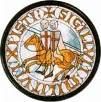
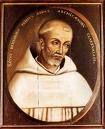
In 1118 after 300+ pilgrims were ambushed by marauding Saracens between the port city of Jaffa and Jerusalem, and other bands appear outside the walls of Jerusalem, presto-digito heah cum de judge, nine pious Christian knights from N France led by Hugh (Hugues) de Payens (Pajens) (Payns) (1070-1136) and Godefroi (Geoffrey) de St. Omer (huge pay-ins and gobs of free saintly lucre?) suddenly arrived at Latin king of Jerusalem Baldwin II's palace and offered their services, claiming to have taken the vows of poverty, chastity, and obedience, plus a 4th to protect the pilgrims on their journeys between the holy city and the coast; Baldwin bites, and the religious-military order of the Order of the Knights Templar (Order of the Poor Knights of Christ and the Temple of Solomon) is founded to protect pilgrim routes in the Holy Land by Baldwin II, who grants them a HQ in Jerusalem in the E part of his palace, in the Al-Aqsa Mosque, which stands on the Temple Mount (site of the Jewish Temple of Solomon), under which the Qumran Copper Scroll (discovered in the 20th cent.) claims huge quantities of gold and valuables are buried to keep it from the Romans, who razed it in 70 C.E.; they were also given attached stables big enough to accommodate 2K horses; their seal is two men seated on the same horse, to signify their vow of sodomy, er, poverty; the secular overlord is the Count of Champagne, with spiritual leadership given by French abbot-monk (St.) Bernard of Clairvaux (1090-1153) (#1 spiritual figure in the West, a pope-maker and preventer of Jewish pogroms), who drew up their rule (sanctioned by the Council of Troyes in 1128), based on the Cistercian Rule, with the vows of poverty, chastity, and obedience, and the rule of the canons regular; the order consists of knights (allowed to wear the white mantle with large red Latin cross on the back), chaplains, and men-at-arms (servants); admission is limited to those of noble blood; org. is by commanderies, under a grandmaster; too bad, these monkish Magnificent Nine spend their first nine years, not protecting pilgrims, but locked up inside their HQ, excavating through solid rock in search of the Holy of Holies of the Jewish Second Temple, giving later conspiracy theorists plenty of dream pillow material about how they dug up some magnificent treasure or great secret they used to blackmail the papacy with, maybe some secret documents, or the Shroud of Christ - or the formula for Viagra?
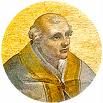
On Jan. 29, 1119 Pope (since 1118) Gelasius II died in the Abbey of Cluny, and on Feb. 1 cardinal Guido of Burgundy (Guy de Vienne), archbishop of Vienne (since 1088), 4th son of Count William I of Burgundy (1057-87) (one of the wealthiest men in Europe) is elected Pope #161 Calixtus (Callistus) II (1065-1124), issuing the bull Sicut Judaesis, condemning violence against Jews (reaffirmed by 20+ of his successors?); after the new pope sends an embassy from Vienne to Strasbourg, HRE Henry V withdraws his support for Antipope Gregory VIII, but agrees to meets with the pope in Mousson near Rheims, where the Council of Rheims, attended by Louis VI of France meets in Oct; too bad, Henry V arrives with a 30K-man army, pissing-off popey and causing him to excommunicate both Henry V and Gregory VIII on Oct. 30; after trying unsuccessfully to reconcile brothers Henry I of England and Duke Robert II of Normandy, popey heads for Italy to oust da evil antipope. In Apr. 1121 Pope Calixtus II returs to Rome with an imperial-Italian army, and captures and deposes Antipope Gregory VIII, imprisoning him in the Fortress of Sutri, then transferring him from prison to prison until he dies near Salerno; he sends three cardinals, who meets with HRE Henry V in Oct. in Wurzburg to work out a truce. On Sept. 23, 1122 HRE Henry V signs the Concordat of Worms, forfeiting any right to invest bishops with spiritual authority (ring and crozier), ending the Investiture Dispute (begun 1075), but retaining controlling influence in the election of German bishops (who retain political power), settling the long-standing (since 962) ultimate male investiture power struggle between the RCC and the HRE, and becoming Pope Calixtus II's big claim to fame; Henry IV is restored to the Church; from now on being HRE backfires on German kings as they neglect their German duties for their imperial ambitions, keeping Germany from centralizing and letting it slide into a multiplicity of one-horse-town states.
On Mar. 18-27, 1123 the First Lateran (9th Ecumenical) Council, convoked in Dec. by Pope Calixtus II, attended by 300 bishops confirms the Concordat of Worms, and passes a lot of other clerical beeswax, incl. suppressing simony, and prohibition of marriage of and concubinage among priests (priestly celibacy).

On Dec. 14, 1124 Pope (since 1119 Calixtus II died, and on Dec. 15 Teobaldo Boccapecci (Boccapeconai) was elected Antipope Celestine II (-1124), but only lasted one day; on Dec. 21 after Cencio II Frangipane and Cardinal Aimerico of Santa Maria Novella forced it, Lamberto Scannabecchi, Cardinal of Ostia (Lamberto of Ostia) (the same cardinal who kissed the emperor at Worms and restored him to communion with the Church) was elected Pope #162 Honorius II (-1130), soon excommunicating Count William of Normandy for marrying a daughter of Count Fulk of Anjou who was too closely related to him. In 1125 Pope Honorius II granted Cencio II Frangipane the county of Ceccano, allowing him to sack the Abbey of Montecassino. In 1128 Cencio II Frangipane and Cardinal Aimerico of Santa Maria Novella were sent by Pope Honorius II to Sicily to invest Roger II with the duchy of Apulia. Also in 1128 after the Templars emerged from nine years locked up inside the Temple Mount of Jerusalem (and still hadn't rescued any pilgrims?), the Synod (Council) of Troyes in France (the city that gives troy weight its name) and Pope Honorius II recognized the Order of the Knights Templar and their austere Cistercian-based rule, and they went go on to gain wealth and power at jet speed, helped by being left in peoples' wills, becoming the bankers of Europe, complete with the first traveler's checks, encrypted deposit notes that pilgrims can carry between Templar stations all the way to the Holy Land, making them an internat. banking org. above all kings and answerable only to the pope, stirring envy and resentment, esp. from kings who owe them money, and giving later conspiracy theorists plenty of material. "A sure sign of a lunatic is that sooner or later, he brings up the Templars" (Umberto Eco).


On Feb. 13, 1130 Pope (since 1124) Honorius II died, and on Feb. 14 after Cardinal Aimerico of Santa Maria Novella split with Cencio II Frangipani, he got his candidate Gregorio Papereschi elected Pope #163 Innocent II (d. 1143); too bad, the hastiness of the contested election caused a schism, and on May 18 the Roman nobles incl. Cencio II elected distinguished scholar-diplomat Pietro Pierleone (Pierlioni) (son of rich converted Jew Pier Leoni) as Antipope Anacletus II (-1138) (until 1138), sending a letter the same day to German king (since 1125) Lothair III/II (1075-1137) asking for support; Anacletus II allegedly kept a ho for a mistress, committed incest with his sister and other female relatives, and had a bad er, habit of raping nuns; meanwhile Cencio II was exiled from Rome (until 1133).

In 1130 Norman count (since 1105) Roger II (1095-1154) was crowned king of Sicily (until 1154) in Palermo, and his kingdom became known as the Kingdom of the Two Sicilies because the S part of the Italian mainland, incl. Apulia was called "Sicily on this side of Cape Faro"; his elaborate coronation cloak was later used by the HREs.
In Mar. 1131 Pope Innocent II crowned German king Lothair III/II and queen Richenza in Liege; in Oct. he crowned Louis VII of France in Rheims. On June 4, 1133 Lothair III/II was crowned HRE by Pope Innocent II in Rome (until 1137); Cencio II Frangipane was allowed to return, and was present at the coronation. On Jan. 25, 1138 Antipope (since 1130) Anacletus II died, and Innocent II became sole pope until Mar., when Gregorio Conti was elected Antipope Victor IV (-1138), but he died on May 29.


On Mar. 7, 1138 the clergy, led by Adalbert of Trier elected Lothair III/II's Waiblinger rival Conrad of Hohenstaufen, son of Duke Frederick of Swabia as king Conrad III (1093-1152) of Germany, and he was crowned on Mar. 13 in Aachen, founding the Hohenstaufen Dynasty (named after their Swabian castle Staufen) in Germany (ends 1254); he was never crowned HRE, but called himself king of the Romans; after Welf man Henry the Proud (1108-39) (son of Henry IX the Black, and son-in-law of designated heir Lothair III/II) was passed over, pissing him off (esp. as he was the most powerful prince in Germany), and causing him to be too proud to acknowledge him as king, Conrad III immediately deprived him of his duchies, and gave Saxony to Albert the Bear, and Bavaria to his half-brother (via Conrad III's wife Agnes) Leopold IV of Austria, beginning a cent.-long civil war between the Welfs (Guelphs) and Ghibellines.

In Apr. 1139 Pope Innocent II called the Second Lateran (10th Ecumenical) Council to end the papal schism; the acts of Antipope Anacletus II were annulled, and Roger II of Sicily was excommunicated; Abelard's pupil, Italian Augustinian monk Arnold of Brescia (1090-1155), who called for the return of Church property to the Roman city govt. was exiled from Italy, and the Arnoldists and Petro-Brussians (Anabaptists?) were condemned.

In 1139 Irish archbishop of Armagh (1132-8) (St.) Malachy (1094-1148) journeys to Rome via Scotland, England, and France, where he visits St. Bernard of Clairvaux, and beccomes papal legate for Ireland before returning, writing St. Malachy's Prophecy of the Succession of the Popes, which becomes near and dear to Millennium Feverists, predicting all 110 future popes through Pope Paul II, and naming only two more, the last to be called Peter the Roman, who will preside over the end of the Church and the coming of Christ.
In 1140 Roger II of Sicily defeated Pope Innocent II, took him prisoner, and forced recognition of his royal title, creating a commercial Mediterranean empire while seeking to avoid invasion by the Greek and Holy Roman emperors, becoming one of the richest monarchs in Europe, ruling a cosmopolitan kingdom with a mixed Latin, Greek, and Arab pop., and a learned court hosting scholars incl. Henry Aristippus (tr. of Plato's "Phaedo" and Aristotle's "Meteorologica"), Eugenius (tr. of Ptolemy's "Optics"), and Arab geographer Edrisi.
In 1140 the Battle of Weinsberg featured the "welf" war cry of the pro-papal anti-imperialist Welf (Guelf) (Guelph) party in Italy (whence its name) in its war against the pro-German-emperor Ghibellines (from Ghibellino, the Italian name for Waiblingen, the Hohenstaufen estate in Franconia).
On May 25, 1141 the Council of Sens (ual?) (convened in 1140), led by St. Bernard de Clairvaux condemned the theology of frustrated nun-lover Peter Abelard (-1142) as heretical, causing Pope Innocent II to order him to remain silent, and he left for Rome to try to reverse the decision, then returned to the monastery of Cluny with abbot Peter the Venerable to lead a life of study and prayer until he croaked - I'm single, rich and live at the beach, I'm OK with reality?

In 1141 Pope Innocent II and King Louis VII of France began a dispute over who should be archbishop of Bourges, causing Louis VII's lands to be placed under papal interdict. In 1143 the Rome-Tivoli War ends in a Roman V, and Pope Innocent II refuses to let the Romans destroy the town, pissing-off the Roman pop.; in late fall the Communal Revolt in Rome against Church and aristocratic rule, led by Giordano Pierleoni (son of consul Pier Leoni and brother of Antipope Anacletus II) begins (ends 1155), causing Rome to become a free city for the first time in 300 years, with communal status and a new 56-member Roman Senate consisting of four elected reps from each of the 14 districts of ancient Rome), with Pierleoni as the first patrician (the title of consul is nixed because it sounds too aristocratic?), calling for the pope to wise up, renounce all secular authority, and live as a common priest before being allowed to enter the city; on Sept. 24 Pope (since 1130) Innocent II dies, and on Sept. 26 Guido of Citta di Castello is elected Pope (#164) Celestine II (-1144), immediately lifting Innocent II's interdict on France.

On May 8, 1144 after allowing monk Arnold of Brescia (1090-1155) to return to Italy (where he soon begins agitating for a dem.-repub. form of govt. with no pope, causing a popular uprising), Pope (since 1143) Celestine II dies after a reign of 5 mo. holed-up in a fortified monastery, and on Mar. 9 Gherardo Caccianemici dal Orso is elected Pope (#165) Lucius II (-1145) (until Feb. 15, 1145).

On Feb. 15, 1145 after Arnold of Brescia (who liked to crusade against the immorality of the clergy) went to Rome and whipped up the good ole pope-free Roman Senate to declare Rome independent of the papacy, with its temporal power abolished, Pope Lucius II was killed leading a small army against the Roman Senate, and on the same day Bernardo Pignatelli (Cisterian monk Bernard of Pisa) was elected Pope #166 Eugene (Eugenius) III (-1153) (first Cistercian pope); the Roman pop. then rose and deposed Giordano Pierleoni, and invited Eugene III back; on Dec. 1 in response to the fall of Edessa, Eugene III sent a Letter to Louis VII of France proclaiming the Second Crusade; his mentor St. Bernard of Clairvaux (1090-1153) enthusiastically supported the call for a new Crusade, calling the First Crusade's failure a punishment from God, and induced German king Conrad III to join it by Christmas; meanwhile the anarchy in Rome caused Pope Eugene III to flee to France, and Giacomo da Vico was elected as the new patrician; after arriving in Paris, Eugene III went in pomp to the cathedral, which was in the Jewish quarter, where the Jews sent a delegation to present him with a Torah, and he blessed them before eating paschal lamb with the king. On June 15, 1148 after returning from exile, Pope Eugene III excommunicated Arnold of Brescia, who still controlled Rome, after which Eugene III forced his way into Rome in 1149, only to be forced out again.

On Feb. 15, 1152 after making peace with the Welfs, Hohenstaufen German king Conrad III (b. 1093) died, having never been crowned HRE; after allegedly naming him on his deathbed in preference to his 6-y.-o. son Frederick, and after seeing his chance (and putting his hand in his pockets and/or somebody's shorts?) on Mar. 4 his nephew Frederick (Ger. "peaceful ruler") I Barbarossa (Ger. "red beard") (1122-90) (who united the Hohenstaufen and Welf houses by marriage) was elected Hohenstaufen king #2 of Germany (until 1190), and crowned in Aachen on Mar. 9, hooking up with Pope Eugene III's envoys and threatening an invasion, which caused the Roman nobles to put down the Arnoldists.


On July 8, 1153 Pope (since 1145) Eugenius (Eugene) III dies, and on July 8 Corrado Demetri della Suburrra is elected Pope (#167) Anastasius IV (-1154), soon granting special privileges to the Hospitalers of St. John of Jerusalem, and restoring the Roman Pantheon. On Dec. 3, 1154 Pope (since 1153) Anastasius IV died, and on Dec. 4 Nicholas Breakspear iss elected Pope #168 Adrian (Hadrian) IV (1100-59) (first English pope until ?) (his birth name would have to sound like Shakespeare and his papal name like the Antichrist?); he later utters the soundbyte that he wishes he never left England? In 1156 after the papal forces are defeated, the Treaty of Benevento ends the war between Norman Sicily and Pope Adrian IV, compelling him to recognize William I's title in Sicily, Apulia, Naples, Amalfi, and Salerno, while allying the papacy with the Normans and granting the pope some territories claimed by Frederick I Barbarossa, causing him to turn against William I.
Want to conquer a neighbor in the Middle Ages? Try pope in a pocket? In 1156 Norman philosopher-historian (pupil of Peter Abelard) John of Salisbury (1115-80) obtains from Pope Adrian IV the bull Laudabiliter ("It is praiseworthy"), AKA the Donation of Ireland, bestowing Ireland on Henry II of England, along with a ring as the symbol of his investiture.

On Feb. 26, 1154 Roger II (b. 1095) dies, and his son (by 1st wife Elvira of Castile) William I (the Bad) of Sicily (1131-66) becomes Norman king #2 of the Two Sicilies (until 1166); since he had three older brothers and they all died, he was raised without being prepared for rule, but lucked out by promoting well-educated art-loving chancellor Maio (Majone) of Bari (-1160) to #2 (adm.), who went on to help him fight the pesky barons and independence-minded towns of their half-boot S kingdom in S Italy, and encourage immigration of Roman Catholics from W Europe; too bad, Pope Adrian IV refused to recognize William I and excommunicated him, while crowning Frederick I Barbarossa king of Italy in Pavia, and sent an army to oust him, which was repulsed.
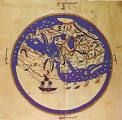
Also in 1154 Abdu Abd Allah Mohammed (Muhammad) al-Idrisi (al-Idrissi) (1100-65), a Moroccan geographer in the service of Roger II of Sicily writes The Book of Roger, a geographical treatise with a Muslim Map of the World, showing S at the top, based on Ptolemy, and inscribed on a silver sphere weighing 400 kg; he claims that the Earth is spherical because an "equilibrium experiencing no variation" keeps it in balance; his map is later used by Columbus; a 2nd expanded ed. is pub. in 1161 titled "The Gardens of Humanity and the Amusement of the Soul" (now lost), followed by an abridged ed. in 1192 called "Little Idrisi". The absurdity of the alleged Vicar of Christ on Earth not knowing the Earth is round, much less about the existence of the American continent apparently only later occurs to the few :)
On June 18, 1155 Frederick I Barbarossa was crowned HRE by Pope Adrian IV after an incident in Sutri on June 9 where he fails to kiss the pope's stirrup and is refused the kiss of peace until he does it over again right on June 11; a Roman army attacked them and was repulsed, but the new HRE left the pope to his foot, er, fate and withdrew from Italy. In 1156 after the papal forces were defeated, the Treaty of Benevento ended the war between Sicily and Pope Adrian IV, compelling him to recognize William I's title in Sicily, Apulia, Naples, Amalfi, and Salerno, while allying the papacy with the Normans and granting the pope some territories claimed by Frederick I Barbarossa, causing him to turn against William I.

In 1156 Norman philosopher-historian (pupil of Peter Abelard) John of Salisbury (1115-80) obtains from Pope Adrian IV the bull Laudabiliter ("It is praiseworthy"), AKA the Donation of Ireland, bestowing Ireland on English king (since 1154) Henry II of England (1133-89), along with a ring as the symbol of his investiture.
In 1157 the term "Holy Empire" was first used by HRE Frederick I Barbarossa to give his job a more sanctified sound, probably to break the mental deadlock, because by now the jig is up about it having anything to do with making the pope the emperor of the Western world, or making a secular ruler the emperor of a Universal Catholic Nation Under God where the pope calls the shots; "Neither Holy, nor Roman, nor an Empire" (Voltaire). In 1158 Frederick I Barbarossa with Bohemian aid captured Milan, and convened the Diet of Roncaglia, demanding absolutist control of the Lombard cities and installing podestas (imperial reps) in the cities; Pope Adrian IV demanded that he recognize his independence in Rome, causing Frederick I to try to drive him out, after which popey backed the Lombards.
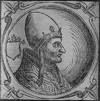

On Sept. 1, 1159 after giving a speech threatening HRE Frederick I with excommunication, Pope (since Dec. 4, 1154) Adrian IV takes a drink in a fountain, and a fly entered his mouth and stuck in his throat, choking him to death, and on Sept. 7 Laurentius (Orlando) (Roland) Bandinelli of Siena is elected Pope #169 Alexander III (1100-81) (until Aug. 30, 1181) (one of the ablest popes) by all but 4-5 of the 22 cardinals, but on Sept. 7 Frederick I's cardinals (the rest) chooses Octavian (Octavianus) as Antipope Victor IV (1095-1164) (until Apr. 20, 1164); Alexander III is friendly with the Jews and employs one to manage his finances; when he goes on to try to enforce the ban on clerical mistresses, but when he selects monk Clernbald for archbishop of Canterbury he finds he has had 17 illegitimate kids in one village alone?; meanwhile Alexander III offers Rory (Roderick) (Gael. "high longing") O'Connor (Ruaidri Ua Conchobair) (1116-98) the kingship of Ireland if he will give up all but one of his six wives, and he says forget it?
In 1160 an assembly in Pavia called by HRE Frederick I declared for Pope Victor IV; Pope Alexander III responded by excommunicating Frederick I and creating the Lombard League (incl. Bologna) to oppose him; Louis VII pledged his aid to Alexander III in the fight against Victor IV. In 1162 Pope Alexander III was forced into exile with his Norman allies in Sicily, and later fled to France, where he ruled from Sans with the support of Louis VII, sending him a golden rose in 1163 as a reward for being the secular ruler who has done the most to deserve his favor (a slap in Henry II's face?). On Apr. 20, 1164 Antipope (since 1159) Victor IV died, and on Apr. 22 Guido of Crema was elected Antipope Paschal II (-1168) - is that like cream of some young guy?
On May 1, 1160 in Languedoc in SE France Bishop William of Beziers ordered priests who observe the lovely custom of beating Jews on Palm Sun. to be excommunicated; as the town is home to the Albigensians (Cathars), this gives the Church one more reason to kill them all?
In 1165 a Roman Catholic ecclesiastical council in Albi in Languedoc in SE France condemned the Cathars, which began to be called Albigensians.
On Sept. 20, 1168 Antipope (since 1164) Paschal II died, and in Sept. Giovanni Abbot of Struma was elected Antopope Callistus (Callixtus) III (-1183) (until Aug. 29, 1178) by a small group of schismatic cardinals, becoming HRE Frederick Barbarossa's bargaining chip with Pope Alexander III.

In 1170 Pope Alexander III established the Rules for the Canonization of Saints, just in time to fast-track (1173) (St.) Thomas Becket (1118-70), archbishop of Canterbury, who was murdered at Henry II's orders (later claimed to be a misunderstanding) by his Norman knights at the altar on Dec. 29, 1170, turning Canterbury into the #1 tourist destination and cash cow of England and maybe all of Christendom - kaching? In 1172 after intercession by a Carthusian monk, Henry II and Pope Alexander III reconciled and Henry II was cleared of involvement in Becket's murder, but was made to do penance before the Cathedral of Avranches in Normandy, and reinstitute "benefit of clergy" (privilegium clericale) in England (until 1827); for the rest of the Middle Ages, English clergymen could get out of punishment for their felonies (except treason) by getting their cases transferred to an ecclesiastical court and proving that they can read and write some Latin verses; however, they get branded in the brawn of the left thumb if not actually in holy orders; fines and whipping were later substituted when the public looked the other way - no wonder everybody hates lawyers? Speaking of reading and writing, on Sept. 27, 1177 Pope Alexander III wrote a letter to Prester John to be delivered by his physician Philip to the rumored Indian Christian king, the "Illustrious and Magnificent King of the Indies", giving him permission to build a shrine in Rome and join the Church; the letter carrier never returned.
Speaking of reading and writing, in 1170 the guild of masters, germ of the U. of Paris was recognized by Louis VII of France, and the French intellectual center began shifting from Chartres to Paris as its humanistic bishop (1176-80) John of Salisbury (1115-80) and main brain man Thierry (Theodoric) of Chartres (1150-) got long in the tooth. Of course, at first the univ. movement was controlled by the Church, but it was just a matter of time before it became a hotbed of heresy, and ultimately one of the Church's greatest enemies - monkey see monkey do?
On June 30, 1178 after HRE Frederick I Barbarossa and Pope Alexander III signed the Peace of Venice, Frederick I was crowned king of Burgundy in Arles by Alexander III, who allegedly placed his foot on the neck of the prostrate emperor, which later pissed-off pope-hating Protestants. On Aug. 29, 1178 after being seiged in Vierbo by Christian of Mainz, Antipope Callistus III submitted to Pope Alexander III in Tusculum, who appointed him gov. of Beneventum, and no new antipope was elected by partisans for a year; meanwhile in Sept. Alexander III, according to the terms of the Peace of Venice convoked an ecumenical council at the Lateran for next year's Lent (Mar.).
On Mar. 5-19, 1179 the Third Lateran (11th Ecumenical) Council, called by Pope Alexander III and attended by 302 bishops condemned the Waldensians and Albigenses for "errors and impieties", and promulgated 27 canons, incl. setting minimum ages for church offices (25 for benefices involving the care of souls, 30 for the episcopate), forbidding clerics to receive women into their houses or to enter a nunnery without a reason, and forbidding tournaments and furnishing Saracens with materials to build galleys, vesting the exclusive right of papal election in a two-thirds majority vote of the College of Cardinals (Lat. "hinges"); it also forbade Christian midwives and nurses from ministering to Jews.
On Sept. 29, 1179 Cardinal Lando (Lanzo) Sitino of Sezza (from a noble Lombard family) was elected Antipope Innocent III (-1180) by the Roman barons with the support of HRE Frederick I Barbarossa, and the brother of antipope Victor IV gave him the fortified castle of Palombara to hole-up in; after Pope Alexander III's man Cardinal Hugo bribed his guards to give him up, he was imprisoned in the Monastery of La Cava, dying in Jan. 1180 and leaving Alexander III as the sole reigning anti-anti-equals-real pope.
The first Beguine (from the French word for begging) community for lay widows of Crusaders was established in Liege by Roman Catholic priest Lambert le Begue (-1187); the widowed babes take no vows and are free to leave and marry, and the governors are called mistresses; no wonder that after the sect spreads all over Europe they begin to be suspected of ho, er, heresy?


On Aug. 30, 1181 Pope (since 1159) Alexander III died, and on Sept. 1 Ubaldo Allucingoli was elected Pope #170 Lucius III (-1185). In Aug. 1185 Constance of Sicily (1154-98), heiress of the kingdom of the Two Sicilies (daughter of Roger II of Sicily), who was betrothed to HRE Frederick I's son Henry arrived in N Italy, but Pope Lucius III refused to recognize Henry as heir to the imperial throne, and a breach was opened. On Oct. 25 Pope (since 1181) Lucius III died, and on Nov. 25 Milan-born cardinal (since 1181) and Milan archbishop (since 1185) Umberto Crivelli was elected Pope #171 Urban III (-1187), inheriting the Barbarossa feud, and continuing the refusal to crown Henry.






On May 1, 1187 the Battle of Cresson sees the Knights Templar and Hospitalers defeated by the Ayyubids led by Saladin's son al-Afdal. Beating me, beating me down, into the ground, falling away from me? Crusaders from the Kingdom of Jerusalem break the truce and attack a caravan carrying the sister of cool all-black-wearing Kurdish Ayyubid sultan of Egypt and Syria (since 1171) Saladin (Salah ad-Din Yusuf ibn Ayyub) (1138-93), causing him to begin a holy war (jihad) against the Crusaders, invading the Kingdom of Jerusalem with his nephew Taqi al-Din and Gok-Bori and 200K Saracen troops (aided by Yaqub al-Mansur of Spain), then sieging the city of Tiberias; Byzantine Emperor Isaac I'm-No-Angelus allies with Saladin to avoid messing up his hair, and a relief army is organized by the Latins, led by Jerusalem king Guy de Lusignan, Count Raymond III of Tripoli (1140-1187), and Balian of Ibelin (1141-93) (not a blacksmith like Orlando Bloom in the 2006 Ridley Scott film "Kingdom of Heaven"?), but it gets trapped on July 4 at the Battle of the Horns of Hattin (Karnehatin) near the Sea of Galilee 6 mi. from Tiberias, and the heat-stroked Latin army is wiped out, with only 3K of 20K Christians escaping Saladin's 30K troops; after personally beheading Raynald of Chatillon, Saladin spares Guy de Lusignan with the soundbyte "Real kings don't kill each other"; the True Cross is fixed upside down on a lance and sent to Damascus, and several of Saladin's men leave his army to take their Frankish POWS with them; on July 5 Saladin captures Tiberias, allowing Countess Eschiva, Princess of Galilee (1118-87) safe passage to Tripoli with her family, followers, and possessions; on July 6 Saladin gives the Templar and Hospitaler POWs the chance to convert to Islam, and some become devout Muslims, while the rest choose martyrdom, incl. Hospitaler St. Nicasius (1135-87); Guy de Lusignan is taken as a POW to Damascus and held for ransom; after Maimonides of Cairo talks him into it, Saladam permits Jews as well as Muslims to return and settle; on July 29 Saladin takes Sidon; plug-ugly Crusader Reginald of Sidon (-1202) (who speaks Arabic and grooves on Arabic lit., causing the other Crusaders to distrust him) bugs out of the rear of the Battle of Hattin and flees to Tyre, attempting to negotiate its surrender to Saladin until Conrad of Montferrat arrives and kicks him out, causing him to flee to the Crusader stronghold of Beaufort after finding that Saladin has captured Sidon, where he holes-up until 1190. On Sept. 20 after conquering Acre, Ibelin, Nablus, Toron, Sidon, Beirut, Ramla, and Ascalon, giving Balian time to organize the city defenses and create 60 new knights from the burgesses to supplement the 2-14 he had, Saladin begins the Siege of Jerusalem, and after knocking down some walls but finding the Christian diehards prepared to destroy the city and kill each other rather than surrender, he shows why he's a wise and honorable sport and permits the fashion model Queen Sibylla, the Christian defenders, and the Christian pop. to leave with safe passage, ransoming 7K men for 30K bezants, with two women or 10 children being equal to one man for the same price, the rest being forced into slavery after a 50-day payment period lapses; on Oct. 2 Balian of Ibelin hands over the keys to the Tower of David, and the Christian losers march away in three columns, with Balian and Patriarch Eraclius leading the last one on Nov. 20, ending the Latin Kingdom of Jerusalem (founded 1099); although he does not sack the city, Saladin ravages the Church of the Holy Sepulchre and turns it into a mosque, later returning it to the Christians after an agreement with Byzantine emperor Isaac II Angelus; the hostages end up in Tripoli; Saladin goes on to capture all Crusader territory except the seaport of Tyre, which remains in the hands of the Franks, and the cities of Antioch and Tripoli. On Sept. 27 after Stefan I Nemanja of Serbia attacks the Repub. of Dubrovnik, and Norman reinforcements arrive to help them, he signs a peace treaty declaring eternal peace, with nominal rule by Serbian kings, and the statehood of the repub. guaranteed. On Oct. 20 Pope (since 1185) Urban III allegedly dies of a broken heart after hearing the bad news from the Holy Land at Ferrara while en route to excommunicate HRE Frederick I Barbarossa for his antics, and on Oct. 21 Cardinal Alberto de Morra is elected Pope (#172) Gregory VIII (-1187), but he dies on Dec. 17 after only 1 mo. 27 days after proclaiming the Third Crusade and making overtures to reconcile Frederick I with the Church so he can be free to kick Muslim butt and get the Holy Sepulchre back, and on Dec. 19 Roman-born Paolo Scolari is elected Pope (#173) Clement III (-1191), immediately seeking to heal the old rift between the papacy and the Roman pop.
You didn't have to shake it but you did, you did, you did, and I thank you? In 1190 the Third Crusade is led by the Big Three of Christendom, German Emperor Frederick I Barbarossa, King Richard I Coeur-de-Lion of England, and King Philip II Augustus of France, while the pope tries in vain to get in charge to get the credit for this lay effort?; Duke Leopold V also goes, accompanied by Alsace-born minnesinger Reinmar the Old of Hagenau (-1207); on Feb. 14 Frederick I (b. 1122) signs a peace with the Byzantines in Adrianople, allowing him to pass through undisturbed; too bad, after getting through Rum, on June 10 Frisky Freddy (b. 1122) is drowned in the 150-mi.-long Saleph (Goksu) (Göksu) River in the Taseli Peninsula in Cilician Armenia in SE Asia Minor in hip-deep water while bathing (heart attack from the shock of the cold water?) after the Holy Lance of Christ slips from his hands, causing his 15K-man (100K-man?) Crusader army (incl. 3K knights) to panic and disintegrate under Turkish attacks as the Muslims attribute his death to the will of Allah and get pumped up, with only 5K reaching Acre; after attempts to preserve Drop Dead Fred's body in vinegar to bury him in Jersualem fail, his bones are buried in the cathedral in Tyre, his flesh is buried in the Church of St. Peter in Antioch, and his heart and internal organs in Tarsus; his eldest son (by Beatrice of Burgundy) Henry VI (1165-97) succeeds him as German Hohenstaufen king #3 (until 1197), and his 3rd son Frederick VI of Hohenstaufen, Duke of Swabia (1167-91) becomes leader of the remnants of the Crusader army, leaving Richard I and Philip II as the real leaders of the Crusade.


In 1191 German Hohenstaufen king #3 (since 1190) Henry VI (1165-97) (son of Frederick I Barbarossa) claimed the vacant throne of Sicily by right of his wife Constance, heiress of Sicily, but Pope Clement III, fearful of losing papal independence invested Tancred of Lecce (-1194), an illegitimate heir of the Norman House of Roger (son of Constance's brother Duke Roger of Apulia), and he led a vigorous native Norman revolt, supported by Richard I of England; young testosterone-soaked Henry VI advanced into Italy to kick papal butt, but on Mar. 27 Pope (since 1187) Clement III died, and on Mar. 30 Giacinto Bobo was elected Pope #174 Celestine III (1106-98) (first of the Roman Orsini family), and he saw which side his bread was buttered on and immediately crowned Henry VI as HRE, and his wife Constance of Sicily as empress, and the House of Hohenstaufen now ruled Sicily (until 1266); too bad, Henry VI proceeded S to press his claims in Sicily, and was defeated, and his wife was captured by Tancred of Lecce and later released; Pope Celestine III sanctioned the observance of Ash Wednesday (first day of Lent, where penitents place ashes on their foreheads), and granted privileges to the Knights Templar, who received a donation of 28K farms (manors) to finance a permanent army for the defense of the Holy Land; he also delivered the Scottish Church from the jurisdiction of the Metropolitan of York, declaring it directly subject to the Holy See.

In 1194 Tancred of Lecce died, ending Norman rule of Sicily, causing HRE Henry VI to invade Italy again to press his claims, this time successfully, and after conquering it he was crowned king, after which he conquered S Italy and part of Tuscany (with aid from Pisa and Genoa), and secured the Matildine lands in C Italy, planning to make Italy the base of his Hohenstaufen Empire; he then compelled Pope Celestine III to acknowledge his infant son Frederick II (1194-1250) as king of the Two Sicilies, and the Hohenstaufens continued to rule Sicily until l268; his mother acted as his guardian for 6 mo., then died, and Lotario de' Conti (future Pope Innocent III) became regent and guardian.

On Jan. 8, 1198 Pope (since 1191) Celestine III (b. 1106) died, and on Jan. 8 37-y.-o. (young for a pope) Lotario de'Conti was elected Pope #175 Rocky, er, Innocent III (1160-1216); under him the papacy as an institution reached its zenith of power, and he was one of the great persecuting popes; he allegedly excommunicated King John of England for picking his nose, causing him to do penance. In his first year he preached another crusade to rebuild the old Latin Kingdom of Jerusalem which had been destroyed in 1187 and only imperfectly restored in 1192; in Nov. to quiet the Normans, he issued a bull confirming his 4-y.-o. ward Frederick II as king of the Two Sicilies. In Feb. 1199 Pope Innocent III gave the new military Order of Teutonic Knights (an ethnic spinoff from the Order of Hospitalers formed during the Siege of Acre) official recognition, followed on Apr. 23 by the Hospitaler Order of the Holy Ghost, followed on Dec. 7 by the Order of Trinitarians (devoted to rescuing Catholic captives).
On Aug. 15, 1199 at the behest of HRE Henry VI, Pope Innocent III proclaimed the Fourth Crusade to European monarchs in an obvious attempt to override royal and lay control, and steer the effort towards the other white meat heretic Orthodox Byzantines; the pope for the 1st time compelled his clerical subjects to pay a tax based on their annual incomes in order to pay for the Crusade, and after enthusiasm proved lacking, on Nov. 28 Count Theobald III of Champagne (1179-1201) held a tournament in his castle in Ecry-sur-Aisne, where preacher Fulk of Neuilly (-1201) persuaded Geoffrey de Villehardouin (1160-1212) to sign up, being named one of the ambassadors to Venice to procure ships for the voyage; Theobald III was elected the leader of the Crusade. In June 1201 Pope Innocent III approved the Order of the Humiliati, who soon got into wool. Too bad, on Apr. 12-13, 1204 soldiers of the Fourth Crusade, comprised of French nobles and their followers, as well as Venetians and Flemings (OE "men from the lowlands"), surprised, captured, and Sacked the Hell Out of Constantinople, then rubbed this date rape in by declaring it a marriage, announcing the Latin Empire of the East (Romania), based in Constantinople (ends 1261). Some believe the Shroud of Christ was taken back to France among the huge loot of holy relics by Knight Templar Richard de Clare, 4th Earl of Hertford (1162-1218), along with many priceless treasures melted down into coins. The looting happened because the Venetians, who supplied the ships took so long that many Crusaders made their own way and thus underbooked them, causing them to look for a way to get paid? Actually the long-simmering animosities between Venice and Constantinople, exacerbated by religious rivalry and that old Greek-Roman thang helped to breed a bank-robber-in-the-family mentality? Pope Innocent III professed to be (really was?) shocked (innocent?), along with most of Europe, and excommunicated the Venetians for it, but made hay of his opportunity to Latinize the Greek Orthodox Church, hardening the schism further. On Nov. 14, 1204 Pope Innocent III wrote to the Catholic clergy in the East, calling the transfer of imperial power in Constantinople from the Greeks to the Latins "the Lord's doing, and it is marvelous in our eyes", a quote from Psalms 118:23.
In the 13th cent. the Roman Catholic Church begins to be attacked for the corruption, greed, ignorance and immorality of its officials in all ranks, and its vast tax-free possessions, comprising up to one-third of all land in Europe, which pisses-off the landless peasants.
In May 1202 Pope Innocent III issued the decretal Venerabilem Fratrem Nostrum, outlining how the German princes have the right to elect a German king, but how the pope has the right to approve their choice before crowning him HRE because the papacy is superior to the whole empire - keep your head together and call my name out loud now? In 1204 he sanctioned the Livonian Knights (Order of Livonian Brothers of the Sword) (German Order of Swordbearers) (Militia of Christ of Livonia) of warrior monks, founded in 1202 by Bishop Albert of Riga (Livonia) (Latvia) (1165-1229) to convert the pesky pagan Finnic Livonians (N of the Lithuanians) to Christianity (finished 1236).


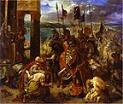
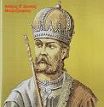
Everyone wants an old school lord and master? On Jan. 1, 1204 after some Crusaders attack a mosque in Constantinople, causing citizens to confront them, and a fire ravages a section of the city, causing the Latin pop. to take refuge in the Crusader camp, Byzantine emperor Alexius IV launches fire ships at the Venetian fleet, which they stop; on Jan. 25 after pissed-off Greeks mad about paying money to stinkin' heretic Latins start a riot, Alexius III's son-in-law Alexius V Ducas (Alexios V Dukas) Mourtzouphlos (Gr. "bushy eyebrows"?) (1140-1204) sees his chance and has Alexius IV Angelus (b. 1182) and Isaac II Angelus (b. 1156) arrested and killed on Jan. 27/28, and is crowned as Roman Byzantine emperor #161 on Feb. 5 (until Apr. 12), ending negotiations with the Crooked Crusaders and refusing to make any more payments, while strenghtening the city defenses, personally leading a surprise attack on the Crusader camp and beating back a Crusader assault on Apr. 9; too bad, on Apr. 12-13 soldiers of the Fourth Crusade, comprised of French nobles and their followers, as well as Venetians and Flemings (OE "men from the lowlands"), surprise, capture, and Sack the Hell Out of Constantinople, then rub this date rape in by declaring it a marriage, announcing the Latin Empire of the East (Romania), based in Constantinople (ends 1261), conveniently cutting Venice's rival "La Superba" Genoa (who is backed by Greece) out of the trade routes; Alexius V ducks out and escapes to Mosynopolis in Thrace, HQ of deposed emperor Alexius III, and marries his daughter Eudocia Angelina, until his new father-in-law turns on him and has him blinded and cast out, after which the Crusaders under Thierry de Loos capture him in Nov., bring him back to Constantinople, condemn him for treason against their puppet Alexius IV, and throw him from the top of the Theodosian Column in Dec., and he becomes the last Byzantine emperor in Constantinople until 1261; Boniface of Montferrat captures Boukoleon Palace on the shore of the Sea of Marmara, discovering a gaggle of women incl. Empress Margaret, daughter of Bela II of Hungary, whom he marries; happy camper Pope Innocent Three Times is the Charm declares the Great Schism ended, but the icon-loving Greeks refuse to give up that easy, and the result is its permanent hardening within two generations as the rapee tries to get loose and turn states' evidence or set the bed on fire?; a council composed equally of Crusaders and Venetians divides the Eastern Empire, giving the imperial crown to Count (since 1194) Baldwin of Flanders, making him Baldwin I (1172-1205), Latin emperor #1 of the East (until 1205); Thomas Morosini (1170-1211) of Venice replaces the Greek patriarch, becoming the first Latin patriarch of Constantinople (until July 1211); Boniface of Montferrat is made king of Salonika (Thessalonica), which incl. part of Thrace, Macedonia, and Thessaly; the rest of the empire is split up among various baron vassals; Venice receives three-eighths of the city, plus Adrianople, Gallipoli, Crete (until 1669), Euboea (a triarchy), Naxos, Andros, the SW tip of the Peloponnesus (Coron and Modon), Durazzo and other posts on the coast of Epirus, the Ionian islands, and some islands in the Aegean; some believe the Shroud of Christ is taken back to France among the huge loot of holy relics by Knight Templar Richard de Clare, 4th Earl of Hertford (1162-1218), along with many priceless treasures melted down into coins; the looting happened because the Venetians, who supplied the ships took so long that many Crusaders made their own way and thus underbooked them, causing them to look for a way to get paid?; actually the long-simmering animosities between Venice and Constantinople, exacerbated by religious rivalry and that old Greek-Roman thang helped to breed a bank-robber-in-the-family mentality?; Pope Innocent III professes to be (really is?) shocked (innocent?), along with most of Europe, and excommunicates the Venetians for it, but makes hay of his opportunity to Latinize the Greek Orthodox Church, hardening the schism further; in 1207 after living through the Apr. 13, 1204 battle for Constantinople between the W Euro Roman Catholics and Byzantine Orthodox Catholics, French marshal of Champagne Geoffrey of Villehardouin (Geoffroi de Villehardouin) (1160-1212) begins writing De la Conquete de Constantinople (On the Conquest of Constantinople), a 3rd person memoir in lovely French, becoming one of the first works of French prose - another day here in the park, I think it was the Fourth of July, or, what a lady what a night, or, get that icon down?


In June 1206 English king (1199-1216) John I Lackland (1166-1216) got in a 6-year war when Pope Innocent III persuaded Canterbury monks in Rome to elect his old Paris U. student friend Stephen Langton (1156-1228) (inventor of the chapter division of the Bible) to fill the vacancy for archbishop of Canterbury, but John refused to recognize his election, wanting Bishop John de Grey of Norwich instead.

In 1206 Spanish Castilian priest St. Dominic (Domngo Felix de Guzman) (1170-1221) attempts to convert Albigensians in Prouille, France with litttle success until he allegedly receives a vision of the Blessed Virgin, who gives him the Rosary as a tool against heretics, going on to found the Dominican Order (of Preachers), which is approved by Pope Honorius III via the bull Religiosam vitam of Dec. 22, 1216.
On Jan. 15, 1208 a knight working for Count (since 1194) Raymond VI of Toulouse (1156-1222) killed papal legate Pierre de Castelnau, and Pope Innocent III deposed him for it; the pesky Byzantine heretics seemingly in hand, Pope Innocent III first vainly appealed to Philip II of France, who refused to get involved, then proclaimed a Crusade against #2 on his list, the Cathars (Albigensians) (Catharists of Albi) ("Western Buddhists"), a sect of too loose heretical dualistic vegetarians in S (Provencal) France centered in Toulouse, which started out as a reaction against clerical corruption but was joined by the nobles as a way to appropriate Church lands, becoming fabulously wealthy and getting mixed-up with the Templars; believing that Crist was a prophet of Amor (love), they refused to make a big deal of the Crucifixion, which they regarded as an emblem of Rex Mundi (Lord of the Material World), which has twisted Amor into its opposite, Roma, also denying the sacraments of Baptism and Communion, and practicing birth control and abortion, accepting reincarnation and the female principle, allowing women parfaits (priests), and insisting on direct personal contact with God rather than mere faith; looking for a get-out-of-purgatory-free card, Duke Eudes III of Burgundy stepped up to the plate and organized a campaign against the Cathar strongholds in Languedoc next year, starting the Albigensian Crusade (ends 1229). On July 22, 1209 after 30K Crusader knights and foot soldiers under Simon de Montfort stormed Languedoc in SE France along the Garonne River, the most advanced and civilized section of France, known for religious tolerance along with mass abandonment of Roman Catholic faith, 15K-20K were massacred in Beziers (Béziers) after an officer allegedly asked a papal rep how to distinguish Cathar heretics from true Roman Catholic believers, and was told "Kill them all, God will recognize his own"; they then did ditto to Perpignan, Narbonne, Carcassone, and Toulouse.

On Oct. 4, 1209 Otto of Brunswick, Welf count of Flanders was crowned HRE Otto IV (1175-1218) by Pope Innocent III (until 1215). Also in 1209 Pope Innocent III commissioned Cistercian monk Christian to convert the heathen Prussians.
In 1209 the Council of Avignon mocks Jewish laws of cleanliness by prohibiting "Jews and harlots" from touching bread or fruit exposed for sale, renewing Church laws against Jews hiring Christian servants, and warning the faithful not to exchange services with Jews, but to avoid them as a pollution.

On Nov. 18, 1210 after HRE Otto IV invaded Sicily (papal territory) to seize it from his boy Frederick II of Hohenstaufen, Pope Innocent III excommunicated him for it. On Dec. 2, 1212 the Diet of Frankfurt elected Frederick II of Hohenstaufen as German king Frederick II (1194-1250), and deposed HRE Otto IV of Brunswick, who refused to abdicate, causing pissed-off Pope Innocent III to conclude an alliance with Philip II Augustus of France to aid Frederick II against the "usurper", who allied with King John of England to makes war on France. Of course, popes don't give you the world without buying your soul, so Frederick II had to promise his former guardian Innocent III to relinquish his possessions in Sicily and S Italy to calm the papal fear of a union of Italy and Germany, plus free the clergy from lay jurisdiction and taxation and practice exemplary cruelties upon German heretics to earn brownie points; too bad, after his seat was warm, well-read freethinker Frederick II reneged, preferring balmy Sicily as a residence to freezing Germany, continually baffling his guardian Pope Innocent III until his death in 1216 - didn't he follow Dr. Spock?
On Apr. 19, 1213 Pope Innocent III issued a bull calling for an ecumenical council, and deposed King Kong, er, John, authorizing Philip II of France to execute the sentence, fomenting a revolt in John's ranks, ending up without support by his subjects who hated his werewolf guts?; on May 15 John, hearing of a planned French invasion conceded England and Ireland to Pope Innocent III as a fief of the Holy See, and swore an oath of fealty, ruling as the pope's vassal and promising to accept the pope's buddy Stephen Chapter-and-Verse Langton as archbishop of Canterbury, and pay damages to the clergy, plus a tribute to the pope of Ł1K a year; in 1216 the pope sent Guala (Gualo) Bicchieri (1150-1227) as his legate to England (until 1218) to work John's leash, creating an "inglorious league" (Shakespeare, King John, 5.1.65) that sticks in the English craw for cents.; "This England never did, nor never shall,/ Lie at the proud foot of a conqueror" (Sir Richard in King John, 5.7.112-3) - this is as good as it gets for papal power over European kings, but too bad he couldn't keep his former diaper stuffer Frederick II in line?
In 1213 Pope Innocent III declared that Muhammad has been positively identified as the Antichrist, and that the Second Coming of Christ will happen in 1284 because it is 666 years after the founding of Islam (618) - Medieval soundbyte of the century by Pope Geraldo? /p>
On Apr. 21, 1214 after seeing him alienate his own subjects by his many excesses, incl. fathering illegitimate children, jailing Jews to milk them of money, insulting nobles, allowing prelates to die in jail, and enforcing unpopular forestry laws, Pope Innocent III issues the bull Bulla Aurea (Golden Bull) calling for an ecumenical council, and deposes King Kong, er, John, authorizing Philip II of France to execute the sentence, fomenting a revolt in John's ranks and causing him to end up without support by his subjects who hate his werewolf guts, esp. when they hear rumors of a French invasion. On May 28 the English fleet stops the planned invasion by destroying the French fleet off the coast of Flanders in a surprise attack; the French now turn against the count of Flanders, who counters on July 27 by forming the Anti-Capetian Alliance of King John, Emperor Otto IV (John I's nephew), the count of Boulogne, and most of the nobles of Flanders, Belgium, and Lorraine, causing Philip II and the pope to back a rival candidate for the imperial crown; on July 20 John's excommunication is lifted; on July 30 Stephen Langton is allowed to enter England from exile in France and act as archbishop of Canterbury; on Aug. 25 at a council in Westminster, Langton announces a mutual security agreement for the preservation of English laws, and reads Henry I's charter of liberties to the barons, persuading John not to punish them for not paying their scutages (shield taxes) (monetary payments in lieu of military service). On Oct. 2 King John signs a royal charter with papal legate Pandulf at St. Paul's Cathedral in London, pledging to return all confiscated Church property and submit his crown and his kingdom in England and Ireland to Pope Innocent III as a fief of the Holy See, and swear an oath of fealty, ruling as the pope's vassal and promising to accept the pope's buddy Stephen Chapter-and-Verse Langton as archbishop of Canterbury, and pay damages to the clergy, plus a tribute to the pope of 1K marks a year; after John surrenders his kingdom to the pope, he receives it back after five days as a papal fief subject to perpetual tribute and fealty; in 1216 the pope sends Guala (Gualo) Bicchieri (1150-1227) as his legate to England (until 1218) to work John's leash, creating an "inglorious league" (Shakespeare, King John, 5.1.65) that pisses off the nobles and sticks in the English craw for cents.; "This England never did, nor never shall,/ Lie at the proud foot of a conqueror" (Sir Richard in King John, 5.7.112-3) - this is as good as it gets for papal power over European kings, but too bad he couldn't keep his former diaper stuffer Frederick II in line?
In 1214 after Pope Innocent III, in an effort to reward the Crusaders issued the bull Quia Major, proclaiming the Fifth Crusade and ordering Jews to forgive all interest on loans made to them, Philip II of France balked, ordering Crusaders to settle up with "our men" (hominem nostris). Innocent III uttered the soundbyte: "No Christian shall do the Jews any personal injury... or deprive them of their possessions... or extort money from them by threatening to exhume their dead."
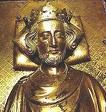
On June 15, 1215 King John was forced to sign the Magna Charta (Carta), and got embroiled in his losing First Barons' War (1215-17), with Pope Innocent III on his side, until he croaked in 1216, leaving 9-y.-o. son Henry III (1207-72), the task of dealing with it.
Start the music, the Catholic Unmagna Charta, or, Oh Hell, you can't stop us now? Perfect opportunity to kick the Eastern Church when it's down? On Nov. 1-30, 1215 the first three Lateran Councils (1123, 1139, 1179) are topped by the Fourth Lateran (12th Ecumenical) (Great) Council, called by Pope Innocent III and attended by two Eastern patriarchs incl. Raoul of Merencourt (-1225), Latin patriarch of Jerusalem (1214-25) (who gives a killer speech on day 1 calling for a new Crusade), new Latin patriarch #2 of Constantinople Gervasius (Gervais) of Heraclea Pontica, plus reps. of many secular princes, 412 bishops, and 800 abbots and priors; it approves 70+ decrees, incl. a condemnation of the Cathari, Waldenses, Albigenses, and other heresies (true Christians?), along with a call to all bishops and princes to be especially vigilant against all heresy (now a combo civil-religious crime), esp. blasphemy of their precious Jesus Christ (the beginning of the horrible Inquisition?), the first confession of faith containing a definition of the new don't-say-cannibal doctrine of Transubstantiation (the turning of the bread and wine of the Lord's Supper into Christ's actual body and blood after a prayer by the priest), a requirement for all church members of the age of discretion to confess their sins to a priest and take Communion at least once a year ("Omnis utriusque sexus") (so they can be checked for heresy?), a decree forbidding priests to take part in ordeals, the command that damned Jews and Muslims in Christian Europe must wear items of clothing distinguishing themselves from saved Christians (color-coding for infidels, usually a 3-in. yellow cloth circle) probably taken from the Muslim World, which did it to Christians and Jews), and are prohibited from holding public office or going out during Holy Week (for their protection, of course), and a decree forbidding new monastic orders (new women have to join the existing ones); common-law-marriage is outlawed, and all marriages must be announced in a church by a priest; the Roman Catholic Church is declared the only true faith, outside which nobody can be saved, although the council recognizes the patriarchs of Constantinople, Alexandria, Antioch, and Jerusalem after the numero uno pope, in that order; Jews are doomed to perpetual servitude for crucifying Jesus; the council bans the teaching of the works of Aristotle except those on logic and ethics; all that remains is to prohibit Bible reading by laymen, which is done in 1229 - it took them over a thousand years to finally make up their minds about all this, and they leave a back door for the Greek Orthodox Church in hopes of reconciling?
On Nov. 30, 1215 (last day) Pope Innocent III issued a Call for the Fifth Crusade at the Fourth Lateran Council, with Egypt as the objective and the date to be 1217; meanwhile he imposed another income tax on his clergy to pay for it, and prohibited trade with the Muslims to ensure a supply of ships; meaning to control it personally this time so it won't end up a bummer like the Fourth Crusade, he orders the Crusaders to meet with him in Brindisi next year, where he plans on offering each of them an indulgence for fighting or even helping with expenses; Frederick II vows to go on Crusade, and abdicate the kingdom of Sicily when he gains full recognition of the German princes, and is crowned as Hohenstaufen German king #6 Frederick II (1194-1250) in Aix-la-Chapelle, and the Hohenstaufen family rules Germany again until 1254. In 1215 Simon de Monfort sieged Toulouse and Narbonne; Raymond VI retired to England, went to Rome to plead with Pope Innocent III again, then went to Aragon after being refused.

On June 16, 1216 Pope (since 1198) Innocent III (b. 1160) died without having crowned his former ward Frederick II as HRE, leaving the bull Quaedam Moralitas de Scaccario (The Innocent Morality), which claims that chess bishops (aufins) "are prelates wearing horns", and that "they move and take obliquely because nearly every bishop misuses his office through cupidity"; he also established the first foundling wheel in Rome, where mothers of newborns that don't want to raise them can deposit them for care by the Church in a kind of bank night depository drawer, which survives to modern times.
On July 18, 1216 Pope #176 Honorius III 1150(-1227) (yet another Roman) was elected, taking charge of the Crusade; meanwhile Stephen Langton traveled to Rome to argue for the Magna Charta.
Dominica nica nica? The Age of Friars begins after the disappointment of no Armageddon in 1216? On Nov. 29, 1216 Pope Honorius III approved the Rule of St. Francis, followed on Dec. 22 by the Rule of St. Dominic; the former place their chief stress on holy living and experience and poverty, eschewing learning (friars minors), the latter on evangelizing the world with well-read intellectual shock troops (friars preachers); while the Franciscans could be confused with Waldensian heretics, the difference is their complete acceptance of the Catholic hierarchy and rejection of Donatism, accepting sacraments even from a bad priest, making the pope a fan; Franciscans become a hit with the bourgeoisie with their Horatio Alger message that personal religious devotion and purity rather than socioeconomic status bring salvation; Spanish priest (St.) Dominic (1170-1221) cut his teeth preaching against the Albigensians in Languedoc, and his order follows rules derived from the Austin canons and the Premonstratensians, promoting candidates on intellectual ability rather than seniority, culminating in Thomas Aquinas; later both orders own property, become priests, and administer sacraments, pissing off the rest of the clergy, and both orders become scholars, with Franciscans dominating Oxford U. and Dominicans dominating the U. of Paris; eventually both orders degenerate into an indistinguishable mass of powerful, rich, obese, drunken monks professing phony poverty and hiding their vices under their robes?
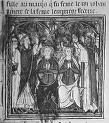
In spring 1217 after Pope Honorius III barred pesky Frederick II from participating, the Fifth Crusade was launched, ending in a dismal defeat and 8-year truce in 1221. On May 19, 1218 HRE Otto IV (b. 1175) died, freeing his rival Frederick II to sail for the Holy Land to fulfill his 1215 vow to the pope; however, he keeps reneging, and never tucks in his booties and leaves, although his councilor Herman von Salza (grandmaster of the Teutonic Knights) goes, and gets decorated for bravery by Jerusalem king (1217-25) John of Brienne (1170-1237).
On Mar. 7, 1219 Pope Honorius III approved the religious congregation of Val des Ecoliers (Valley of the Scholars) at the U. of Paris.


In Sept. 1219 St. Francis of Assisi (1181-1226) arrived at the Crusader camp in Damietta, Egypt, boldly crossed the lines, and was taken to the court of Saladin's nephew sultan Al-Malik al-Kamil (1180-1238), announcing his intention of converting him to Christ and making him give up Muhammad, and talked religion with him for a week without getting beheaded (maybe because the sultan had just survived a coup attempt backed by Coptic Christians and didn't want to rile them up), coming out of it as the one who seemed to have changed, picking up the idea of five daily prayers and bringing it back as the three daily recitations of the Angelus, and going for the Muslim rosary, albeit Irish Christians began using it around 800 C.E.; when he got back, next Feb. St. Francis heard about the Five Martyrs of Morocco, friars he had sent to convert the Moroccans into giving up devil man Muhammad for god man Christ, who didn't fare so well, ending up tortured and executed, their example launching the career of Portuguese-born St. Anthony of Padua (1195-1231), who became such an exemplary Franciscan preacher that he was canonized in 1232 less than one year after his death, a fast-tracking record that still stands; meanwhile on Oct. 9 and Oct. 26 after Pope Honorius III sent Portuguese Benedictine legate cardinal-bishop Pelagius (Pelagio) Galvani of Albano (1165-1240) to Damietta to negotiate, al-Kamil launched two attacks on the Crusader camp, then offered to trade Damietta for Jerusalem, but Pelagius, expecting Frederick II to arrive with a relief army unwisely turned him down; in Nov. the Crusaders finally took Damietta, and John of Brienne began a war with Pelagius for control, causing them to forget the Crusade?
On Nov. 22, 1220 Pope Honorius III crowned Frederick II as HRE, correcting the oversight of his predecessor Innocent III, which wasn't enough to make him go on the crusade.
In 1220 the first known Beghards (from the Latin word for begging) lay male brotherhood appeared in Louvain, imitating the Beguines (retreats for widowed Crusaders and other women, who take no vows and care for the sick and poor, founded in 1180); they spread through Belgium, Holland, Germany, et al.

In 1221 Mongol leader Genghis Khan (1162-1227) sent his gens. Chepe and Subotai on a recon mission with 20K horsemen through the whole of Persia, the Caucasus, the Carpathians, and into Russia, where by 1223 they virtually obliterated a Russian army of 80K; after each battle each Mongol soldier is assigned to kill 50 captives with a battle axe and collect the right ears in sacks for counting; "They had trampled on the nations which opposed their passage, penetrated through the gates of Derbent, traversed the Volga and the desert, and accomplished the circuit of the Caspian Sea, by an expedition which had never been attempted, and has never been repeated" - Edward Gibbon, Ch. 64; apocalyptic rumors of Mongolian hordes travel as far as Britain and France.
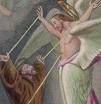

On Dec. 25, 1223 (St.) Francis of Assisi (1181-1226) made the first Christmas Creche (Nativity crib scene) with an ox and ass in Greccio, Italy. In 1224 he got his lucky stigmata in his hands, putting him on the fast track for sainthood, which was helped by his animal stories, esp. The Wolf of Gubbio; the Franciscan Order reached England, soon attracting the greatest scholars at Oxford. In 1226 Roman Catholics began to bow down before the bread at Mass - look what it did to that wolf at Gubbio?
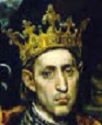
On Jan. 30, 1226 Pope Honorius III approved the mendicant Carmelite Order (founded in 1224), and induced French king Louis VIII (b. 1187) to crusade against the remaining Albigenses, and he conquered Avignon in Provence, then most of Languedoc, starting the practice of bestowing huge fiefs as appanages on princes of the blood, which later backfired in Burgundy and elsewhere; he then died on Nov. 8 of dysentery on his return to Paris, and his able, carefully-educated Capetian son Louis IX (the Saint) (1214-70) (canonized in 1297) (the ideal medieval king?) succeeded him as Capetian king #9 (until Aug. 25, 1270), with his mother Blanche of Castile (1188-1252) as regent, going on to continue his daddy's policy of enlarging the French royal domain and getting brownie points with the Church by kicking any remaining Albigensian butt around the Mediterranean, and introducing the title of admiral into France while winning a rep. for justice which made him the arbiter of Europe, and his reign the golden age of medieval France; in the meantime his devout mouther, er, mother got the support of the people, officials, and Church to suppress a number of feudal rebellions (1226-31) while he finishes growing up, wearing the saint-making itchy-scratchy goat-hair shirt.

On Mar. 18, 1227 Pope (since 1216) Honorius III died, and Count Ugolino of Segni (nephew of Pope Innocent III) was elected Pope #177 Gregory IX (1145-1241), continuing his uncle's policy of papal supremacy, and renewing the prohibition against usury, which becomes the law of the Church until 1917; he immediately ordered HRE Frederick II to obey his 1215 vow to sail for the Holy Land, which he promised to do on Sept. 8, but reneged three days later, claiming sickness (fever), and on Sept. 20 Gregory IX placed him under the ban of the Church (excommunication), publishing a Letter Contra HRE Frederick II denouncing his vices, heresies, and offences against mankind in an attempt to reel the imperial religious skeptic in and make him follow his daddy Henry VI's footsteps; not phased, Frederick II countered with his own Letter Contra Pope Gregory IX, addressed to all the princes of Europe, becoming the first clear statement that the pope shouldn't be able to tell secular rulers what to do. On Mar. 23, 1228 Pope Gregory IX renewed the excommunication of double-shuffling wannabe HRE Frederick II Hohenstaufen and proclaimed a Crusade against his Sicilian lands, then was publicly insulted by a Ghibelline mob, causing him to pick up his holy robes and flee to Perugia, from where he directed an invasion of Apulia (ends 1229); on June 28 Frederick II finally sailed for the Holy Land to lead the lay-royal Sixth Crusade (ends 1229), assisted by wealthy Richard of Cornwall, 1st Earl of Cornwall (1209-72) and Count Thibaud IV de Champagne (1201-53), but this only caused the pope to ban him a 2nd time; on July 21 he landed at Limassol, engaged in a power play with John of Ibelin, the Old Lord of Beirut, sails for Acre, then went to Jaffa where he held truce conferences with Egyptian sultan Malik al-Kamil, nephew of Saladin; Stupor Mundi (Wonder of the World) Frederick II speaks six languages fluently, incl. Arabic, making him the first Crusader to speak dangerous Muslim talk, causing rumors that he might be the Antichrist. On Aug. 14, 1228 Pope Gregory IX canonized St. Francis of Assisi.
On Feb. 18, 1229 the Crusaders under cool multilingual brain man HRE Frederick II negotiated a treaty with al-Kamil ending the Sixth Crusade (begun 1228), agreeing to a commercial convention along with the surrender to the Crusaders of part of the kingdom of Jerusalem, incl. the complete tour package of Jerusalem, Nazareth, Bethlehem and Lydda, along with a corridor to the sea for Christian tour groups, and a 10-year truce; the Christians retook Jerusalem until 1239; on Mar. 18 HRE Frederick II crowned himself king of Jerusalem in the Church of the Holy Sepulchre, along with his infant son Conrad IV (b. 1228), for whom he acted as regent; the patriarch of Jerusalem, who opposed Frederick at every turn to please his boss the pope ordered all clergy locked up so they can't help in the ceremony; hobbled by his ban he returned in June, seized Cyprus with his Longobard troops, defeated a papal army in Sicily, and made peace overtures to try to get the ban lifted; meanwhile the pope and the emperor traded epithets, accusing each other being the Antichrist - and they're both right?
How do you approach the Word of God? You don't? Progresso, what a soup of holy words shouldn't be? In 1229 after the first hand-copied partial translations of the Bible by the pesky Albigensians begin appearing, the (non-ecumenical?) Council of Toulouse forbids lay persons from reading the Bible, to be enforced by the Inquisition (is that a Bible in your pants or are you just happy to see me?); "Search the Scriptures, for in them ye think ye have eternal life, and they are they which testify of me" (John 5:39); "Use of the vernacular [would mean] demolition of a language barrier that safeguarded the clergy's exclusive dominion over religious matters" (Massimo Firpo).In Feb. 1230 a flood of the Tiber River caused Rome to invite exiled Pope Gregory IX back; on July 20 the Peace of San Germano was concluded between HRE (since 1212) Frederick II (1194-1250) and the pope, who got his papal states back, while Freddy II got unexcommunicated, and they kissed and made up by Sept.; now the pope was free to crack down on those !*?! heretics as the Sixth Crusade fizzleed and he needed some more sheep to slaughter ("not only the reductio ad absurdum of crusades, but of papal excommunications" - H.G. Wells).
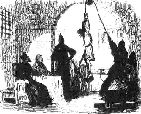

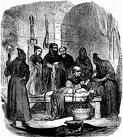


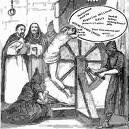
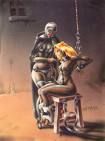
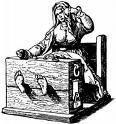
Jesus rolls over in his empty tomb? In 1231 now that Bible reading has been prohibited (1229), and pesky Bible-thumpers continue to read it and point out that the Church's doctrines contradict it, 1231 Pope Gregory IX instituted the search-and-destroy Holy Office, AKA the Inquisition, in the hands of the Dominicans, for the apprehension, torture (begun 1252?) and trial of heretics, enacting a law for Rome that heretics condemned by an ecclesiastical court are to be delivered to the secular power to receive their "due punishment", i.e., death by fire, or life in a horrible inhumane prison.
In 1233 in his bulls of Apr. 13, 20, and 22, in order to combat the Albigenses in France, Pope Gregory IX founded the Monastic Inquisition, and appointed the Dominicans as the official Inquisitors for all dioceses of France; the smoke-choked Burning Times in France began - ah, ah, I need some help here?
In 1234 the Second Council of Tarragona in Spain was held to regulate the procedure of the Inquisition (begun 1233) and to ratify the 1229 Council of Toulouse, issuing several canons, incl. #2: "No one may possess the books of the Old and New Testaments, and if anyone possesses them he must turn them over to the local bishop within eight days, so that they may be burned."

In 1234 after Rabbi Solomon ben Abraham of Montpellier in S France got antsy about all the Roman Catholic attacks on the Albigensian heretics, and didn't want his congregation to be next, he anathematized the philosophical works of Jewish brain man Maimonides (1135-1204), excommunicating all Jews who treat the Bible allegorically or even study science or profane lit.; Maimonides' supporters led by David Kimchi (Kimhi) (Qimhi) (1160-1235) (AKA Radak) and Jacob ben Machir ibn Tibbon (1236-1304) (AKA Prophatius) struck back by persuading the Jewish congregations of Beziers, Lunel, and Narbonne in Provence, and Sargossa and Lerida in Spain to excommunicate Solomon and his followers; Solomon counterattacked by denouncing Maimonides to the Dominican Inquisition in Montpellier, causing them to burn all his works there, followed by Paris in 1242, setting a precedent that makes books too hot to handle in Roman Catholic lands; too bad, 40 days later they burned the Talmud in Paris too; knowing that if you can get away with books, why not people, on June 13, 1234 Pope Gregory IX pub. the 5-vol. Liber Extra (Decretals of Gregory IX), a collection of 2K decretals which he had sent to the univs. of Bologna and Paris, repeating St. Augustine's belief that "every pagan, Jew, heretic, and schismatic will go to the eternal fire prepared for the Devil and his demons", giving the force of canonical law to the doctrine of perpetual servitude of the Jews until Judgment Day, banning them from direct influence over the political process and the life of Christian states until the 19th cent. rise of liberalism; it contains the oldest surviving detailed Description of a Diabolical (Witches') Sabbath, describing the novice having to kiss an enormous toad, then a cold, pale, thin man, which causes him to forget the Catholic faith, then, after a feast, having to kiss a black cat, then the head devil (or devil's head), and finally participate in an orgy; Pope Boniface VIII added a 6th book in 1298 (dominica, nica, what?); meanwhile the Jewish war over Maimonides continued, with Maimonides' followers getting Solomon ben Abraham executed for ratting on fellow Jews, and his leading followers' tongues cut out; meanwhile a rabbinical ban on study of scienc++e was issued by Rabbi Don Astruc of Lunel (Abba Mari ben Moses ben Joseph) (Yarhi), supported by Rabbi Asher (Asheri) ben Yehiel (Jehiel) (1250-1327) (AKA Rabbenu Asher, Rosh) and Nahmanides (1194-1270) (AKA Ramban), causing his student Rabbi Solomon (Shlomo) ben Abraham ben Aderet (1235-1310) (AKA Rashba) of Barcelona to do ditto in 1305 for teaching any science, or studying it before age 25, except medicine, causing the rabbis of Montpellier to threaten to excommunicate any Jew who stops his son from studying science; the net result was the decline of science study in the Euro Jewish community, and a retreat into mysticism, esp. the Qabala - I got Scrombosis, I'm dead from the neck up? This wonderful development in Catholic theology goes on to morph into the Spanish Inquisition in 1478, and the Portuguese Inquisition in 1531, burning its first Protestants in Spain in 1543; it is finally abolished (suspended until future notice?) after 666, er, 603 fun years in 1834. Gregory IX absolved those who violated the ban by the 1215 Fourth Lateran Council on teaching Aristotle, but renewed it "provisionally, until the books of the philosopher had been examined and expurgated", appointing three Parisian masters to the job, which they gave up on. One good thing: Gregory IX exempted the Jews from the jurisdiction of the Inquisition, except when they attacked Christianity, attempted to Judaize Christians, or reverted to Judaism after Christian conversion.
In 1235 an unsolved murder caused Jews to be imprisoned in Freiburg im Breisgau in Baden, Germany until Henry VII ordered them released; on Apr. 6, 1233 Pope Gregory IX issued the bull Etsi Judaeorum (Even if the Jews), denouncing mob violence against Jews, demanding that Jews in Christian coutnries be treated with the same humanity with which Christians wish to be treated in heathen lands.
On Nov. 27, 1237 HRE Frederick II tried to subject the Lombard League to autocratic rule and establish himself as the emperor of Rome, winning a military V at the Battle of Cortenuova, causing Pope Gregory IX to ally himself with them, esp. as Frederick II had pub. a treatise protesting against the world empire of the pope.
On Mar. 17, 1238 Pope Gregory IX wrote the encyclical Considerantes Olim, asking HRE Frederick II for support for a Crusade to bolster the threatened kingdom of Latin Romania.
In spring 1238 the Mongols under Batu Khan conquered Poland, destroying Lublin and Cracow; they then turned to Hungary, and "the whole country north of the Danube was lost in a day and depopulated in a summer... Of all the cities and fortresses of Hungary three alone survived the Tartar invasion, and the unfortunate Bela [IV] hid his head among the islands of the Adriatic" - Edward Gibbon, Ch. 64; in the winter after the Danube River froze they sieged the Hungarian capital of Esztergom (Strigonium) and massacred the pop.; meanwhile all of Europe trembled with rumors that the Mongol horde is coming; Pope Gregory IX sent a mission of Franciscan and Dominican friars, which was rebuffed; the town of Neustadt in Austria was defended by only 50 knights with 20 crossbows until a Germany army arrived. On Mar. 12, 1239 Pope Gregory IX excommunicated HRE Frederick II for the fourth time, calling him the "self-confessed heretic", the "blasphemous beast of the Apocalypse", etc., and tried to get him deposed; meanwhile Frederick didn't care, living a life of luxurious licentiousness, gathering Jewish, Christian, and Muslim philosophers to his court, and doing "much to irrigate the Italian mind with Saracenic influences" (H.G. Wells). In May 1239 Pope Gregory IX sent his bushy-tailed Inquisitors (fresh from Inquisitor Training School in Hell?) to burn the entire town of Champagne, France, along with all 180 citizens. Meanwhile in 1239 a Crusader army organized by HRE Frederick II and king Theobald I the Troubadour of Navarre (count of Champagne since 1201), incl. Duke Hugh IV of Burgundy took on Rukn ad-Din al-Hijawi, and was decisively defeated, and the Muslims retook Jerusalem. Meanwhile in 1239 the Tartars (Mongols) laid waste to Serbia, Bosnia, and Bulgaria, then retreated to Russia so that Batu Khan could seriously enjoy the city and palace of Seria; meanwhile Batu's brother Sheibani conquered Siberia with 15K Mongol families, with capital at Tobolsk for the next three cents.

In 1239 after evidence is presented by Karaite Jewish convert to Christianity (Franciscan) Nicholas (Nicolas) Donin, Pope Gregory IX orders the confiscation of all copies of the Talmud, which is gen. ignored except in France, causing Jew-hating French Capetian king (1226-70) (St.) Louis IX (1214-70) to call for the 1240 Disputation of Paris, in which Donin takes on four rabbits, er, rabbis, Yechies of Paris, Moses of Coucy, Judah of Melun, and Samuel ben Solomon of Chateau-Thierry, accusing the Talmud of containing blasphemies against Jesus Christ, God, and the Christian religion, and obscenities, and wishing to make them chuck it so they will return to the pure Judaism of the Old Testament and become ripe for Christianity; too bad, Jew-hating Louis IX declares Donin the winner, and after a commission of Christian theologians passes judgment, 24 carriage loads of Jewish mss. incl. 10K-12K Talmuds are publicly burned in Paris in Louis IX's presence on June 17, 1244, with Louis IX uttering the soundbyte that the only way to debate with a Hell-bound Jew is to kill him "with a good thrust in the belly as far as the sword will go" - "once they start burning books it won't be long before they start burning people"? (Henrich Heine)

On July 15, 1240 after a Swedish army under Jarl Magnusson (1210-66) landed at the confluence of the Izhora and Neva Rivers at the request of Pope Gregory IX to punish the Eastern Orthodox Russians for helping the Finns avoid conversion to Roman Catholicism, 19-y.-o. grand prince (since 1236) (St.) Alexander Nevsky (1220-63) of Novgorod surprise-attacked and defeated their larger army at the Battle of the Neva River (near modern-day St. Petersburg); Alexander gained the name Nevsky (of the Neva) and Khrabry (valiant). On Dec. 6 the Mongols under Golden Horde leader Batu Khan (-1255) (grandson of Genghis Khan) captured and razed Kiev, "mother of Russian cities", and slaughtered its pop., permitting Muscovite Russia to emerge as dominant while clearing the Mongol path W to Europe; the Kievan Era of Russian history ends - and Russian babies start developing those Mongolian features?
Also in 1240 the Carmelites on Mount Carmel (founded 1156) were forced out by the Muslims, settling in Cyprus, Messina, Provence, and England, where they become known as White Friars; in 1245 Pope Innocent IV sanctioned a change from hermit to community life as a mendicant order.
In Feb. 1241 the Mongols crossed the frozen rivers into C Europe then split into two armies, N and S; the 8K-20K-man N one under Kaidu and Baidar invaded Poland and sacked Cracow on Mar. 18, then on Apr. 9 defeated a 2K-25K-man German, Polish, and Bohemian army led by Henry the Bearded's son Henry the Pious (-1241), the Polish palatines, and the grandmaster of the Teutonic Order at the Battle of Liegnitz (Legnica) (Wahlstatt) in Silesia (SW Poland), after which they filled nine sacks with the right ears of the slain; Henry the Pious is KIA along with most of his knights after the faster Mongol ponies outmaneuvered them; the Mongols captured Polish gold miners at the battle and took them back to the Caspian Sea and Siberia; meanwhile the S Mongol army under Batu and Subutai advanced through Transylvania, and met a united European army under Bela IV of Hungary on Apr. 10 at the Battle of the Sajo River; at first Bela IV drove Mongols out onto the Plains of Muhi (Mohi) on the Theiss River, but on Apr. 10 the Mongols won a decisive V, driving Bela to the Adriatic, and occupying Hungary and its fabled alfoeld (perfect grazing grounds) for a year, and destroying half its pop.; in Apr. the N and S armies hooked up in Apr. finished pacifying all resistance, and the road to France was now open; the Mongols began pursuing Bela IV - who starts sweating paprika?

On Mar. 31, 1241 HRE Frederick II prevented a meeting of bishops in Rome, and on May 3 at the First Battle of Meloria (2nd in 1284) off Livorno he defeated a Genoese fleet with his Stupor Mundi fleet, capturing a number of French, English, and Spanish prelates summoned by Pope Gregory IX, after which he marched his army to Rome and encamped near the city; Louis IX then talked Freddy II into releasing the hostages while sympathizing with his grievances against the pope, and on Aug. 22 Pope (since 1227) Gregory IX conveniently died, allowing Roman Sen. Matteo Orsino to attempt to force a quick decision from the 10 cardinals in Rome by locking them in the 1K-y.-o. Roman Septizonium Temple until they made a decision; they took so long that Orsini's guards begin going potty through holes in the roof, all the cardinals got sick, and one English cardinal died in the heat, and was kept in a wooden coffin in the room with them?; after two mo. they elected Godfrey of Sabinia, who became Pope #178 Celestine IV (-1241), but he reigned only 16 (17) days, dying on Nov. 10 from the ordeal; since the cardinals refused to meet again, the Holy See remained vacant for two years (until June 25, 1243) while Frederick II worked to fix the election.
In May 1241 the first Frankfurt Pogrom (Judenschlacht) (Ger. "Battle of the Jews") over Jewish-Christian marriages and forced baptism of children of mixed marriages killed 180 Jews and a few Christians; 24 Jews avoided death by accepting baptism; the synagogue was plundered and the Torah scrolls destroyed; HRE Frederick II ordered an investigation, and in 1246 his son Conrad IV issued a pardon of the citizens of Frankfurt, concluding that the program happened "from carelessness rather than deliberation".
In Dec. 1241 the Mongols started to attack Italy, then suddenly packed up and returned to Karakorum to participate in the election of a new grand khan after news of the death of Grand Khan Ogedei (Ughetai) on Dec. 11 was received; ditto the other Mongols in Hungary and elsewhere - and that's the only reason we're not all speaking Mongolian now?
On Apr. 5, 1242 with the pesky Mongols gone, and the popeless Roman clergy getting ideas about kicking some heretic Russian Orthodox butt and forcing them to accept the True Faith, the Roman Catholic Church-backed Livonian Knights (Brothers of the Sword) coming from Riga in the SW, led by Magister Hermann (brother of Albert of Buxhoeveden) got a shock at the Battle of Lake Peipus (Battle of the Ice) when Alexander Nevsky's foot soldiers swarmed and defeated well-armored knights (a first in Middle Age history, setting the precedent for Russian generals using their troops like cannon fodder against the Germans?), killing only a few before they gave up and fled (later inflated into hundreds by Russian chroniclers), checking the E expansion of the hated German Huns and their Roman Catholic priests for the next cent.; subject of Sergei Eisenstein's 1938 film Alexander Nevsky.
Also in 1242 at the Mongol kuraltai it was decided that the grazing grounds of Hungary weren't rich enough, so the Kipchaks (Tatars) under Batu Khan, grandson of Genghis Khan moved their herds into the steppes of S Russia on the Lower Volga River, where they formed the Khanate of the Golden Horde, with capital at Sarai NW of the Caspian Sea, which acted as suzerain of all Russia for the next two cents., while respecting the Russian Church and leaving the princes in control; a rebellion in Chuvashia was bloodily suppressed by 40K Mongol warriors - nobody doesn't like Sarai? Meanwhile 1242 more Mongols invaded Anatolia (Turkey) (Asia Minor) (ends 1243), and began taking big bites out of the Muslim World.

On June 25, 1243 Sinbaldo de' Fieschi, Genoan Count of Lavagna was elected Pope #179 Innocent IV (-1254), fleeing Italy for Lyons in 1244 for the next six years; Theodoric Borgognoni of Lucca (1205-98), student of Hugh of Lucca +became his surgeon, breaking with Galen and his love of pus and cleaning and suturing wounds, soaking bandages with wine to disinfect them, and using opium, hemlock, mandrake, and other anesthetics in surgery, leaving Chirurgia (4 vols.); "For it is not necessary that bloody matter (pus) be generated in wounds - for there can be no error greater than this, and nothing else which impedes nature so much, and prolongs the sickness."

In May 1243 10K Roman Catholic troops of the seneschal of Carcassone and the archbishop of Narbonne surround and siege the impregnable Cathar fortress of Montsegur (Montségur) (W of Rennes-le-Chateau in Languedoc) (until Mar. 16, 1244); since the fabulously wealthy Cathar parfaits (priests) are not permitted to bear arms, the fortress is defended by mercenaries. The French Masada? In Jan. 1244 two Cathar parfaits escape the encirclement carrying the fabled Cathar treasure, which is not heard of again (until ?); on Mar. 1 impregnable Montsegur Castle in France on the slopes of the Pyrenees overlooking the Plain of Languedoc is captured after a 10-mo. siege, and the occupants are offered lenient terms incl. departing with their personal property intact if they abjure the Cathar faith, and the 400 defenders request a 2-week truce to consider it, offering hostages as insurance; on Mar. 15 one day after their sacred festival of Bema (which falls on the spring equinox this year) all 215 Cathar parfaits (incl. 20 - 15 mercenaries and six women, who become parfaits at the last minute) refuse to abjure their faith, and are burned in an enormous fire at the Prat des Cramats near the S foot of the castle in a wood-filled stockade, with the rest forced to watch; on Mar. 16 (night) four parfaits concealed by the others escape down the W face of the mountain on ropes, carrying away some other Cathar treasure that was needed for Bema, taking it to the fortified caves of Ornolac in the Ariege, where a band of Cathars is soon killed sans the treasure, which went to Rennes-le-Chateau?; Catharism is driven underground; it later resurfaces as the Waldensians, Hussites, Adamites (Brethren of the Free Spirit), Anabaptists, and Camisards?
In July 1244 Jerusalem is surprise-attacked by wild Khwarismian (Khwarazmian) Turk mercenaries (freebooters and unemployed soldiers left over from the 1220 Mongol invasion) in the employ of Egyptian pasha Khwarazmi after he discovered the Christians intriguing against him; the garrison flees to the Tower of David and held out there for nearly six weeks, surrendering on Aug. 23; Jerusalem remains under Egyptian control until 1517, and under Muslim control until 1917 when British Gen. Allenby captured it.
On Oct. 17, 1244 a major Latin army (allied with local Ayyubid princes) was destroyed by the Egyptians and their allies near Gaza in the Battle of La Forbie; the three Christian military orders had their butts kicked bigtime by the Allah Akbars, and 312 of the 348 Knights Templar were KIA, incl. grandmaster Armand de Perigord; Louis IX the Saint of France became a Knight Templar, got sick, and swore that if he recovered he would start the Seventh Crusade to stop the Egyptian attacks; he did, so guess what, he did the saintly thing and took up the Cross; meanwhile the reaction among Christians was to revert to Millennium Fever, taking to the soapbox to whip the masses up to go on YAC (yet another crusade) - maybe Jeezy just doesn't care about the *!?*! place, no matter how much the tourist companies are hurting?
On June 24, 1245 the dispute between Pope Innocent IV and HRE Frederick II reached a head when the pope called the First Ecumenical Council of Lyons (Lyon); on July 17 the emperor was deposed, and the pope proclaimed that no Hohenstaufen will ever again be emperor, Holy Roman or otherwise; the Church takeover of the state that started with Constantine I the Great is now complete, with the bride of the church-state marriage becoming the head of the house and making and unmaking monarchs at her pleasure? In 1249 Pope Innocent IV ordered a Crusade to be preached against Crusade-ditching HRE Frederick II, who held onto power, dissed the papacy openly, and pub. a famous Letter by Frederick II Contra the Catholic Clergy, circulated throughout Europe, denouncing the pride and irreligion of the clergy, and ascribing all the corruptions of the times to their greed; he even proposes to his fellow princes that they confiscate church property for the church's own good, making him one of the few emperors that modern secularists would like to claim, "the first of the moderns" (H.G. Wells) - I want to know more? Meanwhile in 1246 the barons of England, incl. Richard de Clare, 6th earl of Hertford sent a letter to Pope Innocent IV complaining of the exactions of the Roman Curia.
In 1246 the Council of Beziers forbids employment of Jewish physicians by Christians.
In 1247 Pope Innocent IV issues an epistle repudiating the legend of ritual murders of Christian children by Jews, and calling for Jewish persecution to end, with the soundbyte "Jews, though living under Christian princes, are in worse plight than were their ancestors under the Pharaohs"; too bad, he is widely ignored.
In 1248 the Seventh Crusade was led by Louis IX of France, with the aim of freeing Palestine via the capture of Egypt; after putting his mother Blanche of Castile back in charge of France as regent (until 1252), he winters in Cyprus to make preparations to invade Egypt.
In 1248 a papal bull by Pope Innocent IV excoriated Ghibelline leader Ezzelino da Romano (1194-1259) for maiming and torturing hundreds (thousands?) of innocent people, his favorite activity being to cut out their giblets, er, genitals and try to fill a pit with them.

In 1250 Millennium Fever was raging in the Franciscan Order among the followers of super-popular Joachim of Fiore (1135-1202), who predicted this year to be the dawn of the Age of the Holy Spirit; when it didn't happen, they reset it to the year 1260 and kept asking for donations? Also around 1250 the optimal climate conditions in Europe since 1000 ended, bringing poor harvests, famine, and disease, and changing the sociopolitical landscape with a pop. reduction, uprooted vagabond farmers, and a blind rage against the rich and Jews. In Feb. 1250 a Coptic Christian helped the Seventh Crusaders find a ford across the Nile River, and on Feb. 8 they defeated the Egyptians at the Battle of El Mansura (Mansurah) on the Nile River (30 mi. SW of Damietta) (founded about 1200), but on Apr. 6 they were totally defeated by Egyptian forces under new caliph Turan Shah at the Battle of Fariskur; the Kipchak Turkish Mamluks (Mamelukes) (Arab. "possessed", "owned") seized control of the Egyptian sultanate, ruling Egypt until 1517, and continuing as vassals of the Ottoman Empire until 1811; the Crusaders were routed, most of their army was put to the sword, and French king Louis IX was captured and held for ransom until 1252.


On Dec. 13, 1250 HRE (since 1220) Frederick II (b. 1194) died, leaving his legitimate son Conrad IV (1228-54) the throne of Germany (1237-54), Jerusalem (1228-54) and Sicily (as Conrad I) (1250-4); he made his other crypto-legitimate son (did she or didn't she marry him first?) (he claims he is, and both have the same love of poetry and science?) Manfred of Sicily (1232-66) prince of Taranto and Conrad's rep in Italy; Pope Innocent IV continued his struggle against the Hohenstaufen succession, stirring up revolts in numerous cities, all of which Manfred was able to subdue except pesky Naples; meanwhile late Frederick II became "Gran Frederigo", the hero of S Italy, leaving a Book on Hawking, some of the first Italian Verse (which is born at his court?), and Latin translations of Aristotle, which were taken up by univ. students, launching a mini-Renaissance in Italy, even if he was German?


In Oct. 1253 after authorizing the Roman Inquisition to use instruments of judicial torture to prove their cases, as was common in civil courts, Pope Guilty-Until-Proved-Innocent IV returned to Rome. On May 21, 1254 after being excommunicated, Conrad IV (b. 1228) died of malaria in Lavello, and his brother Manfred continued the HoHo Hohenhstaufen fight with the PaPa Papacy, seizing the regency of Sicily for Conrad IV's infant son (his nephew) Conradin (1252-68) (until 1258), while Pope Innocent IV conferred the crown of Sicily on Edmund Plantagenet, 2nd son of Henry III of England, in return for assuming a papal debt of Ł90K for this war; after he agreed, papal forces invaded Sicily, and Manfred restored the Kingdom of the Two Sicilies to the papacy, while the pope attempted to help Henry III pay his debt obligation by a tax imposed on the English clergy, pissing them off; too bad, on Dec. 7 Pope (since 1243) Innocent IV died (before or after numerologists discover that his Latin name equals 666 and proclaim him the Antichrist?), and on Dec. 12 Raynold (Rinaldi), Count of Segni was elected Pope #180 Alexander IV (-1261); the Sicilian thang now being in limbo, the Great Interregnum began (ends 1273), with non-Germans Richard of Cornwall and Alfonso X of Castile claiming the imperial crown, while the German princes solidified their political independence.
Also in 1254 the term "Holy Roman Empire" was first used for the Empire of the West or Roman Empire started by Charlemagne in 800 (Holy Empire since 1157).
On Mar. 25, 1255 Pope Alexander IV excommunicated Manfred, and on Aug. 20 Manfred rebelled and defeated papal forces at the Battle of Foggia. In 1258 Manfred (illegitimate son of Frederick II) caused a rumor that Conrad IV's son Conradin was dead, allowing himself to be crowned king of Sicily in Palermo, after which Pope Alexander IV excommunicated him and offered the crown to Charles I of Anjou.
On Sept. 27, 1258 Pope Alexander IV issued the bull Quod super nonnullis, giving authorities the right to enslave and confiscate the land of non-Christian peoples who refuse to submit to baptism, requiring cases of alleged witchcraft to be investigated by local authorities not Church inquisitors unless they "clearly savored of manifest heresy".

In 1259 Pope Alexander IV summoned U. of Paris brain man (St.) Thomas Aquinas (1225-74) to Rome (until 1268), where he wowed everybody with his erudition; when he died he left Summa Contra Gentiles (1261-4), an attempt to reason Muslims out of their infidelity between 5x-daily prayers and holy murders, and the unfinished Summa Theologica (Theological Compendium), an attempt to use the Aristotelian science and logic of the Averroists to justify the conclusions of St. Augustine and the Neoplatonists, while denying Averroes' double-truth theory that there is one truth in science and another in faith; it incl. the Five Arguments for the Existence of God (Quinque Viae), the Prime Mover, who is perfect, omniscient, omnipotent, and free. After his work sinks in, it turns the Roman Catholic Church decisively Aristotelian, widening the split with the Eastern Orthodox Church, which remains Platonist and sinks into mysticism. In 1366 Pope Urban V sends legates to Paris announcing that all candidates for an arts degree at the U. of Paris have to thoroughly study Aristotle.
The original Ahnuld in End of Days? In 1260 Millennium Fever was at a peak, stirred by Joachim of Fiore's predictions that this is the year when Antichrist comes; meanwhile ex-Dominican monk Brother Arnold caused hysteria by claiming that the Church is corrupt and the Antichrist is the pope, and that Christ will soon judge him and the clergy; meanwhile the first Flagellant movements began in S Germany and N Italy - whip it, whip it good?
On Sept. 3, 1260 after the Mamluks took advantage of the absence of Hulagu to move on them, the Mongols offered an alliance with the Franks, but Pope Alexander IV forbade it, and Count Julian Grenier of Sidon (-1275) (son of Balian I and Margaret of Brienne) caused the death of a grandson of Kitbuqa, causing him to sack Sidon, pissing the Christians off so bad they allowed them to pass through Crusader territory, 10K-20K Egyptian Mamluks defeated 10K Mongols in the Battle of Ain (Ayn) Jalut (Arab. "Spring of Goliath") in the Palestinian desert in the Jezreel Valley near Ein Harod, becoming the first Mongol D that isn't avenged, forever defining the SW limit of Mongol expansion as the Tigris River; Kitbuqa is executed; Syria suffered severely from the Mongol invasion, worsened by subsequent invasions in 1281 and 1299; the Egyptians used portable hand cannon (midfa) using gunpowder cartridges charged with 2-3-15 (sulfur-carbon-saltpeter) gunpowder; by the middle of this decade the Christians woke up and began accepting Mongol feelers about a Franco-Mongol Alliance against the greater threat of the Muslims, the Mongols promising them Jerusalem in return for cooperation; too bad, despite several pro-Christian Buddhist Mongol khans sending embassies, it never happened, perhaps because the Christians demanded their conversion first, giving Islam time to slam-dunk and convert them.


On May 25, 1261 Pope (since 1254) Alexander IV died, and on Aug. 29 Jacques Pantaleon, patriarch of Jerusalem (since 1255) (born in Troyes, France) was elected Pope #181 Urban IV (-1264), bitterly opposing King Manfred of the Two Sicilies and favoring Count Charles of Anjou and Provence (1226-85) (later Charles I of Sicily and Naples or the Two Sicilies) (youngest son of French king Louis VIII); after getting over the shock of losing Constantinople, he restored order in the papal states and worked to create alliances with rulers of cities and states and weaken German influence.
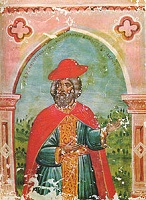
On July 25, 1261 Nicaean emperor (since 1259) Michael VIII Palaeologus (1223-82) caught the Venetian fleet away and crossed the Bosphorus Strait with a Greek army under gen. Alexius Stragopoulos, and surprise-attacked Constantinople, recapturing it without much difficulty from the hated Latins, ending the Latin Empire (founded 1204), and restoring the Byzantine Empire in a downsized version under Nicean leadership after its 57-year exile; the Palaeologan Dynasty, the last Byzantine dynasty was founded (ends 1453), finally officially adopting the old Roman double-headed eagle as the official armorial - ending up turning the Byzantine Empire into a subject for paleographists and paleontologists?
In 1263 the great number of appeals to Rome by victims, er, defendants of the Inquisition caused inquisitors gen. to be appointed in Provence, soon followed by territories throughout C-S Europe - the answer is always no?


On Oct. 2, 1264 Pope (since 1261) Urban IV died after instituting the Feast of Corpus Christi; the Mass and the Office were composed by St. Thomas Aquinas. On Feb. 5, 1265 Guido (Guy) le Gros (Guy the Fat) (Guy Foulques or Gui Foucois), son of French knight Foulquois is elected Pope (#182) Clement IV (1190-1268) (until Nov. 29, 1268); the must-kiss Fisherman's (Piscatory) Ring, cast in gold with the Pope's Latin name in raised letters around a bas-relief of St. Peter in a boat (Mark 1:17) is first mentioned in a letter by Clement IV to his nephew Peter Grossi; worn on the pope's 4th finger of the right hand, it is used as a signet to seal official papal documents (red wax for private correspondence, a bulla of melted lead for public documents, causing the use of the term "bull") until 1842; it is crushed upon the pope's death by the camerlengo (chamberlain).
On Aug. 23, 1268 after 16-y.-o. Conradin (b. 1252) tried to reclaim Sicily, Charles I of Anjou, aided by 400 Achaean knights under his new vassal William II defeated him and his polyglot Italian, Spanish, Roman, Arab, and German army at the Battle of Tagliacozzo in L'Aquila Province, Italy, then captured and executes hid in Naples on Oct. 29, ending German Hohenstaufen rule of Sicily (begun 1194); Conradin played a last game of chess before being permanently mated?; the Anjevin Dynasty secured the papacy against the imperial threat in both N and S Italy until 1343. On Nov. 29, 1268 Pope (since 1264) Clement IV died after reorganizing the Sorbonne in Paris as a theological school, and the papal throne remained vacant for three years (until 1271) as the cardinals of the Conclave of Viterbo diddled around until the townspeople locked them up in the palace where they were staying and put them on a diet of bread and water.

In 1270 after Albertus Magnus successfully preached a crusade in Austria, and at the insistence of Charles of Anjou, whom he made king of Sicily in 1265 and who had big Mediterranean ambitions, French king (since 1226) (St.) Louis IX (b. 1214) led the Eighth Crusade (his 2nd), made an ill-advised expedition to Tunis, and died on Aug. 25 in Damietta of dysentery along with his son John Tristan; his army returned to France with his body, which was buried in Saint-Denis; he was succeeded by his pious but uneducated and bold (rash in judgment) son Philip III (the Bold) (the Strong) (1245-85) as Capetian king #10 (until 1285); Charles of Anjou took over the Crusade, which fizzled.

I'm just the muscle you muscleheads need? On Apr. 8, 1271 the impregnable Crusader stronghold Krak des Chevaliers (Crag of the Knights) in the Syrian desert 25 mi. W of Homs, guarding the road from Damascus to Tripoli and Jerusalem, "the most wholly admirable castle in the world" (Lawrence of Arabia), which had withstood 12 Saracen attempts finally fell after Mamluk Sultan Al-Zahir Baybars, leading an Egyptian army tricked the skeleton crew of monkish defenders by sending a carrier pigeon with a forged letter purportedly from the Grandmaster of the Hospitalers in Tripoli ordering them to surrender; Baybars gave the garrison free conduct to Tripoli amid his loud laughs; after hearing of this, English Prince Edward, later king (1272-1307) Edward I Longshanks (1239-1307) led the (last) Ninth Crusade (ends 1272), taking his wife Eleanor of Castile along and winning Vs at Acre and Haifa, then trying to figure out how to take back their impregnable fortress without the carrier pigeon trick - the idea of a security backdoor is born too late? Too bad, his old fart daddy Henry III died on Nov. 16, 1272, causing him to scrap the Crusade and return to take his throne.

On Sept. 1, 1271 Teobaldo Visconti, archbishop of Liege was elected Pope #183 Gregory X (1210-76); he was later beatified (no sainted popes since Gregory VII two cents. earlier).
In 1272 Pope Gregory X repeats Pope Innocent IV's 1247 denunciation of the legend of ritual murder of Christian children by Jews, requiring from now on that the testimony of a Christian against a Jew be backed up by another Jew; Jews are protected from persecution in the Papal States.

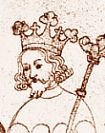
On Oct. 29, 1273 despite up-and-coming Ottokar II (1230-78) of Bohemia seeking the German crown, Count Rudolf of Hapsburg was elected German king Rudolf (Rudolph) I (1218-91) (until 1291), and crowned at Aix-la-Chapelle, officially ending the Hohenstaufen Dynasty (begun 1138), and founding the Hapsburg (Habsburg) (Ger. "Hawk's Castle") Dynasty, which ruled Germany until 1806; in Oct. the Great Interregnum (begun 1254) ended as he was crowned HRE Rudolf I by Pope Gregory X in Lausanne, becoming a papal V over the formerly Hohenstaufen German-owned Holy Roman Empire, marginalizing its political and religious power in Europe and making the imperial title little more than honorary (until 1314); nonplussed, Ottokar II refused to recognize him and contests his election, while Charles of Anjou unsuccessfully vied for the imperial crown; too bad, the Hapsburgs only controlled S Germany, leaving the rest of Germany to the zillion other petty princes, keeping Germany from uniting under a kick-ass fuhrer, er, emperor until 1870; meanwhile somewhere along the line the males married into the Polish Piast family, Masovian branch, giving them a hereditary deformity called Prognathism (Habsburg Jaw) that gave them hog jaws and lips - like Jay Leno?
In May 1274 after Michael VIII Palaeologus allied with the papacy against Charles I of Naples and Sicily, the Second Ecumenical Council of Lyons (first 1245) convened, and the Greek Byzantines recognized the authority of the Roman Catholic pope in return for the council authorizing funds for another Crusade, which was never carried out, causing Michael VIII to be villified after his death, and the attempted reunion of the Roman and Greek churches to fall flat; on July 4 an embassy led by Mongol clerk-translator Rychaldus (Richardus) arrived to deliver a report on behalf of Mongol Christian gen. Abaqa seeking an alliance to drive the Mamluks out of Syria; meanwhile to quiet Byzantine critics and prevent another conclave of Viterbo, Pope Malcolm, er, Gregory X decreed that the cardinals have to be locked up until they elect a pope, founding the Papal Conclave (Lat. "with key").


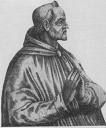
On Jan. 10, 1276 Pope (since 1271) Gregory X (b. 1210) died, and on Jan. 21 Pierre of Tarentaise was elected Pope (#184) Innocent V (1225-76) (first Dominican pope); he died on June 22, and on July 11 Ottobono Fieschi was elected Pope (#185) Adrian (Hadrian) V (-1276); he died within 5 weeks on Aug. 18, and on Sept. 8 Pedro Julinao was elected Pope (#186) John XXI (1210-77), and crowned on Sept. 20, becoming the first Portuguese pope (until ?), and the first physician pope (until ?), having given medical advice to Gregory X (1271-6), Innocent V (1276), and Adrian V (1276), none of whom lived long and prospered from his prescriptions of lettuce leaves for toothache, lettuce seed to reduce sex drive, and pig dung to stop nosebleeds; there is no Pope John XX because of cardinal deacon John son of Robert, who opposed Boniface VII after the death of John XIV.

On May 20, 1277 Pope (since 1276) John XXI died six days after a private apt. he used for studies collapsed on him, causing relief in some parts of the Vatican where he was thought to be the Antichrist, and on Nov. 25 Giovanni Gaetano (an Orsini) was elected Pope (#187) Nicholas III (1216-80).
In 1277 the 1/2-mi.-long Passetto di Borgo elevated covered passageway is built between the Vatican and the fortified Castel Sant'Angelo on the banks of the Tiber River in Rome to serve as a papal escape route; it comes in handy to save the life of Pope Clement VII during the sack of Rome in 1527 by HRE Charles V.
In 1279 Edward I's Statute of Mortmain became the first step taken by the English to free themselves from papal taxation and submission to "foreign" ecclesiastical officials, reducing the power of the Church to withdraw land from taxation and control by the civil govt.
In 1279 Pope Nicholas III approved the proposition of the Spirituals (Fraticelli) (Little Brethren) (Zealots) of the Order of St. Francis that Christ and his apostles had owned no property, justifying their living in small hermitages; in 1323 Pope John XXII reversed this infallible decision and handed them over to the Inquisition.


On Aug. 22, 1280 Pope (since 1277) Nicholas III (b. 1216) died in Suriano during the night of a stroke right after ordering wandering Spanish-born Jewish mystic Abraham Abulafia (1240-92) burned alive for trying to convert him to Judaism, saving him and allowing him to flee to Rome then Sicily and continue his mystic writing, until the local Jewish congregation got him kicked out, after which he settled in Comino (near Malta).

On Feb. 22, 1281 after Charles I of Anjou rigs the election, eel-loving cardinal (since 1261) Simon de Brie (Brion) (in Touraine between the Seine and Marne Valleys) is elected Pope (#188) Martin IV (1210-85), ending the anti-French era of papal policy (until 1282); he backs Charles of Anjou's ambitious dreams of Byzantine conquest and a Mediterranean revival of the Latin Empire run by the French (him), excommunicating Byzantine emperor Michael Palaeologus; Charles of Anjou invades Epirus, causing Michael to counter by financing a revolt in Sicily, forming the mercenary Catalan Co. of the East.
On Mar. 30, 1282 (Easter Monday) at the hour of Vespers near a church outside Palermo the War of the Sicilian Vespers broke out; 2K men, women and children, incl. nearly all the French in Sicily were massacred, causing the Sicilians to expel all the French and offer their throne to Peter III of Aragon, who was connected by marriage to the house of Hohenstaufen, and Aragon assumed rule of the kingdom of the Two Sicilies (until 1285); Philip III the Bold of France then led a crusade against him as champion of Pope Martin IV, and a cent.-long war began over Sicily between the Angevin kings of Naples and the Aragonese kings of Sicily (until 1442), with Sicilian independence secured at the cost of ruining the economy; meanwhile the old anti-French papal policy was resumed.
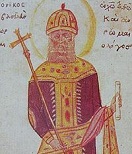
On Dec. 11, 1282 Michael VIII Palaeologus (b. 1223) died, and his eldest surviving son Andronicus II (1259-1332) became Byzantine emperor (until 1328), immediately renouncing the church union established at the Second Council of Lyons in 1274.
In 1283 the Teutonic Order of Knights compelled the subjection of Prussia, and it became the last European nation to accept Christianity (with a sword); the Teutonic Knights were dissolved in 1525.

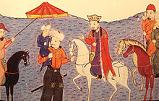
In 1284 Pope Innocent III's 1213 prediction that the Second Coming of Christ would happen because it is 666 years after the formal foundation of Islam (618), and Muhammad was obviously the Antichrist didn't work out. Also in 1284 Pope Martin IV excommunicated and deposed Peter III of Aragon, and made his teenie nephew Charles of Valois (1270-1325) (4th son of Philip III and Isabella of Aragon) king of Aragon and Sicily, starting the Aragonese Crusade, a struggle to end Aragon's control of Sicily (ends 1291). On Aug. 10, 1284 after obtaining limited help from the Mamluks, and being defeated by the larger army of pro-Christian devout Buddhist Arghun Khan (1258-91), Tekuder was executed on Aug. 10, and Arghun became Mongol Ilkhanid khan #4 of Persia (until Mar, 7, 1291), going on to send ambassadors next year to Pope Honorius IV offering a Franco-Mongol Alliance against the Muslims in the Holy Land, which was not answered even though it contains the soundbyte: "As the land of the Muslims, that is, Syria and Egypt, is placed between us and you, we will encircle and strangle ("estrengebimus") it. We will send our messengers to ask you to send an army to Egypt, so that us on one side, and you on the other, we can, with good warriors, take it over. Let us know through secure messengers when you would like this to happen. We will chase the Saracens, with the help of the Lord, the Pope, and the Great Khan"; more missions in 1287, 1287 and 1289 were also snubbed.



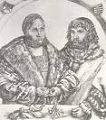
On Jan. 6, 1285 Charles I of Anjou (b. 1226) died while his son Charles II of Anjou (1243-1309) was being held captive by the Sicilians; the latter conceded the Two Sicilies to Peter III to secure his release, but Peter III (b. 1239) died on Nov. 11, and was succeeded in Aragon by his eldest son Alfonso III (the Liberal) (the Frank) (1265-91), and in the Two Sicilies by his 2nd son James II (1267-1327); a treaty was negotiated whereby James II renounced his claim to Sicily in favor of the pope, and Charles II got the mainland portions, but the Sicilian parliament revolted and crowned Peter III's 3rd son Frederick III (1272-1337) (whom Peter III already made regent) as king of Sicily in Nov. (until 1337), resulting in a long war.


On Mar. 28, 1285 Pope (since 1280) Martin IV (b. 1210) died after gorging himself on eels (later stigmatized by Dante), and on Apr. 2 Giacomo Savelli was elected Pope #189 Honorius IV (-1287); on Apr. 11, 1286 he excommunicated King James II of Sicily. The original I'm too sexy for my shirt takes over the French quatre-walk? On Oct. 5, 1285 French king (since 1270) Philip III (b. 1245) died in Perpignan after getting sick on his return home, and his handsome recently-married teenie son Philip IV (Quatre) (the Fair) (the Handsome) (Le Bel) (1268-1314) (known for his long blonde hair) became Capetian king #11 of France (until 1314), ruling as a "constitutional king", letting himself be bound by law and precedent while trying to extend royal authority as far as possible, which means destroying the feudal system, while he cultivated an aloof image, causing people to call him a "useless owl"; "He is neither man nor beast, he is a statue" (Bishop Bernard Saisset of Pamiers).

On Apr. 3, 1287 Pope (since 1285) Honorius IV died, and it took almost a year to elect a replacement. On Feb. 22, 1288 Girolamo Masci was elected Pope #190 Nicholas IV (1227-92) (first Franciscan) - nick four francisco popo? In 1288 Edward I of England mediated a treaty confirming James II of Aragon as king of Sicily, but Pope Nicholas IV annulled it, and on May 29, 1289 he crowned Charles II of Anjou as king of Sicily and Naples (the Two Sicilies). Meanwhile in 1288 under Philip IV the first mass-burning of Jews on the stake took place in France.

On July 18, 1289 the pope's constitution grants the cardinals one-half of the revenues of the Apostolic See plus a share in the financial admin. Also in 1289 Pope Nicholas IV sends Franciscan missionary Giovanni da Montecorvino (1247-1328) to China as a missionary; after staying in Madras from 1291-2, he arrives in Khanbalik (Peking) in 1293. In 1307 Pope Clement V names him archbishop of Peking, and he baptizes 5K converts.
In 1290 the Joachites (followers of Joachime of Fiore) predicted Armageddon, since it didn't happen in 1260 like he originally predicted; they later rescheduled it for 1335 - because nobody has to live with frizz? On July 18, 1290 English king Edward I issued the Edict of Expulsion, ordering the 3K (16K-17K?) pesky Jews (who since 1218 had to wear a marking badge) expelled from England, and it's bye-bye for over 350 years until Oliver Cromwell let them return in 1655. Also in 1290 Charles of Valois was defeated and renounced his claim to Sicily, in return receiving Anjou.
On Feb. 19, 1291 the Treaty of Tarascon (halfway between Avignon and Arles) between Pope Nicholas IV, Philip IV of France, Charles II of Naples, and Alfonso III of Aragon ended the Aragonese Crusade (begun 1284) as well as Aragon's domination of Sicily; Alfonso III agreed to go to Rome in person to have his excommunication lifted, pay a tribute of 30 oz. of gold to the Church, carry out a Crusade to the Holy Land, and remove all Saragonese and Catalan knights from Sicily; he also promised that his brother James II would not hold his kingdom against the wishes of the papacy.
In Apr. 1291 the last Crusader (Frankish) state of Acre (Saint-Jean d'Acre) (Akka) in Syria fell to the Mamluks, followed in May by Tyre; the Christian Crusades (begun 1095) ended miserably with the expulsion of the Crusaders from the Middle East (Palestine), and the Mamluks in control of all of Egypt and Syria; Pope Nicholas IV called upon all Christian princes to pray for all the needless deaths, er, take up arms against the Muslims one more time, and for synods to discuss the advisability of uniting the Knights Templar and the Knights of St. John, whose catfights he partly blamed for the loss of the Ptolemais; in Aug. he sent a letter to Persian Mongol khan Arghun informing him of plans of Edward I of England to lead another Crusade to recapture the Holy Land, stating that it could only be successful with the help of the "powerful arm" of the Mongols, and asking Arghun to receive Christian baptism and march against the Mamluks; after Arghun died in Mar. 1291, followed by Nicholas IV in Mar. 1292, Edward I sent Geoffrey de Langley to Persian Mongol khan Gaikhatu, leaving from Genoa and arriving in Tabriz, then returning to Genoa; "Had the Mongol alliance been achieved and honestly implemented by the West, the existence of Outremer would almost certainly have been prolonged; the Mameluks would have been crippled if not destroyed; and the Ilkhanate of Persia would have survived as a power friendly to the Christians and the West" (Sir Steven Runciman, A History of the Crusades, p. 402); meanwhile the Knights of St. John were transferred to conveniently-located Cyprus; too bad, the Templars ended up back in Europe with no coverstory and too much land and wealth, causing a ton of pissed-off royals who owe them money to get ideas? - they got sixteen years left?


On Apr. 4, 1292 Pope (since 1288) Nicholas IV died, and it took over two years to elect his successor. On July 5, 1294 after sending the cardinals assembled in Perugia since Apr. 1292 a letter warning them of divine vengeance if they don't quickly elect a new pope, causing Latino Malabranca, dean of the College of Cardinals to elect him, Benedictine hermit Pietro Di Murrone (da Morrone) was dragged from the wilderness by a deputation of cardinals accompanied by the kings of Naples and Hungary, and on Aug. 29 was elected Pope #191 (St.) Celestine V (1215-96) in Aquila, becoming the last non-conclave pope, and the last Celestine until ?; after a series of simple-minded screwups he did the unprecedented and abdicated on Dec. 13 (after 5 mo. 8 days) after ordering the shutting of cardinals in a conclave to elect future popes, and declaring the right of a pope to abdicate; 11 days later (Dec. 24) Benedetto Gaetani (Caetani) was elected Pope #192 Boniface VIII (1235-1303), promptly annulling his predecessor's work, then imprisoning and finally murdering him on May 19, 1296 by starvation and disease in Fumone Castle near Ferentino in Campagna; an alleged gay atheist with numerous lovers, Eight Inches of Bone's papacy marks the beginning of the decline of the Church's medieval power and glory in the face of the rising European kingdoms after he gets into a death struggle with Philip IV the Fair of France over who's boss, and gets too big for his holy britches?
On June 20, 1295 Pope Boniface VIII ratified the Treaty of Anagni, confirming the 1291 Treaty of Tarascon; James II of Aragon agreed to surrender Sicily to Charles II, and granted him Sardinia and Corsica in compensation. In 1296 the Sicilians revolted and offered the crown to Frederick, younger brother of James II, who became king Frederick II (III) of Sicily (1272-1337) (technically is II but uses III?) (until 1337), separating Sicily from Aragon under a rival branch of the Aragonese dynasty for more than a cent. (until 1412); the pissed-off pope excommunicated him, and a war began.
In 1296 an English expedition launched against France was undersized and made little headway, and Edward I went too far in trying to force the nobility to give money to finance all his wars, causing them to arm themselves against him, but Edward I backed down, and instead squeezed the Church, but Canterbury archbishop (since 1294) Robert Winchelsey (Winchelsea) (1245-1313) told him to stuff it, and appealed to Pope Boniface VIII, who on Feb. 5 issued the bull Clericis Laicos, which begins "Antiquity reports that laymen are exceedingly hostile to the clergy, and our experience certainly shows this to be true at present", forbidding the clergy of any country (esp. pesky France and England) from paying taxes to lay rulers without his permission; when the English clergy refuse a royal demand for a fifth, Edward I, backed by public opinion outlaws them and withdraws the protection of the royal courts, bringing them to their knees until they get around the bull by giving the crown "presents", while the recalcitrant ones get their lands and manors seized; Philip IV retaliates against the bull by forbidding export of precious metals, threatening papal finances, and waging a propaganda campaign; the pope soon caves in and modifies his bull sheet to permit clergy to pay a tax to a lay ruler in case of an "emergency", practically annulling it - what happened to founder Jesus Christ and his story of the rich man's chances of going to heaven? On Mar. 25 after the Sicilians revolt and offer the crown to James II's young brother Frederick, he is crowned king Frederick II (III) of Sicily (1272-1337) (technically II but uses III?) (until June 25, 1337), separating Sicily from Aragon under a rival branch of the Aragonese Dynasty for more than a cent. (until 1412); the pissed-off pope excommunicates him, and a war begins.

In May 1297 Pope Boniface VIII removed Cardinal Jacopo Colonna from the College of Cardinals after he disinherits his brothers Ottone, Matteo, and Landolfo and they appealed to him, and Jacopo refused his orders to hand over the strongholds of Colonna, Palestrina, and other towns; he went on to excommunicate him and his followers for four generations, causing Jacopo and the rest of the Colonna family to close ranks and declare that Boniface VIII had been elected illegally, causing the pope to strike back by appointing Landolfo as head of an army to crush them, which he does by the end of next year, causing the brothers to receive the Colonna lands and the bad side of the house to flee Italy. On Aug. 11, 1297 French king Louis IX (1214-70) was canonized by Pope Boniface VIII to smooth things over with Philip IV, but the truce only lasted until the papal jubilee of 1300 - fast-tracked? In 1298 the first doctors of the Roman Catholic Church were named: St. Ambrose, St. Augstine, St. Jerome, and Pope St. Gregory I.
In 1300 Millennium Fever was at a peak, with many Germans believing that Antichrist HRE Frederick I Barbarossa (1122-90) would return to chastise the Church before the Second Coming of Christ; Franciscan preacher Fra Dolcino (1250-1307), fired by the MF theories of Gioacchino da Fiore founded the Apostolic Brethren (ends 1307), claiming that the authority of the Church has passed from the popes to them, and that the corrupt pope and clergy will be destroyed by the Last Emperor before the New Age of the Spirit, which gets him burnt at the stake in 1307 after he turns to guerrilla warfare.

On Feb. 22, 1300 Pope Boniface VIII proclaims the first Christian Jubilee with the bull Antiquorum Habet Fide, and officially inaugurates it on June 29 (feast of St. Peter and St. Paul), adding a 2nd crown to the papal tiara to indicate his temporal power; since he did it all to make money for the Church, Dante later depicts him in Hell; too bad, the throngs of thousands of pilgrims who adore the pope made him feel invulnerable to the French monarchy? Also in 1300 Pope Boniface VIII issues the bull De Sepulturis, forbidding the practice of cutting up corpses of dead Crusaders and boiling them down to send their bones back home; it doesn't prohibit medical dissection?

In Oct. 1301 French king Philip IV arrests papal legate Bernard Saisset (1232-1314), bishop of Pamiers on treason charges and seizes his lands, which pisses-off Pope Boniface VIII, and on Dec. 5 he pub. the bull Ausculta Fili ("Listen, my son"). addressed to Philip IV, which condemns Philip's admin., rescinds his right to tax the clergy, and summons all French bishops to a council in Rome, slapping kingy in the face by denying that clergy are subject to his jurisdiction; Philip responds by summoning France's first Estates-Gen. (Etats-Generaux) of the Three Estates (nobility, clergy, townsmen) to seek their support against the pope in Paris next Apr.; the clergy, caught in the middle asks the pope to revoke his summons, and by next year the pot is on boil?; in 1769 the Estates-Gen. is replaced by the Nat. Assembly; meanwhile French Dominican theologian John the Deaf of Paris (1255-1306) writes De Potestate Regia et Papali (On Royal and Papal Power), favoring Philip IV by claiming that royal power comes not from the pope but the people, and that a pope can properly be deposed for grave crimes such as heresy; it contains the first statement of the capitalist philosophy?
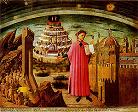
The new dove repair system contains a precious repairing serum? On Nov. 1, 1301 after the Guelphs controlling Florence split into White Guelphs, who want freedom from papal influence, and Black Guelphs, who support it, and the Whites expel the Blacks and snub papal ambassadors, an army led by Philip IV's brother Charles of Valois sent by pissed-off Pope Boniface VII takes Florence, destroying most of the city and killing White Guelphs, then installing a Black Guelph govt. on Nov. 7 under Messer Cante dei Gabrielli di Gubbio; meanwhile Florentine-born White Guelph Dante Alighieri (1265-1321) (who had been sent on a delegation to Rome to bargain with the pope, after which everybody but him was dismissed, catching him absent during the invasion, during which his assets were confiscated) is condemned to 2-year exile, raised to life exile after he refuses to pay a large fine with his pocket change; as the years go by and his White Guelph allies fail to retake Florence, he turns against them too and starts composing the founding document of the Italian language, the story of his pathetic unfulfilled life, La Divina Commedia (The Divine Comedy) (1304-21) ("Divina" added to the title later by Boccaccio) in 100 cantos, raising his personal friends and enemies to immortal heights and lows, esp. his dead unrequited true love babe Beatrice Portinari (1266-90) - take beano before and there'll be no gas?

On Apr. 10, 1302 the Estates-Gen. declares that the French king has no superior on Earth, and all three classes write to Rome separately in defense of the king and his temporal power; "Thus was the original sin of French absolutism born"; on June 13 Philip IV calls an assembly of French prelates in Paris, which trumps up charges on Pope Boniface VIII of illegally gaining the papacy, simony, heresy, and sexual perversion, and calls for a gen. church council to depose him. On May 18 (night) the Bruges Matins Massacre sees Flemish workers in Bruges rebel against high taxes and drive out the French garrison; on July 11 Philip IV's well-equipped knights wearing golden spurs are defeated by a ragtag Flemish army made up almost entirely of foot soldiers wielding the good-n-sharp goedendag at the Battle of the Golden Spurs (Courtrai) near Courtrai, Belgium, and all of the French army leaders and some of Philip IV's councillors are KIA; the myth of the invincibility of knights in armor is shattered, and all hopes for the return of Scottish king John Balliol backed by a French-Scottish army are kaput, showing how smart or lucky Robert the Bruce was to suck up to Edward I earlier in the year?; Count Guy of Flanders is released by the French to help negotiate terms, but they refuse. In Oct. 45 French prelates defy Philip IV to attend a council in Rome; on Nov. 18 after hearing of the French defeat, Pope Boniface VIII responds to the Estates Gen. by issuing the bull Unam Sanctam (The One Holy Catholic and Apostolic Church), declaring the supremacy of the Church to the secular govt. in all things, and asserting absolute papal jurisdiction over laymen vis a vis kings based on his right to correct sin, becoming the last papal claim to superiority over lay rulers until ?, with the soundbyte: "It is necessary to salvation that every human creature be subject to the Roman pontiff", to which one of Philip IV's ministers utters the soundbyte: "My master's sword is made of steel, the pope's is made of verbiage"; no surprise, ignoring the pope's many threats, Philip IV issues the official answer De Potestate Regia et Papali (On Royal and Papal Power), written by learned Dominican friar John of Paris (-1306), defending the authority of the king and denying the ownership of ecclesiastical property by the pope; meanwhile Philip IV sends his pope-hating councillor Guillaume (William) de Nogaret (1260-1313) (a lawyer born in Languedac, where he witnessed the Inquisition, turning him against the Church for life) to kidnap the pope and bring him to France for trial on his council's trumped-up charges.
On Apr. 20, 1303 the Sapienza U. of Rome is founded by Pope Boniface VIII via the bull In Supremae Praeminentia Dignitatis, "in that Rome may become the fruitful mother of science"; in 1431 Pope Eugene IV reorganizes it, creating schools of law, medicine, philosophy, and the theology, paying for it with a wine tax; it is destroyed during the 1527 Sack of Rome, and rebuilt in 1535 by Pope Paul III; in 1703 Pope Clement XI founds a botanical garden on the Janiculum; in 1870 it goes secular, going on to become the largest Euro univ. by enrollments in modern times; Pope Boniface VIII also founds the U. of Avignon in Avignon, France, starting out with faculties of civil and ecclesiastical law, followed in 1413 by theology, followed in the 16th cent. by medicine; it is closed in 1792 during the French Rev.



In Aug. 1303 pope (since Dec. 24, 1294) Boniface VIII (b. 1235) prepares a bull to be pub. on Sept. 8, declaring Philip IV automatically excommunicated for preventing the French bishops from going to Rome, and absolves his subjects of any need for acknowledging his authority; too bad, the news is leaked, and one day before he can proclaim it, on Sept. 7 the Outrage of Anagni sees the papal Gaetani Palace in Anagni in C Italy attacked by Philip IV's pope-hating councilor Guillaume (William) of Nogaret (1260-1313), Sciarra (Giacomo) Colonna (1270-1329) (one of the pope's bitterest enemies and brother of Stefano Colonna the Elder (1265-1348)) plus 2K mercenaries, and he is jerked from bed, threatened with death, slapped in the face by Sciarra, and captured after trying to get him to resign; the local townspeople become outraged, causing Nogaret and Colonna to flee, and the pope is released after three days, then taken to the Vatican by the Orsini family, where he dies on Oct. 11 of a fever, a broken man; on Oct. 22 Master Gen. of the Dominican Order Nicholas Boccasini (absent from Rome during the troubles) is elected Pope (#193) Benedict XI (1240-1304), and he immediately caves in, dismisses all blame for the attack at Anagni and reverses Boniface VIII's actions (official coverstory: tried and convicted for heresy, rape, sodomy, and eating meat during Lent, he skipped his trial and escaped punishment, only to go mad and commit suicide?), renews the royal right to tax the clergy, restores peace with Philip IV's court, and withdraws to Perugia.
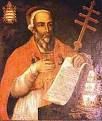
On July 7, 1304 after excommunicating Bishop Guillaume (William) of Nogaret, then getting poisoned by a tainted fig, Pope (since 1303) Benedict XI dies; guess who is suspected?; a conclave begins in July, but can't decide on a new pope until next June. On June 5, 1305 supposedly without French pressure, one of Philip IV's supporters, Frenchman Bertrand de Got, archbishop of Bordeaux is elected Pope (#194) Clement V (1264-1314); he then supposedly gets convinced of the Church's need for support by the French monarchy, continues Benedict XI's work of revoking Boniface VIII's anti-Philip acts, and chooses 12 new cardinals, nine of them French; he absolves Edward I from his 1296 oath taken in confirmation of the Charters, suspends the archbishop of Canterbury from office, and commands the English clergy to pay the king a tenth for seven years; in return Edward allows the pope to levy a new tax called annates (appointment tax) upon the British clergy, consisting of half of the first year's profits ("first fruits"), but it proves unpopular; Clement V goes on to have the body of his predecessor Boniface VIII exhumed and burned as a heretic.

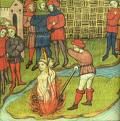
On July 24, 1307 the Knights Templar hold a gen. chapter meeting in Paris; pocket pope Clement V writes to his boss Philip IV on Aug. 24 with a sealed mandate, not to be opened until dawn on Oct. 13 (Fri.), telling of his vision that the Knights Templar are heretics and blasphemers, devil worshipers, homosexuals, sodomites, defilers of Christ and other blimey, and that God had told him to cleanse the Earth by rounding them all up and torturing them until they confess (roasting of the feet is particularly favored?); too bad, at midnight just before the big day dawns, Templar ships under the Admiral of the Fleet leave from La Rochelle, carrying all their big secret documents, portable treasures, and other neat stuff; on Oct. 13 (Fri.) (Oct. 21 Gregorian), AKA Black Friday the 13th, Templar grandmaster (since 1297) Jacques de Molay (1244-1314) is arrested in the Paris Temple by dozens of seneschals, accompanied by Philip IV, who gets pissed-off at not finding their treasure or documents; meanwhile the whole Templar Order throughout France is arrested (15K men), and its assets seized by the crown; the Order is charged with 127 blasphemous crimes; some Templars escape to Argyll, Scotland, where the war with England causes the papal bulls dissolving the order to never be proclaimed, and their allies the Freemasons protect them, admitting them into their lodges under the Accepted Rites of Freemasonry; others flee to Jewish-friendly Spain, Portugal, and Poland; de Molay's deputy Geoffroy de Charnay (1251-1314), and a few others barely survive under cruel chief torturer Gaspard Chaix, only to be burned on Mar. 18, 1314 after they refuse to give up the big secrets of where the loot is?; tortures incl. having heavy weights attached to their testicles, being jerked over heavy beams, held in dungeons for months, feet-roasting et al. - you can't take the Fifth with Clement the Fifth? On Aug. 8, 1308 Pope Clement V summons witnesses for the Templar Trials in Poitiers, bringing 72 Templars to testify about worshiping Head 58 AKA Baphomet (Muhammad?) (Sofia after applying the Atbash Cypher?) (the Shroud of Turin or Mandylion?); on Aug. 17 senior officers of the Templars are interviewed by three cardinals in Chinon; on Sept. 13 English common law stops a pair of French inquisitors arriving in England from prosecuting the Templars, causing Pope Clement V to write to Edward II: "We hear that you forbid torture as contrary to the laws of your land. But no state law can override canon law, our law. Therefore I command you at once to submit those men to torture", causing Edward II to flop, holding the first English tribunal of the Inquisition, and becoming the last use of torture in England until Queen Bloody Mary in 1553-8; the tribunal suppresses the Templar Order and seizes its assets for Edward II, making him and Philip IV the two kings who make out the best?; in Oct. 2007 the Vatican announces the release of the trial documents, showing that they were absolved of heresy charges but burned anyway - and all those Vatican bureaucrats kept their silence all that time?

On Mar. 9, 1309 nouveau riche Philip IV of France orders the papacy moved from the Lateran in Rome to a new papal court in France, but Pope Clement V, allegedly pissed-off at his treatment of the Templars fixes the papal court in Avignon in sunny SE France in the Venaissin, outside of Philip IV's jurisdiction; the Babylonian Captivity of the Church begins (ends 1377); Villandraut Castle (Chateau de Villandraut) is built by Bertrand the Goth for the popes in Avignon, and they stay there until 1377, followed by the Avignonese popes of the Western Schism of 1378-1417, causing the Lateran to begin to fall into ruin.
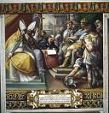
In Nov. 1310 at the urging of Avignon Pope Clement V and the Ghibellines, German king (since 1308) Henry VII of Luxembourg (1275-1313) invades Italy with 5K troops and restores order in Milan, Cremona, and Rome, intending to reconcile the Ghibellines and Guelphs; too bad, the Ghibellines have other ideas, esp. Cangrande (It. "big dog") I della Scala (1291-1329) (patron of Dante) of Verona, and White Guelph Dante Alighieri cheers Henry VII on from the sidelines as the new Charlemagne, exhorting him to retake Florence from the hated Black Guelphs so he can return from exile, but making the mistake of going overboard and dissing his personal enemies, which backfires when Henry VII dies in 1313 and the White Guelphs are pardoned, but he is specially exempted for personal invective-filled letters to Henry VII; meanwhile he writes the first two books of his "Divine Comedy".
Don't begin the Beguines? In Oct. 1311 the Council (Synod) of Vienne (ends 1312), called by Pope Clement V denounces the Beguines (retreats for widowed Crusaders and other women, who take no vows and care for the sick and poor) (founded 1180) as heretical, and orders their suppression; a number of Beguine communities survive to modern times; Pope Clement V declares the belief in the right to usury to be heresy, and abolishes all secular legislation allowing it.
In Feb. 1312 Philip IV appears before the Council of Vienne and vehemently demands the suppression of the Knights Templar; on Mar. 22 Pope Clement's bull Vox Clamantis dissolves them, and transfers their property to the Hospitalers, except in Spain and France, where the crown keeps it; Philip makes the Templar treasury a section of his royal finance admin.; excommunicated Robert I the Bruce welcomes the Templars to Scotland; Dinis I of Portugal protects the Templars in his territory, and absorbs their holdings into his new Order of Christ; on Apr. 4 the Council of Vienne proclaims a new Crusade.
On Mar. 18, 1314 after years of fruitless attempts to torture out the whereabouts of their treasure, 39 more Knights Templar are burned in Paris, incl. grandmaster Jacques de Molay (b. 1244) and his deputy Geoffroi de Charny (b. 1251), preceptor of Normandy; they are slow-roasted over smokeless charcoal, taking hours to die?; in the flames de Molay (who had been tortured into a confession of heresy and given life in priz earlier that day, only to immediately retract it and ordered burned) protests the innocence of the Templar Order, and calls down Philip IV and Pope Clement V for their injustices, launching the Templar Curse, and sure enough they both croak later this year, popey going first in only 33 days?
On Apr. 20, 1314 Pope (since 1305) Clement V (b. 1264) dies, and the papacy remains vacant for more than two years - read your Dante and grab an iced half-latte?



The original Iron Man Triatholon? On Nov. 25, 1314 after a double election, where the archbishop of Mainz casts four of the seven votes, Louis (Ludwig) IV the Bavarian (1282-1347), head of the House of Wittelsbach (founded 1119) is crowned king of Germany and HRE in Bonn by the archbishop of Cologne instead of the usual site of Aachen, and begins an 8-year civil war over the imperial title with Frederick III the Handsome (the Fair) (1289-1330), who is supported by his brother Duke Leopold I of Austria (1290-1326) and the Avignonese popes; during Louis IV's reign the imperial chancery first adopts German instead of Latin for use in official documents - jawhol, you spaghetti-slingers?
On May 31, 1316 after receiving his doctor of theology degree from the U. of Paris, Cesena, Italy-born Franciscan theologian Michael of Cesena (1270-1342) is elected minister gen. of the Naples chapter, and travels to Assisi, where he convokes a chapter to revise the order's constitutions, issuing the document Gravi qua premor on Aug. 21, advocating ecclesiastical poverty to be like Christ and his Apostles, pissing-off Pope John XXII, who pub. the bull Quorumdam exigit on Oct. 7, 1317, declaring heretical the belief that since Jesus and his disciples owned nothing, the Church should do likewise; in 1318 he orders 25 pesky poor-mouthing Franciscans tried by the Inquisition in Marseilles, and after all are found guilty of heresy, four are burnt alive by French king Philip V as incorrigible heretics, pissing-off Cesena and his supporters incl. Berengarius of Perpignan and William of Ockham, who are opposed by inquisitor John of Belna, who in a disputation in Narbonne in 1321 claims their views to be heretical; on Mar. 26, 1322 Pope John XXII pub. the bull Quia nonnunquam, distinguishing between dominion and simple use in a compromise attempt; in June 1322 a gen. chapter of the Franciscan Order is convoked in Perugia, deciding that Christ and His Apostles possessed no earthly goods; on Dec. 8, 1322 Pope John XXII pub. the bull Ad conditorem canonum, forcing the Franciscans to accept ownership of their property, reversing Pope Gregory IX, who ruled that all Franciscan property belonged to the Holy See; in 1323 Pope John XXII pronounces false the proposition that Christ and his apostles had owned no property (which was approved by Pope Nicholas III in 1279), making the Spirituals (Zealots) of the Order of St. Francis into heretics, subject to be burned by the Inquisition; in 1328 after stalling for a year, Cesena appears before the pope in Avignon, and is excommunicated, while his supporters flee to Naples but are forced by a storm to land in Pisa, and HRE Louis IV deposes the pope; on June 11, 1329 after the pope gains control of the Franciscan Order, the gen. council of the Paris chapter condemns Cesena's views, and he is deposed from his leadership position and replaced by Gerard Odon (Geraldus or Gerardus Odonis) (Guiral Ot) (1285-1349); in 1330 the pope issues the encyclical Quia vir reprobus, warning the faithful against Cesena, who accuses the pope of heresy in his letter Ad perpetuam rei memoriam innotescat quod ego, Fr. Michael on Nov. 25, 1330; on Apr. 25, 1331 the Franciscan chapter in Perpignan expels Cesena from the order and sentences him to life imprisonment, and he fights for his cause until his Nov. 29, 1342 death in Munich; he is officially rehabilitated in 1359; meaanwhile on Nov. 28, 1336 new Pope (1334-42) Benedict XII confirms Odonis' Constitutiones Benedictinae, which are abrogated by the gen. chapter in Assisi on June 1, 1343, restoring the 1260 Constitutions of Narbonne.

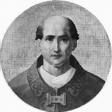

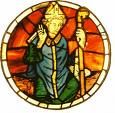
On June 5, 1316 king (since Nov. 29, 1314) Louis X the Quarreler of France (b. 1289) dies suddenly of pleurisy caused by overindulgence in cold wine after becoming overheated playing ball, and on Nov. 15 his posth. infant son (by his 2nd wife Clemence of Hungary) Jean (John) I (b. 1316) becomes unlucky Capetian king #13, with his uncle Philip the Tall as regent, but dies after five days on Nov. 20 (oops, who left that pillow on his face?), leaving only Louis X's infant daughter (by his 1st wife Margaret of Burgundy) Jeanne, and since the Salicylic Lobby conveniently says that monarchs with PMS and no Midol yet on the market are out, a great nat. council gives the crown to Louis X's younger brother Philip V the Tall (1294-1322), who becomes Capetian king #14 (until Jan. 3, 1322), solidifying the male supremacist Salic Law excluding women from succession to the French throne; a rabid anti-Semite, Philip V makes admin. reforms and attempts to unify weights and measures to keep up with Edward I of England, but bumps up against opposition in the estates-gen; meanwhile after two years of failure to elect a new pope, he convenes a conclave of cardinals in Lyons, which on Aug. 7 elects Jacques Duese as Pope (#195) John XXII (1249-1334); when the new pope refuses to crown Louis IV the Bavarian as HRE, he starts a propaganda war, led by Marisilius of Padua (1270-1342) and William of Ockham (Occam) (1280-1347), challenging the power of the papacy and attempting to revive the prestige of the empire; Marsilius of Padua founds the Conciliar Movement (Conciliarism), which claims that a gen. council is superior to a pope, can be called by a king, and is competent to judge a pope or call a new conclave, which is given a more forceful form in 1379 by Henry of Langenstein (1325-97), gaining a large following.





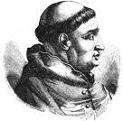
On June 5, 1316 king (since Nov. 29, 1314) Louis X the Quarreler of France (b. 1289) dies suddenly of pleurisy caused by overindulgence in cold wine after becoming overheated playing ball, and on Nov. 15 his posth. infant son (by his 2nd wife Clemence of Hungary) Jean (John) I (b. 1316) becomes unlucky Capetian king #13, with his uncle Philip the Tall as regent, but dies after five days on Nov. 20 (oops, who left that pillow on his face?), leaving only Louis X's infant daughter (by his 1st wife Margaret of Burgundy) Jeanne, and since the Salicylic Lobby conveniently says that monarchs with PMS and no Midol yet on the market are out, a great nat. council gives the crown to Louis X's younger brother Philip V the Tall (1294-1322), who becomes Capetian king #14 (until Jan. 3, 1322), solidifying the male supremacist Salic Law excluding women from succession to the French throne; a rabid anti-Semite, Philip V makes admin. reforms and attempts to unify weights and measures to keep up with Edward I of England, but bumps up against opposition in the estates-gen; meanwhile after two years of failure to elect a new pope, he convenes a conclave of cardinals in Lyons, which on Aug. 7 elects Jacques Duese as Pope (#195) John XXII (1249-1334); when the new pope refuses to crown Louis IV the Bavarian as HRE, he starts a propaganda war, led by Marisilius of Padua (1270-1342) and William of Ockham (Occam) (1280-1347), challenging the power of the papacy and attempting to revive the prestige of the empire; Marsilius of Padua founds the Conciliar Movement (Conciliarism), which claims that a gen. council is superior to a pope, can be called by a king, and is competent to judge a pope or call a new conclave, which is given a more forceful form in 1379 by Henry of Langenstein (1325-97), gaining a large following. Meanwhile in 1316 eight Dominicans are sent to Ethiopia by Pope John XXII to check on age-old rumors of a Christian king named Prester John, and in 1317 Pope John XXII bans alchemy, and provides for the forfeiture of any gold and silver created through its practice - just in case?
In 1317 Matteo I Visconti gets his son Giovanni Visconti (1290-1354), elected archbishop of Milan, but Pope John XXII refuses to confirm him, putting Aircardus of Comodeia (-1339) in the job; never count a Visconti out?
In 1323 Pope John XXII canonizes Thomas Aquinas (1225-74) 49 years after his death; it takes until 1567 to make him a doctor of the Church - it's a dirty story of a dirty man, and his clinging wife doesn't understand?
In 1324 English Franciscan friar William of Ockham (Occam) (1280-1347) defines his Nominalist (anti-Realist) philosophy at Pope John XXII's court in Avignon, incl. the cool Ockham's Razor (principle of economy of thought), toppling the dunce school of his rival Duns Scotus; Ockham's school dominates European thought until the Protestant Reformation of the 1500s; meanwhile they don't buy it, and Pope John XXII excommunicates Ockham's friend HRE Louis IV the Bavarian.

In 1327 German mystic Meister Johannes Eckhart von Hoccheim (1260-1328) is summoned to Avignon by Pope John XXII to defend himself against accusations of heresy, and is condemned and executed next year in Avignon; bad boy Marsilius of Padua is excommunicated by the pope, along with Castruccio Castracani.

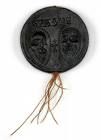
Anyone for a cocktail? On Jan. 17, 1328 Louis IV the Bavarian (1282-1347) is crowned HRE by aged pope-slapping Ghibelline Roman senator Sciarra Colonna (b. 1270) ("captain of the Roman people") in Milan; in Apr. Louis IV declares "Jacque de Cahors" (Pope John XXII) in Avignon deposed for heresy, and on May 12 proclaims spiritual Franciscan Pietro Rainalducci as Antipope Nicholas V (1260-1333) (until July 25, 1330), becoming the last imperial antipope (set up by a HRE); Marsilius of Padua helps Louis IV with more good propaganda under imperial protection until his death in 1342. Early in 1329 HRE Louis IV the Bavarian leaves Rome, allowing Antipope (since 1328) Nicholas V to be deposed, and on July 25, 1330 he abdicates, and Pope John XXII pardons him, and keeps him as an honorable captive in the new papal palace in Avignon.
On Apr. 28, 1330 Mary-worshiping Benedictine Ettal Abbey in Bavaria is founded by German king and HRE (since 1314) Louis IV the Bavarian (1282-1347) near an Alpine pass where he passed on his 1328 journey to Rome from Augsburg, bringing them the marble Ettal Madonna on his way back; when he returns to Munich, Louis IV turns his court into a refuge for trendy pope-questioning philoafers, er, philosophers incl. Marisilius of Padua (1270-1342), William of Ockham (Occam) (1280-1347), and Michael of Cesena (1270-1342); meanwhile Pope John XXII fumes on, pulling every string to depose him.
In 1332 the Black Death (Bubonic Plague), caused by Yersinia pestis starts in India. On July 23, 1332 eager for a new Crusade, Pope John XII writes to Venetian Doge Francesco Dandolo, telling him that the injustices they had suffered at the hands of the Turks could be a visitation of divine justice for allowing them too much freedom in their overseas possessions, causing them to agree to assemble a fleet of 20 galleys in Negroponte harbor next Apr. 15 to take them on. In Aug. 1333 after the promised Crusader fleet at Negroponte fails to materialize, King Robert of Naples writes Pope John XXII, telling him he should earmark all the tithes from Italy for the Crusade, causing the pope to reply on Nov. 19 that he needs French king Philip VI's consent, putting a damper on it.

On Sept. 14, 1334 (Wed.) the naval Battle of Adramyttium (Edremit) sees the 20 Venetian galleys under Pietro Zeno (-1345) defeat emir Yakhshi of Karasi, reducing Turkish raids in the Aegean Sea, setting things up for the promised new Crusade; too bad, on Dec. 4 Pope (since 1316) John XXII (b. 1249) dies, and on Dec. 20 former Cathar-broiling inquisitor (Cistercian monk and bishop of Pamiers) Jacques Fournier is egg-lected Pope (#196) Benedict XII (-1342), becoming Avignon pope #4, dropping plans for the Crusade, allowing Umur Pasha to resume his attacks next year, starting with Morea, and the Turkish menace on the E Mediterranean blossoms until new pope Clement VI is elected in 1342, with plundering of the Aegean islands and Greek mainland, incl. Crete.
On Dec. 18, 1334 a large number of professors at the U. of Paris meet to discuss Pope John XXII's opinion that the saints do not enjoy the complete Beatific Vision (Visio beatifica) until after the Last Judgment, getting so pissed-off that on Dec. 19 Philip IV orders 29 professors to meet in Vincennes to continue the discussion, and they reject the pope's opinion, after which a 2nd assembly does ditto on Jan. 2, 1334, causing the pope to withdraw his opinion on Dec. 3, 1334.

On Apr. 25, 1342 Pope (since Dec. 30, 1334) Benedict XII dies in Avignon, leaving 1,117,000 florins for a new Crusade, and on May 7 rich man's son Pierre Roger de Rosiers-d'Egletons (in Correze, Limousin) is elected Pope (#197) (the Black Death Pope) Clement VI (1291-1352) in Avignon (4th Avignon pope), making an avg. income of 118,500 florins a year, soon issuing a bull confirming how-much-this-time Giovanni Visconti as archbishop of Milan, who makes it a 2-for-1 and buys the title of ruler of Milan for 500K florins, sharing it with brother Luchino Visconti (1287-1349); too bad, the new pope squanders his dough on the papal palace in Avignon, the purchase of Avignon from Joanna I of Naples, loans and gifts to the French crown, and luxurious living, with the soundbyte "My predecessors did not know how to be pope", and "I have lived as a sinner among sinners", but that doesn't stop him from sending a circular letter next Aug. 8 calling for a Crusade, as long as others pay for it, chiding the Hospitalers for their conspicuous luxury, and not too subtly reminding them of the fate of the Templars, and telling everybody to assemble their fleets at Negroponte next Nov. 1 (All Saints Day); another male slut, Plutarch calls Clement VI "an ecclesiastical Dionysius with his obscene and infamous artifices"; after his confessor warns him to give up his dozens of mistresses, Bentadick, er, Clement VI replies that he has been sleeping with whores since his youth and continues on the advice of his physicians? - I reproduce like mice?


In 1342 fine-looking babe Margarete Maultasch (Bag Mouth) (the Ugly Duchess) of Tirol (1318-69) dumps her first hubby (since 1330) John Henry of Bohemia (1322-75) (brother of HRE Charles IV) for HRE Louis IV the Bavarian's eldest son Louis V the Brandenburger of Bavaria, Margrave of Brandenburg (1315-61), marrying him without being granted a divorce to John Henry first, relying on Louis IV to annul the marriage instead, and his court philosophers William of Ockham and Marsilius of Padua to defend the first "civil marriage" in the Middle Ages, but new pope Clement VI doesn't buy it, and excommunicates them both, causing her to be called ugly and a lot worse by the jealous celibate clergy, while Louis V acquires Tyrol (Tirol) and Carinthia through his new marriage; in 1358 Pope Innocent VI absolves them; too bad, the ecclesiastical propaganda works through the ages, causing her to be portrayed as more and more ugly, until she becomes the subject of the 1816 novel "The Ugly Duchess" by Lion Feuchtwanger, and the Duchess in Lewis Carroll's "Alice's Adventures in Wonderland".
Also in 1342 Pope Clement VI issues the bull Gratiam Agimus, making the Franciscans the official custodians of the Holy Places in the name of the Church; William of Ockham becomes gen. of the Franciscans; the office of Latin patriarch of Jerusalem is established, becoming head of the Order of the Holy Sepulchre (until 1489); in 1374 the office is moved to the Basilica di San Lorenzo Fuori le Mura in Rome.
On Jan. 27, 1343 Pope Clement VI issues the bull Unigenitus, justifying the power of the pope and the use of indulgences.
On Sept. 3, 1343 the U.of Pisa is founded in Pisa, Italy by the bull In Supremae Dignitatis by Pope (1342-52) Clement VI (1291-1352).
On Nov. 1, 1343 the Crusader fleet run by the Knights of St. John assembles in Negroponte as Pope Clement VI had requested, and he manages to scrounge up funds to back them despite the bank collapse; too bad, in Nov. a tsunami cashiers the quays of the once major maritime city of Amalfi on the Gulf of Salerno 20 mi. SE of Naples, whose maritime laws once prevailed throughout Italy, and it goes kaput commercially, not to mention what the plague does to it.
On May 13, 1344 (Ascension Day) the 24-galley Latin Crusader fleet sinks 52 Turkish ships and burns 60 more, which the Turks abandon at Longus on Pallene in the Chalcidic Peninsula, causing Pope Clement VI to write a letter on Aug. 12 thanking Venetian Doge Andrea Dandolo; meanwhile on Oct. 28 (Feast of St. Jude and St. Simon) the Crusaders surprise-attack and capture the port of Smyrna (Izmir) (until 1402), and drive out pesky Umur Ghazi (the Lion) (Pasha) (1309-48), although they only capture the harbor and waterfront fortress, leaving the Muslims entrenched in hilltop fortifications, with a ghost town in between, beginning the Smyrniote Crusade (ends 1351), led by Roman Catholic patriarch of Constantinople (1339-45) Henry of Asti (-1345).
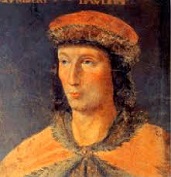
On Jan. 17, 1345 (St. Anthony's Day) Umur Pasha's men sneak down and massacre Crusaders holding Mass in an abandoned Christian church in Smyrna, which the Muslims had converted to a stable, killing Venetian cmdr. Pietro Zeno, Henry Asti and the other leaders; the news pisses-off Pope Clement VI, who uses it to drum up more money and men to send to their aid, while trying to keep France and England from messing it up with their war; he recruits Humbert II of Viennois (de la Tour-du-Pin) (1312-55) to be the new leader, with new aid from Venice, and he leaves Mariseille in May and arrives in Negroponte around Christmas.
On June 8, 1346 the 26-galley papal fleet of Humbert II of Viennois is attacked by the 29-galley fleet of Genoese adm. Simone Vignosso near Rhodes to prevent them from capturing Chios, which they want for themselves, and which they take after a 3-mo. siege on Sept. 12, after which they occupy Old and New Phocaea on the coast of Anatolia by Sept. 20, restoring Genoese commerce in the Levant; meanwhile Humber's fleet proceeds to Smyrna, arriving in late June; too bad, despite as many as 15K Crusaders massing there, the heat causes them to become ill and die like cattle, and famine sets in, so he ends up leaving and wintering at Rhodes, writing the pope that they should seek a truce, which he agrees to, although Humbert ends up returning home instead when he receives news of his wife's death in 1347; too bad, the Venetians at Smyrna are not ready to give up.
The Black Death (the original Darth Vader) rockets through Europe's Internet with breathtaking speed? In Oct. 1347 a Genoese trading fleet arrives in Messina, Sicily carrying the Black Death (Bubonic Plague), caused by Yersinia pestis bacteria carried by fleas from rats; it also arrives in Egypt, Syria, and Cyprus; by 1351 it kills 20M-30M in Europe (a third of Europe's pop., and up to 60% in some areas), and 75M worldwide by 1361; world. pop. decreases from 450M to 350M-375M by 1400; Europe takes 150 years to return to 1347 pop. levels; it ravages China, halving its pop. from 123M in 1200 to 65M in this cent.; lucky America is not affected, but not toughened up by it either?; rats didn't really spread it, because it spread too fast from person to person?
In Jan. 1348 a Turkish proposal for peace in Smyrna from Umur Pasha reaches Avignon, but Pope Clement VI, who knows the Crusaders are exhausted and want to leave gets hung up on a demand that the new Christian fortress be destroyed, calling it an offense to Christendom; meanwhile on Mar. 5 a letter from Byzantine emperor John VI Cantacuzene arrives, promising 15K-20K men for a renewed attack, to be led by him personally, along with a request for a synod to discuss church union; too bad, in Jan. the plague arrives, throwing him off-balance, and he takes until 1350 to answer the emperor, while Umur Pasha takes the request to keep the fortress intact as proof that they want to stage future attacks in his territory, causing him to try to destroy it in a surprise attack in May, which backfires, and he is killed by an arrow, securing the Latin control of who-cares Smyrna; meanwhile the emperor gets diverted by an expedition against Stephen Dushan, then after learning of his friend Umur's death, calls off the attack; Umur Pasha is succeeded by his elder brother Khidr Beg (Ihalabi), ruler of Ephesus, who on Aug. 18 arranges a truce with the Hospitalers and sends negotiators to Avignon to make peace.
In Jan. 1348 the Black Death begins in Marseille and Languedoc, spreading to Avignon in Mar., and Siena, Toulouse, Narbonne, Montpellier, and Carcassone in May; after the cemeteries are filled, bodies are piled high on the Campus Floris near the Church of St. Mary of the Miracles; in June it spreads to Spain, and Bordeaux, Lyon, Burgundy, Normandy, Paris, and SW England in Aug.; Agnolo di Tura the Fat of Siena, Italy writes the soundbyte: "The mortality in Siena began in May. It was a cruel and horrible thing. The victims died almost immediately. They died by the hundreds, both day and night. I buried my five children with my own hands, and so did many others likewise. Nobody weeps no matter what his loss because almost everyone expected death. So many died that all believed it was the end of the world"; it then disappears for the winter, except Ireland, which it decimates; the Great Plague results in horrible Jewish pogroms throughout Europe, incl. Chillon, Basle, Stuggart, Ulm, Speyer, Dresden, Strasbourg, and Mainz, destroying 60 major and 150 minor Jewish communities, causing survivors to head for Poland, which welcomes them as Kasimir III reworks the Polish law codes; in Strasbourg 2K Jews are hanged; in Freiburg ? are burned alive in wooden bldgs.; Basle burns 600 Jews, expels the rest, and destroys their synagogue and cemetery; Alfonso XI of Spain proposes that the Jews give up banking and take up agriculture; meanwhile, Millennium Fever is on full blast, and when terrible earthquakes rock Italy, this combined with the plague convince people that the end of the world is nigh.
On Sept. 26, 1348 Pope Clement VI issues the bull Quamvis Perfidiam, attempting to dispel the rumor that Jews caused the Black Death by poisoning wells, saying that they too are suffering from the plague, but he is ignored.
In 1348-53 Italian writer Giovanni Boccaccio (1313-75) writes The Decameron, about a party of wealthy ("well-bred, of worth and discretion") young patricians (seven women, three men) who take refuge from the Great Plague in a villa outside Florence with great gardens, and tell each other bawdy stories for 10 nights (100 in all), which becomes a storehouse for later writers to loot, incl. Chaucer and Shakespeare, and are later endlessly recycled by romance novelists and TV soap operas; the stories "Putting the Tail on the Donkey" and "Putting the Devil in Hell" are keepers, as are stories about what a wise and cool guy Saladin was; the Story of Jeannot de Chauvigny and His Jewish Friend sees a Jew visit Rome to see if Christianity is the true religion by observing the papacy, and after he finds them having swinging bi sex he decides it is and converts; "It seems to me that your Lord and his acolytes put all their energy into destroying Christianity and banishing it from the Earth. But I observe that your religion grows apace and gains in lustre and magnificence. I think that this can only be the work of the Holy Spirit, and that therefore it must be the one true religion."
In summer 1349 the Great Plague reappears in Paris, where it peaks, killing up to 800 a day, and spreads to Picardy, Flanders, and the Low Countries; also in the summer it reappears in London, and spreads to Ireland, killing 35% of the pop. within a year; by the middle of the year half of the pop. of Venice is killed; by the end of the year half of England's pop. is killed, and a truce with France is called; the plague spreads to Norway when an English ship full of corpses floats into Bergen, and reaches Elbing (Elblag), Poland on Aug. 24; the Church and its credibility being challenged head-on, the main solution offered is by the Flagellants, who appear in force all over Europe (especially Germany), torturing themselves publicly, and proclaiming that the Second Coming is 33.5 years away (I been a bad, bad boy, so tan my sinful hide?), while causing trouble for Jews, the rich, the Church, and finally themselves (besides all the wounds), causing Pope Clement VI to pub. a bull condemning them on Oct. 20; "Many persons, and even young children were soon bidding farewell to the world, some with prayers, others with praises on their lips."


In 1350-1 the Great Plague begins clearing, leaving a depopulated Europe where the deck is reshuffled and the entire social order is thrown up for grabs. The intelligentisa begin to smell a rat in the divine pretensions of the Church, and launch the timeless look at the ancient pagan past called the Renaissance via their Greek scholar friends in Constantinople, no longer being satisfied with Arab translations but learning ancient Greek for themselves; meanwhile the working class see the class struggle clearly now, the rain is gone. In July 1350 Cola di Rienzi (Rienzo) (1313-54) of Rome reaches Prague and asks HRE Charles IV of Bohemia to help deliver Italy from the temporal power of the pope, but Charles arrests him and turns him over to Black Plague Pope Clement VI. On Dec. 6, 1352 (Thur.) Pope (since 1342) Clement VI (b. 1291) dies with his precious Smyrna still in Latin hands, which it stays for 50 years (until Dec. 1402), and on Dec. 18 Limousin canonist Etienne Aubert, cardinal-bishop of Ostia and Velletri is elected Pope (#198) Innocent VI (-1362), going on to reform the Dominicans and frantically try to round up support for the war against the Muslim Turks, who are raiding the E Mediterranean and harassing pilgrims; next spring Clement VI is given a majestic funeral cortege from Avignon to the Benedictine Abbey of Chaise Deu, where he is buried on Apr. 8, 1353 in a black-white marble tomb on top of a black marble table surrounded by 54 small statues of his relatives (all given high church offices by himself); 50 priests say Mass for him for nine days, after which it is generally agreed that this won't be nearly enough to save his dissolute and sinful soul from Hell?
On Jan. 19, 1353 after reps from the Byzantine city of Philadelphia in Anatolia beg the Avignon pope for aid against the "incessant and inhuman" attacks of the Turks, promosing to turn their city over to the Holy See, Pope Innocent VI tells them that they first have to agree to give up their allegiance to the Orthodox church, abjure their "ancient schism", and unite with the Latin Church, and sends them packing for further instructions; meanwhile on Apr. 1 he writes a letter to Hugh IV of Cyprus telling him to aid John VI Cantacuzene in his professsed goal of uniting the Greek and Roman churches, despite his questionable sincerity; on Nov. 28 the pope requests Pedro IV of Aragon and Genoa to allow two ships loaded with papal provisions for Smyrna to be given safe passage. On Dec. 15, 1355 after the Ottomans isolate Constantinople from Europe, Byzantine emperor John V Palaeologus, after consultation with Roman Catholic archbishop Paulus of Smyrna signs a golden bull promising to secure the obedience of the Greek Orthodox Church to the Holy See in Avignon in return for military aid in the form of five galleys, 15 transports, 500 horse and 1K infantry for 6 mo., during which time he will make Latin Catholicism the official Byzantine religion, start bldg. a palace and church for a papal legate, and establish three Latin colleges for the promotion of Latin culture and language -they da boss now, Roman emperor Constantine was right all along?) On July 21, 1356 Pope Innocent VI sends Carmelite bishop Pierre Thomas, of Patti, Sicily (who had just spent a year trying in vain to get Stephen Dushan to give up Serbian Orthodoxy) with a reply to the golden bull of Byzantine emperor John V Palaeologus, eagerly agreeing to its terms, although he knows he can't really send substantial military assistance against the Turks because all available troops are already occupied at precious Smyrna, and John knows he can't really get his subjects to convert to Latin Catholicism - listen to me, I need you? On Nov. 7, 1357 Byzantine emperor John V Palaeologus sends papal envoy Pierre Thomas back to Avignon with a letter kissing up to the pope, noting that Michael VIII (the first Palaeologian emperor) had done it, so he could too, with the soundbyte "I shall keep the faith and fidelity to my lord the supreme pontiff, as do the other princes in the Roman Church", promising to depose anti-Latin Constantinople patriarch Callistus, and ending with the kicker "I know that if your legate comes with galleys and the aid I seek, all will submit and be loyal to you".

Also in 1353 Italian writer Giovanni Boccaccio (1313-73) finished The Decameron (begun 1348), about a party of wealthy ("well-bred, of worth and discretion") young patricians (seven women, three men) who take refuge from the Great Plague in a villa outside Florence with great gardens, and tell each other bawdy stories for 10 nights (100 in all), which becomes a storehouse for later writers to loot, incl. Chaucer and Shakespeare, and are later endlessly recycled by romance novelists and TV soap operas; the stories "Putting the Tail on the Donkey" and "Putting the Devil in Hell" are keepers, as are stories about what a wise and cool guy Saladin was; the Story of Jeannot de Chauvigny and His Jewish Friend sees a Jew visit Rome to see if Christianity is the true religion by observing the papacy, and after he finds them having swinging bi sex he decides it is and converts; "It seems to me that your Lord and his acolytes put all their energy into destroying Christianity and banishing it from the Earth. But I observe that your religion grows apace and gains in lustre and magnificence. I think that this can only be the work of the Holy Spirit, and that therefore it must be the one true religion."
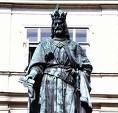
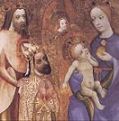
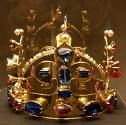
On Jan. 6, 1355 Bohemian king (since 1346) Charles IV of Luxembourg (1316-78) is crowned king of Italy, followed on Apr. 5 by HRE in Rome (until Nov. 29, 1378) by a papal legate sent from Avignon, ending years of conflict between popes and emperors over control of Italy and the papacy (now that half of the pop. is dead?), and allowing Charles to give Bohemia its golden age; his obscenely jeweled Bohemian Crown of St. Wenceslas has a nice little cross on top; he appoints U. of Perugia law prof. Bartolus de Saxoferrato (1313-57) as his consiliarius, who goes on to leave a large number of key works on Roman law that cause his opinions to be followed whenever Roman source texts are silent, and the saying "Nemo bonus iurista nisi bartolista" (No one is a good jurist unless he is a follower of Bartolus) to be coined. They call me mister big hot pastrami? In 1356 after the lessons of centuries of crapola finally wise him up, HRE Charles IV issues the Golden Bull of 1356, laying down the rules for imperial succession for the next four cents. (until 1806), and permanently ending papal interference in the Holy Roman Empire by eliminating the need for papal approval and confirmation of German kings and emperors, creating seven hereditary (by primogeniture) indivisible electors (the archbishops of Mainz, Trier, and Cologne, the count palatinate of the Rhine, the duke of Saxony, the margrave of Brandenburg, and the king of Bohemia), with the HRE to be decided by a majority vote (but limited to the house of Luxembourg) without delays; it also requires each new HRE to hold his first diet in Nuremberg after his election, and gives the electors supervisory powers over the empire, turning it from a monarchy into an aristocratic federation, with Charles IV openly calling the empire an anachronism but valuing the HRE's right to nominate to vacant fiefs; too bad, it "codifies anarchy and calls it a constitution", making pan-German kingship an impossibility and insuring a disunited Germany until the time of Bismarck, although Charles IV himself is personal ruler of all the kingdoms in the HRE by 1365.
On Nov. 7, 1357 Byzantine emperor John V Palaeologus sends papal envoy Pierre Thomas back to Avignon with a letter kissing up to the pope, noting that Michael VIII (the first Palaeologian emperor) had done it, so he could too, with the soundbyte "I shall keep the faith and fidelity to my lord the supreme pontiff, as do the other princes in the Roman Church", promising to depose anti-Latin Constantinople patriarch Callistus, and ending with the kicker "I know that if your legate comes with galleys and the aid I seek, all will submit and be loyal to you".

On Sept. 12, 1362 Pope (since 1352) Innocent VI dies, and on Sept. 28 Guillaume de Grimoard (a Benedictine monk who continues to wear his habit as pope) is elected Pope (#199) Urban V (1310-70), going on to found or aid at least nine univs. In May 1367 Pope Urban V sails from Marseille to Rome, taking the Avignon papacy with him, ending the Babylonian Captivity (begun 1309); Giovanni Boccaccio visits Rome in order to congratulate him; too bad, he returns to Avignon in 1370, and it's back on (until 1377). In 1369 Byzantine Emperor John V professes the Roman Catholic faith in er, Rome, hoping to end the East-West schism and gain Western aid against the Turks.
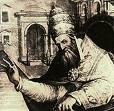

In Aug. 1370 Byzantine emperor John V comes to Rome to discuss the unification of the Eastern and Western churches with Pope Urban V, but the talks get hung up on matters of ritual; in Sept. unsettled conditions in Rome cause Pope (since 1362) Urban V (b. 1310) to return to Avignon, and he dies on Dec. 19; on Dec. 30 Limousin-born Pierre Roger de Beaufort is elected Pope (#200) Gregory XI (1331-78).


The first Jehovah's Witnesses come from Oxford? In 1374 gray-bearded Oxford U. prof. of divinity John Wycliffe (OE "white cliff") (1324-84), having conquered Oxford and made it the spiritual center of England begins preaching his anti-clerical doctrines from the pulpits of London under the patronage of John of Gaunt, and is employed by the govt. to negotiate with the papacy over provisions, becoming Edward III's chaplain; as a church reformer he gets so impatient to get an English trans. of the Bible into the common man's hands that he begins translating it single-handedly, while pub. tracts decrying the secularization of the Church, and claiming that all religious doctrines should be based on the Bible, not tradition or church synods, and that people should have direct access to God and therefore don't need auricular confession, denying the core concept of the Catholic Church, drawing mojo from the inability of the clergy to deal with or even explain the Black Plague except as God's judgment against them; in ? he pub. De Civili Domino (On Civil Authority or Dominion), proposing the disendowment of church property and the exclusion of the clergy from civil govt.; his itinerant proselytizing Poor Preachers, scornfully known as Lollards (Dutch "babblers") spread throughout England, at first reading portions of Wycliffe's English Bible trans. to eager crowds, then teaching people to read his Bible on their own, successfully making a large number of converts, incl. wealthy townsmen and country gentlemen, and doing so well that it is said that every 4th (3rd) (2nd) man is a Lollard. In 1374 Pope Gregory XI announces that the Inquisition has the right to intervene in sorcery trials, which hitherto had been considered purely civil matters. In 1377 after stigmata-toting Dominican nun (St.) Catherine of Siena (1347-80) talks him into it, Pope Gregory XI moves the papacy back from Avignon to Rome, ending the Babylonian Captivity (begun 1309) for real; he goes on to condemn the doctrines of John Wycliffe, who shoots back with more tracts; from now on most of the popes are Italian; the Lateran is almost in ruins, so the papal court is moved to the Vatican, which has the advantage of being much closer to the papal stronghold of Castel Sant' Angelo - and its Star Wars transformers that can go into mech mode?


In 1378 after 1335 didn't work out, the Joachites seize on the late 13th cent. prophesies of Arnold of Villanova (1238-1310) and claim that this is definitely the year in which Antichrist will appear - demanding steel nerves and the maximum concentration? Every day is a winding road, whoops? First the Babylonian Captivity of 1309-67, now the Great (Western) Schism, sprouting clone popes? On Mar. 27 Pope (since 1370) Gregory XI (b. 1331) dies, and on Apr. 8 Naples-born Bartolomeo Prignano is elected Pope (#201) Urban VI (1318-89) after a short conclave featuring a lot of kibbutzing by pro-Italian forces, aided by e ver-wounded St. Catherine of Siena; he decides to rule in Rome; the cardinals who elected him reconsider and nullify the election, then on Sept. 20 elect Robert of Geneva (Cambrai) as Antipope Clement VII (1342-94) whom they set up in Avignon, becoming the first antipope of the Great (Western) (Papal) Schism (ends 1417), while Pope Urban VI continues in the Vatican, laying back and enjoying the show while these are the days where anything goes and two or even three popes rule the infallible Church at the same time; England backs the Roman pope, while Scotland backs the Avignon antipope.




Ser-bi-a, and so are we, bye bye blackbird? On June 15 (June 28 New Style), 1389 (St. Vitus' Day) the Battle of Kosovo Field (Field of the Blackbirds) (First Battle of Kosovo) sees 27K-40K Muslim Turks under sultan (since 1359) Murad I (b. 1326) defeat 12K-30K Orthodox Christian Serbs under Prince Lazar allied with a Bosnian force of 5K-10 under Vuk Brankovic (1345-97), and another 5K-10K under his son Vlatko Vukovic Kosaca, Grand Duke of Hum (-1392) , both sent by Bosnian king Tvrtko I, along with a continent of Knights Hospitalers led by Croatian knight John of Palisna from Vrana, incl. several thousand cavalry, becoming the first Ottoman V against a major European allied army, establishing Turkish rule S of the Danube until 1913; Lazar is captured in battle and killed; on June 16 Murad I is killed in his tent, allegedly by a Serb posing as a deserter, although it's more probable that he dies in battle, becoming the only Ottoman sultan to die in battle; Murad I is succeeded by his partly-Greek son Beyazid (Beyezid) (Bajazet) I (Yildirim) (the Thunderbolt) (1347-1403) (until 1403), beginning the conquest of W and C Anatolia (Saruhan, Aydin, Menteshe, Hamideli, Germiyan, E Karaman) (1389-90); Prince Lazar's son Stefan Lazarevic (1374-1427) becomes ruler of Ottoman vassal Serbia, with his mother princess Milica ("gracious") Hrebeljanovic (-1405) as regent; his sister Princess Olivera Despina marries sultan Bayezid I; Stefan goes on to modernize Serbia, introducing modern battle tactics, knight tournaments, and firearms; some Serbs hold out in the mountainous Montenegro (It. "black mountain") (Serb. "Crna Gora") region of the province of Zeta between Yugoslavia and Albania, named after 5,771-ft. Mt. Lovcen ("black mountain"), which becomes an independent principality (until 1910); the Germiyan Turkoman principality in W Anatolia (founded 1283) is annexed by the Ottomans (1389-90), along with the Aydin principality in W Anatolia (founded 1308) and the Saruhan principality in W Anatolia (founded 1313); Murad I begins the large scale practice of Devshirme (Devsirme), the levying of Christian children for conversion to Islam and work in the Janissaries, palace, and admin.; from henceforth all Turkish sultans are sons of concubines - if not bitches?
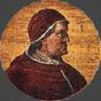
On Oct. 15, 1389 after changing the period between Holy Years to 33 to coincide with the length of Christ's life, and executing five cardinals for conspiring against him, headstrong quarrel-prone Pope (since 1378) Urban VI (b. 1318) dies (poisoned by the Romans for being older than 33?), and on Nov. 2 Naples-born Piero Tomacelli is elected Pope (#202) Boniface IX (-1404), ruling the city of Rome like an autocrat, bringing his hometown of Naples (which had supported the Avignon popes) back into his jurisdiction, and strengthening the papal states; he forbids Christians to harm Jews, destroy their cemeteries, or forcibly baptize them.
In 1390 after recognizing the rot that has set in, the Russian Orthodox Church stops all mention of the existence of a Roman emperor - it's survival in the city when you're living day by day?

On Oct. 7, 1391 St. Birgitta (1303-73) (Nor. "splendid") is canonized by Pope Boniface IX, becoming Sweden's first saint - a Viking saint? Also in 1391 Pope Boniface IX founds the U. of Ferrara. Also in 1391 John V Palaeologus's son Manuel II Palaeologus (1350-1425) becomes Byzantine emperor (until July 21, 1425); trouble is, he's a hostage of Ottoman Sultan Beyazid (Bajazet) I?; in the winter he writes Dialogue Held with a Certain Persian, the Worthy Mouterizes, in Ankara of Galatia, on Christianity vs. Islam, containing the immortal soundbyte: "Show me just what Muhammad brought that was new, and there you will find things only evil and inhuman, such as his command to spread by the sword the faith he preached", which is quoted by Pope Benedict XVI on Sept. 12, 2006; it concludes "God is not pleased by blood, and not acting reasonably is contrary to God's nature. Faith is born of the soul, not the body. Whoever would lead someone to faith needs the ability to speak well and to reason propertly, without violence and threats. To convince a reasonable soul, one does not need a strong arm, or weapons of any kind, or any other means of threatening a person with death", to which the Muslim replies that God isn't bound even by his own word, and that nothing can make him reveal the truth to us, and that he could even make us practise idolatry if he wants. In 1392 Byzantine emperor Manuel II Palaeologus escapes from the court of Beyazid I, causing him to seige Constantinople for almost 10 years (1394-1402).

On Sept. 16, 1394 Antipope (since 1378) Clement VII (b. 1342) dies of mushroom poisoning, and on Sept. 28 cardinal (since 1375) Pedro de Luna of the diocese of Tortosa in Aragon is elected antipope #2 of the Great Schism Antipope Benedict XIII (1328-1423) (until 1417) by the cardinals in Avignon on his promise of supporting the ending of the schism, which he reneges on. Meanwhile in 1394 the Ottomans under Sultan Bayezid I conquer Thessaly, and begin the First Ottoman Siege of Constantinople (ends 1402), blockading it to starve it out, causing it to be devastated by famine and plague, and a large part of the pop. to flee; in 1397 the siege is abandoned after a distraction caused by Tamerlane, but the blockade continues until 1402.


On Oct. 1, 1404 Pope (since 1389) Boniface IX dies, and on Oct. 17 Cosimo de'Migliorati is elected yet-another-old-Italian-guy Pope (#203) Innocent VII (1336-1406). In 1405 Leonardo Bruni (1369-1444) becomes apostolic secy. to the pope, lasting through four popes (until 1414), after which he moves to Florence and writes the first modern history book, about Florence.



On Nov. 6, 1406 Pope (since 1404) Innocent VII dies, and on Nov. 30 Angelo Corrario (Correr) is elected Pope (#204) Gregory XII (1327-1415). In 1408 the U. of Prague is torn apart by the Great Schism after German king (since 1376) Wenceslaus IV the Drunkard/Lazy (1361-1419), fearing that Roman pope Gregory XII might interfere in his plans to be crowned HRE orders his prelates and the univ. faculty to maintain strict neutrality between him and Avignon pope Benedict XIII, after which Prague archbishop (1403-11) Zbynek Zajic of Hasenburg (1376-1411) tells him to stuff it and remains faithful to Gregory XII, while Bohemian preacher Jan Hus (1369-1415), leader of the "Czech nation" avows neutrality; too bad, Hus gets into trouble for railing against Church moose hockey such as indulgences, and is defrocked, but the pop. rises to support him; meanwhile a convocation is held in Lucca, Italy to end the Great Schism - this bud's for you, Lucca?
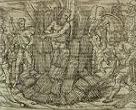

On Jan. 18, 1409 after Jan Hus' preaching at the U. of Prague causes an uproar among the Germans in the faculty and student body, causing the Hussites to send Jerome of Prague (1379-1416) to Wenceslaus IV to ask him to change the constitution of the univ., and Poland, Bavaria, and Saxony oppose the the emperor's request to remain neutral between the two rival popes of the Great Schism, Wenceslaus IV issues the Decree of Kutna (Kutná) Hora, giving the Czech nation three votes in the elections to the faculty of Prague U. and the other three only one vote each, after which Hus is voted rector of Prague U., causing deposed rector Johannes of Munsterberg and 5K-25K students and profs. to leap and zigzag out and and found Leipzig U. in Saxony, which is backed by a bull issued by new Antipope Alexander V on Sept. 9, and later becomes the alma mater of superbrain Gottfried Wilhelm von Leibniz. On Mar. 25 the cardinals of Rome and Avignon meet in the Council of Pisa, called by Rupert III to end the 30-year Great Schism, and depose Roman Pope Gregory XII and Avignon Antipope Benedict XIII, then on June 26 elect compromise candidate Pietro Phillarges (Peter of Candia) as antipope #3 of the Great Schism Antipope Alexander V (1339-1410) (until May 3, 1410); from this year to 1417 there are not one, not two, but three popes, G12, B13, and A5, sounds like an interesting chess game; Wenceslaus IV and the Hussites approve of the election, but Prague archbishop Zbynek Zjic remains loyal to Gregory XII, and though he had initially supported Jan Hus, he suddenly turns on him and orders him to discontinue preaching from his pulpit at Bethlehem Chapel in Prague, then after Wenceslaus IV pressures him to accept Alexander V, he gets him to condemn Hus in a papal bull on Dec. 20 in exchange for supporting him as da one and only pope.


On May 4, 1410 Antipope (since 1409) Alexander V (b. 1339) dies (poisoned?), and on May 17 Cardinal Baldassare Cosa of Naples (a brutal libertine and former pirate who obtains the position through force of arms and who is made a priest 1 day before his coronation?) is elected antipope #4 of the Great Schism Antipope John XXIII (1370-1419); his bitchin' backer Giovanni di Bicci de' Medici (1360-1429) hits the jackpot, and the Medicis become "God's bankers".
On July 16, 1410 Prague archibishop Zbynek Zajic excommunicates Jan Hus and his followers, and orders their works confiscated and burned at his court, causing Hus to flee a lynch mob, while pro-Hus Prague U. students chant "Illiterate Jajic burns books without knowing what they contain", after which Wenceslaus IV intervenes, ordering him to reverse his edict and replace the burned books, and when Zajic refuses he cuts off his income, then after he still refuses, confiscates all church treasures, after which Wenceslaus IV's brother Sigismund I intervenes and gets them to kiss and make up, after which Zajic gets cold feet and tries to hike to Hungary, falling ill and croaking in Prespurk (Bratislava) next Sept. 28. In Mar. 1411 a new ban is put on Jan Hus, but he keeps on truckin', preaching the disturbing doctrines of John Wycliffe; meanwhile, Antipope John XXIII tries to finance a war through the wholesale selling of indulgences, and Hus' preaching against it gets the city of Prague declared to be under a special curse from God.


In 1411 after rival king Jobst of Moravia dies, Sigismund I of Luxembourg, son of HRE Charles IV, and brother of deposed HRE Wenceslaus IV is elected German king Sigismund I (1368-1437) and crowned HRE, with Wenceslaus allowed to keep Bohemia; Big Sig becomes the first HRE to officially adopt the old Roman double-headed eagle as the armorial of the Holy Roman Empire, and he succeeds the French king as the main protagonist for ending the papal schism, forcing Antipope John XXIII to call the Council of Constance of 1414, with a mission of reforming the Church from head to foot.
On Feb. 13, 1413 the Disputation of Tortosa in Spain opens at the request of Antipope Benedict XIII, pitting Jewish scholars against Christian scholars incl. Joseph Albo (1380-1444) on matters of faith, with the aim of converting the Jews to Christianity by debate - well, later as we are toasting marshmallows we can say we tried? On Nov. 12, 1414 the Disputation of Tortosa ends with no Jewish minds changed, causing the Roman Catholic Church to intensify forceful means of conversion of these stiff-necks to save their souls.

On Mar. 20, 1413 46-y.-o. English king (since 1399) Henry IV (b. 1367) dies at Westminster Abbey, and on Apr. 9 his 25-y.-o. son Prince Hal the Lancastrian is crowned Henry V (1387-1422) ("King Harry") of England (the 34th British monarch); under his rule England finally becomes a major power, and his court becomes the first to use mainly English.



On Sept. 23, 1413 knight, boon companion to Henry V, and leading Lollard Sir John Oldcastle, Lord Cobham (1378-1417) (the real Falstaff?) is arrested and brought before Thomas Arundel (1353-1414), archbishop of Canterbury (since 1399) on charges of heresy, and excommunicated; he escapes and goes into hiding in Wales, where he leads a Lollard Uprising. In 1414 after a plot against his life is discovered, English king Henry V attacks and captures a Lollard group, and has most of them hanged, pushing through anti-Lollard legislation allowing seizure of their books. I'm your Venus, I'm your Fire of Jordan? In 1417 Oldcastle is captured and burned alive for heresy along with 36 companions; the persecution of Lollards heats up for the next 10 years, driving them underground until the time of Martin Luther.
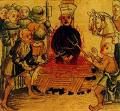
In Oct. 1414 Jan Hus (b. 1369) is lured to his death by Antipope John XXIII to the keep-constant Council of Constance (1414-18), ostensibly to settle "causa unionis, reformationis, fidei", but in fact to try and condemn him for heresy after nearly killing him in a stinking dungeon; the council prohibits the cup to the laity during Communion, and confirms the Conciliar Theory that the authority of a gen. church council is superior to the popes, deposing all three current popes and electing a new one, which ups Sigismund I's capital and makes him the most influential monarch in W Europe; former pirate John XXIII is charged with 70 offenses, incl. piracy, murder, rape, sodomy, and incest, after which 16 "of the most indescribable depravity" are dropped in the interest of public decency?; meanwhile proposals to reform and reorganize the corruption and abuses of the rest of the hierarchy are debated, but never attain majority support, although the need for reform is universally recognized.
On May 29, 1415 insufficiently anti-Jewish Antipope (since 1410) John XXIII (b. 1370) is forced to abdicate in favor of Antipope (since 1394) Benedict XIII, who on May 11 issues the bull Etsi Doctoribus Gentium against the Jews, banning the study of the Talmud, instituting forced Christian sermons, and restricting Jewish life completely, provoking mass feigned conversions. On July 4, 1415 Roman Pope (since 1406) Gregory XII (b. 1327) dies in Recanati in C Italy. Don't muss with us Huss? On July 6, 1415 Jan Hus (b. 1369) of Bohemia is burned at the stake at Constance (Konstanz) for heresy after HRE Sigismund I, who had guaranteed him safe conduct signs his death sentence, thus earning the everlasting hatred of the Bohemians, and making it impossible to rule Bohemia when he takes it over in 1419; Sigismund I bans Duke Frederick IV of Austria for siding with Antipope John XXIII at the Council of Constance, causing him to lose the Aargau (old homeland of the Hapsburgs) to the Swiss, although with popular support he keeps Tirol, which he stabilizes by beginning silver mining, moving his court from Merano to Innsbruck.

Abraham and Martin and John, Medieval Edition? On July 26, 1417 the Council of Constance deposes antipope (since 1394) Benedict XIII, ending the Great Schism of the West (begun in 1378); on Nov. 11 Oddone (Ottone) Colonna (Eau de Cologne?) (born in Genazzano near Rome) is elected Pope (#205) Martin V (1368-1431); rockhard lunatic Benedict XIII returns to his rockhard fortress near Valencia, Spain, and holds out as a pretender pope until his death in 1423.
On Aug. 16, 1419 Bohemian king (since 1378) and HRE (1378-1400) Wenceslaus IV the Drunkard (Lazy) (b. 1361) dies, leaving Bohemia in a deep crisis caused by the betrayal of Jan Hus, and guess-who HRE Sigismund I succeeds to the throne of Bohemia, being immediately challenged by the growing and pissed-off Hussite movement, whose members hate his huts for what he did to Jan Hus, and start the Hussite Wars (end 1436), plunging the country into almost 20 years of extreme violence, with Tyn Church (Church of Our Lady in Front of Tyn) in Prague as the Hussite command center; the Hussite Wars hasten the Reformation in Bohemia, while surging Bohemian nationality causes the Bohunks to block any hope of German unification and break off from Germany permanently; meanwhile Sigismund I has trouble getting crowned HRE, taking until 1433.
On Feb. 1-14, 1420 the Second Coming of Christ is coming, according to Martinek Hauska of Prague, who gains a group of followers and goes on a rampage "purifying the Earth" of false clergymen, holing up in an abandoned fortress called Tabor for decades, until they are finally quashed by the Bohemians in 1452. Meanwhile in 1420 the pesky Jews are expelled from Lyons; Jews remain in France only in Provence and in the possessions of the Holy See; they are also expelled from Vienna; meanwhile Pope Martin V forcibly reinstates the old privileges of the Jews in Rome, and forbids forced baptism of Jewish children under age 12, and on Feb. 23, 1421 issues a bull reminding Christians that Christianity is derived from Judaism, and warning friars not to incite against the Jews; too bad, next year he withdraws it - what a bunch of bull?

In Mar. 1420 Pope Martin V at the urging of HRE Sigismund I preaches a crusade against the Hussites; on Nov. 1 a force of 12K Hussite Bohemian peasants under blind gen. Jan Zizka (John Ziska) (1360-1424) of Trocnov defeats Sigismund I's 18K soldiers at the Battle of Vysehrad Castle in Prague, and expels him from Bohemia after he has himself crowned king of Bohemia in Prague. In 1422 the Hussites under Jan Zizka rout HRE Sigismund I again at the Battle of Kutna (Kutná) Hora near Prague. In 1425 after Jan Zizka (b. 1360) dies, his followers called the Ultraquists (who demand Holy Communion when and where they wish, since John 6:54 says it's the only way to "have life in you") split with the more radical Christian Communist Taborites, based in Tabor in S Bohemia - okay, you've waited long enough?
On June 10, 1423 Gil Sanchez is elected antipope #5 of the Great Schism Antipope Clement VIII (-1429) (until Nov. 12, 1425) by the diehards of the magic melancholy tear in your eye in Avignon. On Nov. 12, 1425 Bernard Garnier is elected antipope #6 of the Great Schism Antipope Benedict XIV (-1429) in Avignon (until July 26, 1429).
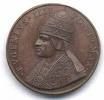
By 1430 most of the Greek classics have been brought to Italy. On Feb. 20, 1431 Pope (since 1417) Martin V (b. 1368) dies from eating too many eels after convoking the Council of Basel (ends 1449) to deal with the pesky Hussites and Ottomans, and on Mar. 3 Gabriello (Gabriele) Condulmaro is elected Pope (#206) Eugene (Eugenius) IV (1388-1447), putting the skids on any plans to make the Church a democracy, establishing that the pope is a higher authority than a council, not vice-versa; his servant Poggius pines over the decay of Rome through the cents.
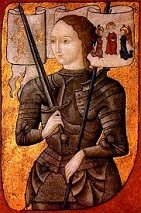
There are Nuts, and There are Planter's Roasted Nuts, or, Scent of a Woman Pt. II, or Do Lobsters Have Feelings, or, When They Come to Call On You and Drag Your Poor Body Down? On May 30, 1431 after Henry VI's uncle Duke John of Bedford (uncle of Jacquetta, Duchess of Bedford, mother of Elizabeth Woodville, wife of Edward IV) has French holy warrior babe (St.) Joan of Arc (b. 1412) tried by a stacked French ecclesiastical commission and condemned as a heretic for dressing in men's clothes, she is burned at the stake in Rouen's old market square (Place du Vieux Marche), singing out the name of her Lord Jesus; chief judge Bishop Pierre Cauchon (1371-1442) denies her a lawyer and railroads her through the rigged jury of 60 clergy and theologians on the English payroll, then falsifies the trial minutes to cover it up; too bad for Bedford, but her martyrdom only fans the flames of French nationalism, and forever afterward the idea of England trying to rule any part of France gives off bad vibes.
Meanwhile in 1431 the Roman Catholic Crusaders of the HRE are crushed by the Taborites under radical Bohemian priest Andreas Prokop the Bald (the Great) (the Holy) (1380-1434) at the Battle of Domazlice. On May 30, 1434 Prokop the Great (b. 1380) leads his Taborites at the Battle of Lipany (Lipan) (Cesky Brod) 25 mi. E of Prague, but is defeated and KIA by the Ultraquists and Bohemian Roman Catholics.



In 1434 pulling every string he has (incl. the pope), Cosimo I de' Medici (1389-1464) returns to Florence from exile, ousts the Albizzis, and modestly accepts rule of the city (without holding office himself) until his death in 1464; "Political questions are decided at his house... He is king in everything but name" (an admirer); the pope opens a huge credit line with the Medicis, who become the richest house in Europe, resuming their patronage of the arts; hands-on kind of guy Filippo Brunelleschi (1377-1446) resumes work on the dazzling 4M-brick Duomo (begun 1420), and completes it without using scaffolding after inventing a reversing screw allowing oxen power to be used; a revolt in Rome causes Pope Eugene IV to flee to Florence, using German superbrain Nicholas of Cusa (1406-64) as his rep. in Germany, causing him to become known as "the Hercules of the Eugenian cause". Nicholas of Cusa goes on to junk Aristotle and his static limited cosmos in favor of Democritus and Lucretius, and lays the intellectual foundation for Copernicanism and Calculus, claiming that the Universe is infinite and has no center, and that Earth is just another star, with no celestial body or orbit being perfect (circular or spherical), developing the concepts of relative motion and the infinitesimal; he also invents eyeglasses with concave lenses to correct myopia.
The year 1435, according to U.S. historians Robert Strauss and Neil Howe in their 1997 book The Fourth Turning, is the first of four 80-to-100-year Saeculums, each with four generations, containing a turning point every 20 years or so.
In 1436 the Compacts (Compactata) of Basle (Iglau) end the Hussite Wars (begun 1419) between Roman Catholic and Hussite Bohemia, confirming the Hussite denomination, recognizing them as true sons of the Church with the right to the cup in Communion, and creating religious dualism for the 1st time in Roman Catholic Europe; Sigismund I is acknowledged as king of Bohemia, but dies in Dec. 1437 while trying to stir up the Catholics again - before they have to prove he isn't?
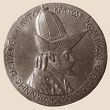

In 1437 Byzantine emperor (since 1421) John VIII Palaeologus (1392-1448) appoints Latin-speaking theologian Isidore of Kiev (Thessalonica) (1385-1463) as metropolitan of Kiev, Moscow, and all Russia in an attempt to unite the Russian Orthodox Church with the Roman Catholic Church and gain Constantinople's protection against the Ottomans; Russian grand prince Vasily II doesn't accept him, but Isidore of Kiev still manages to talk him into allying with Roman Catholicism to save the Byzantine Empire and the Orthodox Church of Constantinople, and receives funding from him.
In 1438 the Pragmatic Sanction of Mainz, a preliminary agreement between the papacy and the HRE settles the Holy Roman Empire in the House of Austria, abolishes annates, papal reservations, and provisions, and leaves the German church under imperial and princely control; rescinded in 1516.
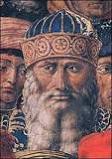

On Feb. 8, 1438 Byzantine emperor John VIII Palaeologus arrives in Venice with a retinue of 700 incl. Constantinople patriarch Joseph II and 20 metropolitans, plus other big brains incl. Neoplatonist philosopher Gemistus Plethon (1355-1452) and his student Johannes (Basilius) Bessarion (1403-72); on Apr. 9 the Ecumenical Council of Ferrara convenes, with the patriarch refusing to kiss the pope's foot and instead bowing and kissing his cheek; John VIII Palaeologus pleads for assistance from the Turks encircling Constantinople, proposing a union of the Greek and Roman Catholic Churches. On Jan. 10, 1439 after the plague strikes Ferrara, the Ecumenical Council of Florence continues the Council of Ferrara under the patronage of Cosimo de Medici; on July 6 the Roman Catholic and Eastern Orthodox Churches sign a treaty uniting on paper, with 1-sided terms favoring Rome, in return for Pope Eugene IV calling for a new crusade against the pesky Turks; too bad, when the Byzantine prelates return home, the Orthodox pop. gets pissed-off and either replaces them or makes them repudiate the union; Hesychast metropolitan Mark Eugenicus of Ephesus is the lone Orthodox prelate to refuse to sign the union proclamation, making him a hero and getting him canonized in 1456; too bad despite lobbying by metropolitan Isidore of Kiev, the Council of Basel (ends 1449) creates a fresh schism; on Dec. 18 after he gets talked into switching allegiances, Pope Eugene IV makes Johannes Bessarion a cardinal, causing him to remain in Italy, using his knowledge of Greek to collect Greek mss. while promoting humanist studies; too bad, Isidore's flock rejects any union with the Latins, and refuses to let him return, electing a new patriarch of their own; the whole affair ends Moscow's longtime loyalty to Constantinople, and when it falls in 1453 they take it as God's judgment on them, bolstered by the Legend of the White Cowl, which claims that Rome deviated from the true (Orthodox) faith because of "pride and ambition", and the New Rome (Constantinople) did ditto, leaving Russia as the Third and Final Rome.

On Jan. 1, 1439 Albert V of Hapsburg (Austria) is crowned king of Hungary; on Mar. 18 after Frederick of Brandenburg, candidate of the German reformers withdraws, Albert V, husband of HRE Sigismund I's daughter is unanimously elected king Albert II (1397-1439) of Germany (and of the Romans, although never crowned HRE), founding the Hapsburg (Habsburg) Dynasty of the Holy Roman Empire; in return he has to sign capitulations to the nobles, who are no longer obliged to fight beyond the frontiers; all future HREs except Charles VII and Francis I are Hapsburgs, with those from 1765-1806 being of the House of Hapsburg-Lorraine; rival Wladislaw III of Poland begins a civil war (ends 1439); in June Albert II is crowned king of Bohemia, but is never able to obtain possession of it, fighting the Bohemians and their Polish allies for it.
On May 4, 1439 the Battle of Grotniki near modern-day Nowy Korczyn sees the Hussites under Spytko of Mlesztyn (b. 1398) defeated and killed by Polish forces of Wladislaus III under Hincza of Rogow, ending Hussite influence in Poland.
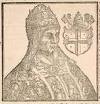
On Nov. 5, 1439 Duke Amadeus VIII of Savoy is elected antipope #7 of the Great Schism Felix V (1383-1451) in Avignon, becoming their last antipope (until Apr. 7, 1449).

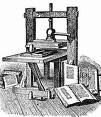
About 1439 German goldsmith Johannes Gutenberg (1398-1468) of Mainz invents a process for mass-producing movable type using a hand mold for a screw-type wooden Printing Press using oil-based ink; the Info. Explosion begins.


On Feb. 22, 1440 HRE Albert II's posth. son Ladislaus (Ladislas) (Laszlo) V Posthumous (1440-57), heir to the headship of the House of Hapsburg along with Bohemia, Hungary, and Austria is born in Komarom, Hungary (in modern-day Slovakia), and his mother Elisabeth of Bohemia has him crowned in Szekesfehervar, then makes the mistake of placing him under the guardianship of his 2nd cousin Archduke Frederick V of Styria and Carinthia (Inner Austria), later (1452) known as HRE Frederick III of Hapsburg (1415-93), who imprisons him in Orth Castle and assumes rule of Lower Austria, keeping the tyke out of Bohemia for many years while he plots to grab it all; a handsome amateur astrologer, botanist, and mineralogist, Frederick III is elected king of Germany (until 1493) to succeed Albert II as Friedrich IV; too bad, as a self-proclaimed scientist he is above mundane politics, skips sessions of the Diet, and lets his empire fend for itself against the Turks, later forcing Charles the Bold of Burgundy to marry his daughter Mary of Burgundy to his son Maximilian I (Kaiser Max), causing the Hapsburg star to rise, and giving rise to his motto "Let others wage wars, but you, happy Austria, shall marry" - ask Ahnuld about it?
In Mar. 1440 Isidore of Kiev pub. an encyclical in Buda calling on all Russian bishops to accept the new union with the Roman Catholic Church struck in the 1439 Councils of Ferrara and Florence, but at the command of grand duke Vasily II six Russian bishops hold a synod and despose Isidore, after which he is imprisoned, escaping in Sept. 1443 and ending up in Rome.

In 1442 Portuguese Prince Henry the Navigator (1394-1460) bequeaths his gift of African slaves to Pope Eugene IV, who in the bull Illius Qui (Those Who) confers upon him title to all lands E of Cape Blanc, causing Portugal to eagerly go into the African slave trade.
Also in 1442 Enea Silvio de Piccolomini (1405-64), lay member of the Council of Basel is sent to take part in the German Diet on Frankfurt am Main, and becomes HRE Frederick III's poet laureate and private secy., going on to write several works of lit. under name name Aeneas Silvius (Syvlius), incl. the erotic novel Euryalus and Lucretia, or The Story of Two Lovers in the style of Boccaccio until 1446, when he takes holy orders, moving up quick and becoming cardinal and prince of the empire in 1448, and Pope Pius II in 1458; meanwhile Frederick III orders all the Jews living near the cathedral in Frankfurt resettled after their singing in their synagogue disturbs the Christian services - what a great compromiser?





On Jan. 1, 1443 Pope Eugene IV issues an encyclical calling for the faithful to go and defend their Christian brothers in the East against the infidel Muslim Turks in the Crusade of Varna (ends 1444); the response is almost nil, except from Wallachia, Burgundy, Poland-Hungary, and Transylvania (where John Hunyadi has been kicking Turk butt since 1441), who send 25K troops; early in the year John (Janos) Hunyadi "the White Knight" (1387-1456) of Hungary and Vladislaus (Wladyslaw III) (1424-44) of Poland-Hungary lead the Crusaders into S Serbia and capture Nish and Sofia, making Vladislav III a Hungarian nat. hero, but they are finally turned back on Dec. 12 at the Battle of Zlatica; meanwhile Prince Skanderbeg (Scanderbeg) (Iskender Beg) (Lord Alexander) (Georg Kastrioti) (1405-68) sees his chance, revolts, and on Nov. 28 becomes the ruler (prince) of independent Christian Albania (until 1468); the Ottomans lick their wounds over the winter, and by spring decide to call it quits, and on June 12, 1444 Vladislaus III signs a 10-year truce with Sultan (since 1421) Murad II (1403-51) in Adrianople, restoring the kingdom of Serbia in return for recognizing Ottoman suzerainty in Bulgaria and Wallachia, then reneges when a Crusader army organized by the pope, Hungary, and Venice arrives from Venice on Aug. 4 and joins their crusade into Bulgaria, hoping to kick the Turks out of Europe; in Aug. Murad II concludes a peace treaty with the principality of Karaman, freeing him from his main adversary in the E so that he can kick Crusader butt in the west; in Aug. Murad II resigns and retires to Bursa in favor of his 12-y.-o. son Mehmed (Mehmet) (Mohammed) II (the Conqueror) (1432-81), who becomes Ottoman sultan #7, but the Janissaries don't cotton to him and want his daddy to return to the throne, which he does in May 1446; meanwhile, when he hears about the approaching Crusaders, daddy gathers an army, and on Nov. 10 his forces varnish the sorry-ass Wallachians, the Poles under still green 20-y.-o. Vladislaus (Wladyslaw III) (1424-44), and the Hungarians under John (Janos) Hunyadi "the White Knight" (1387-1456) at the Battle of Varna, in E Bulgaria near the Black Sea, with 10K Crusaders KIA, plus more from frostbite; unmarried Vladislaus III is KIA, throwing Hungary into a civil war; the overwhelming V ends the Crusade promised by the West after the Act of Union in 1439, and frees the Turks to conquer Constantinople and E Europe for decades.

On Feb. 23, 1447 Pope (since 1431) Eugene IV (b. 1388) dies, and on Mar. 6 Tommaso Parentucelli is elected Pope (#208) Nicholas V (1397-1455) (two nickels make a dime?); a bibliophile and humanist (fan of ancient pagan works, causing him to hire hundreds of scholars and copyists, creating a mini-Renaissance until the advent of printing), in 1451 he founds the Vatican Library; he also promptly begins improving Rome's streets, water supply, etc., making it magnificent to impress the little people and discourage any more antipopes from even thinking about it?; he begins replacing Constantine's Basilica (4th cent.) with St. Peter's Basilica, which ends up taking 20 more popes to complete (until 1784) - was he a neat freak?

On Oct. 31, 1448 pale and disillusioned John VIII Palaeologus (b. 1392) dies childless, and after a dispute Sultan Murad II chooses his younger brother Constantine (Konstantinos) XI Dragases Palaeologus (Paleologos) (1404-53) to be the last Byzantine emperor (until 1453) (although he doesn't know it yet), and he is crowned next Jan. 6, entering isolated Constantinople on Mar. 12; his appointment as Roman consul #? is the last in a chain stretching back 1957 years; the Ottomans now slobber over Constantinople, the gateway to Europe, while the emperor vainly tries to get help from his uncaring Western Christian bro's. In Apr.-Aug. 1452 sultan Mehmed II builds the Rumeli Hisar, AKA the Bogasz-Kesen ("Throat-Cutter"), a network of forts on the Euro side of the Bosphorus designed to cut off all traffic with the Black Sea in conjunction with the Anadolu Hisar on the Asian side, (built by Beyazid I) unless they pay heavy tolls; in Dec. a Venetian ship attempts to run through and is captured and its 30-man crew executed; Constantinople is now cut off and its days are numbered. Meanwhile in 1448 the Moscow and Kiev churches begin to separate, the former going with the Eastern Orthodox Church and the latter with the Roman Catholic Church.
Also in 1448 the Concordat of Vienna is signed, a cynical compromise whereby Pope Nicholas V gives the support of the papacy to HRE Frederick III in return for a guarantee of the fidelity of the Germans to Rome; too bad, Freddy surrenders the liberty of the German church gained in the Council of Basel, pissing off the German princes; he also loses his authority in Switzerland. On Apr. 7, 1449 Antipope (since 1439) Felix V dies, and the Avignon antipope biz dies out; Pope Nicholas V is the last pope to have an Avignon antipope ruling simultaneously. In winter 1450 after changing the period of the Jubilee from 33 to 50 years, Pope Nicholas V (1397-1455) holds one (ends 1451); 200 pilgrims get trampled at the bridge of Castel Sant'Angelo; the Unwalling of the Holy Door takes place this year; the offerings of the pilgrims fill Rome's coffers, which the learned pope uses mainly to further culture and learning?



On Mar. 19, 1452 37-y.-o. German Hapsburg King Frederick III, archduke of Austria, duke of Styria, Carinthia and Carniola, and king of Rome is finally crowned HRE Frederick (Friedrich) III (1415-93) by Pope Nicholas V three days after marrying 18-y.-o. infanta Eleanor (Leonor) of Portugal (1434-67) (whose large dowry pays off his debts and cements his grate wealth and powah), becoming the last HRE crowned in Rome by the pope; his motto is the anagram AEIOU ("Austria Est Imperare Orbi Universo") (Austria is the Ruler of the World) (It is Austria's Destiny to Rule the World), which he has inscribed on all his possessions - (and his 22-inch biceps?) Too bad, 40 years later Columbus discovers the New World, and the Austrians don't get any, causing W Europe to pass then by, their big biceps shrinking to toothpicks like a shrunken balloon, and by the 20th cent. they are down to a cute little tourist trap with the Von Trapp Singers and Do-Re-Mi-Fa-So-La-Ti-Do? No wonder their #1 guy of the 20th cent. Ahnuld emigrates to the U.S. to become a Hollywood star and marry into the Kennedy clan?
On June 18, 1452 after requests by Afonso V of Portugal, Pope Nicholas V issues the bull Dum Diversas, authorizing him to conquer and subdue diverse dumb Saracens and pagans and consign them to indefinite slavery, launching the West African slave trade; it is really just a call for another Crusade against the Muslims, and isn't about African slavery?; Pope Calixtus III renews it in his 1456 bull "Etsi Cuncti", Pope Sixtus IV renews it again in 1481, and Pope Leo X ditto in his 1514 bull "Precelse Denotionis".
On Dec. 12, 1452 desperate Emperor Constantine XI vainly declares the Greek Orthodox Church united with the Roman Catholic Church in an attempt to get Western military help for the looming Ottoman invasion of Constantinople, which they yawn off; Greek-born ecumenical Cardinal Isidore of Kiev (1385-1463) is sent from Rome by Pope Nicholas V with 200 soldiers, becoming the last diplomat of the Holy See to visit Constantinople until Francesco Lardone in 1959, leading 300 Byzantine clergy in a vain celebration of the reunion.


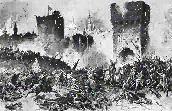
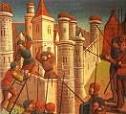

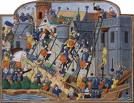
On Apr. 6, 1453 after assembling in Jan. on the plains of Adrianople and then reducing every city in their way, 150K Muslims, Janissaries, and Dervishes (incl. some Christians who wanted to get in on the loot) under 21-y.-o. whodya-wanna-call Ottoman Sultan (since 1451) Mehmed (Mehmet) (Mohammed) II (the Conqueror) (1432-81), the Saddam Hussein and Osama bin Laden of the 15th cent. begin the 54-day Siege of Constantinople (founded 330 C.E.), defended by 7K Christian knights; the sultan does the traditional Islamic thing of offering the emperor a chance to surrender in exchange for their lives, but he refuses, preferring to fight rather than switch, after which the artillery immediately begins bombarding the city with 70 cannons, incl. a 27-ft.-long 762m (30 in.) 35-ton bronze Shock'em Allah called the Great Turkish Bombard (Dardanalles Gun) (Basilic) (Sahi) (Muhammad's Gun) (designed by Hungarian engineer Urban), which lobs 1.2K-lb. balls up to 1 mi. at the key St. Romanus Gate; on Apr. 12 the 200-ship Ottoman fleet under Bulgarian renegade adm. Suleiman Baltoghlu arrives from Gallipoli, sealing the city off by sea completely; on Apr. 18 (night) the first assault by thousands of mad mullahs is repelled; on Apr. 20 (morning) four large vessels loaded with provisions (four Genoese and one Greek) arrive, and the lame Ottoman fleet fights them all day but fails to stop them from entering the city, pissing off the sultan, who orders adm. Baltoghlu executed and replaced by Hamza Bey, then has half of his ships pulled on wooden platforms along a greased log roadway he previously constructed by the neutral Genoese colony of Pera across from Constantinople, then launched in the Golden Horn; Muslim assaults on May 7 and May 12 are repelled; by mid-May the Venetian Senate is still debating whether to send aid, and on May 23 a fast ship sent out in early May to greet the expected fleet returns with bad news; on May 22 a lunar eclipse freaks the superstitious Christians, who believe a prophesy that the city can't be taken under a full moon; on May 23 a thunderstorm freaks them more, followed by a strange ghost light surrounding the dome of the Hagia Sophia, which they interpret as the Holy Ghost abandoning it, which doesn't stop hundreds of refugees from crowding in; a captured Muslim engineer is made to talk and give info. allowing the Christians to locate and destroy the Muslim tunnels, buying time; on May 25 the sultan's advisers tell him to raise the siege before the Euros arrive and get them surrounded, but they don't call him the Conqueror for nothing, so he plans an all-out final assault; on May 28 the doomed Christians, sensing the end stage a holy procession, holding the last Christian service in Hagia Sophia, reconciling themselves to dying for their faith; on May 28-29 (Mon.-Tues.) at midnight the final siege begins; although the Christians repel wave after wave, things go bad when their cmdr. Giovanni Giustianini Longo gets wounded, and instead of standing his post orders that he be taken back through the gates to the city, causing the rest of the Genoese to think the gate has been breached, causing them to rush back to it, leaving the emperor and his Greek troops to face the Janissaries alone, after which they are KIA; after the 60-ft.-wide 20-ft.-deep moat and three sets of walls and towers (the inner two walls having 96 towers each) are breached, the city surrenders, after which the Allahu Akbars rape and massacre the helpless dhimmi pop., chaining the rest to sell them into slavery (lucky non-white infidel beasts get to do unspeakable things to our white Christian wimmen, incl. gasp nuns, and after 9/11, we're next?), leaving only 50K after being stopped after 24 hours by Mehmed II, who weeps after viewing the destruction, and utters the immortal soundbyte "What a city we have given over to plunder and destruction", then awards himself the title of Caesar; Greek-born ecumenical Cardinal Isidore of Kiev (1385-1463) dresses a corpse up in his robes and watches the Turks cut off its head and parade it through the streets, then manages to get shipped to Asia Minor as a slave, later buying his freedom and returning to Rome, adopting the Latin Rite and becoming bishop of Sabina, and later Latin patriarch of Constantinople and archbishop of Cyprus sans jurisdiction, later making the mistake of returning to Moscow and holding a Latin Rite, which gets him imprisoned again; a legion of Cretans manning three towers near the entrance to the Golden Horde holds out and are given safe passage; the Ottoman sailors abandon their ships to rush into the city and get their share, allowing several Christian ships loaded with refugees to escape, incl. Giustianini, who dies a few days later in Chios; after the sultan heads into the city straight to it and personally breaks the altar, Hagia Sophia is turned into a mosque, and the Christian icons plastered over; last Byzantine emperor (since 1448) Constantine XI Palaeologus (b. 1404) dies defending the walls, and they hang his head on a pike; on Sept. 30 with infallible timing Pope Nicholas V issues a call for a new Crusade (1st time the printing press is used to issue papal appeals?); the loss of Constantinople solidifies Europe around Rome, removing the age-old obstacle to uniting it religiously, while an Islamic prophesy makes the Muslims believe they will conquer Rome next; a major drive to repopulate Istanbul (Turk. "in the city or downtown") (Gr. "eis ten polin" = "into the city") begins, with the 60-alleyway Grand Bazaar (largest enclosed market in the world) built in 1461, turning it into the showpiece of the Middle East, with 400K pop. before 1800, about 45% Christian and Jewish; the Muslim Turks are now on the frontier of Germany, and put Venice on the defensive over her eastern colonies for the next 250 years; the Muslims set up a paper mill in Constantinople - how long until a Turk founds Atlantic Records and catapults Ray Charles and the Rolling Stones to stardom? The fall of Constantinople to the Turks causes a large number of Greek scholars to flee to Italy, where they pump up the Renaissance in classical learning; it also leads to renewed efforts to find new westward routes to India and China across the Atlantic as the Ottomans are in a position to close overland trade routes to the Silk Road. The S Balkan region (from the Peloponnesus to the Danube River, incl. Albania, Constantinople, Thessaloniki, Thrace, N Greece and Macedonia, Serbia, and Moesia) begins to be called Rumelia (Rumeli) (Turkish "Land of the Romans") as the Muslim Ottomans conquer it from the Christians, who are all Romans as far as they are concerned; up till now they called it Anatolia Rumelia. The Shroud of Christ is sold by Marguerite de Charny to Duke Louis I of Savoy, who moves it to Chambery, France (until 1578); it was really such a poor fake that it disappears for 50 years until Leonardo da Vinci (1452-1519) can be hired to produce the modern good one, based on his own portrait? After taking over Constantinople, the Muslims find lots of star and crescent flags, and adopt them as their symbol since sultan Othman I allegedly had a dream of a crescent moon growing until it filled the world, even though Richard I Lionheart had used the symbol in the late 12th cent. when kicking Muslim butt for Christ.
On Jan. 8, 1455 Pope Nicholas V provides formal legitimization for Portugal's overseas conquests in the papal bull Romanus Pontifex, written to Afonso V, giving Portugal the primary right over other Christian nations to enslave non-Christian peoples on newly discovered lands in specific regions, creating the Roman Catholic Doctrine of Discovery, with the soundbyte: "We bestow suitable favors and special graces on those Catholic kings and princes... athletes and intrepid champions of the Christian faith... to invade, search out, capture, vanquish, and subdue all Saracens and pagans whatsoever, and other enemies of Christ wheresoever placed, and... to reduce their persons to perpetual slavery, and to apply and appropriate... possessions and goods, and to convert them to... their use and profit"; it also grants exclusive trading rights between Morocco and the Indies to the Portuguese; he later extends it to all territories Portugal takes in the future - the Christian counter-jihad is on?

On Mar. 24, 1455 Pope (since 1447) Nicholas V (b. 1397) dies, and on Apr. 8 Alfonso de Borgia (Boria) is elected Pope (#209) Calixtus (Callistus) III (1378-1458) (first Borgia pope), immediately calling for a new Crusade; too bad, on Mar. 24 Bishop Rudolf von Deipholz of Utrecht also dies, causing Philip III the Good to drop his plans for a Crusade in favor of gaining control of Utrecht, and everybody else to drop out since he is the main man; when he finally secures Utrecht in Oct. 1456, the French dauphin (future Louis XI) asks for asylum, causing him to keep the Crusade on hold despite pleas from the pope.


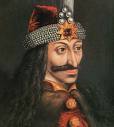
On July 4, 1456 the Siege of Belgrade by the Ottomans under Mehmed II begins as the first step toward taking the kingdom of Hungary; on July 22 the Christians, led by Italian Franciscan soldier-priest "athlete of Christ" (St.) John of Capistrano (b. 1386) and Hungarian gen. John (Janos) Hunyadi (b. 1387) relieve the seige in a surprise counterattack, defeating the Turkish fleet then invading the Turkish camp and wounding Mehmed II, causing the Ottomans to retreat, staving off Ottoman conquest of Hungary for 70 years, and becoming known as the battle that decided the fate of Christendom; on Aug. 11 big hero John Hunyadi (b. 1387) dies of plague, followed by Capistrano (b. 1386) on Oct. 23. The Drakulya did many curious and terrible things year? On Aug. 22, 1456 Vlad III Dracula (1431-76), who had fought with Hunyadi recaptures the throne of Wallachia with the help of his old enemies the Saxons, and kills Vladislav II, and in Sept. he takes an oath to Hungarian king Matthias Corvinus (son of Janos Hunyadi) and another to Turkish sultan Mehmed II, going on to strengthen the country while practicing his too-cruel-to-be-kind tough love form of absolute-honesty-required justice, with capital at Targoviste ("marketplace") on the right bank of the Ialomita River, having convicts roasted alive and/or flayed, and infants impaled on their mothers' breasts; meanwhile Mehmed II continues the conquest of Serbia, extending the Ottoman empire to the Danube by 1459. In 1457 Pope Callistus III summons an assembly of the princes of Europe to devise measures against the inroads of Islam. Also in 1457 the Moravian Church (Church of the Brethren) (Unity of the Brethren) (Herrnhuters), claiming to descend from the ancient Unitas Fratrum (Bohemian Brethren) (Herrnhuters) is founded in Bohemia by Peter Chelcicky (Chelchich) (-1460), spurred by the writings of John Wycliffe (1324-84) and Jan Hus (1373-1415); members lay aside class distinctions and abstain from oaths and military service.


On Jan. 23, 1458 after HRE Frederick III is unable to secure the kingships of Hungary and Bohemia, John Hunyadi's son Matthias Corvinus (1443-90) is elected king of Hungary; Ultraquist (moderate Hussite) leader George of Podebrad (Podiebrad) (Podebrady) (1420-71) is elected king of Bohemia, trying to pursue a middle course of conciliation with the Roman Catholic Church (which considers him a heretic?), going on to persecute the puritanical anti-papist quasi-democratic Bohemian Brotherhood.

On Aug. 6, 1458 Pope (since 1455) Calixtus III (b. 1378) dies, and on Aug. 19 Enea (Aeneas) Silvio (Silvo) (Silvius) (Sylvius) de' Piccolomini is elected Pope (#210) Pius II (1405-64), becoming the first pope to write an autobio.; before taking holy orders in 1446 he had been a well-known author of erotic lit., incl. the erotic novel Euryalus and Lucretia, or The Story of Two Lovers in the style of Boccaccio (1313-75), and had fathered a dozen illegitimate children before becoming pope; an advocate of a Crusade against the Turks since 1453, he has trouble pushing it off on Louis XI of France and others until 1464, when he croaks at the wrong moment; in ? he pub. De Europa, in which he claims that geese come from wooden structures underneath the sea; during the conclave Aeneas Sylvius tells Cardinal Giovanni Castiglione "What is our Italy without the bishop of Rome? We have lost the empire, but we still have the apostolic see." On June 1, 1459 a gen. conference in Mantua to plan a new Crusade called by Pope Pius II is a bust at first as nobody turns up, until reps. from Burgundy finally arrive in Sept.; after they declare war against the Turks next Jan., Mehmed II responds with a threat to capture Rome and behead Philip III the Good of Burgundy.

On Dec. 25, 1460 Pope Pius II excommunicates Sigismondo Malatesta (1417-68) of Rimini, accusing him of incest, sodomy et al. as well as treachery against Duke Federico da Montefeltro of Urbino over Siena, soiling his rep. for cents.; papal forces then begin a siege on his territories (ends 1463), leaving him only Rimini and a 5-mi. buffer zone. In 1462 Pope Pius II abolishes the Hussite Compacta, and organizes a grand alliance with Burgundy, Venice, and Hungary to go on Crusade against the Turks. In spring 1463 the Ottoman Muslims under Mehmed II invade Bosnia, kill Catholic king Stefan Tomasevic, and capture the country (until 1878); on May 28 Mehmed II grants a charter to the Bosnian Fransciscans in which he regulates their relationship with the Roman Catholic Church represented by the Bosnian custos Andjeo (Angel) Zvizdic; Mehmet II erases all evidence of Bosnian statehood, destroying all 500 of its castles and forts and executing its nobility, then later importing elite Sephardic Jews after they are expelled from Spain in 1492, who convert to Islam in exchange for titles of nobility (bey and agha); Sarajevo is founded by the Ottomans, becoming the capital of Bosnia and Herzegovina; Mehmed II's Bosnian conquests scare the Venetians into taking him on to protect their Aegean and Adriatic coastal possessions, and they begin the Third Ottoman-Venetian War (ends 1479), seizing Morea (Peloponnesus), while the Hungarians retake Bosnia, only to see the Muslims retake it next year.
To keep his scholarly brain around, fellow humanist Aeneas Silvius Piccolomini (Pope Pius II since 1458) gets Greek-born Cardinal Johannes Bessarion appointed Latin patriarch of Constantinople, and in Apr. 1463 he becomes dean of the Sacred College of Cardinals.

On Aug. 14, 1464 Pope (since Aug. 19, 1458) Pius II (b. 1405) dies of fever in Ancona while sailing to the East still trying to organize a Crusade, and on Aug. 30 Pietro Barbo is elected Pope (#211) Paul II (1417-71) (until July 26, 1471), and all plans for a Crusade are dropped and never renewed. In 1465 Pope Paul II denounces the 1430s Council of Basel and the Compactata, excommunicates and deposes Hussite Bohemian King George of Podebrad, and enlists the aid of the HRE and King Matthias Corvinus of Hungary against him, causing the Roman Catholic nobles of Bohemia to elect Matthias as king, and a civil war to begin.


On Oct. 19, 1469 after Pope Paul II grants a special dispensation because they're 2nd cousins (via John I of Castile), the long longed-for union of the Roman Catholic Spanish kingdoms of Aragon and Castile is effected by the marriage in Valladolid of Ferdinand II of Aragon and Sicily (1452-1516) to Isabella I of Castile (1451-1504), who become known as the Catholic Monarchs, bitter foes of heretics, Muslims, and Jews; Valladolid in NC Spain at the confluence of the Pisuerga and Esgueva Rivers replaces Burgos (capital of Castile and Leon since 1035) as the capital and residence of the kings of Spain until 1561, when it is destroyed by fire, and Philip II moves it to his hometown of Madrid - the original Bridge to Terebithia?
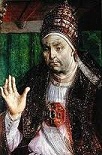
In 1470 Pope Paul II changes the Jubilee Period from 50 to 25 years - is that like giving yourself a pay raise? On July 26, 1471 Pope (since 1464) Paul II (b. 1417) dies, and on Aug. 9 Francesco della Rovere is elected Pope (#212) Sixtus IV (1414-84), the first of six grossly immoral popes (6-4/5/6?) whose escapades trigger the Protestant Reformation; he fathers six illegitimate sons, one with his sister, and later unleashes the Spanish Inquisition; he issues a bull banning nosepicking under pain of eternal damnation, and goes on to try to make the papacy a family business.


In 1472 the Eastern Orthodox Church repudiates the 1438 Council of Florence, finalizing the Great Schism with the Roman Catholic Church. Also in 1472 Pope Sixtus IV approves the celebration of the Dodecaorton (Twelve Feasts), incl. the Feast of the Virgin Mary's Presentation in the Temple, in which 3-y.-o. Mary allegedly dances on the 3rd step of the Temple of Jerusalem. In 1473 Dutch #1 scholar Johann Wessel Gansfort (Goesport) (1419-89) visits Pope Sixtus IV in Rome, and when told he could have one wish, he asks for a Greek and Hebrew Bible from the Vatican Library, which the pope grants after remarking that he should have asked for a bishopric, showing that he didn't 'get' that Wessel was an early Protestant, condemning the sale of indulgences and questioning papal infallibility, but not loudly enough to get condemned as a heretic? In 1475 German astronomer Regiomantanus (Johann Muller) (1436-76) is called to Rome by Pope Sixtus IV to aid in the reform of the pokey Julian Calendar, which was started in -44 and is now eight days behind, with the vernal equinox falling on Mar. 12 instead of Mar. 20; too bad, Regiomontanus dies next year before reform plans can be implemented, and nothing is done until the Council of Trent in 1545.
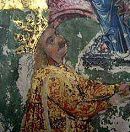
On Jan. 10, 1475 after the Ottomans invaded Moldavia last Dec. and advanced onto scorched earth and poisoned waters, the Battle of Vaslui (Racova) (Podul Inalt) on a foggy morning is a big V for Moldavian prince (since 1457) Stephen III the Great (1433-1504) and his 45K Christian troops and 5K troops from Hungary and Poland plus 30K peasants armed with homemade weapons against 120K Ottomans under Hadan Suleiman Pasha, who sustain 40K casualties (30K killed) by the time they hightail it out of Bessarabia, becoming the greatest V ever secured by the Christians against Islam, and the worse defeat ever for the Ottomans, saving the Christian world from Islam and causing Pope Sixtus IV to award Stephen the title of Athleta Christi (champion of Christ), and call him "Verus christiane fidei aletha" (the true defender of the Christian faith); like a true athlete of Christ, Stephen doesn't celebrate his V like some pagan Roman, but fasts for 40 days on bread and water and gives credit only to the Lord, and orders monasteries built and decorated with colorful frescoes, incl. the Church of St. George of Voronet Monastery (1488), whose exterior walls are painted in 1547 with a Last Judgment scene in vivid cerulean blue (later known as Voronet blue), becoming known as "the Sistine Chapel of the East"; in 1490 he builds the Monastery of the Beheading of St. John the Baptist; after getting over the shock, the Big D pisses Sultan Mehmed II off, and he vows here-comes-Johnny-again revenge.
On Mar. 24, 1476 street drummer Hans Bohm claims to have a vision of the Virgin Mary in the village of Nikleshausen, Germany, then burns his drum in a Bonfire of the Vanities, and proclaims the village the landing pad for the Second Coming of Christ, telling his followers to become Christian communists and not pay rent; after tens of thousands of peasants flock to him from all over Germany, causing a peasant revolt in May, the authorities crack down, and Drummer Boy Bohm is burned at the stake on July 19.
In June 1476 150K Ottomans under Sultan Mehmed II invade Bessarabia to get even for last year's big D, and are joined by 10K Wallachians and 30K Tatars from the Crimea, who are repelled at the cost of dispersing the Moldavian forces of Stephen III, leaving him with only 12K-20K men, who are defeated on July 26 at the Battle of Valea Alba (Razboieni) (Akdere), destroying almost the entire army, causing the battlefield to become known as White Valley for the carpet of bones, after which Stephen (who has to be dragged from the battle because he won't give up?) retreats to the NW and recruits another army, while the Ottomans fail to capture any Moldavian strongholds and begin suffering from plague and starvation, causing them to retreat in Aug.; meanwhile the Wallachians under Laiota are chased back to Wallachia by Vlad III Dracula and Stephen Bathory of Transylvania and their 30K-man army (which arrives too late to help Stephen III at Valea Alba, then joins him on Aug. 18), causing Stephen III to regroup and invade Wallachia from the N with 15K men, while Dracula and Bathory invade from the W (S Transylvania) with 35K men, defeating Laiota and his 18K men in Nov. at the Battle of Rucar (15 mi. from Bran at the Transylvanian-Wallachian border) with casualties of 10K on each side, then capturing Bucharest on Nov. 16, after which Dracula is reinstalled on the Wallachian throne on Nov. 26, with 200 loyal knights given to him by Stephen as bodyguards; too bad, after Stephen and Bathory leave, Prince Basarab Laiota returns in Dec. and catches Vlad III Dracula (b. 1431) with his 4K-man mini-army, killing him near Bucharest (assassinated by his own boyars?), then takes his head preserved in perfume and honey to Constantinople to please the sultan; he is really just scalped then buried by his grandfather Radu Florescu?
There's no business like show business? In 1478 at the request of Ferdinand II and Isabella I the Catholics of Spain, Pope Sixtus IV pub. the bull Exigit Sinceras Devotionis Affectus authorizing Christian kings and queens to appoint inquisitors to deal with offenders against the Church, esp. Marranos (Sp. "swine"), Christian converts still secretly practicing Judaism; the Spanish Inquisition begins (ends 1834), initially concentrating on conversos, but soon expanding its deadly gaze to anybody who gets in the Church's way.
On Oct. 13, 1479 the Battle of Breadfield on the Breadfield Zsibod (Sibot) near the Maros River in Transylvania sees 12K-15K Hungarians and Transylvanians led by Stephen V Bathory, Basarab Laiota cel Batran et al. decisively defeat 10K-20K Ottomans and 1K-2K Wallachians in the biggest battle in Transylvanian history to date, with 3K Christians vs. 10K-15K Muslims killed.
In May-Aug. 1480 the Ottomans siege Rhodes, the last major Aegean island not under their control, but the Knights of St. John fight them off after causing heavy losses; on Aug. 11 the Ottomans surprise-attack and sack Otranto in S Italy, killing 12K, and sawing Bishop Stephen Pendinelli and garrison cmdr. Count Francesco Largo in half, then on Aug. 12 decapitate 800 Christians who refuse to accept Islam in the Valley of the Martyrs, threatening Italy with conquest, and causing Western navigators to begin turning around, "Seeking the East by Way of the West", i.e., finding a westward passage to the Indies; meanwhile Pope Sixtus IV calls for a guess what, a Crusade.

On Aug. 9, 1483 the first Mass is celebrated by Pope Sixtus IV in the Sistine Chapel (named after him) in the Apostolic Palace in Rome.










Justice for victims begins with Innocent VIII? Bad time to be a natural redhead? On Aug. 12, 1484 Pope (since 1471) Sixtus IV (b. 1414) dies after issuing a bull allowing local bishops to give the bodies of executed criminals and unidentified corpses to physicians and artists for dissection, allowing Vesalius et al. to advance the science of anatomy, and on Aug. 29 Giovanni Battista Cibo (Cybo) is elected Pope (#213) Innocent VIII (1432-92), issuing a fruitless call for yet another Crusade against the Ottomans; the Spanish Inquisition (established Nov. 1, 1478) gets off to a roaring start under joint church-state direction after never-doubting Tomas (Tomás) de Torquemada (1420-98) (the original Punisher?), prior of a Dominican monastery in Segovia persuades Ferdinand II and Isabella I to get Pope Innocent VIII to appoint the Holy Office of the Inquisition, with himself as grand inquisitor for Castile and Aragon in 1487, with the Mission: Imposible of rooting out heresy among converted Jews, where his wanton torqued-up mad (sexually-gratifying?) (the Catholic teaching on sexuality hits the fan?) torture of his 2K victims by 1498 is later uncovered (3 cents. late) by the Spanish Inquisition's gen. secy. (1789-) Juan Antonio Llorente (1756-1823) and Spanish Jesuit historian Juan de Mariana (1536-1624) from an examination of the archives, and spawns tons of gory horror lit.; unlike the original Rome-based Catholic Inquisition (est. 1231), the Spanish Inquisitors are appointed by the sovereigns, and are free of responsibility to the Church, giving them a 007 license to build and operate fun B&D dens, and they end up executing up to 30K during the next 3.5 cents. (2 per week avg.), incl. whole families and towns for offenses such as heresy, freethinking, seduction, smuggling, impersonation, and usury, freely torturing witnesses as well as defendants - zoom zoom zoom?
Follow your heart? Without love where would you be right now?In 1486 Kramer and Sprenger pub. the bestseller Malleus Maleficarum (Hammer of Witches); approved by the Vatican, even though the U. of Cologne condemns it; the #1 guidebook for Inquisitors; incl. instructions to remove hair from every part of the body "even... the most secret parts" to search for hidden objects and the Devil's mark (Satan's nipple), and for due process requires a witch to confess before being condemned to death, authorizing torture to obtain a first confession, followed by another "free and open confession"; condemned witches are to be handed over to the civil authorities swiftly for execution, and if they renounce Satan they get treated with quick easy strangulation before the pyres are lit; the Church and lay authorities then get to split the heretic's property - see you in court?

In 1486 Italian Renaissance wunderkind Count Giovanni Pico della Mirandola (1463-94) gets in trouble when he settles in Rome and pub. Oration on the Dignity of Man ("the Manifesto of the Renaissance"), in which he proposes 900 theses and offers to defend them against all comers, and Pope Innocent VIII deems 13 of them dealing with cabalistic magic heretical, and forbids him to discuss them - if only he had said 800 or 850? In 1486 Mirandola pub. Conclusiones Cabbalisticae (72 Conclusions on the Kabbalah); #14 argues that Jesus' real name Yeheshuah consists of the Tetragrammaton YHWH plus the Hebrew leter shin, showing the descent of the Holy Spirit into the fourfold realm of matter, i.e., the incarnation of God, and makes the unpronounceable YHWH pronounceable, giving the new name by which miracles can be performed.
On Nov. 17, 1487 Pope Innocent VIII issues a bull prescribing universal censorship of books, especially irreligious ones. In 1489 Pope Innocent VIII suppresses the Order of the Holy Sepulchre and merges it with the Knights Hospitaler (Knights of St. John of Jerusalem) under grandmaster Pierre d'Aubusson (1423-1503); in 1496 Pope Alexander VI restores the order, with a new grandmaster taking the place of the old Franciscan custodian of the Holy Land, who continues to act as ex-officio Latin patriarch of Jerusalem until 1830 - let me upgrade you?
In 1490 out of Rome's pop. of 100K, about 6.8K are "respectable courtesans" (legal prostitutes) catering to the pilgrim and tourist trade. Also in 1490 Ferdinand II of Castile and Aragon sends Pope Innocent VII a gift of 100 Moorish slaves, which he shares with cardinals and close friends. In 1491 German-born Johann Burchard, the pope's master of ceremonies writes in his diary that "From the greatest to the least, they [the church's top officials] took on concubines in the fashion of marriage, and indeed they did this publicly... Unless God provides, this corruption will spread to monks and those in religious orders, although the convents of Rome have almost become all brothels even now, since no one forbids it."



781 years, and it was more than worth it? On Jan. 2, 1492 the keys of Granada are surrendered to the forces of "Los Reyes Catolicos" (the Catholic Kings) Ferdinand II (1452-1516) and Isabella I (1451-1504) of Aragon and Castile by Boabdil (Muhammad XII) (1460-1533), who flees to Fez in N Africa, ending a 10-year effort by the Catholic kings, and becoming the final defeat of the Muslims in Spain, who invaded way back in 711, and were on the loser's team since the 1212 Battle of Las Navas de Tolosa, ending the Christian Reconquista of Spain (begun 722); as Boabdil and his family leave the city, they pause at El Ultimo Suspiro del Moro (The Moor's Last Sigh) Bridge to look back at the glorious Alhambra ("red fortress"), and his mother tells him, "Weep like a woman for what you could not defend like a man"; meanwhile, wasting no time, after pulling strings ' with wealthy Marranos (closet Jews) Luis de Santangel(o), Gabriel Sanchez, and Juan Cabrero, auburn-haired (Marrano?) (front man for a Jewish conspiracy?) Christopher Columbus (1451-1506) meets with Ferdinand II and Isabella I in the Alhambra in Granada to beg for support for his proposed expedition to Cathay via the new improved westward ho route, promising to bring back gold and silver to finance an expedition to reclaim the Holy Land for Dear Christ, but they don't go for it, and he finally gives up and starts back for France to give their king the chance to become the next rich and admired Christian hero, but Isabella she-ain't-called-the-Catholic-for-nothing changes her mind at the last minute and sends messengers to stop him at the Bridge of Pinos, and they sign an agreement on Apr. 17 - now America's ass is grass and he's got the lawnmower? Two, two, two expulsions in one, or, You must really try these strawberries and blueberries, we can take care of you wandering Jews? On Feb. 1 Spanish inquisitor-gen. Torquemada gives Spanish Jews 3 mo. to accept Christinsanity, er, Christanity or leave the country, and when they prove stiff-necked like always, on May 1 (Omer 19) Roman Catholic Kings Ferdinand II and Isabella I order the Expulsion of the Spanish Jews, incl. all 250K non-converted Swine from Spain (50K families); after frantically trying to get something of value for their possessions (exchanging a house for an ass, a vineyard for a piece of cloth, etc.), and swallowing their gold and silver coins before going through custom posts, the last boatload leaves on Aug. 3; the ban on Jews is not lifted until 1968; Portuguese-born Jewish royal adviser Isaac Abravanel (1437-1508) is expelled; a massive number of Sephardic Jews migrate to N Africa, where they find themselves more educated, connected, and sophisticated than the Muslims, finding toleration and moving into govt. positions, which ends up stretching Muslim tolerance; many emigrate to the Ottoman Empire, where Sultan Beyazid II welcomes them into Constantinople, Izmir, Salonika, and other cities in Anatolia, the Balkans and Arab lands; others emigrate to England and Am. - no shortage of bankers, doctors and lawyers now?

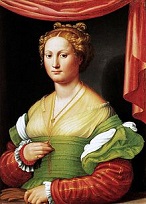

Ouch, it just stinks? On May 31, 1492 Pope (since 1484) Innocent VIII (b. 1432) solemnly receives the Holy Lance, which Sultan (Grand Seignior) Bajazet II had surrendered to the Crusaders (it now sits in St. Peter's?), then dies on July 25, and on Aug. 11 his nephew Rodrigo (Roderigo) Borgia (Borja y Borja), a Catalan Spaniard from Valencia (father of Lucrezia Borgia) bribes enough cardinals to be elected Pope (#214) Alexander VI (1431-1503); on Aug. 26 he is invested in the Lateran after the most sumptuous ceremony in papal history; he committed his first murder at age 12; by this time he is father of at least seven children out of wedlock, four by longtime mistress Vannozza (Giovanna) dei Cattanei (1442-1518), which he advances unashamedly; his mistress since 1489, 18-y.-o. Giulia Farnese (1474-1524), whose long golden hair reaches to the floor is dubbed La Bella and the Bride of Christ; her hubby Orsino Orsini is "a good husband; he was blind in one eye, he knew how to wink with the other" (E.R. Chamberlin); "Ten papacies wouldn't have sufficed to satisfy all his cousins" as he hands out lucrative posts to them.


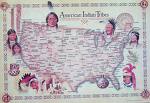
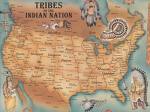


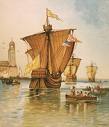

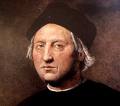


How to lose 93 million friends in ten days, or, When he started out he didn't know where he was going, when he got there he didn't know where he was, and when he got back he didn't know where he'd been, until he looked between his legs? The biggest TV reality show without teleprompter or cue cards? On Aug. 3, 1492 (same day the Jews are expelled from Spain by Ferdinand II and Isabella I) after receiving 17K ducats from Luis de Santangelo and allegedly receiving a vision from the Holy Spirit to bear Christ to the West Indies (or a vision from the Devil to carry his Catholic Church there?), writing "I could feel his hand upon me to sail to the Indies... There was no question that the inspiration was from the Holy Spirit", 41-y.-o. Christopher (Gr. "Christ-bearer") Columbus (Lat. "dove") (1451-1506) (who is really working for the Illuminati, since his real name is Cristobal, i.e. "anointed of Baal or Satan", plus Colombo (It.) = Colom (Catalan) = Colon (Sp.) = anus?, and Lat. "paloma" = dove = penis?), and who has never been farther E than the Aegean Sea begins his First Voyage for Asia by going W instead of E, setting sail from Paloma, er, Palos, Spain for the island of Gomera in the Canary Islands to pick up wine and water, getting into a romance with gov. Beatriz de Bobadilla y Ossorio (1462-1501) and staying for a mo. (returning in 1493 and 1498, when she marries somebody else), taking sugar cane cuttings he gave her to the New World, then sailing for the "West Indies" (West Asia), thinking that his voyage will lead him to Cathay (China), Cipango (Japan), the Spice Islands (the Moluccas), then India in three ships with a total crew of 88, incl. five Marranos (converted Jews), incl. interpreter Luis de Torres, surgeon Marco, physician Bernal, and sailors Alonzo de la Calle and Gabriel Sanchez (who later sells Columbus on the idea of capturing 500 Indians to sell as slaves in Seville, becoming the beginning of Am. slavery): the caravel Pinta (a nickname meaning "ship" - real name unknown) (the fastest), piloted by Martin Alonzo Pinzon (1441-93); the caravel Nina (Nińa) (Sp. "girl") (real name Santa Clara) (Columbus' favorite ship), piloted by his brother Vinente Yanez (Yańez) Pinzon (1461-1513) (who ends up going on all five of Columbus' voyages); and the 235-ton carack (nao) Santa Maria (real name Mariagallante = Gay Mary), Columbus' flagship (crew of 70) (Columbus calls it "La Capitana") (the Santa Maria was used in the 3rd voyage, but Christopher's son Ferdinand writes a history which starts the confusion going); since there are no watches yet to determine longitude at sea, Columbus sails first into the latitude of Cipango (Japan) (the Tropic of Cancer) and proceeds straight W, being helped greatly by the trade winds, which he discovers as he goes; on Oct. 10 the crew nearly mutinies, and makes Columbus promise to return home if land isn't sighted in two days (sounds like a fairy tale concocted later to make them seem to enjoy divine favor?); on Oct. 11 (10 p.m.) a UFO is sighted, consisting of "a light glimmering at a great distance", which disappears and reappears several times, moving up and down "in sudden and passing gleams" - let me guess, a welcome signal from ETs? The Ultimate Thank God It's Friday? On Oct. 12, 1492 (Oct. 22 Gregorian) (Fri.) (2:00 a.m.) (after 36 days and 2.6K mi.), Pinta's crow's nest sailor Rodrigo de Triana (1469-?) does guess what, you guessed it, sights land (and later gets so pissed-off at not being given a reward that he moves to Africa and converts to Islam?), and they anchor at San Salvador (Sp. "Holy Savior") (Watlings) Island (called Guanahani by the aborigines) in the Bahamas just N of the Tropic of Cancer, at 23.5 deg. N 75 deg. W (the log books say 24 deg. N 75.5 deg. W) (named after pious pirate Watling, who forbade pillaging on Sundays, the residents renaming it San Salvador in 1926 to claim it as the place of Columbus' first landfall after 434 years of controversy, but it is never conclusively decided, with Cat Island and Samana Cay proposed), and Columbus dresses in full admiral's regalia to take possession of the new land in the name of Ferdinand and Isabella; the natives greet Columbus with warm hospitality, causing him to write "They willingly traded everything they owned... They do not bear arms... They would make fine servants... They could easily be made Christians... With fifty men we could subjugate them all and make them do whatever we want"; after the natives present them with tobacco leaves, which they discard, they sail SW through the Great Bahama Bank, landing on Cuba on Oct. 17, thinking it is the Chinese continent, searching in vain for the magnificent cities described by Marco Polo; on Oct. 20 Columbus writes "I shall set sail for another very large island which I believe to be Cipango, according to the indications I receive from the Indians on board", which proves to be Hispaniola, and he finally lands on Haiti on Dec. 5. In Nov. a gift of tobacco leaves from the Arawaks (Aruacans) is kept this time after Santa Maria crewman Rodrigo de Jerez learns to smoke from the natives, and brings back the habit to his hometown of Ayamonte, causing his wife to denounce him as a man who "swallows fire, exhales smoke, and is surely possessed by the devil", after which he is imprisoned by the Spanish Inquisition for 7 years, by which time the super-addictive habit of smoking has caught on. On Dec. 21 (St. Thomas' day) Columbus discovers Port St. Thomas in Haiti, and on Dec. 22 he has his first meeting with Marien chief Guacanagaric. On Dec. 24 (Dec. 15 Old Style) Columbus writes in his journal that he is very impressed by the aborigines, who are of "pleasing appearance with fine features and medium height with muscular bodies", adding, "A better race there cannot be, and both the people and the lands are in such quantity that I know not how to write it... All here have a loving manner and gentle speech". On Dec. 25 the Santa Maria sinks off Hispaniola (La Espanola) (Haiti) - she had to leave to give birth to Santa Claus? On Dec. 26 Columbus writes in his journal that he had been hoping to find gold "in so great quantity that the Sovereigns within three years would undertake and prepare to go and conquer the Holy Places [Holy Land]"; chickens and rats are introduced to America; smallpox is also introduced to native Ams. as a get-unwell card by 1518; Jews are also introduced next year, with Portuguese Jews settling in St. Thomas Island, later becoming the first large plantation owners, running sugar factories with 3K African slaves; too bad, when the new discovery doesn't fulfill the original mission of furnishing a route to India and China, desperation sets in, causing the need to milk the New World for plunder and profit to take over, resulting in a mean cold systematic mass murder machine that goes on for cents. and reduces the native pop. to almost nil; Columbus hangs natives 13 at a time in honor of Christ and the 12 Apostles?
On May 4, 1493 (June 28 Gregorian) Pope Alexander VI issues the bull Inter Caetera Divina ("Among other works"), dividing the New World between Portugal and Spain along a N-S line 100 leagues W of the Cape Verde islands, giving Portugal Africa and the E side of South America, but since they didn't realize yet that most of South America lies way E of North America, Spain ended up with most of the New World in both North and South America.
On June 7, 1494 Spain and Portugal sign the Treaty of Tordesillas, moving the pope's demarcation line 170 leagues to the W.



It all happened in the kitchen? Also in 1493 the proposed reforms of the Dominican Order in Tuscany by Girolamo Savonarola (1452-98) are accepted by Pope Alexander VI, and he is appointed vicar-gen., going on to have hos beaten and homos burned, and send gangs of militant youths out to enforce his reign of terror, er, kingdom of God on Earth; Pope Alexander VI absolves Pico della Mirandola (last of the Schoolmen) of heresy, and appoints his own 18-y.-o. son Cesare Borgia (1476-1507) as a cardinal, becoming notorious for licentious habits and violent temper; Mirandola visits Florence, and is turned on by religious reformer Girolamo Savonarola (1452-98) and his prophecies of the coming Antichrist and how Florence will soon become "the reformation of all Italy" and its people will become God's elect, promising to give away his possessions and become a wandering preacher, but dies next year before he can do it. Also in 1493 Pope Alexander VI's 13-y.-o. probably virginal daughter Lucrezia Borgia (1480-1519) is married in the papal palace to Giovanni Sforza, lord of Pesaro in a long white gown whose train is borne by a black boy, followed by 150 women (incl. the pope's mistress Giulia Farnese) to the papal throne surrounded by 11 cardinals; the marriage is annulled in 1497 - the black boy got to her?
On Nov. 17, 1494 Charles VIII of France enters Florence after expelling Piero de' Medici, then enters Rome, causing Pope Alexander VI to take refuge in Castel Sant'Angelo; the Medicis lose power in Florence and begin an 18-year exile caused by Girolamo Savonarola; Michelangelo begins travelling; "Little friar" Girolamo Savonarola sets up a theocracy in Florence, urging followers to burn their worldly goods in "the bonfire of the vanities", enjoying large public BBQs of hated Medici items such as books, figurines, wigs, cosmetics and jewels, with the clear intention of breaking with the classical pagan past dredged up by the Renaissance; Sandro Botticelli hurls his own paintings into the fire; Savonarola's fanaticism stirs up intense hatred by his opponents, incl. Pope Alexander VI, eventually threatening to drive Europe to the verge of collapse?
On June 23, 1496 Pope Alexander VI rents out several bldgs. in Rome to be used as bordellos; they continue to operate for almost a cent., just in time to spread syphilis to holy pilgrims?
In 1497 a papal bull by Pope Alexander VI launches the Portuguese Inquisition of Marranos (Sp. "swine"), secret Jews forced to feign conversion to Roman Catholicism - to test them make them eat swine flesh?
On May 23, 1498 after a plot to blow him to pieces in his cathedral fails, followed by an armed assault and siege on his Convent of San Marco supported by the govt., hated Dominican friar and demagogue Girolamo Savonarola (b. 1452) is hung along with two other friars, then burned at the stake in the Piazza Signoria in front of the Palazzo Vecchio in Florence before a capacity crowd, and his ashes scattered in the river to prevent the collection of holy relics.

In 1499 after failing to convince them by reason, Spanish Franciscan inquisitor-gen. Cardinal Francisco Jimenez de Cisneros (1436-1517) (who reformed the Franciscan order in Spain, making them give up their concubines, causing 400 monks and friars to flee with them to Africa and convert to Islam, making him only more determined) begins forced mass conversions and baptisms of Mudejars (Moors remaining in Spain) in Granada, fomenting the First Rebellion of the Alpujarras (ends 1500) (2nd in 1568-70). Also in 1499 Cardinal Cisneros founds the U. of Alcala (Alcalá) de Henares in Alcala de Henares, Spain on the Henares River E of Madrid as the Completense U. (named after the 1st cent. B.C.E. town of Complutum), becoming the first city designed solely as the seat of a univ., where he and his scholars Hernan Nunez de Toledo y Guzman (Hernán Núńez de Toledo y Guzmán) (1475-1553), Diego Lopez de Zuniga et al. begin a big Bible trans. project in 1502, finishing the New Testament in 1514 and the Old Testament in 1517, after which bureaucratic machinery takes until 1520 for Pope Leo X to sanction it, and more foulups hold it up until 1522; Miguel de Cervantes is born there in 1547; the univ. moves to Madrid in 1836, then moves back in the 1970s.
In 1500 Pope Alexander VI proclaims a Year of Jubilee, and preaches a Crusade against the Turks, imposing a tithe to pay for it; meanwhile German monk Martin Luther (1483-1546) issues a great proto-Protestant soundbyte: "I persuade myself verily, that the Day of Judgment will not be absent full three hundred years. God will not, cannot, suffer this world much longer... The Great Day is drawing near in which the kingdom of abominations shall be overthrown." On June 1, 1501 Pope Alexander VI issues a bull instituting religious censorship of all printed books. On Oct. 30, 1501 Cesare Borgia (illegitimate son of Pope Alexander VI) allegedly holds the Ballet (Banquet) of the Chestnuts in the Palazzo Apostolico, featuring an orgy with 50 "honest prostitutes", who crawl naked on a floor strewn with you know what.
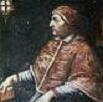


On Aug. 18, 1503 Pope (since 1492) Alexander VI (Rodrigo Borgia) (b. 1431) dies of accidental poisoning after he toasts to a couple of cardinals he was plotting to poison with the wrong cup (official explanation: malaria?); his Vatican apts. are sealed until the 19th cent.; on Sept. 22 Francesco Todeschini-Piccolomini is elected Pope (#215) Pius III (1439-1503), but he dies on Oct. 18 after he is poisoned, er, the long investiture ceremony breaks his health, and on Nov. 1 Giuliano Dell (Della) Rovere is elected Pope (#216) Julius II (1443-1513) after the shortest conclave in papacy history, in which bribery is suspected, taking the name of 4th cent. Pope Julius I (337-52); he becomes known as "Il Pontiface Terribilis" for his pride and ambition, also "the Warrior Pope", fighting to end the power of the Borgia family over the Papal States, and reconcile the warring Orsini and Colonna families of Rome; too bad, he's also a pedophile who likes boys - because something is happening here and you don't know what it is, do you, Mr. Jones? In 1503 Pope Julius II decides to raze the 4th cent. Basilica of Constantine in Rome on the edge of the Tiber River housing the bones of St. Peter and erect the vastly more ambitious St. Peter's Basilica, a total rebuilding job, with orders that it be taller than the #1 house of God, the 10-story Benedictine Abbey of Cluny in Burgundy, France; he appoints Donato Bramante (1444-1514) as chief architect, with indulgences proclaimed for those aiding the effort; Bramante begins the rebuilding work in 1506 and never finishes it, although his plans and drawings for the Vatican Palace and St. Peter's become famous. In 1506 Donato Bramante starts work by demolishing the original 4th cent. Church of St. Peter, employing 2.5K men for many weeks in throwing out tombs, statues, mosaics, icons and altars; too bad his new bldg. has faults in it which are found after his death and are too costly to fix, and it ends up taking 120 years and 27 popes, tapping out the resources of the Vatican - despite being totally vaporizable by a small suitcase-sized nuke?
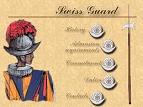
Also in 1504 he gives the Shroud of Christ (Shroud of Turin) its own special feast day. Also in 1504 he issues a bull establishing the U. of Santiago de Compostela in Galicia, N Spain. In 1505 he commissions Michelangelo to build his Tomb of Pope Julius II in the Church of San Pietro in Vincoli, in the hills above the Colosseum, complete with 42 large statues; too bad, after spending over a year designing it and transporting marble from Carrara, the project is abandoned for lack of funds, and he takes until 1545 to finish it after joining the Spirituali and turning Moses' head away from the altar to signify that he doesn't look to the Church for salvation. On Jan. 21, 1506 the Swiss Guard (Guardia Swizzera), consisting of 10 officers and 110 men (all required to be Swiss, and non-officers required to be non-married) begins guarding Pope Julius II; their colorful vertical-striped tunics are said to have been designed by artist Michelangelo.

In spring 1508 lefty sculptor Michelangelo (1475-1564) yields to Pope Julius II's pleas and returns to Rome (by force?), giving up the Medici tomb he wanted to sculpt, then late in the year after learning how to paint frescoes begins painting the vaulted Ceiling of the Sistine Chapel (named after Pope Sixtus IV) for the Medicis (at the suggestion of Donato Bramante, who is jealous of him, and thinks he will refuse, break with the pope, or mess it up, either way causing him to leave Rome and let his relative Raphael become Rome's #1 painter?); it takes four years (until Nov. 1512), unassisted and grumbling all the way to paint 300 Biblical (all Jewish) figures and "ignudi" (nude youths) on 1K sq. yds. of plastered surface while lying curled up under the ceiling, writing a poem to a friend: "My stomach is thrust towards my chin,/ My beard curls up towards the sky,/ My head leans right over onto my back,/ My chest is like that of an old shrew./ The brush endlessly dripping onto my face/ Has coated it with a multi-colored paving./... I am as bent as a Syrian bow"; also, "I am neither working in a pleasant environment, nor am I a painter" (how degrading for a famous sculptor to have to do frescoes?); he refuses to camouflage the size and shape of the huge vaults, and instead uses painted tromp l'oeil (Fr. "trick of the eye") architecture to frame them; the paintings have Qabbalah messages, and there are two instances of ignudi flipping the fig at the pope? You're ruining my genius career, you bum? Also in 1508 Pope Julius assigns Michelangelo-wannabe Raphael to paint a series of frescoes in the new exclusive Papal Apts. in the 3rd (top) floor of the Apostolic (Vatican) Palace in Rome (used for admin. purposes only until 1870, the papal residence being the Quirinal Palace); he works on them until 1517, while Michelangelo works in the bigger Sistine Chapel.

In 1508 German king (since 1493) Maximilian I (1459-1519) assumes the title of elected HRE without being crowned by Pope Julius II (between choir boys) after he confirms the fact that from now on the German king automatically becomes HRE without needing the papal formality.


On Apr. 21, 1509 (night) English king (since 1485) Henry VII (b. 1457) dies rich in bed in Richmond Palace, and his athletic 6'2" 2nd son Henry VIII (1491-1547) becomes the 40th monarch of England and the 2nd Tudor king; since he has no son, his brother-in-law James IV of Scotland is named his heir, which doesn't set well with the English; on June 11, claiming it was his dead father's wish, and ignoring politicians on both sides who dispute her claim to being a virgin, he marries Catherine of Aragon (1485-1536), daughter of Ferdinand II after Pope Julius II okays it and issues a dispensation for the marriage; the lovely torture instrument called the rack is first commonly used in his reign? - it's all done with hidden ketchup and mayo packages?
On July 2, 1510 Pope Julius II issues a bull authorizing the creation of a bordello in the Prostitute's Quarter, a special section of Rome considered not too close to the papal palace (but close enough to work off dinner); his successors Leo X and Clement VII require the hos to deed over one-fourth of their possessions to the convent of Santa Maria Magdalena.
In Jan. 1511 after Pope Julius II forms the Holy League with HRE Maximilian I and Venice to drive the French out of Italy, with duke Francesco Maria I della Rovere (1490-1538) of Urbino as CIC of papal troops, they capture Modena and Mirandola from the French, who strike back and take Bologna on May 13, causing the pope in Oct. to enlist Henry VIII of England and Ferdinand II and Isabella I of Spain in the Holy League, while James IV of Scotland renews his Auld Alliance with France and seeks to build up a rival league of France, Scotland, Ireland, and Denmark; too bad, on Jan. 20 after failing to take Bologna, Rovere has diplomat-cardinal Oliviero Carafa (b. 1430) (relative of Giovanni Pietro Carafa, who becomes Pope Paul IV) killed, causing him to be compared to mean Cesare Borgia.

Tits of the morning to ya, captain? On Aug. 14, 1511 the Ceiling of the Sistine Chapel (begun in 1508), painted by Michelangelo di Lodovico Buonarroti Simoni (1475-1564) is officially unveiled, with Pope Julius celebrating Mass, although he takes until next All Saint's Day (Halloween) (Nov. 1) to put in the finishing touches (the lunettes) and invite the public to view it; his many Ignudi (nude youths with flaccid weenies at the corners of the main pictures, and nude women with big tits and shaved bushes) stir accusations of paganism, which Michelangelo answers by calling them symbols of truth and purity, and which the Church officials solve by painting over the lewd parts: he gets away with eight rams heads representing the female reproductive system at the bottom of giant Vs representing male organs; Eve holds her arms out in a V-shape representing you know what; "My eyes which are in love with beauty and my soul which is in love with salvation can only ascend to heaven by the contemplation of all the beauty surrounding me"; the Church is still debating whether women have souls; as a Neoplatonist he believes that the soul can attain grace and remember God only by breaking the chains binding it to Earth, i.e., by asceticism, and that beauty equates with goodness?

In 1511 Dutch scholar Desiderius Erasmus (1466-1536) becomes prof. of Greek at Cambridge, going on to trans. the New Testament and shake up the Bible-ignorant Roman Catholic world.
In 1511 the longtime feud between the Colonna and Orisini families in Rome is ended by a papal bull; in 1571 the heads of both families marry the nieces of Pope Sixtus V and kiss and make up. In 1512 Pope Julius II convenes the Fifth Lateran (18th Ecumenical) Council to reform abuses in the Church (ends 1517); the immortality of the soul becomes Church dogma - what about Ecclesiastes Ch. 9?



You're very well-read, it's well known, but but but but a sword swallower comes up to you and he kneels, he crosses himself and clicks his high heels, hands you his throat and says thank you for the loan? On Feb. 21, 1513 Pope (since 1503) "Il Pontiface Terribilis" Julius II (b. 1443) dies, and on Mar. 11 Giovanni de' Medici is elected Pope (#217) Leo X (1475-1521), the "elegant pagan Pope" (Thomas Carlyle); the merchant-moneylender Medici family reaches new heights of power; Leo is only 38-y.-o., short, fat, with an effeminate countenance and weak eyes, and sweats a lot, and is a promiscuous homosexual who suffers from ulcerations of the anus so severe he has to be carried to the conclave on a stretcher; he sees the papacy as a big candy store, a way to live the life of Croesus and get women, er, men and boys, causing him to soon bankrupt the papal treasury and resort to selling indulgences on an unprecedented scale, turning the papacy into a virtual Mafia by stacking all the avenues of promotion with his relatives, for a price; the profligate pope bankrupts the treasury within a year of taking office; the Holy League begins to fall apart; cardinal-elector Albert of Brandenburg (1490-1545) gives him 10K (30K?) ducats in return for the archbishopric of Mainz and the privilege of selling indulgences for eight years, half to go to repay him for the loan and the other half straight into the pope's pockets; Albert uses Dominican friar Johann Tetzel (Diezel) (1465-1519) to do the sales job, and the latter uses the sales pitch: "As soon as the coin in the coffer rings, the soul from purgatory springs"; meanwhile duke Francesco Maria I della Rovere of Urbino, who was just created lord of Pesaro only to see his supporter Pope Julius II croak, loses it to Leo X's nephew Lorenzo II de' Medici.
The original Miranda Warning? In 1514 Pope Leo X issues a bull denouncing slavery and the slave trade; too bad, there's a catch?; Spain sends a force of 2K men to the New World to conquer lands and men for the glory of Christendom armed with the Requerimiento, a manifesto to be read to the aborigines informing them that they must convert or else be enslaved; since they can't understand Spanish, they are routinely enslaved and made to look like it is their own decision?

In 1514 Italian satirical writer (first Euro journalist, and inventor of modern literate porno) Pietro Aretino (1492-1556) pub. The Last Will and Testament of the Elephant Hanno on the occasion of the death of Pope Leo X's pet elephant, mocking the leading figures of Rome, incl. Leo X, and launching his career as "the Scourge of Princes". No surprise, on Mar. 3, 1515 the Lateran Council issues the decree De Impressione Librorum, requiring the imprimatur (pr. im-pri-MAT-ur) (Lat. "let it be printed") on all books pub. in Roman Catholic lands under penalty of excommunication of the offenders, along with confiscation and destruction of the books.



On Jan. 1, 1515 king (since 1498) Louis XII (b. 1462) dies, and Francis (Francois) I (1494-1547), son of his first cousin Charles d'Angouleme (1459-96) becomes French Valois king #9, the first French Renaissance monarch, and "the father of France's devotion to culture"; his favorite residence is the Palace of Fontainebleau 35 mi. SE of Paris on 200 acres in the 42K-acre Fontainebleau Forest, where he assembles the Fontainebleau School in the 1530s to decorate it; his well-educated brain babe sister Marguerite d'Angouleme (1492-1549) sets up a salon that becomes known as the "New Parnassus", fostering Francois Rabelais (1494-1553), Clement Marot (1496-1544), Pierre de Ronsard (1524-85) et al; Francis I signs an alliance with 15-y.-o. Archduke Charles of Hapsburg (Austria) (1500-58) (future HRE Charles V), who becomes gov. of the 17 provinces of the Netherlands; on Mar. 24 Francis I makes his friend and cousin Count Charles III de Montpensier and de Bourbon, Duke of Chatellerault (1490-1527) the (youngest ever?) constable of France (until 1523); Francis I hires German Landsknecht mercenaries,and makes a brilliant crossing of the supposedly impassable Alps, followed by a brilliant military V on Sept. 13-14 over the Swiss and Venetians at the Battle of Marignano, where the superiority of artillery and cavalry over the supposedly superior Swiss infantry tactics is proven, then a few days later defeats Swiss mercenaries and seizes the Italian duchy of Milan, becoming its gov. (until 1519); after conquering Lombardy, the French make peace with the Swiss on Nov. 12 and with Pope Leo X on Dec. 14; the Swiss retain most of the Alpine passes plus a French subsidy in return for the right of the French to enlist mercenaries; Francis I becomes the first French king to appoint port-chaise-d'affaires (royal porta-potty attendants). Too bad, in 1545 Francis I authorizes the first official persecution of the Protestant Huguenots.
In 1516 the Concordat of Bologna between Francis I and Pope Leo X rescinds the Pragmatic Sanction of 1438, and strengthens French royal power over the Church, securing their internal independence in ecclesiastical appointments - does this concordat of baloney later strengthen the Protestant cause in France, or defuse it? Also in 1516 Pope Leo X avoids an assassination attempt by his own cardinals. Also in 1516 Martin Luther gives a sermon in which utters the soundbyte: "To assert that the pope can deliver souls from purgatory is audacious. If he can do so, then he is cruel not to release them all."
The original Meet the Fuggers? On Mar. 16, 1517 Pope Leo X's Fifth Lateran (18th Ecumenical) Council closes after ending the Pisan Schism (begun 1511) along with the Jewish and Italian monopoly on moneylending, overturning the Church's prohibition on usury; in 1514 the German Fuggers secured the right to sell papal indulgences in Germany.




With Catholic indulgences, crime does pay? The papal quest for filthy lucre finally reaps public reaction, creating the Protestant schism? On Oct. 31, 1517 (Wed.) (Halloween or All Hallows' Eve) German Roman Catholic Augustinian friar Martin Luther (1483-1546), after becoming sick of the indulgences peddled by Dominican friar Johann Teufel, er, Johann Tetzel (1465-1519) et al., and convinced that 1517 marks the end of the Babylonian Captivity of the Congregation, nails his Ninety-Five (95) Theses (Disputation on the Power of Indulgences) (written in Latin) to the door of the Wittenberg Palast (Palace) (Castle) Church in Saxony on the Elbe River (known for housing 5K+ holy relics, which he detests), arguing against indulgences and other Roman Catholic Church abuses, starting out pulling his punches then within a few years claiming that the pope is the Antichrist, "and his seat is that of Satan himself", and that "The treasures of indulgences are nets with which they now fish for the wealth of men", igniting the already-smoldering Protestant Reformation (he could have picked a more PC date than Halloween?); he really just sent them to Mainz archbishop Albert of Brandenburg that day, then posted them on the church door sometime in mid-Nov.?; his offer of a public debate is declined, but his theses are soon translated from Latin to German and pub., causing the German middle and merchant classes, who are already chafing at Italian efforts at domination to rise to his support in reaction to the fugging Fuggers (successor to the Medicis) and other papal bankers who are draining Germany of gold for Rome with this holy racket (the Fuggers are behind the loans made by Albert of Brandenburg to the pope); the big revelation to Luther that gave him strength was from the Bible, incl. the Seven Trumpets in Rev. Ch. 8, and Rev. 13:5, where it says that the Antichrist will rule the world for 42 mo., which he turns into 1260 years instead of days, setting year 1 in 539 C.E., and claiming that Christ will therefore return in the year 1799, thus it's time to get started whipping things up? - the wildlife experience, more than a museum?

Wherever we go that's where the party's at? On Jan. 1, 1519 Ulrich Zingwli (1484-1531) is appointed priest of the Great Cathedral (Grossemunster) in Zurich, starting the Swiss Reformation (basis for the later Puritans, Pilgrims, and Huguenots) with popular lectures based on Erasmus' new and improved translations of the Bible, causing an admirer to place his printing press at his disposal; meanwhile Zwingli encounters the writings of Martin Luther, forming a cross-country connection, making the Protestants really dangerous? In Jan. 1523 Swinging Zwingli appears before the Great Council of Zurich to defend himself against charges of heresy, and he soapboxes bigtime and slams Church dogmas, image, relic, and saint worship, clerical celibacy, and the Mass; the Great Council is impressed, and withdraws the canton of Zurich from the jurisdiction of the bishop of Constance, and confirms its previous ban against preaching not founded on the Bible, which amounts to an official adoption of the Protestant Reformation.
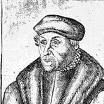

In June-July, 1519 Martin Luther's man Andreas Rudolf Bodenstein (AKA Karlstadt or Carlstadt) (AKA Brother Andrew) (1486-1541) and Pope Leo X's man (former friend of Luther) Johann Eck (1486-1543) engage in the Leipzig Disputation in Pleissenburg Castle, debating about grace, free will, the primacy of the pope and infallibility of papal decisions, and purgatory; after getting pissed-off bigtime, Eck charges Luther with being a Hussite heretic; the judges fail to reach a verdict, but the public allegedly goes with Eck; papal chamberlain Karl von Militz advises Luther to write a letter of submission to Pope Leo X, and Luther acquiesces - better soft paper than cold steel and hot lead?
Holy bullshit? On June 15, 1520 Leo X's 41-point papal bull Exsurge Domine condemns pesky freethinker Martin Luther as a heretic, comparing him to a fox and a boar, and orders him to recant his views on that reformation thang within 60 days while calling for the burning of all his writings; after it backfires as a way to pull Luther's support from under his feet, on Dec. 10 Luther defiantly burns the bull, er, papal B.S., er, bull, along with the canon law near the Luther Oak in Wittenberg; the Catholics now begin calling Luther the Antichrist (forgetting the pagan Roman emperors and Muhammad), while the Protestants begin calling the pope the Antichrist; Johann Eck goes to Rome then returns to Germany as papal legate to enforce the bull.

With the Roman Catholic Church splintering, the Ottomans see their chance? On Sept. 22, 1520 sultan (since 1512) Selim I the Grim (b. 1465) dies while preparing an expedition against pesky Hospitaler-held Rhodes after expanding the Ottoman Empire from 2.5M sq. km to 6.5M sq. km, leaving a bunch of Turkish and Persian poetry, and a royal treasury filled to the brim and locked with his own seal and the soundbyte "He who fills the treasury more than this may use his seal to lock it" (no one takes him up until the empire collapses four cents. later?), and his son Suleiman (Suleyman) I (the Magnificent) (the Law Giver) (1494-1566) (known for wearing a giant turban) becomes Ottoman sultan (until 1566).




Count to ten then lose your temper like a lion? On Jan. 3, 1521 after Martin Luther refuses to retract 41 of his 95 theses, Pope (since 1513) Leo X (1475-1521) issues the bull Decet Romanum Pontificem, excommunicating him; given safe passage by HRE Charles V, Luther travels to the Imperial Diet of Worms (sounds yummy?) (electors, princes and nobles, and town delegates) to argue his case, arriving on Apr. 16, triumphantly having his say, with the soundbyte: "Since Your Majesty and your lordships desire a simple reply, I will answer without horns and without teeth. Unless I am convicted by Scripture and plain reason, I do not accept the authority of popes and councils, for they have contradicted each other"; after being cross-examined by papal nuncio Cardinal Alexander, he leaves in one piece on Apr. 25, his safe conduct pass good for 21 days; on Apr. 26 after papal rep. (appointed cardinal in 1536) Girolamo Aleandro (1480-1542) leads the opposition to him, the Edict of Worms bans Luther and his writings from the Holy Roman Empire, prohibits all new doctrines, and declares Luther an outlaw that anybody can kill after May 14; a bull issued by Pope Leo X follows on June 16, amounting to a death warrant; in an edict to Netherlanders, the pope's man HRE Charles V states: "As it appears that the aforesaid Martin [Luther] is not a man, but a devil under the form of a man, and clothed in the dress of a priest, the better to bring the human race to hell and damnation, therefore all his disciples and converts are to be punished with death and forfeiture of all their goods"; on his way back to Germany Luther is "kidnapped" on May 4 under orders of his protector Elector Friedrich (Frederick) III the Wise (1463-1525) of Ernestine Saxony (whose brother John of Saxony is a Lutheran), and hidden in his castle at Wartburg for a year for safekeeping, pretending to be neutral but consenting to end worship of his 19K+ saints and relics in 1523, along with the Catholic mass; meanwhile Luther's more radical associate Andreas Rudolph Bodenstein von Karlstadt (Carlstadt) (1486-1541) continues the Reformation in Wittenberg in Luther's absence, pushing for complete separation rom the Church, and showing just what unfettered Bible reading can do to a person brought up Catholic?; Luther's books are burned in Rome, and in retaliation the faculty and students at the U. of Wittenberg burn the papal constitutions, the canon law, and works of scholastic theology outside the Elster Gate; Luther adds the pope's excommunication bull to the burning heap; while in hiding Martin Luther translates the New Testament into his most unwormly German. On Oct. 11, 1521 Pope Leo X declares English king Henry VIII the Defender of the Faith for his June pub. Assertio Septem Sacramentorum (Defense of the Seven Sacraments) refuting Martin Luther; meanwhile on Dec. 1 Leo X (b. 1475) dies of a winter chill (after writing sometime in his career "It has served us well, this myth of Christ"?), allowing Francesco Maria I della Rovere to recover his duchy of Urbino; meanwhile Martin Luther takes advantage of this plus Charles V's military diversion to initiate public worship in Germany, with liturgy in vernacular German, and to preach along with Ulrich von Hutten against Jakob Fugger for lobbying the papacy to drop the age-old medieval prohibition against charging interest on loans - a rare natural death for a Medici?

On Jan. 9, 1522 Adrian Florensz Boeyens Dedel of Utrecht, inquisitor (regent) of Spain and HRE Charles V's Catholic tutor is elected Pope (#218) Adrian (Hadrian) VI (1459-1523), becoming the last "barbarian pontiff" (retaining his baptismal name); all popes will be Italian after this until Polish-as-a-pickle John Paul II (1978); he proceeds to try to reform the unreformable, and is hampered by a bout of plague hitting Rome, getting it himself.

On Sept. 14, 1523 Pope (since 1522) Adrian VI (b. 1459) dies, and on Nov. 19 Giulio de' Medici, nephew of Lorenzo II de' Medici is elected Pope (#219) Clement VII (1478-1534), known for wearing a beard - now that the Roman Church is under attack, the Man better be a good ole billy-bob-boy from back home?

On Jan. 1, 1524 20K abandon their homes in London after Bible Millennium Fever prophets use a 1499 pub. of a Tubingen, Germany mathematician about a planetary alignment to predict a flood which never happens; another prophet predicts Feb. 20 based on another planetary alignment in the constellation Pisces, but it's a no-show also. Also in 1524 the Peasant Revolt (War) (ends 1525) against their lords in Thuringia (Swabia and Franconia in S Germany), led by Thomas Munzer, Florian Geyer, and Michael Gaismair begins, fueled by the writings of Martin Luther (1483-1546), who thinks that if he can take on the pope and Church he can also challenge the socioeconomic inequalities of German feudalism, and pub. the Twelve Articles; too bad, he soon turns against them, and pub. the virulent pamphlet Against the Murdering and Thieving Hordes of Peasants, calling for their extermination, and looses on them landgrave Philip I the Magnanimous of Hesse (1504-67), who met Luther at the 1521 Diet of Worms then went Lutheran this year after a personal meeting with Philippp Melanchthon (no wonder that the Communists later decide to junk all of Christianity?); meanwhile (well-named?) German bookbinder Hans Nut (-1527) predicts the Second Coming of Christ exactly 3.5 years after the start of the Peasant's Revolt, which will be the start of 1K years of free food, love, and sex; too bad, he is killed during a prison escape in 1527.
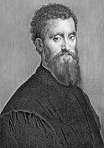

Piston-pumping porno is born in Romo? Also in 1524 I Sedici Modi (The 16 Sexual Positions) is pub. by Raphael's chief pupil Giuliano Romano (1492-1546), with engravings by Marcantonio Raimondi (1475-1534); Pietro Aretino (1492-1556) writes 16 Sonnets to accompany them; it becomes one of the most notorious works of erotic art after it pisses-off Pope Clement VII, who has Raimondi clapped in the Vatican prison, causing Romano to flee, after which the Medicis intervene, and Aretino and Raimondi are expelled from Rome; the drawings of copulating couples in acrobatic "Aretinian postures" were originally drawn on the walls of the Vatican by Romano to get even with the pope for being late in paying him for other work, and Raimondi makes copper plates of them, prints them and circulates them among the upper class in Rome; the sonnets aren't written until Aretino is expelled from Rome, creating modern porno with its depiction of women as greedy for sex, and using bald words like cazzo (prick), potta (cunt), culo (ass), and fottere (fuck) to shock and excite, while trying to justify it as okay by blaming the clergy for centuries of sexual repression of the people, and portraying them as totally corrupt anyway (IOW let's all do it like the clergy); late in the year Romano accepts an invitation from Duke Federigo Gonzaga of Mantua to help drain the marshes, build flood fortifications along the Po and Mincio Rivers, and restore and adorn the Palazzo del Te, ducal palace and other bldgs.; Raimondi is allowed to return after several mo. of sniveling.




On May 15, 1525 the Battle of Frankenhausen sees a combined army of Duke George of Saxony, Philip I of Hesse, and Elector Frederick III of Saxony defeat the peasant army of Thomas Munzer (b. 1489), losing six killed and two wounded while killing 3K-10K badly-equipped untrained fleeing peasants; on May 27 Munzer is beheaded, along with 60K of his peasants, ending the Peasants' Revolt (begun 1524); meanwhile the dukes of Bavaria ally with the archbishop of Salzburg to suppress a farmer uprising in S Germany; meanwhile the Mennonite Church is founded in Zurich by ex-Anabaptist (former Catholic priest) Menno Simons (1496-1561), who wisely drops their Antinomian licentiousness in favor of proper biblical prudery to keep his head? Speaking of head? On June 27 Martin Luther marries former nun Katherina von Bora (1499-1552), who bears him six children, becoming known as "die Lutherin" - finally a nun gets some?

On Aug. 29, 1526 the most tragic battle in Hungarian history takes place as all 25K members of the Hungarian army suffer a crushing defeat at the First Battle of Mohacs (Mohács) (Mohacs Plain) (second in 1687) in S Hungary on the the right bank of the Danube River (115 mi. S of Budapest) by the Janissaries and artillery of Sultan Suleiman I the Magnificent; a week later the city of Pest (across the Danube River from Buda) (home to a large Jewish pop.) is captured, opening the way to the Danube Basin and leading to the partitioning of Hungary between the Ottoman Empire, the Hapsburg Monarchy of Austria, and the Principality of Transylvania; childless Louis (Ladislas) II Jagiello (b. 1506) of Hungary and Bohemia dies in the battle, and HRE Charles V's brother Ferdinand I of Austria (later HRE Ferdinand I) of the cadet line of Hapsburgs is elected his successor by virtue of his marriage to Louis' II's sister Anna; the Jagellon line in Bohemia dies out, and the Hapsburgs (Habsburgs) of Austria succeed to the throne in Bohemia, merging Bohemia (incl. Breslau) into Austria, reintroducing the Roman Catholic religion, and making the thrones of Bohemia and Hungary hereditary possessions of the Hapsburg archduchy of Austria, which later becomes the Austrian-Hungarian Empire - HRE Frederick III would be proud?


If we make it through December everything's gonna be all right I know? In 1527 after HRE Charles V, Habsburg ruler of Germany, Spain, and the Netherlands doesn't provide for their pay, the German-Spanish army of Charles of Bourbon (1490-1527), to whom he promises booty ravages N Italy looking for loot, arriving at the gates of Rome on May 5; after Pope Clement VII (Giulio de' Medici) refuses to pay a big enough ransom they sack Rome, starting on the fog-smothered morning of May 6, killing 4K; entire hospitals and orphanages are emptied, and their raped bodies drowned in the bloody Tiber River; the pope retreats to Castel Sant'Angelo just E of the Vatican on the Tiber, where he holes-up for 8 mo.; on May 6 (early in the action) Bourbon is killed by an arrow (bullet?) shot by Benvenuto Cellini (1500-71); papal army CIC Duke Francesco Maria I della Rovere of Urbino, who sits idly by during the imperial invasion is blamed for the sack of Rome, lowering his capital yet further with Clement VII; this whole affair symbolizes the downfall of Renaissance Italy to imperial Spanish rule, and the end of the High Renaissance?; Charles V later apologizes, claiming that Bourbon and his army were out of control, and the pope forgives him; Francis I seizes the remainder of Bourbon's estates and labels him a traitor, painting the doorways of the Bourbon Palace in Paris yellow; the 9th cent. line of Bourbon in France ends, but never fear, another line breaks through to royalty via Antoine de Bourbon, duc de Vendome, who marries Jeanne d'Albret of Navarre and has son Henry of Navarre, who becomes Henry IV in 1589; meanwhile Italian engraver Marcantonio Raimondi is held for ransom by the Spanish troops of Charles V, and after paying the ransom ruins him financially, he drags back to his hometown of Bologna, staying for life.


In June 1530 after being crowned as HRE by Pope Clement VII (last imperial coronation by a pope), Charles V, egged on by the pope to go to war tries to be diplomatic and asks the Lutherans to present their beliefs at the Diet of Augsburg, hoping to bring them back into the Roman Catholic fold; on June 25 Philip (Philippus) Melanchthon (1497-1560) prepares the Augsburg Confession, codifying Lutheran doctrines, and it is signed by the Protestant princes, while the Roman Catholics (Johann Eck et al.) prepare the Confutation of Augsburg (Confutatio Augustana), rejecting the doctrines as heretical; the Diet recesses on Sept. 2, and Charles V gives the Lutherans until Apr. 15 of next year to conform or face the dreaded Imperial Cameral (Chamber) Court (Reichskammergericht) (created by the Diet of Worms in 1495); in Dec. eight princes and 11 cities of the Holy Roman Empire agree to form the Schmalkaldic League against Charles V and his Roman Catholic allies to defend against any possible attacks, and tell the court to shove it, causing the Holy Roman Empire to institute criminal code and police regulations.
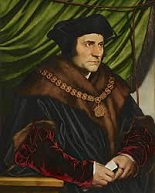
Breathe better, sleep better with Breathe Rite? The English Church formally breaks its ties with Rome? In Mar. 1532 the anticlerical Reformation Parliament, led by Henry VIII's chief minister Thomas Cromwell presents the Supplication Against the Ordinaries, a long list of grievances against the Roman Catholic Church by the ordinary people to the king, proposing that he be given the power to investigate and reform Church abuses; when clerical MPs oppose it, Henry VIII forces them to state whether their loyalty is with him or the pope, saying, "We thought that the clergy of our realm had been our subjects wholly, but now we have well perceived that they be but half our subjects, yea, and scarce our subjects"; on May 15 the Submission of the Clergy by the convocation of the English Church in Canterbury accepts Henry's claim that all ecclesiastical legislation is subject to royal approval, undoing the work of the 664 Synod of Whitby; an act is passed abolishing annates (fees newly-elected bishops pay to Rome), and setting up machinery to appoint new bishops without consulting the pope, pissing-off loyal papist, er, Roman Catholic (who lived under the Carthusian discipline in 1499-1503) Sir Thomas More (1478-1535), who resigns as lord chancellor on May 16 and retires from public life, pissing-off Henry VIII. On July 6, 1535 he is executed at Tower Hill; "I can shift for myself" on the way down, he says; another good one: "I die the king's good servant, but God's first"; parting shot: "Though you have warrant to cut off my head, you have none to cut off my beard"; he is canonized in 1935, and in Nov. 2002 Pope John Paul II declares him the patron saint of good Roman Catholic politicians.



On Jan. 25, 1533 after she maneuvers to wait until the last moment, Henry VIII and Anne Boleyn are secretly married in a turret in Whitehall Palace, and in Feb. she comes out of her chamber and admits to "a furious hankering to eat apples, such as she had never had in her life before", after which "she broke into a fit of hysterical laughter and rushed back into her room". On Mar. 30 twice-married obscure cleric Thomas Cranmer (1489-1556) is consecrated as archbishop of Canterbury after the papal bull Romanus Pontifex from Pope Clement VII arrives confirming his nomination by Henry VIII, thus ending clerical celibacy in the Anglican Church (Henry had blackmailed the pope by threatening to terminate the papacy's annates); not satisfied with that bone, Henry VIII, faced with the pregnancy of his royal baby factory Anne Boleyn takes the world-shaking step of breaking with the Roman Catholic Church (as to who is the boss, not the doctrines?), has the Act (Statue) in Restraint of Ecclesiastical Appeals passed on Apr. 7 to make it illegal to appeal his decision to any authority outside England, stating "This realm of England, is an empire... governed by one Supreme Head and King", then has Cranmer annul his 23-year marriage to Catherine of Aragon on May 23, and on May 28 pronounce his Jan. marriage legal, then on June 1 crown bun-in-the-oven Anne Boleyn (1507-36) as queen of England; in July the Act Concerning Ecclesiastical Appointments and Absolute Restraint of Annates (Appointment of Bishops Act) becomes effective, depriving the pope of his main source of income along with his last power in Tudor England; on July 11 Pope Clement VII excommunicates Henry VIII, which doesn't bother him one pert ducky little bit, and he sends his prelate Edmund Bonner (1500-69) (who argued Henry VIII's case a year earlier in defense of his divorce) with a notice of intent to appeal to a gen. council; meanwhile Archbishop Cranmer foreswears allegiance to the pope, directs the erasure of the pope's name from every prayer book, and pronounces himself the new head of the English Church, becoming the virtual pope of England, with most of the powers incl. the issuing of bulls (a seven deep-sixes an eight?); you-better-drop-kids-quick Queen Anne begins her Thousand Days; Catherine of Aragon, who had for some time been living under house arrest in the country has her rank reduced to princess dowager of Wales, and is forced to live in several dank and unhealthy castles for the rest of her life, starting with Ampthill in Bedfordshire, then Buckden, finally Kimbolton Castle, Huntingdonshire, while constantly being put under pressure to sign away her rights and those of her daughter Mary, which she endures religiously.

On Nov. 1, 1533 John Calvin (Jean Cauvin) (1509-64) delivers his first speech in Geneva attacking the Church and calling for reforms.
On Mar. 23, 1534 Pope Clement VII pronounces Catherine of Aragon's marriage valid; not to be outdone, on Mar. 23 the English Parliament passes the First Act of Succession, followed in Nov. by the Act Respecting the Oath to the Succession, vesting the English succession in the children of Henry VIII and Anne Boleyn (i.e. future Elizabeth I), and requiring everyone in England to swear allegiance to Henry VIII as the head of the English Church; Sir Thomas More is imprisoned in the Tower of London for refusing to take the oath, during which time he writes Treatise on the Passion, and Dialogue of Comfort Against Tribulation.
On Apr. 20, 1534 English Roman Catholic nun Sister Elizabeth Barton (b. 1506), "the Maid of Kent", "the Holy Maid of London", an English ecstatic (epileptic) opposed to Henry VIII's matrimonial policy is executed at Tyburn after she talks too much and claims a message from the Virgin Mary that if goes he through with his divorce of Catherine of Aragon he "should no longer be king of this realm... and should die a villain's death" within 6 mo. - thefore, doctor, take your own medicine?


In Apr. 1534 an 80-ship Ottoman fleet led by Lesbos-born Turkish privateer adm. Barbarossa (Redbeard) II Hayreddin Pasha (1478-1546) recaptures Coron, Patras, and Lepanto from the Spaniards, then crosses the Strait of Messina in July, capturing a large number of ships around Reggio Calabria as well as the Castle of San Lucido, then destroys the port of Cetraro, and in July attacks Campagnia, sacking Capri and Procida and bombarding the ports of Naples; not done yet, in Aug. he attacks Lazio and Gaeta and works his way up the Tiber River, causing the church bells of Rome to sound an alarm; he then turns S, attacks Ponza, Sicily, and Sardinia, then captures Tunis in N Africa in Aug. from Hafsin Sultan Mulei Hassan, who asks HRE Charles V to plan a counterattack; Barbarossa also captures the strategic Tunisian port of La Goulette, and waits for the emperor to bring it on.


On Aug. 15, 1534 as the Protestant Reformation rocks Paris, seven Roman Catholic friends incl. (St.) Ignatius of Loyola (1491-1556) and (St.) Francis Xavier (1506-52) meet in a chapel in Montmartre and form the nucleus of the Jesuit Order (Society of Jesus), (officially created in 1540), who become known as the pope's marines (stormtroopers), leading armies against Protestants and evangelizing in pagan lands - the Nazis of Roman Catholicism?

On Sept. 25, 1534 Pope (since Nov. 19, 1523) Clement VII (b. 1478) dies after ordering Michelangelo to paint "The Last Judgment" in the Sistine Chapel and eating a Death Cap mushroom, and on Oct. 13 Alessandro Farnese, "the Petticoat Cardinal" (brother of Pope Alexander VI's mistress Giulia Farnese, who had four known bastard children then allegedly was completely converted) is elected Pope (#220) Paul III (1468-1549) (until Nov. 10, 1549), becoming the last Renaissance pope (lover of nepotism, lavish banquets, arts, and all that jazz), and the first pope of the Counter-Reformation; Clement's death causes the huge dowry for Catherine de' Medici promised French king Francis I to remain unpaid, causing him to complain "The girl has come to me stark naked"; Pope Paul III has a long list of murders, incl. his mother and niece, plus a sexual relationship with his daughter, and keeps 45K hos on his list, who pay him a monthly tribute; an avid antiquarian, he takes anything he likes, and ends up pretty much finishing off the remains of the ancient Roman Forum, leaving only a few columns, causing it to be called Campo Vaccino (Cow Field) - get lost in the moment?


On June 22, 1535 after refusing to swear allegiance to Henry VIII, asserting that Parliament does not have the right to usurp papal authority in favor of a king, Roman Catholic cardinal-bishop John Fisher (b. 1459) of St. Vitalis is beheaded for treason; on July 6 Sir Thomas More (b. 1478) is ditto at Tower Hill after a trial on July 1; "I can shift for myself" on the way down, he says; another good one: "I die the king's good servant, but God's first"; parting shot: "Though you have warrant to cut off my head, you have none to cut off my beard"; Fisher and More are beatified on Dec. 29, 1886 by Pope Leo XIII, and canonized on May 19, 1935 by Pope Pius XI, and on Oct. 31, 2000 Pope John Paul II declares More the "heavenly Patron of Statesmen and Politicians"; first of the Forty Martyrs of England and Wales (1535-1679).
In 1536 Parliament declares the authority of the pope void in England; meanwhile after 376 religious houses in England are dissolved by royal decree, the Pilgrimage of Grace sees 40K men led by lawyer Robert Aske (1500-37) of Doncaster march through N England protesting the looting of the churches and monasteries by Henry's iconoclastic govt., and seeking relief from tax collectors; pro-Catholic Thomas Howard, 3rd duke of Norfolk negotiates their surrender; meanwhile Thomas Cromwell rises to Baron Cromwell of Oakham and Lord Privy Seal, setting up a bureaucratic machine to administer all the income generated by selling Church land and closing monasteries; too bad his big schmuck arrogance and venality causes him to make a lot of enemies; Thomas Mildmay of Chelmsford (1515-67) gets a lucrative job as royal admin. of the ecclesiastical revenues annexed to the crown, allowing him to later set up his son Walter Mildmay as privy chancellor and chancellor of the exchequer under Elizabeth I - magic green, cleans like magic?
On May 29, 1537 Pope Paul III issues the bull Sublimus Dei, declaring that the American native "savages", "being truly men, are apt to receive Christian faith", and "are not to be reduced to slavery", with automatic excommunication for violators; too bad, the Catholic Conquistadors are also under orders to convert them, so they get around the letter of the law by having a priest ask them in Spanish if they accept Christ, and when they don't understand Spanish, that makese them enemies of Christ, allowing them to be enslaved anyway - typical official cover story to allow the systematic extermination of Indios to go on unperturbed?
In 1538 Henry VIII ensures the popularity of the Anglican Church by abolishing the Roman Catholic monasteries, relics, and shrines in S England and sharing the loot with his non-Catholic pop.; Thomas Cranmer carries out his orders for the desecration of the profitable shrine of St. Thomas Becket in Canterbury Cathedral (incl. burning his bones), and the abolition of many Roman Catholic church festivals; on Jan. 23, 1888 a skeleton is found in Becket's crypt of a 6'2" 50-y.-o. man with a fractured skull, but since it doesn't fit the eyewitness descriptions that the crown of his head was knocked off, the jury is still out; in Sept. informed that he needs his own non-Catholic Bible to prove his independence from the papacy, Henry is handed a copy of dead Tyndale's "illegal" Bible (printed in Paris) without knowing it, and approves it, and the English govt. directs every parish in England to purchase a Tyndale Bible of the largest size possible, to be set up in each church for easy reading by parishoners; Cranmer goes on to work to unite the new Church of England with the German Lutheran Church, and invites Protestant refugees to England, incl. Peter Martyr (Pietro Martire Vermigli), and Bernardino Ochino.



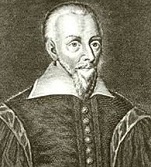
In 1540 after being forced to flee to Paris and change his name to Villanovus, Freethinking Spanish physician Michael Servetus (1511-53) discovers the Pulmonary Circulation of the Blood. On Oct. 27, 1553 Swiss Protestant leader John Calvin (1509-64) burns his theological enemy, Unitarian (non-Trinitarian) Catalan scholar Michael Servetus (b. 1511) (who was captured while fleeing to his protection after escaping a prison of the Spanish Inquisition) in Geneva, executioner Guillaume Farel warning the audience: "(Servetus) is a wise man who doubtless thought he was teaching the truth, but he fell into the hands of the Devil... Be careful the same thing doesn't happen to you"; liberals lose their illusions about Bible-thumpers ever lightening up anything but a faggot, and a corner is turned in the fight for freedom of conscience? at his trial Servetus is ridiculed for describing Palestine as a sparse, sterile land when the Bible says it's the land of milk and honey; noted noble Paris-educated French Protestant ex-humanist poet Theodore Beza (1519-1605) backs Calvin up, as does #1 learned scholar of the age Sebastian Castellion (Catellio) (Chateillon) (Chataillon) (Castello) (1515-63), who in May 1554 pub. the pamphlet "Should Heretics Be Persecuted?" under the alias Martinus Bellius, containing the soundbyte: "When Servetus fought with reasons and writings, he should have been repulsed by reasons and writings", and throws Calvin's words back at him when he was being persecuted by the Roman Catholic Church: ""It is unchristian to use arms against those who have been expelled from the Church, and to deny them rights common to all mankind", ending with an argument for separation of church and state, with the soundbyte: "We can live together peacefully only when we control our intolerance. Even though there will always be differences of opinion from time to time, we can at any rate come to general understandings, can love one another, and can enter the bonds of peace, pending the day when we shall attain unity of faith" - I look bad, feel bad, which is most important?

At least it won't drip in my face anymore? On Dec. 25 (Christmas Day), 1541 Michelangelo unveils his fresco The Last Judgment (1536-41) on the wall of the Sistine Chapel behind the altar of St. Peter's; depicts the horrors of ending up in hopeless, faithless, loveless, naked Hell as a result of one's sins, causing Pope Paul III to fall to his knees in fear, mumbling "Lord, save me from my sins on the Day of Judgment"; Michelangelo rejects classical proportions in favor of movement and dramatic effect, and portrays himself as St. Bartholomew, holding his skin after being flayed, showing his contempt for having to do the job; he puts the pope's master of ceremonies Biagio da Cesena in the lower right corner as Minos, judge of the underworld (complete with ass ears) after he criticizes the ignudi (nude figures) on the ceiling; the fresco is painted on the spot where a portrait of Pope Sixtus IV had been erased by Medici Pope Clement VII to get even for the 1478 Pazzi Plot; the abundance of ignudi sparks a "Fig Leaf Campaign", organized by rich, high-living but religiously ultra-orthodox statesman (later archbishop of Naples and cardinal) Oliviero Carafa (1430-1511) and Monsignor Sernini (ambassador of Mantua), who get Daniele Ricciarelli da Volterra (1509-66) hired in 1565 (after the Council of Trent condemns nudity in religious art) to paint over the genitalia, earning him the nickname Il Braghettone (the breeches painter); since St. Blaise (holding his iron combs) is shown behind St. Catherine (holding her breaking wheel) looking at her naked ass, he chisels them both off and repaints them; luckily, Pope Pius IV dies at the end of 1565, and his scaffolding is taken away for the new papal elections, stopping him from messing up the lower half of the fresco; "It was mostly disgraceful that in so sacred a place there should have been depicted all those nude figures, exposing themselves so shamefully, and that it was no work for a papal chapel but rather for the public baths and taverns" (Biagio da Cesena).

In 1541 religious conference is held in Ratisbon in Germany, where Johann Eck continues defending Roman Catholicism; meanwhile John Calvin (1509-64) returns to Geneva, which until his death in 1564 becomes his stronghold, and founds the Presbyterian Church, which spreads to Scotland in 1560 via his disciple John Knox, and becomes the state church of Scotland in 1592 - they were smart enough to abandon the corrupt Mother Church, but not smart enough to avoid becoming established churches that persecute enemies like it does?


In 1541 Roman Catholic anti-Lutheran theologian Johann Maier (Mayer) von Eck (1486-1543) pub. Against the Defenses of the Jews, a virulent anti-Semitic pamphlet claiming that any attempt by "Jew protector" Andreas Osiander to claim that the "blasphemous race" doesn't kill Christian kids and desecrate the eucharistic host is full of scheisse; "Could they but drown all Christians in one spoon, they would eagerly do it"; a Roman Catholic equals or bests Martin Luther in anti-Semitic rhetoric? In 1543 one-upper Martin Luther (1483-1546) pub. On the Jews and Their Lies, which calls for their Nazi-like persecution incl. pogroms 400 years before the little-miss-sunshine Nazis, causing their persecution and expulsion from Prague, Worms, Vienna, Genoa, and the papal states over the next 130 years; "A base, whoring people, that is, no people of God, and their boast of lineage, circumcision, and law must be counted as filth"; "Full of the Devil's feces... which they wallow in like swine" (synagogues); "Incorrigible whore and an evil slut."
On July 21, 1542 Pope Paul III proclaims the apostolic consttution Liect ab initio, establishing the Holy Office (originally Supreme Sacred Congregation of the Roman and Universal Inquisition until 1908, then Holy Office until Dec. 7, 1965, then Sacred Congregation for the Doctrine of the Faith until 1983, then Congregation for the Doctrine of the Faith) in Rome "to maintain and defend the integrity of the faith and to examine and proscribe errors and false doctrines", in practice used to intercept appeals from defendants of the Inquisition and forward them directly to the Holy See, ending up being used to speed up the persecution of scientists promoting Copernicus' heliocentric system - I'm feeling really nonjudgmental today?

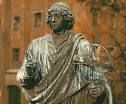

The original Coppertone Baby kept his ass out of the Sun on purpose? On May 24, 1543 (May 14 Old Style) (Mon.) Nicolaus Copernicus (Lat. "copper worker") (b. 1473) dies in Frombork, Poland after allegedly awakening from a stroke-induced coma long enough to view the first printed copy of his magnum opus Six Books on the Revolutions of the Celestial Orbits (De Revolutionibus Orbium Coelestium), advancing the Heliocentric Theory (which he had shelved, claiming it to be incomplete or even erroneous, but more likely afraid of Catholic reprisals?), which was pushed through the press by his one and only pupil Georg Joachim Rheticus (Rhaeticus) (von Lauchen) (1514-74) (a Lutheran math prof. whose father had been executed for heresy), and is pub. posth. in safe Protestant Nuremberg; it is (fawningly?) dedicated to Pope Paul III, and incl. a cautious (mendacious?) Preface by Andreas Osiander (1498-1552) of Konigsberg, stating that the revolution of the Earth is a mere mathematical convenience and not necessarily a physical fact (although Coppertone Baby had considered it otherwise?); "There have already been widespread reports about the novel hypotheses of this work, which declares that the Earth moves whereas the Sun is at rest in the center of the Universe. Hence certain scholars, I have no doubt, are deeply offended and believe that the liberal arts, which were established long ago on a sound basis, should not be thrown into confusion. But if these men are willing to examine the matter closely, they will find that the author of this work has done nothing blameworthy. For it is the duty of an astronomer to compose the history of the celestial motions through careful and expert study. Then he must conceive and devise the causes of these motions or hypotheses about them. Since he cannot in any way attain to the true causes, he will adopt whatever suppositions enable the motions to be computed correctly from the principles of geometry for the future as well as for the past. The present author has performed both these duties excellently. For these hypotheses need not be true nor even probable. On the contrary, if they provide a calculus consistent with the observations, that alone is enough. Perhaps there is someone who is so ignorant of geometry and optics that he regards the epicyclc of Venus as probable, or thinks that it is the reason why Venus sometimes precedes and sometimes follows the Sun by forty degrees and even more. Is there anyone who is not aware that from this assumption it necessarily follows that the diameter of the planet at perigee should appear more than four times, and the body of the planet more than sixteen times, as great as at apogee?"; the kind of reception awaiting Copernicus' followers is shown right away, when the first Auto da Fe, AKA Act of Faith, or burning alive of heretics (Protestants) by the Spanish Inquisition dressed in weird sinister hoods takes place in the island of Goa in SW India (goa to Hell, you heretics?), and Pope Paul III issues his first Index Librorum Prohibitorum (Index of Prohibited Books); each lucky heretic gets to wear a black sanbenito painted with flames and devils to his own BBQ - toast them marshmallows on a stick, hooray for Christ?
Also in 1543 the Spirituali Movement in Rome, which hopes to reform the Church without splitting like the Protestants pub. the anon. The Benefit of Christ's Death (Beneficio di Cristo), their masterpiece proving that salvation comes through faith in Christ alone, not through works or the Church; after they pub. 40K copies, the Church declares it heretical and places it on the Prohibied Index and starts to come down on them, but Pope Julius III purposely slows down the Inquisition until his death, after which Pope Julius IV lets the dogs loose and exterminates them by the 1560s.

On Dec. 13, 1545 the Council of Trent (19th Ecumenical Council), called by Pope Pius III convenes in Trent in N Italy (until Dec. 4, 1563) to discuss the pesky Reformation started by almost-gone Martin Luther (d. 1546), launching the bloody Counter-Reformation (ends 1648), with Monktown Munich as one of the main bases; three papal legates are sent by Pope Paul III to preside, incl. Cardinal Reginald Pole (1500-58) of England, who is considered next in line for the papacy although he is a secret member of the Spirituali; one good thing, it authorizes Pope Paul III to take up the 1475 work of Pope Sixtus IV and reform the pokey Julian Calendar, and it only takes 37 more years to figure out and implement (1582) - these changes in attitude, changes in attitude, nothing remains the same?


It's no time for a moondance, my love? On Mar. 31, 1547 king (since 1515) Francis I (b. 1494) dies of syphilis, and his son the duke of Orleans is crowned Henri (Henry) II (1519-59), Valois king #10 of France (until 1559); Catherine de' Medici (1519-89) becomes queen consort (until 1559), going on to have three weak sons that she dominates - yah, it's good to be in control? The Chambre Ardente (Burning Chamber), created in 1535 for the trial of heretics by Charles of Guise, Cardinal of Lorraine becomes infamous during Henri II's reign (1547-59) for its atrocities against Huguenots.

On Feb. 7, 1550 after Cardinal Reginald Pole comes within one vote until he is exposed by his archenemy Cardinal Giovanni Carafa (future Pope Paul IV) as a Spirituali, Gianmaria (Giovanni) Ciocchi del Monte is elected Pope (#221) Julius III (1487-1555) (until Mar. 23, 1555), who likes to sodomize young boys, appointing some of his favorite teenie bonks as cardinals, and going on to bonk his own illegitimate son Bertuccino, causing Cardinal Giovanni della Casa to dedicate his poem In Praise of Sodomy to him - sign me a copy with your brown holy finger?

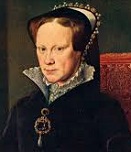


Nausea, heartburn, indigestion, upset stomach, diarrhea, Bloody Mary is maximum pink? Or, hit it, Mrs. Church? On May 25, 1553 as part of a Protestant plot by John Dudley, duke of Northumberland, 15-y.-o. Lady Jane Grey (1537-54) (cousin of Edward VI, great-niece of Henry VIII, and great-granddaughter of Henry VII) (who knows Latin, Greek, and Hebrew) marries his son Guilford (Guildford) Dudley (1536-54), brother of horsemaster Robert Dudley, earl of Leicester; on July 6 after the king's council signs the handwritten King's Device, English king (since 1547) Edward VI (b. 1537) dies of TB; in it he passes over his half-sisters Mary Tudor and Elizabeth for Protestant Lady Jane Grey (1537-54) ("the 9-day queen") (sometimes called the 13-day queen when July 6 is counted), and after Thomas Cranmer forgives his pledge to carry out Henry VIII's will giving it to Mary Tudor, she is proclaimed queen on July 10 in the Tower, and struts her royal stuff until July 19 (never leaving the Tower), with Edward's Greek tutor Sir John Cheke as secy. of state; John Dudley tries to capture Mary in Norfolk and is instead captured in July; meanwhile Mary gathers her forces in East Anglia, and on July 19 after being accompanied by a large force to London along with future Elizabeth I, militant Roman Catholic Mary I Tudor (1516-58), duchess of Suffolk (granddaughter of Ferdinand II and Isabella I the Catholics), later known as Bloody Mary is proclaimed queen (the 42nd British monarch) (until Nov. 17, 1558); the military show of support causes Lady Jane Grey's supporters to fold, and she and her husband are arrested on July 20; Mary I is crowned on Oct. 30 in Winchester Cathedral, immediately signalling a return to Roman Catholicism, and signing a marriage treaty with her cousin Philip II of Spain, promising him the title of King of England without the powers or the succession, triggering Wyatt's Rebellion, with a Protestant army headed by Sir Thomas Wyatt the Younger (1521-54), which heads for London, where they are defeated and the leaders executed by next year, with Elizabeth locked up for almost a year, escaping being implicated in the plot by a hair; too bad, Lady Jane Grey (who has been spared so far and kept in the Tower) is implicated, so her head is on the chopping block with theirs; meanwhile Stephen Gardiner (1483-1555), bishop of Winchester becomes lord chancellor, and soon heads begin to roll; John Knox flees to Geneva to be with John Calvin; St. Paul's chaplain Edmund Grindal flees to Germany (until 1559); Sir John Cheke is imprisoned; Miles Coverdale is removed as bishop of Exeter and imprisoned for two years, then goes into exile for eight years in the Continent (Wesel, Bergzabern, Geneva) (until 1559); Thomas Cranmer is reprimanded and confined to his palace at Lambeth, and arrested on Sept. 14 then imprisoned in the Tower of London; Edmund Bonner is released, and goes completely Catholic, becoming known as "Bloody Bonner" for his zealous persecution of Protestants; Thomas Howard, 3rd duke of Norfolk is released from the Tower, and his lands and titles restored, keeping the resilient Howard name going, with his grandson Thomas Howard, 4th Duke of Norfolk (1536-72), son of his dead son Henry Howard inheriting the dukedom on his death next year; on Aug. 23 John Dudley is beheaded after feigning conversion to Catholicism; his son Robert Dudley (b. 1533) (who became an MP this year) supports his father, and ends up in the Tower under sentence of death at the same time that Elizabeth is imprisoned there, sparking rumors that they begin a romance, despite him being married?


On Mar. 23, 1555 Pope (since 1550) Julius III (b. 1487) dies, and on Apr. 9 Marcello Cervini Degli Spannochi is elected Pope (#222) Marcellus II (1501-55); he dies after a reign of 22 days on Apr. 30-May 1, and on May 23 ardent Italian nationalist and narrow intolerant bigot Giovanna Pietro Carafa is elected Pope (#223) Paul IV (1476-1559) (until Aug. 18, 1559), going on to stink up the Roman Catholic Church as the Father of the Roman Inquistion, cutting off Michelangelo's pension and ordering the nudes in his Last Judgment in the Sistine Chapel to be clothed, then persecuting the Spirituali, which Michelangelo is a secret member of, who want to reform the Church without going Protestant; on July 14 he issues the anti-Semitic bull Cum Nimis Absurdum ("Since it is absurd and utterly inconvenient to be in a situation where the pesky Jews - who through their own fault were condemned by God to perpetual slavery - have access to us or even our society... and instead of the slavery they deserve, they dare to claim superiority over us..."), setting up the first-ever legally compulsory Jewish ghetto in Rome, surrounded by brick walls and locked at night, with punishments for being caught out at night, esp. without wearing the yellow star of David on their clothing, plus a yellow hat for males and yellow kerchief for females (the original yellow safety clothing?) (the Satan-worshipers might try to get some Christian infants for who knows what, I can't control myself, burn baby burn?); as self-chosen slaves who reject Our Dear Lord, Jews are prohibited from owning real estate or practicing medicine; by 1870 Rome has the last legally compulsory ghetto in Europe, which is abolished by King Victor Emmanuel - here comes the rooster?

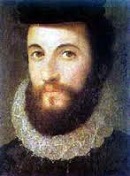
So good looking, so refined, wouldn't you like to know what's going on in my mind? In Jan. 1556 after his brother Ferdinand I's work at Augsburg restores good relations, which had grown icy after he designated the imperial crown for his Valladolid-born Hapsburg son Philip II (1527-98) instead of him, gout-suffering HRE Charles V (Charles I of Spain) gets religion and officially abdicates at Brussels, designating Ferdinand I as king of Germany (reserving his title of HRE until 1558) and Philip II as "Most Catholic King" of Spain, although his "advice" remains a command; the war with France continues; Philip II's page boy (lifelong friend) Ruy Gomez de Silva (Rui Gomes da Silva) (1516-73) is created grandee of Spain, becoming known among foreign ambassadors as Rey Gomes II (King Gomes), and becoming the political opponent of Fernando Alvarez de Toledo, 3rd duke of Alba, who wanted a more centralized autocratic monarchy; Charles V retires to a luxurious life in the monastery of Yuste N of the Tagus Valley as a private individual not a monk, with 150 attendants (who are forever busy digging up fishy delicacies for his table), giving official control of the Hapsburg lands to Ferdinand I, while Philip II gets Spain, its overseas colonies, the Spanish islands in the Mediterranean (incl. Sicily), the Italian possessions (incl. Naples, Milan), Franche-Comte, and the Netherlands, causing speculation that there will be a winner-take-all war later; daddy "advises" Philip II to be "cutting out the root of heresy with rigor and rude chastisement", causing him to order the duke of Alva to give up his attacks on the Papal States in the Italian campaign so he can go toast some Dutch butt; Philip II speaks only Spanish but now rules the Netherlands along with his 2nd wife Bloody Mary Tudor of England, and reenacts Charles V's Edict of 1550, beginning "the longest, the darkest, the bloodiest, the most important episode in the history of the religious reformation in Europe"; he appoints inquisitor-gens. who send out a dozen inquisition officers throughout the Netherlands (Peter Titelmann et al.) to arrest people and burn them at the stake for incl. offenses reading the Bible, joking as they writhe in the flames - yes I've seen it before, just little bits of history repeating?

One of the biggest turning points in history: The Red Queen is followed by a White Queen? On Nov. 17, 1558 (7:00 a.m.) after learning of the loss of Calais, English queen (since 1553) Bloody Mary I Tudor (b. 1516) dies childless (she had a tumor not a child) (but just in case she's got a bun in the 42-y.-o. oven she leaves her child the throne in her will?), and after holding out until 10 days before her death to name her as heir, is succeeded by her witch-lucky Protestant half-sister Elizabeth I (1533-1603), whom English Roman Catholics forever consider to be an illegitimate bastard, while English Protestants forever consider her to be their Virgin Mother, saving them from becoming toast; she becomes the 3rd child of Henry VIII who considers it their right to dictate the religion of the nat. church; she promptly swings it back to Protestant, but calls it the "Middle Path" of Protestant doctrines and Roman Catholic ceremonies, robes, and trappings; after defending his Roman Catholic beliefs, cardinal (since Aug. 7, 1587) William Allen (1532-94) is forced into exile, founding a seminary in the Spanish Netherlands to provide priests for the English; on Nov. 17 (7:00 p.m.) Cardinal Reginald Pole (b. 1500), archbishop of Canterbury since 1556 dies in London - Anglicanism = Roman Catholic Protestantism?
On Feb. 15, 1559 Pope Paul IV issues the bull Cum ex Apostolatus Officio ("By virtue of the apostolic office"), proclaiming that only Roman Catholics can be elected pope, and that all rulers who maintain heretical doctrines may be deposed by the faithful - a clear signal to English Catholics?
In 1559 "The Church has always fulfilled its duty to keep books under surveillance, but until the invention of printing, it did not feel the need to compile a catalog of prohibited books because those writings considered dangerous were burned" (Enciclopedia Cattolica); now that the Devil's invention of the printing press is running amok, threatening the status quo, Pope Paul IV pub. the first Index Autorum et Librorum Prohibitorum AKA the infamous Index of Forbidden Books, used to retard any and every religious, scientific, social or political advance from here on out, going through 19 eds.; Roman Catholics are forbidden to read, sell, translate, or possess them under penalty of excommunication; the reading of vernacular translations of the Bible is prohibited; "In practice, Bible reading by laymen ceased completely for centuries. The Bible became virtually an unknown book, and millions of Italians lived their lives without ever reading a page of it" (Mario Cignoni); "All prohibited books contained in the brief shall be collected. Those by heretical authors shall be burned publicly in the auto da fe; the rest shall be placed in some well-secured room of the inquisition... As far as books in the humanities are concerned, which may contain glosses, arguments, letters, or annotations by Philipp Melanchthon or other heretics, they will be returned to their owners once the heretical annotations have been removed or crossed out... A book of medicine, entitled 'Paradoxas de Fusion', printed in Venice in 1547, is said to contain suspicious things even though it is not placed in the catalogue; it must be prohibited." (Decree of the Supreme on Books, 1558) When you have a yeast infection, get treated immediately, cheese it?

On Aug. 18, 1559 Pope (since 1555) Paul IV (b. 1476), Father of the Roman Inquisition dies, and on Sept. 5 a papal conclave meets; on Dec. 25 Milan-born lawyer (cardinal since 1549) Giovanni Angelo d'Medici is elected Pope (#224) Pius IV (1499-1565), immediately reversing some of the policies of his unpopular predecessor, esp. papal hostility to Spain, and reaching out to Philip II of France and HRE Ferdinand I, whom he officially recognizes - come on, say pucker?



One of these crazy crazy crazy nights I'm gonna find you, or, Take it, take another little piece of my heart, baby? On Jan. 17, 1562 after French regent Catherine de' Medici's chancellor Michel de l'Hopital convenes another colloquy to stop the Roman Catholic-Protestant feud by reason, the Edict of Saint-Germain (January) (the most liberal given French Protestants until the 1598 Edict of Nantes) suspends persecution of French Huguenots, officially recognizing them, but only granting limited toleration, forbidding public worship in towns but allowing it in suburbs; there are 2,150 French Huguenot congregations by now; too bad, the Vatican works to undermine it, and its terms aren't carried out, and papal legate Ippolito d'Este gets l'Hopital dismissed (until 1563); on Mar. 1 the Massacre of Vassy (Wassy) in Wassy-sur-Blaise in Haute-Marne sees Francois (Francis) de Lorraine, 2nd Duke of Guise (1519-63) (younger brother of Charles of Guise, Cardinal of Lorraine) returning from a conference with the Duke of Wurttemberg at Saverne, Alsace, where he convinced him that the Colloquy of Poissy had failed and Calvin is full of merde, then get pissed-off at seeing Huguenots holding Satanic religious ceremonies without benefit of true Catholic clergy, and order the church fired to send the devil spawns back to their father in Hell, killing 23 and wounding hundreds, starting the dog-eat-dog French Wars of Religion (ends 1598), eight bloody civil wars between the Roman Catholics and Protestant Huguenots in France, ending as a struggle for control of France by the Roman Catholic House of Guise (Lorraine) (descended from Norman knight Sir William Gyse, who fought with William I the Conqueror in the 1066 Battle of Hastings) (goes extinct in 1688), and the Protestant Huguenot House of Bourbon; the initial Huguenot leaders are Louis I of Bourbon, Prince of Conde (Condé) (1530-69) and Adm. Gaspard de Coligny (1519-72); the initial Roman Catholic leaders are Duke Francis of Guise and Catherine de' Medici; later Henri IV (Henry of Navarre) is the Huguenot leader, and Henry III the Catholic leader; the Huguenots obtain aid from England, Germany, and Switzerland, and the Catholics from Spain, and go to it, kill-kill-killing for the God of Love and just knowing that they will be saved in yummy-yummy-heaven.

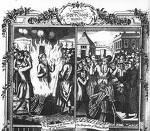
On Mar. 20, 1563 John Foxe (1516-87) pub. Foxe's Book of Martyrs (Acts and Monuments of these Latter and Perillous Days, Touching Matters of the Church) (2 vols.), which makes him "England's first literary celebrity", selling for 10 shillings (3 weeks' pay), even though he receives no royalties; Pt. 1 is about persecution, torture, and burning of early Christian martyrs, Pt. 2 is about the reign of Henry VII and Edward VI, and Pt. 3 is about the burning of Protestants by Roman Candle Catholics under Bloody Mary, all detailed with relish in a 2-vol. 2.3K-page superbook (largest pub. project in England to date), complete with gruesome woodcuts, convincingly portraying the Pope as the Antichrist, and England as the new Chosen Nation of Israel, which God has picked to save Da WQorld; becomes the #2 bestseller in England after the Bible, and starting with the 2nd ed. in 1570 every cathedral church in England is ordered to carry a copy; deeply influences William Bradford, founder of Plymouth Colony, and becomes the theme for all future U.S. Protestant-dominated govts.?

Them Protestants got the devil's printing press, we Catholics got holy BBQ chefs? On Dec. 4, 1563 the Council of Trent (begun 1545) finally ends successfully with the aid of (St.) Carlo Borromeo (1538-1584), nephew of Pope Pius IV, who is known for his harsh ecclesiastical discipline; Pope Pius IV confirms the Council of Trent's Professio Fidei Tridentina, and issues it in his bull Injunctum Nobis on Nov. 13, 1565; the old problem brought up the pesky Arians is dealt with at the start: "I believe in one God, the Father Almighty, Maker of Heaven and Earth, and of all things visible and invisible. And in one Lord, Jesus Christ, the Only-begotten Son of God. Born of the Father before all ages. God of God, Light of Light, true God of true God. Begotten, not made, of one substance with the Father. By whom all things were made. Who for us men and for our salvation came down from heaven. And became incarnate by the Holy Spirit of the Virgin Mary: and was made man"; the One Truth Faith having been authoritatively laid out in black-and-white for everybody, and printed on the One True Printing Press of God, of course anybody publishing anything that doesn't fit in its cookie cutter must be a Satanic pawn, so Pope Pius IV also approves the Index Librorum Prohibitorum (Index of Prohibited Books) (Tridentine Index), which is pub. in Venice next year.

In 1564 (year of William Shakespeare's birth) Pope Pius IV appoints a committee of cardinals to rid Church music of polyphonic harmony, which had grown unnecessarily complex, but the lovers of the polyphonic style put up noted composer Giovanni Pierluiga da Palestrina (1525-94) to do their talking for them, and he submits three masses, incl. Missa Papae Marcelli (his masterpiece), which show how to do Medieval church modes right, and wins the pope over, causing him to be appointed composer to the papal chapel, and begin a glorious career as the king of Roman Catholic polyphonic music.

On Dec. 9, 1565 Pope (since 1559) Pius IV (b. 1499) dies, and on Jan. 7, 1566 Milan-born Dominican grand inquisitor (cardinal since 1557) Antonio Michele (Michaele) Ghisleri (Ghislieri) is elected Pope (#225) (St.) Pius V (1504-72) (until May 1, 1572), immediately showing his blood-red saintly colors by opposing all religious tolerance, enforcing the decrees of the Council of Trent, aiding French Huguenot persecution, and expelling Jews from the Papal States, mobilizing all his resources to punish those pesky heretics who don't recognize him as the one and only maximum bridgemaker to God.




Be nice to Dutch Protestants, yes, and or duh, my bad? In 1567 the Dutch Protestant revolt against Spain and its Roman Catholic inquisitors (ends 1648) heats up when oh-so-bloody Catholic Spanish "Iron Duke" Fernando Alvarez de Toledo y Pimentel, 3rd Duke of Alva (Alba) (1507-82) (whited sepulcher?) is dispatched from Spain with 24K soldiers (incl. 10K of Europe's best soldiers), 6K horses, and 2K hos with orders to stamp out the heretical rebels, causing Calvinists and Lutherans to flee, incl. Flemish prince William I the Silent of Orange (1533-84), who up till now had been a tolerant Catholic, HRE Charles V's favorite in his teens, who had been awarded governorship of three N Netherlands provinces, but is financially involved with several rebels; in Aug. Alva arrives, and on Sept. 9 founds the Council of Troubles (Blood Council), a kangaroo star chamber without legal status which often convicts people just for being wealthy so they can rob them, and goes on to become such a mean ass that he whips the Dutch into a full-scale war of independence after summoning 10K to the Blood Council, incl. William I the Silent, who fails to appear, is declared an outlaw and forfeited, turning him into the rebels' leader, financing the Watergeuzen (Sea Beggars) (coastal corsairs), and organizing an army of German Protestant mercenaries; meanwhile Alva arrests Flemish statesmen Count Lamoral of Egmont (1522-68) and Count Philip de Montmorency Hoorn (1518-68), condemns them and confiscates their property, becoming his biggest fish-kills; Margaret of Parma resigns her regency in his favor and returns to Italy; if you're caught with a Bible or Protestant lit. in the Low Countries your ass is grass and Alva's got the lawnmower; "Alva's six-year reign was to be an unforgettable reign of terror in which the Spanish government attemped forcibly to uproot the now firmly entrenched Protestantism of the Northern provinces" (New Catholic Encyclopedia); to help him Pope Pius V's Holy Office condemns all 3M Netherlanders to death as heretics, a decree confirmed by his boss Philip II of Spain.
In 1567 the Eastern Orthodox Church names its first doctors: Sts. Athanasius, Basil, Chrysostom, and Gregory of Nazianzus; the Roman Catholic Church, who beat them to the punch in 1298 proclaims St. Thomas Aquinas a doctor of the Roman Catholic Church - I didn't know it was sick?
In 1568 Pope Pius V issues the Brevarium Romanum (Roman Breviary), containing the canonical daily hours of Roman Catholic prayer, based on the "Breviarium secundum usum Romanae Curiae", imposing it on the Roman Catholic Church except for the Benedictines and Dominicans; in 1974 Pope Paul VI replaces with the "Liturgy of the Hours".
On Feb. 8, 1570 Pope Pius V orders the hos in the walled Prostitutes' Quarter in Rome to be given a daily food allowance during the springtime weeks of Lent when the two gates to the quarter are locked per his orders. Speaking of giving no quarter to prostitutes? On Feb. 25, 1570 Pope Pitiless Five-O, er, Pius V pub. the fatwah, er, bull Regnans in Excelsis (Reigning on High) (claiming he's above all earthly princes so he has jurisdiction to step in?), excommunicating that bastard Elizabeth I, "the pretended queen of England, the serpent of wickedness", inciting her pius, er, pious Catholic subjects to rebel and kill her if they want to get a special place in heaven next to his holy ghisler, and urging foreign princes to rise against her in a holy crusade; too bad, he issues it before learning of the collapse of the Northern Rising, causing it to backfire when the English begin clamping down on all Roman Catholics, considering them not just heretics but traitors, while Philip II and Charles IX, who are not ready to invade England get pissed off for not being consulted first. On July 14, 1570 Pope Pius V issues the Missale Romanum (Roman Missal), the liturgal book containing the texts and rubrics for celebration of the Roman Mass - that's great, now shave and put on your tux?




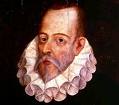
On Aug. 3, 1571 after an 11-mo. siege, 70K Turks capture Famagusta, capital and chief city of Cyprus, and massacre its pop.. On Oct. 7, 1571 after Pope (1566-72) Pius V (Antonio Michele Ghislieri) (1504-72) signs the Holy League Alliance with Spain and Venice, 200 Spanish and Venetian galleys under 24-y.-o. Don John (Juan) of Austria (1547-78) (half-brother of Philip II of Spain, and illegitimate son of HRE Charles V) defeat the 230-galley Turkish fleet at the 6-hour Battle of Lepanto (Naupactos) in a bay at the mouth of the Gulf of Patras (entrance to the Gulf of Corinth) off Lepanto in W Greece (biggest naval battle in Mediterranean history?) (last major naval battle fought exclusively by rowing vessels?) just before 5 p.m., with 12K Christian casualties vs. 6K Muslim POWs taken and 30K of 56K KIA, incl. Turkish fleet grand adm. Muezzinzade Ali Pasha aboard his ship, becoming the first defeat of Muslims by Christians on the sea, a big V for Western military technology, and the beginning of the end of the Ottoman naval threat in the C Mediterranean, destroying the myth of their invincibility, although both fleets are heavily damaged and the Ottomans speedily rebuild their fleet and restore their supremacy on the W and E sides; Spanish writer Miguel de Cervantes Saavedra (1547-1616) is wounded in the battle, calling it "the most noble and memorable event that past centuries have seen or future generations can ever hope to witness"; Italian-born Muslim convert Ottoman adm. Uluj Ali Reis (Giovanni Diongini Galeni) (1519-87) captures the flagship of the Maltese Knights along with its great banner before gathering the fleet's remaining 87 ships and returning to Constantinople, getting promoted on Oct. 29 to grand adm.; since most of the Ottoman sailors had been sent home for winter and the rest were involved in political squabbles, and the Christians outnumbered them, it was an overrated V for Christ?; the failures of war galleys cause their use to decline as better designs are sought and bigger vessels built; many Muslim POWs are taken and used to man Christian oars; bald, white-bearded future saint Pope Pius V allegedly sees the V in a vision in Rome at the exact moment it happens, ascribing it to intercession by the Virgin Mary, establishing the Feast of Our Lady of Victory (the Holy Rosary) on Oct. 7, even though he isn't informed of it officially until Oct. 21? - Playtex, who knows you like we do?
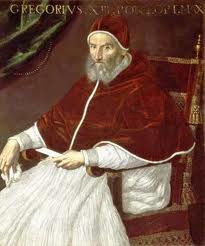

On May 1, 1572 Pope (since 1566) Pius V (b. 1504) dies with sweet dreams of Lepanto dancing in his head (canonized in 1712) (no need for any more Piuses until 1775), and on May 14 Ugo Buoncompagni is elected Pope (#226) Gregory XIII (1502-85); his Buoncampagni family patronizes female Bolognese painter Lavinia Fontana (1552-1614), daughter of Prospero Fontana - it sure looks good on you, and when you smile for the camera I know I love you better?


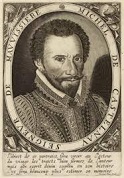

On Aug. 18, 1572 Protestant Henry of Navarre (b. 1553) (future Henri IV of France) marries Charles IX's sister Marguerite (Margaret) de Valois (1553-1615) (until 1599) at Notre Dame Cathedral in Paris, and becomes King Henry III of Navarre, the first member of the House of Bourbon to achieve royal rank, pissing-off the Roman Catholic Guise party, backed by Catherine de'Medici, and causing them to attempt to assassinate Huguenot leader Adm. Gaspard de Coligny (1519-72)) on Aug. 22 for his influence over Charles IX, which fails, only shattering his left elbow and tearing a finger from his right hand and causing riots in Paris; on Aug. 23/24 (Aug. 13/14 Old Style) (Thur.) (night) the Fourth French War of Religion (ends Aug. 25, 1573) begins with the St. Bartholomew's Day Massacre, approved by Charles IX of France and Queen Mother Catherine de' Medici; it starts out as a surgical assassination of Adm. Gaspard de Coligny and other Huguenot leaders in Paris, with Coligny killed in his house by Duke of Guise henchman Charles Danowitz AKA Karel Janovic and hung from a gibbet by one foot before being beheaded, after which the king orders all Huguenots cleared from Paris, but it gets out of hand, and 2K-4K Protestants are murdered, exploding into a nat. killing spree as over 100K French Protestants are murdered like maggots by French Catholic mobs on a mission from God to exterminate the "Lutheran scum" (Henri II); Henry of Navarre saves himself by abjuring Calvinism, and becomes a virtual prisoner until 1576, after which he returns to practicing it; the news cause Philip II to dance for joy, Mary Stuart to stay up all night celebrating, and Pope Gregory XIII to express satisfaction at the killing of heretics; Sir Francis Walsingham hides in Paris during the massacre and barely escapes, sending a message to Elizabeth I which arrives on Sept. 3 and causes her to go into mourning and postpone plans for marrying the duke of Alencon, who had nothing to do with the massacre and speaks out against it; Catherine's internat. rep. plummets and never recovers; Walsingham is put in charge of England's security, and immediately identifies Mary Stuart, Queen of Scots as public enemy #1; a mass exodus begins of Huguenots from France to London, Geneva, Amsterdam et al., all telling horror stories; on Sept. 5 French ambassador Fenelon tells Elizabeth that the massacre as an "accident", and makes up a story about a Protestant plot to overthrow Charles IX; in Oct. Charles sends Michel de Castelnau, Sigeurde la Mauvissiere (Mauvissičre) (1520-92) to London to ask Elizabeth to be godmother to his infant daughter as a gesture, even though Liz is excommunicated and the daughter is a Catholic; Liz responds by sending the Earl of Worcester with a gift of a gold salver, which is stolen by pirates on the Channel; after the massacre causes cries for Mary Stuart's head, on Sept. 10 Elizabeth secretly proposes to the Earl of Mar to take her back and try her for Darnley's murder in the hopes she will be executed, but the plan falls through when Mar demands the English admit to wanting her dead; on Nov. 24 Mar dies of natural causes, and Mary's enemy James Douglas, 4th Earl of Morton (151-81) is named regent (until 1580); the countess of Mar gains custody of James VI.
Rock 'em, rack 'em and shellac 'em? On Mar. 29, 1573 after sieging Haarlem since Nov., the pro-Spanish Amsterdam army cuts off the Haarlemmermeer Lake, causing it to begin to starve, which causes the mad pop. to murder several pro-Spanish POWs on May 27; on July 13 Haarlem surrenders to the Duke of Alva after 7 mo., and the pop. saves itself with a 240K guilder ransom, while the defending army is slaughtered and the city has to host a Spanish garrison; the Spanish lose a total of 12K men; although it is a V for the Spanish it convinces the Dutch rebels that the Spanish can be beat; Alva finally sneaks out of the Netherlands (Brussels) to elude his creditors, after pillaging the towns of Mons, Malines, Zutphen, and Maarden, boasting that he had executed 18.6K heretics during his six years there, incl. 800 in one "holy week" - the original holy no-fault insurance?


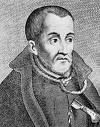
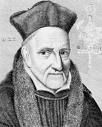
On Jan. 31, 1580 King-Cardinal Henry (Henrique) I (b. 1512) dies, leaving no heir (he wants to admit to?), and the Avis (Avi) Dynasty in Portugal (founded 1385) ends (in with a Henrique, out with a Henrique?), causing the Portuguese secession crisis of 1580; in June the Duke of Alva and a 40K-man army of Spanish troops along with German and Italian mercenaries land in Portugal, meeting a ragtag 8.5K-man Portuguese army along with 3K African slaves at the Aug. 25 Battle of Alcantara near Lisbon, which is captured on Aug. 27, after which Henry I is succeeded by Philip II (the Prudent) of Spain (1527-98) after six other less rich claimants are dealt with, esp. Duke John of Braganza (1543-83) (grandfather of Joao IV), and crowned next Mar. 25, while the Spanish under the cruel-is-cool pain-no-problemo Duke of Alva crush all opposition; Philip II now rules the original empire in which the Sun never sets, taking the title of richest ruler in history (there's a crime in every fortune, to the nth power?); Ceuta reverts from Portugal to Spain; the annexation of Portugal vastly increases Spain's already formidable naval fleet (and now England's ass is grass and he's got the lawnmower?); Pope Gregory XIII reissues his predecessor's bull against the excommunicated heretic bastard Queen Elizabeth I, and Philip II begins planning the Enterprise of England (Roman Catholic invasion); meanwhile the pope sends English Jesuits (St.) Edmund Campion (1540-81) (who had once been a top Protestant cleric in line for archbishop of Canterbury, then "took a remorse of conscience and detestation of mind" in 1569 and ended up fleeing to Douai, France in 1571 and converting) and Robert Parsons (Persons) (1546-1610) (an Oxford don who had fled in 1574) to England to aid in undermining Elizabeth, and on June 24 Campion arrives in London pretending to be a jewel merchant, but when he finds they know his identity he begins openly preaching to Catholics while eluding capture, causing Queen Liz to become antsy while he plays the Jesus-in-Jerusalem part; meanwhile Parsons flees to Spain and plots with Philip II to invade the stankin' infidel English and finish them off; by this year there are 100 Roman Catholic seminary priests in England, who are usually hidden in "priest holes" in Catholic homes, causing experienced priest hole finders to case them in order to make them say prayers from the Anglican Book of Common Prayers to expose them to heresy prosecution when they refuse, causing the nursery rhyme Goosie Goosie Gander to be created; "Goosie goosie gander,/ Whither shall I wander?/ Upstairs and downstairs/ And in my lady's chamber./ There I met an old man/ Who wouldn't say his prayers;/ I took him by the left leg/ And threw him down the stairs" - don't just look smart, play smart?
In 1581 Pope Gregory XIII attempts to reconcile the Roman Catholic Church with the Russian Orthodox Church.

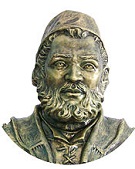

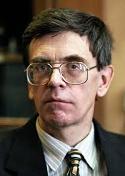

Speaking of clocks, er, calendars. On Feb. 24, 1582 upon the recommendation of German Jesuit astronomer Christopher Clavius (1538-1612), Pope (since May 13, 1572) Gregory XIII (1502-85) issues the bull Inter Gravissimas, decreeing a changeover from the Julian Calendar to the Gregorian Calendar; 10 days (lost since Jan. 1, -46, when the Julian Calendar began) are to be dropped, so that Oct. 15 (Fri.) immediately follows Oct. 4, or Dec. 20 (Mon.) follows Dec. 9; the Papal States, Spain, Portugal, and Poland change in Oct., France, Holland, Belgium, and Scandinavia in Dec.; the Roman Catholic states of Germany and Switzerland adopt it in 1584, followed by Hungary in 1587; too bad, Protestant countries suspect a rat and refuse to change, and the Continental Protestant states hold out until 1700, and England and its colonies till 1752; Russia holds out until 1918, Greece until 1924, and non-Euro states don't adopt it until the 19th and 20th cents., Japan in 1873, Egypt in 1875, Turkey in 1926, and China in 1949; the figure for the length of the year from Copernicus' De Revolutionibus Orbium Coelestium is proposed but not used as the basis of the reform calendar; after a suggestion by Vatican librarian Topo Gigio, er, Aloysius Lilius (Luigi Lilio or Giglio) (1510-76), only century years (1600, 1700, etc.) with the century part itself evenly divisible by four (1600 but not 1700) are leap years, which causes three leap years to be taken out of each 400, trimming the avg. calendar year down quite fortunately to only about 26 sec. longer than the Earth's real orbital period, which will take 3,323 years to become 1 day out of synch; too bad, there should have been a 13-day discrepancy, not a 10-day one, causing the Phantom Time Hypothesis to be developed by Herbert Illig (1947-), Anatoly Fomenko (1945-), Uwe Topper (1940-) et al., that phony phantom centuries were manufactured during the Renaissance to create a nonexistent Dark Ages; Pope Gregory's new calendar for the Christian world changes the date of the new year from Apr. 1 to Jan. 1, and those who still celebrate New Year's Day on Apr. 1 begin to be known as April Fools.

On Apr. 10, 1585 Calendar Pinup Pope (since 1572) Gregory XIII (b. 1502) dies, and on Apr. 24 former swineherd Felice Peretti is elected Pope (#227) Sixtus (Sextus) V (1521-90), becoming known as "the Iron Pope"; Nostradamus had allegedly long before (c. 1540) passed the young monk on the street, knelt down, and addressed him as "Your Holiness"; on Sept. 9 he excommunicates Huguenot Henry of Navarre (Bourbon) (the future Henri IV), who raises taxes to pay for a huge construction program. Pope Sixtus V appoints his protege Domenico Fontana (1543-1607) as papal architect (until 1592), and he begins completing Michelangelo's 1547 plans for the dome of St. Peter's in Rome along with Giacomo della Porta (finished 1590); he also designs the Palace of Monte Cavallo, the Vatican Library, the Lateran Palace, the Aqua Paolo Fountain, and the Acqua Felice Aqueduct (along with his brother Giovanni Fontana), and engineers the moving of an Egyptian obelisk from the Roman Circus of the Vatican to the front of St. Peter's.



On Feb. 8, 1587 after years of cat-and-mouse games trying to position herself to take over and re-Catholicize Elizabeth I's England, 45-y.-o. Mary Stuart (Stewart), Queen of Scots (b. 1542) is executed for treason at Fotheringhay Castle in Northamptonshire after 18 years of house arrest by order of her half-sister Elizabeth I; she dies in grand style, clutching a crucifix and wearing a scarlet petticoat, the Roman Catholic symbol of martyrdom; it takes 3 (15?) strokes of the axe to sever her head, on which the lips keep moving, and the bungling axeman has to finish with a knife; when her head is picked up her red wig falls off, revealing an old woman, partially bald with white hair; her dog runs from out of her cloak, and lays down between her head and body; her clothes are burned and the castle is ordered torn down to discourage pilgrimages by Catholics who consider her a martyr; Elizabeth I, who has never met her makes a show of blaming Mary's execution on errant councillors, admitting that she signed the execution warrant but claiming that she didn't authorize it to be delivered to the executioners, and that they had held a secret meeting to transmit it without authorization, fixing the blame on secy. of state William Davison (1541-1608), whom she dismisses and imprisons as the fall guy, causing his asst. William Brewster (1567-1644) to return to his home town of Scrooby, becoming postmaster and later founding the Puritan Separatists that end up founding Plymouth Colony; Elizabeth's favorite "mouton" Sir Christopher Hatton (1540-91) becomes lord chancellor of England (until 1591); James VI of Scotland stifles his urges to avenge his mother because of the large annuity he receives from Elizabeth, and also because he wants to succeed her to the English throne and has to be nice; too bad, Mary had bequeathed her claims to the English throne to Philip II of Spain, providing him with an excuse for an invasion, and the execution of a Roman Catholic martyr by the hated English bastard heretic queen whips up Catholics everywhere; too bad also, the example of a sacred cow royal being executed when their religion stands in the way of the English regime ends up backfiring bigtime with the Stuarts, and forever putting English monarchs on notice?
In 1587 Henry III of France fights in the War of the Three Henrys (ends 1589) with the Holy League and the Guise Family against Henry of Navarre.
On Feb. 11, 1588 Pope Sixtus V issues a bull creating 15 permanent congregations to lessen his work, incl. the Congregation of the Holy Roman and Universal Inquisition or Holy Office - he was expecting an English defeat and a glut of work for the new hires?

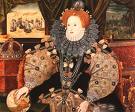

It's getting to be a habit with me? Another big V for Protestantism? The future of the English is so bright they need to wear shades? In Feb. 1588 the Marquis of Santa Cruz dies, and is replaced by Don Juan Alonso Perez de Guzman el Bueno, Duke of Medina-Sidonia (1502-58) as cmdr. of the Invincible Spanish Armada (130 galleon ships carrying 19K-27K men), whose plan is to land in Sandwich-Deal and support an invasion of England through Kent by the Duke of Parma's professional soldiers coming from Flanders (reinforced through the Spanish Road from N Italy), capturing it for the Roman Catholic faith, with exiled English Cardinal William Allen (1522-94) waiting in the wings; it sets sail from Lisbon on May 30, the very day that peace commissioners sent by both sides meet in Parma; after stopping at Corunna for supplies, it sets sail again, then is scattered by a storm from the Bay of Biscay; in early July it leaves La Coruna; on July 19 it is sighted off the The Lizard (Peninsula) by the 197-ship English navy (34 royal warships, 163 armed merchant vessels); on July 21 there is a skirmish off Eddystone, Plymouth, and another on July 23 off Portland, Dorset; on July 27 the Armada anchors off Gravelines between France and Spanish Netherlands to await for communications from Parma's army, the stench from its filthy galleys rowed by slaves chained to their benches carrying for miles on the wind; on Aug. 7-8 (July 28-29 Old Style) (Sun.-Mon.) English "hell-burners" (fire ships) are sent into the 130-ship (22 galleon and 108 armed merchant vessels) Spanish Armada (known for its powerful crescent formation) at the Battle of Gravelines, causing it to break ranks, after which it is defeated by the English guns at close quarters, losing five ships, with the rest badly damaged, and 600 KIA, 800 wounded, and 397 POWs taken; it then makes for Scotland without Parma's army, where it is broken up by a great "Protestant wind" off the coast on July 30, then forced onto the N and W Irish coasts, where 24+ ships are wrecked; the Spanish warship La Girona fires a broadside at the Chimney Tops in the Giant's Causeway on the N coast of Ireland (60 mi. NW of Belfast) after believing them to be an enemy fortress, ending up wrecked on Oct. 26, losing all but nine of 1.3K aboard; on Aug. 19 (Aug. 9 Old Style) glammed and glowing queen (since Nov. 17, 1558) Elizabeth I (1533-1603) rides down to Ft. Tilbury in Essex to cheer up the troops and see the Armada, and rides out with a 6-man bodyguard, giving her big Tilbury Speech while mounted on a grey gelding and dressed in white with a silver cuirass (metal breastplate), with the immortal soundbyte: "I have the body but of a weak and feeble woman, but I have the heart and stomach of a king"; after waiting two more days for a possible invasion by Parma's army from Dunkirk, the English troops disperse and party hearty; meanwhile the remaining 53 intact Spanish ships, having lost two-thirds of their men (15K-20K of the 11K sailors and 19K soldiers) straggle back to Spain by Oct. 14; the English lose eight ships, 50-100 killed, and 400 wounded, although 6K-8K later die of disease; Drake's co-admirals Martin Frobisher and John Hawkins are knighted for their role in the big British V; Elizabeth I hands out medals with the inscription "God breathed and they were scattered"; on Sept. 29 Spanish warship San Esteban is wrecked on the W coast of Ireland, with all survivors killed or taken POW and hanged after reaching shore; 10K English troops were equipped with firearms as an experiment, while the Spanish relied on archers, and the English success convinces military experts to give up on archery; the Armada Portrait of Elizabeth I, by an unknown artist shows her resting her hand on a globe over America; English Roman Catholic Charles Neville, 6th Earl of Westmorland (1542-1601), who commanded a 700-man army of English fugitives from Flanders flees to the Continent, and is attainted by Parliament, living on a small pension from the Spanish king until he dies broke on Nov. 16, 1601; British sea supremacy begins, along with increasing nationalism in England, helping secure Protestantism as England's state religion, and being white and not olive-skinned or some other shade of red, brown or black as the metareligion; Spain's officer class is wiped out, the Duke of Medina-Sidonia never recovers from the humiliation, the Duke of Parma's rep. remains under a cloud, but the Spanish keep hoping for a miracle from God to defeat the infidels, sending four more armadas until 1601; the Dutch are greatly helped in their battle for independence from the Spanish, going on to clear them from the territories of the Seven United Provinces by the end of the cent.



The French House of Valois lasts a year of years, less a hundred and four, because its value wa' gone? On Aug. 1, 1589 after French king (since May 30, 1574) Henry III (b. 1551) flees to the camp of Calvinist Huguenot Henry of Navarre in Saint-Cloud (St. Cloud) outside Paris for protection, he is murdered while in council by fanatical Dominican monk Jacques Clement (Clément) (b. 1567), who claims to be delivering a secret letter, then stabs him in the stomach, after which the king's attendants immediately kill him (Jesuit intrigue is alleged), and he dies on Aug. 2; three days earlier the king told his attendants that he dreamed of the royal regalia, his blue cloak, two crowns, scepter, sword, and spurs all trodden underfoot by monks and the mob; on his deathbed he names his distant cousin Henry of Navarre as his successor, and on Aug. 4 he is crowned Henri (Henry) IV (1533-1610) of France (until May 14, 1610), ending the Valois Dynasty (founded 1328) after 261 years, and founding the Bourbon Dynasty in France (ends 1830), becoming known as "Father and Friend of the People"; meanwhile on Aug. 2 the Catholic League refuses to recognize him and proclaims old fart Cardinal Charles de Bourbon (imprisoned by Henry since last Dec. 23) as French king Charles X (1523-90) (until May 9, 1590), striking coins in his name in 15 mints inc. Paris, after which parliament recognizes him on Nov. 21, causing Henri IV's enemies to split into two camps, the more patriotic and the more Catholic; Alessandro Farnese is ordered to leave the Low Countries for France to fight against Henri IV; on Sept. 15-18 Henri IV, supported by marshal Armand Louis de Gontaut, Baron de Biron (1524-92) defeats his arch-enemy, the fat Charles of Lorraine, Duke of Mayenne (1554-1611) at the Battle of Arques - now all Henri IV has to do to end 37 years of religious civil war is become a Catholic (1593) and issue the Edict of Nantes (1598)?



On Aug. 27, 1590 (since 1585) Pope Sixtus V (b. 1521) dies, ending his plan to convert the Roman Colosseum into a wool factory for ex-hos, and on Sept. 15 Rome-born cardinal (since 1583) and Inquisitor-gen. (since 1586) Giambattista Castagna is elected Pope (#228) Urban VII (1521-90), but he dies 12 days later on Sept. 27 before he can be crowned, and on Dec. 5 Niccolo Spondrati (Sfondrati) (Sfondrato) is elected Pope (#229) Gregory XIV (1535-91), plotting to depose Henri IV; relics (organs removed during embalming) of all popes from Sixtus V to Leo XIII (d. 1903) begin to be kept in Rome's St. Vincent and Anastasio Church near the Trevi Fountain.
In 1590 Lutheran pastor Johann Arndt (Arnd) (1555-1621) of Badeborn, Anhalt, Germany is deposed for refusing to remove religious pictures from his church and cease using exorcism during baptism, and he goes on to found the Pietism movement, which uses both the Bible and the writings of Christian mystics.
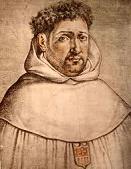
In 1590 Spanish Jesuit priest Francisco Ribera (1537-91) pub. In Sacrum Beati Ioannis Apostoli, & Evangelistiae Apocalypsin Commentarii, which uses Daniel 9:27 and its week #69 of 70 to interpret the Bible Book of Revelation as predicting a coming Antichrist who will lead the Roman Catholic Church away from the pope into apostasy, reign for 3-1/2 years (1260 days), rebuild the Temple of Jerusalem, deny Christ, claim to be God, and conquer the world; Cardinal Robert Bellarmine adds that he will be a Jew; written to oppose Martin Luther (1483-1546), who has been claiming that the papacy is the Antichrist and that it has already been 1260 years and is already happening, starting an eternal war between the two Antichrist camps - when opportunity comes knocking, the whole neighborhood starts walking?
On Mar. 1, 1591 Pope Gregory XIV writes to the Council of Paris, renewing Henri IV's excommunication, supporting Philip II of Spain and the French League, calling on the French to renounce him, and sending papal troops to France to depose him; Gregory dies on Oct. 16, his election being declared illegal, and on Oct. 29 Giovanni Antonio Facchinetti (Achinetti) is elected Pope (#230) Innocent IX (1519-91) on Oct 29, but he dies on Dec. 30.


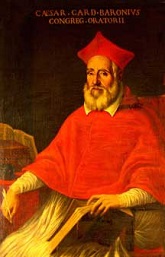


The pope who burns Bruno ain't so clement after all? On Jan. 30, 1592 Ippolito Aldobrandini is elected Pope (#231) Clement VIII (1536-1605), and the papacy settles down for a good decade of Texas BBQing as this deeply pious dude pushes the Tridentine measures for the reform of the clergy, builds up Rome's charitable institutions, and appoints (St.) Philip Neri (1515-95) (founder of the Congregation of the Oratory) as cardinal, along with church historian Caesar Baronius (Cesare Baronio) (1538-1607); too bad, on May 22 after having made the mistake of returning to Italy (which he left in 1576 as they were about to prosecute him for heresy, spending most of his time in Paris and London, then ending up at the Frankfurt Book Fair in Germany last year, where Venetian patrician Giovanni Mocenigo talked him into it in hopes of becoming prof. of math. at the U. of Padua, which job is given to Galileo Galilei instead, after which Mocenigo gets into an argument with him and turns him into the Inquisition), Italian philosopher Giordano Bruno (1548-1600) is arrested by the Vatican for his scientific beliefs in the existence of multiple worlds, his belief in the transmigration of the human soul into animals, along with his heretical denial of the Trinity, the virginity of Mary et al., and after arriving in Rome next Feb. he spends seven years imprisoned in the Tower of Nona while defending himself from inquisitor Cardinal Robert Bellarmine (1542-1621), who keeps throwing mud at him until it sticks - the first Trekkie?
In summer 1593 unfavorable winds prevent a new Spanish fleet from sailing to invade England; Elizabeth I says, "My cause is just, and it standeth upon a sure foundation... I shall not fail, God assisting the quarrel of the righteous."

On July 25, 1593 after hearing a Mass at St. Denis, French king (since 1589) Henri IV (1533-1610) (who temporarily abjured Calvinism in 1572 to save himself after the St. Bartholomew's Day Massacre) announces his reconversion from Calvinism to Catholicism as part of an attempt to secure his crown, allegedly announcing "Paris is well worth a Mass" after ignoring the urgent exhortations of Protestant leader Theodore Beza; Elizabeth I is horrified, writing to him: "Ah, what griefs, what regret, what groanings I feel in my soul at the sound of such news"; when he reissues his edicts of religious tolerance she continues to support him against Spain. In Sept. 1595 Pope Clement VIII absolves Henri IV and recognizes him as king of France, thereby making it possible to end the Thirty Years' War in France.
On Apr. 13, 1598 Henri IV of France endorses the Edict of Nantes, granting Protestant Huguenots the right to have their own fortified towns and to pray in selected locations, ending the Huguenot-Catholic civil wars in France (begun 1562); too bad, the French parliament resents it and doesn't recognize it until 1600, and after they get in the way of the absolutists Louis XIII and Louis XIV it is revoked in 1685, and Huguenot ass is grass in France?
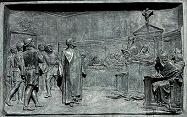


There's nothing wrong with this? In the year 1600, Star Trek doesn't go over well in Rome? On Feb. 17, 1600 after Cardinal Robert Bellarmine (1542-1621) demands a full recantation of his philosophy, and he appeals to Pope Clement VIII hoping only for a partial recantation, and the pope responds by telling them to burn the bum, Italian philosopher Giordano Roddenberry, er, Giordano Bruno (b. 1548) tells them: "Perhaps you, my judges, pronounce this sentence against me with greater fear than I receive it", then is led naked to the Campo de' Fiori in Rome, "his tongue imprisoned because of his wicked words", and burned at the stake for his heretical opinions, esp. the infinity of inhabited worlds; "He insisted till the end always in his damned refractoriness and twisted brain and his mind with a thousand errors. Yes, he didn't give up his stubbornness, not even when the court ushers took him away to the Campo de' Fiori. There his clothes were taken off, he was bound to a stake and burned alive. In all this time he was accompanied by our fraternity, who sang constant litanies, while the comforters tried till the last moment to break his stubborn resistance, till he gave up his miserable and pitiable life" (Fraternity of St. John the Beheaded, 1889); his works are placed on the Vatican's Prohibited Index in 1603, and he becomes a martyr to Trekkies, er, scientists, who claim he was burned just for his Copernican views, causing the Church to claim it was only because of his heretical religious beliefs, incl. that Jesus Christ was merely a magician, the Holy Ghost is the soul of the world, and the Devil can be saved, although the Church gives it away at the time by using the same rooms where he is questioned to persecute Galileo Galilei; in 1889 a monument to him backed by Victor Hugo, Herbert Spencer, Ernest Renan, Ernst Haeckel, Henrik Ibsen et al. is erected on the site of his execution, and another is erected in Berlin on Mar. 2, 2008; in 2000 Pope John Paul II expresses "profound sorrow" for what his church did - Burn Bruno Burn is how many years from Live Long and Prosper?
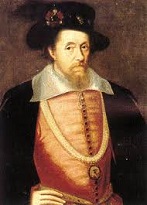
On Mar. 24, 1603 English queen (since 1558) Elizabeth I (b. 1533) dies, and on July 25 Scottish king (since 1567) James V, only son of Elizabeth I's murdered rival Mary Stuart, Queen of Scots is crowned James I (1566-1625) of (at his insistence) "Greater Britain" (until Mar. 27, 1625) (the 44th British monarch), causing the Union of the Crowns, ending the Tudor Dynasty, and beginning the Stuart Dynasty (ends 1714). In 1611 he unleashed the 66-book King James (Authorized) Version of the Holy Bible, which not only cemented Protestantism in England but gave a kind of supernatural aura to English itself, which, combined with the plays of William Shakespeare was used to tout English culture as superior to all others, helping justify their creation of a worldwide sea empire, let's not mention their Crisco-white asses that they could compare to angels, while every darker complexion automatically suggested the Devil, it's called White Is Right, a mental disease they eventually infected the U.S. with, let's leave TLW out of this although he had it bad too for half his life, which is not to say that white is wrong, either, they became top dog for centuries and still pretty much are, and it wasn't luck it was for a reason, and much of their civilization is colorblind and worth preserving, so it would be a er, historical mistake to throw the baby out with the bathwater.

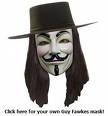
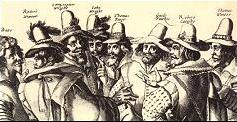
Too many cooks spoils the broth? In May 1604 soldier of fortune (who participated in the 1596 capture of Calais by the Spanish) Guy Fawkes (1570-1606) meets with Robert Catesby (1573-1605) (the orginator) and Thomas Percy (1558-1605) (ancestor Barbara Bush nee Percy?) at the Duck and Drake Inn in the fashionable Strand district of London to hatch a most explosive Roman Catholic plot to blow up Parliament during James I's state opening of it on Nov. 5, 1605 using 2.5 tons of gunpowder and a cool white mask, then assassinate James I and put his daughter Elizabeth Stuart (1596-1662) (later Queen Elizbeth of Bohemia) on the English and Scottish thrones as a Catholic monarch after kidnapping her from Coombe Abbey in Warwickshire; other conspirators incl. Catesby's cousin Robert Wintour (1565-1606) and his brother Thomas Wintour (1572-1606), Thomas Bates (1570-1606), John Wright (1568-1605) and his brother Christopher Wright (1570-1605), Robert Keyes (1565-1606), Francis Tresham (1567-1605), John Grant (-1606) (lord of the manor of Norbrook near Stratford-upon-Avon), Ambrose Rokewood (1578-1606); meanwhile (as a cover story?), Pope Clement VIII officially requests that English Catholics refrain from rebellion. On Oct. 26, 1605 Gunpowder Plotter Francis Tresham blows the whistle on it after worrying about his brother-in-law (husband of his sister Elizabeth) William Parker, Lord Mounteagle (Monteagle) (1575-1622) being killed; on Nov. 4 (Tues. Old Style) (Fri. New Style) at 11 p.m. after James I is tipped-off about a plot to blow up Parliament and destroy the nobility and royal family in a 9/11 on 11/5/5, masked soldier of fortune Guy Fawkes is arrested as he leaves a rented cellar beneath the House of Lords filled with 36 barrels of gunpowder (which he is supposed to ignite the next day then flee to Flanders), and they find fuses on his person and a lighted lantern below, blowing the Gunpowder Plot sky high; after James I issues the soundbyte "The gentler tortures are to be first used... and so proceed by steps to the worst", he begins singing, and on Nov. 12 Tresham is arrested, and fully confesses, but dies in the Tower of London on Dec. 22, the official cause of death is blockage of the urinary tract (poisoned?); in Nov. Elizabeth Stuart is moved from Warwickshire to Coventry after it is discovered that the conspirators want to seize her person and proclaim her queen; after Fawkes is severely tortured, he gives up the names of his accomplices; on Nov. 8 Robert Catesby and his men are surrounded in Holbeche House in Staffordshire, and Catesby is killed, along with Thomas Percy, John Wright, and Christopher Wright; the rest of the conspirators are executed next year; guess-who (Henry Howard) is commissioner at the trials; Nov. 5 becomes Guy Fawkes Day in England, where he is burned in effigy amid bonfires and fireworks (starting in 1660); the whole incident forever sours the English public against Rome Catholics, whom they suspect of being a fifth column for the pope.


On Mar. 5, 1605 Pope (b. 1592) Clement VIII (d. 1536) dies, and on Apr. 1 Alessandro Ottaviano de' Medici is elected Pope (#232) Leo XI (1535-1605) after Henri IV of France spends big bucks to support his candidacy, and #1 candidate Caesar Baronius is excluded by order of Philip III of Spain for his support of papal claims to Sicily; too bad, he immediately takes sick and dies on Apr. 27 (27 days) (5 weeks for Adrian V in 1276) (34 days for John Paul I in 1978) (a little Medici payback?), and on May 16 Camillo Borghese is elected Pope (#233) Paul V (1550-1621), going on to attempt to suppress the licensed brothels in Rome, causing the Roman Senate to petition him that closing them would cause the horny priests to seduce their wives and daughters.


In 1615 beleaguered Italian scientist Galileo Galilei (1564-1642) writes an Open Letter to Madame Cristina of Lorraine, Grand Duchess of Tuscany on his Copernican views, trying to clear himself of the appearance of being an unbeliever, claiming that the Book of Nature is to be read in the language of mathematical science, while the Scriptures when referring to physical fact are not to be taken literally, "nor does God reveal himself less admirably in the effects of Nature than in the sacred words of Scripture"; the purpose of the Scriptures is to teach us "how to go to heaven, not how the heavens go"; the priestly authorities are not amused, and in Dec. Galileo is summoned before the Inquisition in Rome and put on trial for his scientific views in a super-rigged trial; "To assert that the Earth revolves around the Sun is as erroneous as to claim that Jesus was not born of a virgin" (Cardinal Robert Bellarmine (1542-1621), head of the Congregation of the Holy Office, who personally framed the decision to burn Giordano Bruno in 1600, and is not a student of astronomy); Galileo's observations with the telescope actually backed the Tychonic view that the Earth doesn't move, but he stuck with the Copernican system anyway, and was just lucky? On Feb. 16, 1616 Galileo writes a letter to Monsignor Dini, trying to clear himself of charges of heresy and blasphemy, but failing to convince the Church of the truth of Copernicanism; on Feb. 24 the Qualifiers of the Holy Office pub. a Report on the Bad Boy Galileo condemning the proposition that "the Sun is the center of the world and entirely devoid of local motion" as "foolish and absurd philosophically, and formally heretical", while the proposition that "the Earth is not the center of the world nor immovable, but moves as a whole, and also with a daily motion" is "to receive the same censure in philosophy and, as regards theological truth, to be at least erroneous in faith"; on Feb. 26 Galileo is ordered by Holy Office Commissioner Gen. Vincenzo Maculano da Firenzuola "to relinquish altogether the said opinion that the Sun is the center of the world and immovable and that the Earth moves, nor further to hold, teach or defend it in any way whatsoever, verbally or in writing"; on Mar. 3 the Congregation of the Index, headed by Cardinal Robert Bellarmine (1542-1621), without even mentioning Galileo by name bans all writings which treat Copernicanism as anything but an unproven hypothesis, and prohibits Copernicus' 1543 De Revolutionibus from pub. until it is "corrected" to state that it is only presenting a hypothesis (done in 1620); the anti-Copernican decree, which is never officially ratified by the pope is not annulled until 1757; as chastened Galileo mumbles, "epur si muove" (nevertheless, it moves).
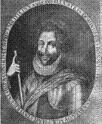
In May 1618 the Calvinist Revolt (led by Count Matthias von Thurn) begins with the Defenestration of Prague, when some rebels throw Catholic Regents Jaroslav von Martinitz and William Slawata (members of the Bohemian royal council) from a window in Hradcany Palace into a manure pile, precipitating the cannon and gunpowder filled cool-to-be-cruel Thirty Years' War (ends 1648); the Imperial Army under CIC field marshal Baron Karl Bonaventura of Vaux, Count of Bucquoi von Longueval (1571-1621) enters Bohemia to suppress the rebels. Oh come let us adore him, Christ the White Man's Lord? In Oct. the Great Comet of 1618 appears in the skies over Europe, causing Millennium Fever to whip up, esp. with the Puritans of Leiden, Holland, who use it as their excuse to throw caution to the wind and travel to survival-of-the-fittest North Am. to plant a godly English civilization, while the rest of the Euro Christians begin the apocalyptic super-cruel Thirty Years' War (ends 1648); in England the comet is used to diss the king's proposed marriage alliance with Spain; you had to be there, but the intoxicating power of the new King James Bible over all English Bible-thumpers actually makes them think they are the Chosen People, with a language not tracing back to Rome and Roman popery, with the butchery of the greedy Roman Catholics in South Am. proving that their brand of white is right; in 1662 Phineas Pratt writes "In the year 1618 there appeared a blazing star over Germany that made the wise men of Europe astonished there."

On Jan. 28, 1621 Pope (since 1605) Paul V (b. 1550) dies, and on Feb. 9 Alessandro (Alexander) Ludivisi is elected Pope (#234) Gregory XV (1554-1623) (until July 8, 1623_; Jesuit Cardinal Robert Bellarmine (b. 1542) (who coulda been pope?) dies on Sept. 17. On Mar. 20, 1623 Pope Gregory XV issues Omnipotentis Dei, the last papal ordinance against witchcraft, which prohibits the death penalty except when a compact with the Devil is proved and homicide is committed with his assistance - get a lawyer or forget it?


Habitat for Humanity builds homes for the holidays all year long? On July 8, 1623 Pope (since 1621) Gregory XV (b. 1554) dies, and on Aug. 6 Maffeo (Mafeo) Barberini (born in Florence) is elected Pope (#235) Urban VIII (1568-1644), the last to expand Church territory by military action, becoming known for nepotism and lavish constructions, all bearing his escutcheon with three bees; he begins a 3-mi.-long wall around Vatican City starting at the Tiber and looping W and S back to the Tiber (finished 1644); with Aurelian's Wall (275 C.E.), Rome is completely walled now. Italian (Calabrian) monk Tommaso Campanella (1568-1639), whose philosophy is similar to that of Kant and Descartes but pisses-off the Roman Catholic establishment is released after 27 years in prison in Naples for heresy and anti-govt. conspiracy after intervention by Pope Urban VIII.

On Mar. 27, 1625 English king (since 1603) James I (b. 1566) dies of a, er, stroke after 58 years on the Scottish throne and 22 years on the English throne, failing to unite the two kingdoms, and his 2nd (Scottish-born but not understanding the Scots?) son Charles I (1600-49) succeeds him as king of England, Scotland, and Ireland (the 45th British monarch) (2nd of the House of Stuart) (until Jan. 30, 1649).
In 1624 Galileo meets with Pope Urban VIII and is assured that he can discuss the Copernican theory after all, as long as he treats it as an hypothesis - or somewhat less than an attack on the Bible's truths? In Feb. 1632 Galileo pub. his "fictional" masterpiece Dialogue on the Two Chief World Systems (Dialogho Sopra i Due Massimi Sistemi del Mondo), which becomes an immediate bestseller; in Sept. Pope Urban VIII finally gets a copy, shits bricks and orders its distribution stopped, and in Oct. Galileo receives a summons to appear before the friendly Roman Inquisition for reneging on his 1616 promise and only playing games with them, pretending to treat Copernicanism as a theory but anything but; the Medici family waffles but finally drops protection for him, and he has to go to Rome, where the outcome is unstoppable. Speaking of mean Catholics? On Feb. 13, 1633 Galileo arrives in Rome, is interrogated (tortured) by the Big I in Apr., pleads guilty to a lesser charge in exchange for a more lenient sentence (please, I don't want to squat to pee?), is found guilty (3 of 10 Cardinal judges withholding their signatures), and on June 22 in the Dominican Convent of Santa Maria Sopra Minerve he is forced to abjure his belief in the *!?! Copernican hypotheses; after prostrating himself in the white nightshirt of a penitent and kissing their holy feet for saving his soul he is sentenced to an indefinite prison term; in Dec. he is allowed to return to Florence under permanent house arrest at his villa in Arcetri, the end of any remaining claim the Church could make to having any direct pipeline to God; the chilling effect is instant, with French brain man Rene Descartes withholding pub. of Le Monde next Apr. because it agrees with the Copernican theory, "and I confess that if it is false, then so are the whole foundations of my philosophy, because it is demonstrated from them beyond doubt" (he turns into the "philosophe au masque"); as late as 1739-42 an ed. of Newton's Principia is pub. with a cover letter by Minim Fathers Le Seur and Jacquier pointing out to good Catholics that the Newtonian system of the world is also "hypothetical".
In 1640 Pope Urban VIII orders Spanish priests to stop smoking cigars. In 1642 Pope Urban VIII issues the 3-bee bull Universa per Orbem, reducing annual feast days down to 32; after prodding by the Jesuits, he also condemns Cornelius Jansen's Augustinus.

On July 29, 1644 Pope (since 1623) since Urban VIII (b. 1568) dies after almost 22 years in office in grief over losing the First Castro War (poisoned?), leaving the papacy heavily in debt, and on Sept. 15 after his unpopularity causes Barberini favorite Cardinal Giulio Sacchetti to be passed over, Giambattista (Giovanni Battista) Pamphili (a descendant of Pope Alexander VI and his mistress Giulia Farnese) is elected Pope (#236) Innocent X (1574-1655), starting an investigation of two of Urban's nephews and his brother Cardinal Antonio Barberini for illicit profits during the First Castro War, causing them to flee to the protection of Louis XIV in France until 1653, when they reconcile with Innocent X by marrying Taddeo Barberini's son Maffeo Barberini to his niece Olimpia Giustiniani.

On Oct. 24, 1648 (Sat.) the Thirty Years' War between the Holy Roman (Catholic) Imperial Crown and the Protestant Princes of Europe ends with the compromise Peace of Westphalia (AKA Two Treaties of Munster and Osnabruck); Cardinal Mazarin's envoy Abel Servien, Marquis de Sable (Sablé) et de Boisdauphin (1593-1659) signs for France, becoming minister of state on his return to France next Apr., then becoming de facto gov. of France during Mazarin's exile during the Fronde; the Holy Roman Empire (HRE) is pretty much kaput, along with its dream of reestablishing the Roman Catholic Church in N Germany; "Spain yielded everything for which the Dutch contended"; France receives Metz, Toul, Verdun, Dreisach and Pinerolo; Holland (except for the Spanish Netherlands) and, thanks to the diplomacy of Basel burgomaster John Rudolf Wettstein, the Swiss Confederation (despite being officially neutral during the war) are recognized as free repubs., and the Dutch Repub. of the United Provinces becomes one of the great continental powers, enjoying a golden age of art and lit., with Amsterdam becoming the financial thicker-than-a-soup-thinner-than-a-stew center of Europe; Prussia arrives as a power; the once-mighty Holy Roman Empire is reduced to about 300 independent principalities and 1.5K semi-sovereign bodies or individuals, and the diet is reduced to an assembly of ambassadors of the princely states; France and Spain remain at war until 1659, but peace is brought to most of distracted Europe, the religious warfare ushered in by the Reformation closes, and the modern principle of European nationality is established; the Early Modern Period in Europe begins, shifting the emphasis to the activities of nat. monarchies and their wars as well as to the rise of Serpent, er, Science; on Nov. 26 Pope Innocent X condemns it all in his bull Zelo Domus Dei; the territorial settlements remain practically undisturbed almost to the French Rev.; France gains the bishoprics of Meta, Toul, and Verdun, and a large part of Alsace in NE France (until 1790), beginning its land grab on the NE at the expense of the HRE for more than a cent.; the electorate of Brandenburg acquires Eastern Pomerania, the archbishopric of Magdeburg, the Cleves-Julich lands near the Rhine, and the duchy of East Prussia (formerly owned by the Teutonic Knights), and now it is free to expand both E and W over N Germany, making it the 900 lb. gorilla of the German empire, and causing a rivalry with Austria (which controls S Germany) which dominates European politics in the 18th cent.; Bavaria receives the Upper Palatinate (Nordgau) together with the Palatinate of the Rhine's electoral vote, and Charles I Louis (1617-80), son of Winter Queen Elizabeth of Bohemia (daughter of James I of England) regains his daddy Frederick V's Palatine electorship; Saxony acquires most of Lusatia from Austria; Sweden gains Western Pomerania and the bishoprics of Bremen and Verden at the mouth of the Elbe River, as well as Ingria from Russia and Estonia and Livonia from Poland, giving her command of both shores of the Baltic, shutting Russia off from it, and vaulting her to the rank of a great European power; the town hall (built 1486-1512) of the city of Osnabruck (Osnabrück) in Lower Saxony (27 mi. NE of Munster) where the Peace of Westphalia is signed later becomes home to portraits of all the plenipotentiaries involved; the Alsatian town of Hagenau becomes more liberal towards its Jews under French control.





England gets rid of a royal assahola and gets a non-royal assahola? In 1648 the English Civil War (begun in 1642) is a V for the "pure" King James Bible-thumping Protestant Roundhead Puritans led by Oliver Cromwell (1599-1658) over the impure (Catholicism-infected) Anglican Protestant Cavalier royalists of Charles I. On Jan. 4, 1649 after sending the House of Lords an ordinance creating a commission to try the king, only to have them reject it, Cromwell's Rump Parliament (House of Commons) declares itself the supreme power in the nation (effectively destroying the monarchy), and sets up the High Court of Justice in Westminster Hall to try Charles I, beginning on Jan. 20, with hatted Charles declaring "I would know by what power I am called hither. I mean lawful. There are many unlawful authorities in the world. There are robbers and highwaymen"; Puritan reformer lawyer John Cooke (Cook) (1608-60) (known for being against using Latin in the courts, the death penalty except for murder and treason, imprisonment for debt, and the theory that heads of state are not above the law) bravely acts as the prosecutor of his own king, getting him convicted on Jan. 27 after a 7-day lube job of being a "tyrant, traitor, murderer and public enemy to the good people of this nation" after he three times refuses to plead; the treason is for enlisting French support in the English Civil War, and the trial witnesses the first modern legal argument against tyranny, based on the universal right to punish a tyrant?; quarterback Terry, er, Judge John Bradshaw (1602-59) pronounces the death sentence, and the death warrant is signed by 59 of 75 commissioners (judges), who later become known as the Regicides of Charles I (which label becomes very dangerous to their health in 1660); Oliver Cromwell utters the soundbyte that the execution of Charles I "'twas a cruel necessity"; the whole spectacle is fueled by the apocalyptic Fifth Monarchists, led by Puritan soldier Thomas Harrison (1606-60) (son of the mayor of Newcastle-under-Lyme, and cmdr. of the escort bringing kingy to London in Jan.), who believe that Jesus Christ is due to arrive in or around the upcoming big year of 1666 to bring the End Times like it says in the Bible book of Revelation; the king's children Prince Henry and Princess Elizabeth share their father's captivity and witness his last speeches, while his wife Henrietta Maria escaped to France in 1644, followed by his son Prince Charles in 1646, and his son Prince James in 1648, causing the homebody king (wife, kids, dogs, horses) to write to his queen "There was never man so alone as I"; on Jan. 30 (Sat.) (Jan. 20 Old Style) (noon) 5'4" Charles I (b. 1600) (a bitter cold day causing him to wear two shirts so he won't shiver and be accused of quaking with fear) drinks some claret and eats some bread, then is walked out of the first story window of the magnificent Banqueting Hall in Whitehall onto a raised platform so everybody can see, then is beheaded lying down after giving a speech, with the soundbyte "I go from a corruptible to an incorruptible crown, where no disturbance in the world can be", after which a large groan comes up from the crowd; king-killing England and Wales are proclaimed a Commonwealth (Republic), shocking the Euros and the Scots, causing the Scottish parliament to immediately proclaim Prince Charles as Charles II (1630-85). When Cromwell croaked, his Bible-police state collapsed, and the English people gratefully invited Charles II back in 1660, probably afraid to be on the wrong side of King James I's Divine Right of Kings in 1666.
Beginning about 1650, due mainly to the super intellectual achievements of Galileo and Newton, the Age of Enlightenment (Reason) begins in Europe, and more and more brain men vote with their feet by leaving the ranks of churchmen and joining the ranks of scientists.
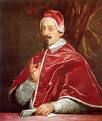
On Jan. 1, 1655 Pope (since 1644) Innocent X (b. 1574) dies, and on Apr. 7 Fabio Chigi is elected Pope (#237) Alexander VII (1599-1667), the pope who steers the ship through the year 1666.

On Apr. 2, 1657 HRE (since 1636) Ferdinand III (b. 1608) dies, and after Bavarian elector Ferdinand Maria offers no challenge despite the shenanigans of Cardinal Jules Mazarin (who hopes to break the Hapsburg succession), he is succeeded next July by his short, sickly, Hapsburg-lipped, Jesuit-dominated son Leopold I (the Hogmouth) (1640-1705) (until 1705), who ends up reigning 47 years and successfully struggling with the Turks and the French (three wars with Louis XIV), causing Austria to emerge as a great Euro power with an absolutist centralized regime; being a music lover, Vienna becomes a cultural center, and in 1683 gets coffee to boot.


The year 1666 contains all the Roman numerals MDCLXVI) once; also 1444, 1446, 1464, 1466, 1644, 1646, 1664. In 1666 the Millennium Fever (MF) over the Big Year 1666 stirs mass paranoia in Christendom, the smart money being that all those evil scientists and secular pagans (and the antichrist pope and his papist followers, according to Protestants) are going to be consumed in fire just as the unbelievers were consumed in water in the days of Noah; later, when the disappointment sets in, hope springs eternal in the human breast, so anybody born in this year is suspected of being the Devil or the Antichrist, and Armageddon is at least going to happen in his lifetime, so don't give up the faith?; meanwhile never fear, the Scientists are here, as the Annus Mirabilis of English Cambridge U. man Sir Isaac Newton (1642-1726) begins when the plague causes him to be sent home from Cambridge to his home in Woolsthrope, where the world's most famous apple falls from the tree, revolutionizing Science with the stunning realization that the heavens and the Earth are subject to the same universal laws - one little orb falls from the sky, causing their minds to fall from the divine Heavens into the material world of Earth, and like it? I walk this empty street on the boulevard of broken dreams? Don't let a migraine upset you? In 1666 as a total rebuff to the Millennium Feverists who say the world is not worth studying (since this is its last year), Isaac Newton goes into a glorious brilliant Rain Man funk in Woolsthorpe and discovers the Integral Calculus (not dental rot but the branch of mathematics) and the Theory of Gravitation (inverse square law), measures the Moon's orbit, and, when not otherwise occupied, buys a glass prism "to try therewith the phenomena of the colours", becoming the first to deduce that the prism splits white light into a spectrum as a result of the different refractive index for each color; sitting under a you know what kind of tree, he observes a you know what falling, and calculates that at a distance of 1 ft. the attraction between two objects is 100 times stronger than at 10 ft., making the super mental leap that the force exerted by the Earth on the apple is the same as that exerted by the Earth on the Moon; "And the same year [1666] I began to think of gravity extending to the orb of the Moon, and having found out how to estimate the force with which a globe revolving within a sphere presses the surface of the sphere, from Kepler's Rule... I deduced that the forces which keep the Planets in their Orbs must [be] reciprocally as the squares of their distances from the centers about which they revolve: and thereby compared the force requisite to keep the Moon in her Orb with the force of gravity at the surface of the earth, and found them answer pretty nearly. All this was in the two plague years of 1665 and 1666, for in those days I was in the prime of my age for invention, and minded Mathematicks and Philosophy more than at any time since" - Isaac Newton, memo in the Portsmouth Collection, 1714; the Newton pippin is later named to commemorate the Big Apple of 1666 - the first modern scientist walks the Earth, and he's white, Anglo-Saxon and Protestant, but actually not so modern, as he's still got one foot in the past and believes in alchemy and bizarre Bible theories, taking a few years out of his all-important studies to figure out math and physics, in the belief that the Universe is a giant code and he can crack it; his success paradoxically strengthens belief in astrology? Newton's funeral was presided over by "A. (Alexander) Pope".



Why is this man dancing? On May 22, 1667 Pope (since 1655) Alexander VII (b. 1599) dies in Rome after persuading Louis IX to restore Avignon to papal control and denounce the privilege of diplomatic residence, and on June 20 Juicy Roast Pig, er, Giulio Rospigliosi is elected Pope (#238) Clement IX (1600-69). On Apr. 15, 1668 Pope Clement IX declares blessed St. Rose of Lima (1586-1617), who becomes the first Am. saint. On Dec. 10, 1669 Pope (since 1667) Clement IX (b. 1600) dies after proclaiming a 10-year Peace of the Church (ends 1679) after the intercession of sensitive French genius Blaise Pascal (1623-62), allowing predestinationist Jansenism to exist within the Church, reversing the 1653 ruling that it is heretical.


On Apr. 29, 1670 Emilio Altieri is elected Pope (#239) Clement X (1590-1676). On July 22, 1676 Pope (since 1670) Clement X (b. 1590) dies, and on Sept. 21 Benedetto Odescalchi is elected Pope (#240) Innocent XI (1611-89).
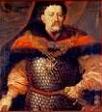



A touch of fame for a Pollock? On July 14, 1683 the Great Austrian-Turkish War (ends 1699) and the Polish-Turkish War (ends 1699) begin as 140K Turks with 300 cannon under Merzifonlu Kara ("Black") Mustafa Pasha (1634-88) begin the Second Siege of Vienna, held by only 20K troops under Count Ernst Rudiger von Starhemberg (1638-1701), culminating on Sept. 11 (the original 9/11) with the epic Battle of Vienna (Kahlenberg); the Christians hold out until Sept. 12 as sappers undermine the city walls, when Jan III Sobieski (1624-96) of Poland swallows his pride at the thought of the Ottoman border being so close to Cracow and allies with HRE Leopold I and duke Charles of Lorraine (1643-90) (who defeated Imre Thokoly of Hungary at Bisamberg 5km NE of Vienna in Aug.) to become CIC of the 84K-man combined armies and raise the siege with 3K Polish mounted Winged Hussars plus 34K Polish troops, 18.5K Austrians, 10.5K Bavarians, 9K Saxons, and 9.5K Swabian and Franconian troops, who stage the largest cavalry charge in history, making Sobieski a hero of Christendom, and marking the end of Islamic military conquests in Europe until ?; after the battle, Sobieski utters the soundbyte "Venimus, Vidimus, Deus Vincit" (We Came, We Saw, God Won); the Christian battle cry of "Maria Help" is amended at the suggestion of Johann Georg III of Saxony (who commands the left wing) to "Jesus and Maria Help", causing Sobieski to utter the soundbyte "The elector of Saxony is an honest man with a straight heart", after which Johann George III accompanies the HRE on his entry to Vienna, then abruptly leaves with his troops after they are treated like merde for being Protestants (kiss my ass, kiss your ass, happy Hanukkah?); Starhemberg also becomes a star, and is promoted to field marshal, but is severely wounded in 1686 at the siege of Buda and gets a desk job as pres. of the Hofkriegsrat; the V marks the hegemony of the Hapsburgs; on Dec. 25 Mustafa Pasha is strangled in Belgrade by the Janissaries and his head sent to sultan Mehmed IV in a velvet bag; too bad, Imre Thokoly, who fights with the Turks gets blamed by them for the whole D, and after rushing to Edirne to defend himself in front of the sultan, he flops and tries to make up with Sobieski, promising to lay down his arms if he is recognized as Protestant prince of Upper Hungary, but Sobieski demands unconditional surrender, and he has to fight on his own with neither side trusting him; the Turks leave massive stores of loot, with Sobieski uttering the soundbyte "Ours are treasures unheard of... tents, sheep, cattle and no small number of camels... It is a victory nobody ever knew of, the enemy now completely ruined, everything lost for them"; the first coffeehouses open in Vienna after the withdrawing sackers leave coffee sacks behind; like a rose that blooms then starts to decay, the Turkish Empire in Europe reaches it maximum extent, stretching from beyond Budapest on the Danube River, the Carpathians, and the headwaters of the Bug River to the Black Sea, Aegean and Ionian Seas, with only Dalmatia (ruled by Venice) and Montenegro (semi-independent) as exceptions; after this, the Islamic world fails to keep pace with the West, incl. constructing public clocks, implementing standardized linear measurements, and modernization in general, compounded by pervasive autocracy.

There is no such thing as a French Protestant, and that's that? On Oct. 18, 1685 the 1598 Edict of Nantes is revoked by French Sun King (1643-1715) Louis XIV (1638-1715), who issues the soundbyte "His Majesty wishes the worst harshness on those who do not partake of his religion", instituting the idea of war secy. (1666-91) Francois-Michel le Tellier of the dragonnades, obnoxious soldiers (dragoons) who are billeted to Huguenot households with a 007 license to harass and intimidate them, spurring a mass exodus from France, while 58K are forcibly converted to Roman Catholicism, causing 500K Huguenots to ignore prohibitions against emigration and emigrate to England (Spitalfields), Prussia (Brandenburg), the Netherlands, Switzerland, South Africa and the English colonies in North Am. (N.Y., Mass., S.C.) to get away from the Sun and his mandatory Roman Catholic faith; next Jan. 17 Louis XIV brags that only 1K-1.5K of 800K-900K Huguenots still remain in Sunny France; meanwhile on July 26 the elector of Brandenburg sees his chance and issues the Potsdam Declaration, offering Protestants refuge, causing French Huguenots to flock there, as well as others from the Netherlands, Bohemia, and Russia, pumping up the economy; the new Huguenots also boost the Dutch economy, pumping up William II of Orange; thousands settle in the Cevennes Mts. of S France and become known as the Camisards; the Protestants of Alsace obtain an exemption permitting freedom of worship.

On June 30, 1688 England's bloodless Glorious Rev., sees Roman Catholic king (since 1685) James II deposed in favor of his son-in-law, the very PC (Protestant Continually) William II of Orange (1650-1702) (stadholder of the Netherlands since 1672) (son of Princess Mary Stewart, daughter of Charles I) and his equally PC wife Mary Stuart (1662-94) (James II's daughter by first wife Anne Hyde, and sister of Princess Anne), who become William III and Mary II. From now on being a Protestant is more important than lineage when it comes to succession, and the Parliament creates them, not the other way around.

On Aug. 12, 1689 Pope (since 1676) Innocent XI (b. 1611) dies, and on Oct. 6 Pietro Vitto Ottoboni is elected Pope (#241) Alexander VIII (1610-91) (until Feb. 1, 1691), becoming the last named Alexander (until ?).



On Feb. 1, 1691 Pope (since 1689) Alexander VIII (b. 1610) dies, and on July 12 Antonio Pignatelli is elected Pope (#242) Innocent XII (1615-1700), becoming the last to wear a beard (until ?). On Sept. 27, 1700 Pope (since 1691) Innocent XII (b. 1615) dies after advising retarded king Charles II of Spain to make Louis XIV's blonde grandson (great-grandson of Philip IV of Spain) Philip (Felipe) V, Duke of Anjou (1683-1746) his testamentary successor, and on Nov. 1 Charles II (b. 1661) dies, ending the line of the Spanish Hapsburgs, and Louis XIV of France accepts the Spanish throne for Philip V, founding the Spanish House of Bourbon, but the Austrians want Spain to remain Hapsburg, and back Hapsburg Archduke Charles (later HRE Charles VI), which leads next year to the 13-year War of the Spanish Succession (ends 1713); meanwhile on Nov. 23 Giovanni (Gian) Francesco Albani (from a noble family in Urbino that orginally came from N Albania) is elected Pope (#243) Clement XI (1649-1721), going on to commission the 5K-page 8-vol. Illyricum Sacrum in 1702 (pub. in Venice in 1751-1819), and refrain from nepotism, other than his nephew Annibale Albani (1682-1751), who is elected cardinal, but on his own merits; the new pope starts out by trying to remain neutral in the succession dispute.
In the 18th cent. the Industrial Rev. begins in Europe, starting slow; at the beginning of the cent. living conditions in Europe stink.

On July 24, 1702 (night) Abbe du Chavla is murdered in Pont-de-Monvert, sparking the popular romantic Camisard Rebellion (ends 1704) against Louis XIV of Huguenot peasants pissed-off by the 1685 revocation of the Edict of Nantes, led by able military leader Jean Cavalier (1681-1740) in the mountainous Cevennes (Cévennes) region of S France (home of the descendants of the Visigoths), wearing black camisards (Fr. "chemise") smocks over their armor that give them their name, engaging in guerrilla (mainly night) warfare against royal troops, burning Roman Catholic churches and killing priests, causing the Catholics to fight back a little too eagerly, razing over 450 villages and exterminating the pop., while Pope Clement XI eggs them on with a papal bull, calling them the "execrable race of the ancient Albigenses", and promising remission of sins to the newly-formed Huguenot-butt-kicking Roman Catholic Cadets of the Cross (White Camisards) (Florentines). On Apr. 16, 1704 1K Huguenot Camisards under Jean Cavalier are defeated by 5K French troops under Marshal Montrevel at the Battle of Nages Bridge, after which a peace conference is held on May 11-16 at Pont d'Avne near Alais, and the Camisards surrender under honorable terms, with Louis XIV agreeing to give them amnesty and restore their property and partially restore their civil rights (right of assembly outside walled towns) in return for swearing allegiance to the French crown; too bad he will not let them build their own churches or restore the Edict of Nantes, causing most of them to continue the struggle another year, although leader Jean Cavalier caves in and is made a French col. with a pension, with his Camisards organized into a regiment under his command for service in Spain; too bad, the Huguenots think he sold them out and turn on him, causing him to flee from Nimes to Neu-Brisach, Alsace with his last 100 followers, then to Paris, where he tries in vain to get Louis XIV to budge, then flees to Lausanne, Switzerland, where he forms a Camisard refugee regiment, fighting for any enemy of the Frogs that will have them.
In 1713 Pope Clement XI pub. the papal bull Unigenitus, marking the end of toleration of Jansenist doctrine - welcome to the popular table, or not?

On Mar. 19, 1721 Pope (since Nov. 23, 1700) Clement XI (b. 1649) dies, and on May 8 Michelangelo (Michele) dei Conti is elected Pope (#244) Innocent XIII (1655-1724) (until Mar. 7, 1724), going on to impose new frugality standards and end the practice of nepotism among cardinals.

On Mar. 7, 1724 Pope Innocent XIII dies, and on May 27 Pietro Francesco Orsini is elected Pope (#245) Benedict XIII (1649-1730); he learns to smoke and repeals papal bulls against clerical smoking - didn't I make you feel like you are the only man?


On Feb. 21, 1730 Pope (since 1724) Benedict XIII (b. 1649) dies after letting leeches sponge off him while his head's in the clouds, and on July 12 Florentine-born Lorenzo Corsini is elected Pope (#246) Clement XII (1652-1740) (until Feb. 6, 1740). In 1737 he canonizes St. Vincent de Paul (1576-1660).
On Apr. 28, 1738 Pope Clement XII issues the bull In Eminenti condemning Freemasonry, calling the movement "unprincipled".

On Feb. 6, 1740 Pope (since 1730) Clement XII (b. 1652) dies, and on Aug. 17 Prospero Lorenzo Lambertini is elected Pope (#247) Benedict XIV (1675-1758), becoming the greatest scholar among the popes. On June 13, 1757 Pope Benedict XIV issues a decree on the unwonderful Roman Catholic Index of Prohibited Works, finally permitting readings of vernacular versions of the Bible "approved by the Holy See and published under the direction of bishops", and annulling the infamous anti-Copernican decree of 1616; Antonio Martini, later archbishop of Florence begins to trans. the Vulgate into Italian, and pub. it in 1769-81.


On May 3, 1758 Pope (since 1740) Benedict XIV (b. 1675) dies, and on July 6 Carlo Della Torre Rezzonico is elected Pope (#248) Clement XIII (1693-1769). On Jan. 1, 1766 James Francis Edward Stuart (Stewart) (b. 1688), the Old Pretender dies, and his eldest son (the Young Pretender) Charles Edward Stuart (1720-88), AKA Bonnie Prince Charlie settles in Rome as the self-styled Count of Albany; in Jan. Pope Clement XIII recognizes the Protestant Hanoverian Dynasty as the lawful rulers of England, Scotland, and Ireland, permanently dashing the hopes of the Roman Catholic Jacobites.

On Feb. 2, 1769 Pope (since 1758) Clement XIII (b. 1693) dies, and on May 18 Lorenzo Ganganelli is elected Pope (#249) Clement XIV (1705-74) after a bitter conclave seeking a pope who will agree in advance to the suppression of the Jesuits. On July 21, 1773 Pope (since 1769) Clement XIV follows through on his campaign promise, and issues the brief Dominus ac Redemptor, suppressing the evil scheming troublesome Satanic (but well-dressed and well-heeled) Jesuits (Society of Jesus) "in the name of peace of the Church and to avoid a secession in Europe", and HRE Joseph II gleefully expels them from the empire; too bad, the Jesuits load onto ships in Spain and Portugal, and are not wanted by Italy, and after being warned off they end up in Corsica; the whole thing was backed by Louis XV, who blamed them for starting the Seven Years' War which caused them to lose their colonies, and Clement XIV did it for political not theological reasons; coincidence or not, neither Clement XIV nor Louis XV last much over a year before croaking; a coincidence that Napoleon, who comes from Corsica signs a concordat in 1801 with Pope Pius VII, who crowns him emperor of France in 1804 and then restores the Jesuits in 1814? - you are like a hurricane, there's calmness in your eye, and I'm getting blown away?

On Sept. 22, 1774 anti-Jesuit Pope (since 1769) Clement XIV (b. 1705) dies - which Jesuit should we thank for that cup of Borgia? On Feb. 15, 1775 after a long conclave, Cesena-born Giovanni Angelico (Angelo) (Gianangelo) Braschi (Brachi) is elected Pope (#250) Pius VI (1717-99), going on to live to see the disturbing (to a Catholic) Am. Rev., French Rev., and Emperor Napoleon I - Pius VI in 76?



On Feb. 17, 1776 after getting the idea while on a visit to Rome on Oct. 15, 1765, and spending seven years getting it going, English historian Edward Gibbon (1737-94) (The smallest ape? His portrait bears a striking resemblance to fat pudgy-cheeked Roman emperor Nero?), who has lived comfortably at 7 Bentinck St. in London since his father left him his inheritance in 1770 begins to pub. his 6-vol. masterpiece The History of the Decline and Fall of the Roman Empire (Feb. 17, 1776-Mar. 1788), the authoritative work on the Roman Empire, covering from 180 C.E. (death of last good emperor Marcus Aurelius) to 1453 C.E. (fall of Constantinople), by a Brit watching his empire lose its prize colony; known for its high-quality lit. prose filled with irony, and even cooler footnotes; it causes a furor over his allegations in Ch. 15 and Ch. 16 that Christianity caused its fall, and makes the Roman Catholic Index of Prohibited Books, making it more popular; too bad that Gibbon doesn't have another 25 so he can write "The Rise of the Roman Empire"?; a favorite of Winston Churchill, TLW et al., making it a must-read to qualify as a history genius?; one English critic says of him, "The historian must have some conception of how men who are not historians behave"; "In the second century of the Christian era, the Empire of Rome comprehended the fairest part of the earth, and the most civilised portion of mankind. The frontiers of that extensive monarchy were guarded by ancient renown and disciplined valour. The gentle but powerful influence of laws and manners had gradually cemented the union of the provinces. Their peaceful inhabitants enjoyed and abused the advantages of wealth and luxury. The image of a free constitution was preserved with decent reverence: the Roman senate appeared to possess the sovereign authority, and devolved on the emperors all the executive powers of government. During a happy period of more than fourscore years, the public administration was conducted by the virtue and abilities of Nerva, Trajan, Hadrian, and the two Antonines. It is the design of this, and of the two succeeding chapters, to describe the prosperous condition of their empire; and afterwards, from the death of Marcus Antoninus, to deduce the most important circumstances of its decline and fall; a revolution which will ever be remembered, and is still felt by the nations of the earth" (Ch. 1); "Whatever evils either reason or declamation have imputed to extensive empire, the power of Rome was attended with some beneficial consequences to mankind; and the same freedom of intercourse which extended the vices, diffused likewise the improvements of social life" (Ch. 2); "The various modes of worship, which prevailed in the Roman world, were all considered by the people, as equally true; by the philosopher, as equally false; and by the magistrate, as equally useful" (Ch. 2); "It is scarcely possible that the eyes of contemporaries should discover in the public felicity the latent causes of decay and corruption. This long peace, and the uniform government of the Romans, introduced a slow and secret poison into the vitals of the empire. The minds of men were gradually reduced to the same level, the fire of genius was extinguished, and even the military spirit evaporated" (Ch. 2); "To resume, in a few words, the system of the Imperial government, as it was instituted by Augustus, and maintained by those princes who understood their own interest and that of the people, it may be defined an absolute monarchy disguised by the forms of a commonwealth. The masters of the Roman world surrounded their throne with darkness, concealed their irresistible strength, and humbly professed themselves the accountable ministers of the senate, whose supreme decrees they dictated and obeyed" (Ch. 3); "Augustus was sensible that mankind is governed by names; nor was he deceived in his expectation, that the senate and people would submit to slavery, provided they were respectfully assured that they still enjoyed their ancient freedom" (Ch. 3); "The two Antonines (for it is of them that we are now speaking) governed the Roman world forty-two years, with the same invariable spirit of wisdom and virtue... Their united reigns are possibly the only period of history in which the happiness of a great people was the sole object of government" (Ch. 3); "If a man were called to fix the period in the history of the world, during which the condition of the human race was most happy and prosperous, he would, without hesitation, name that which elapsed from the death of Domitian to the accession of Commodus" (Ch. 3); "History, which undertakes to record the transactions of the past, for the instruction of future ages, would ill deserve that honourable office if she condescended to plead the cause of tyrants, or to justify the maxims of persecution" (Ch. 16); "There exists in human nature a strong propensity to depreciate the advantages, and to magnify the evils, of the present times" (Ch. 31); "The division of the Roman world between the sons of Theodosius marks the final establishment of the empire of the East, which, from the reign of Arcadius to the taking of Constantinople by the Turks, subsisted one thousand and fifty-eight years in a state of premature and perpetual decay" (Ch. 32) - who will write "The Decline and Fall of the American Empire"?



On May 1, 1776 Jesuit-trained anti-Jesuit former Bavarian canon law prof. Johann Adam Weishaupt (1748-1830) of the U. of Ingolstadt (who got his job in 1773 after the Jesuits were suppressed by Pope Clement XIV) founds the secret Order of the Illuminati ("the Very Perfectibles") in Ingolstadt, Bavaria, with five members, allegedly secretly backed by German Jewish big brain internat. banker Mayer Amschel de Rothschild (1744-1812), with the alleged aim of the destruction of Christendom and the Christian order of Europe by dividing and conquering and playing one nation off against the other via internat. bank financing et al., with the ultimate goal of the establishment of a New World Order (NWO), and which is behind the Am. Rev., French Rev., European revs. of the 19th cent., U.S. Civil War, Russian Rev., League of Nations, and United Nations (9/11?); deciding to work inside the Freemasons, the membership is up to 54 in 1779, branching through Europe and attracting Goethe, Schiller, Herder, and Mozart; after it is suppressed on June 22, 1784, its few thousand members are exterminated from C Europe, but either it goes totally underground and keeps growing, or it generates one heck of a myth?; the Columbian Faction of the Illuminati is strong in North Am.?


On June 2, 1780 after Irish MP Henry Grattan (1746-1820) demands Home Rule for Ireland, pissed-off London-born Scottish Gaelic-speaking, bagpipe-playing, highland reel-dancing Navy-reject fruitcake Lord George Gordon (1751-93) (son of Cosmo George Gordon, 3rd duke of Gordon) sets up the Protestant Assoc. to demand repeal of the 1778 Catholic Relief Act on the theory that Roman Catholic soldiers would be disloyal, and marches on the House of Commons from St. George's Fields with 50K supporters wearing blue cockades to present a petition with 100K names, shouting "No Popery!" and harassing House of Lords members, the situation degenerates into the savage anti-Catholic Gordon Riots, burning Newgate, Bridewell, Fleet and other prisons and liberating the prisoners, looting Langdale's distillery, leveling the Irish Catholic Moorfields section, and destroying the house of Lord Chief Justice Mansfield, causing aging retired Gen. Jeffrey Amherst to take the field again against the mob, killing over 800; after the riots are quelled on June 8, 25 ringleaders are hanged, but Gordon goes scot free; too bad, after being excommunicated by the archbishop of Canterbury in 1786, he is convicted in 1787 of defaming Marie Antoinette and other French officials, and given five years in Newgate Prison in Jan. 1788; meanwhile in 1787 he converts to Orthodox Judaism, grows a long beard and changes his name to Israel bar Abraham Gordon, associating only with other orthodox Jews in jail, causing them to call him the resurrected Moses - one Bourbon, one Scotch, and one Mogen David?

In 1781 HRE (since 1765) Joseph II (1741-90) grants a patent of religious tolerance and freedom of the press in Austria, and abolishes serfdom in his domains; a zealous reformer, he prohibits the pub. of any religious decrees originating outside of his realm, and suppresses 700 convents while reducing the number of clergy from 63K to 27K. In 1782 Pope Pius VI goes to Vienna to unsuccessfully persuade HRE Joseph II to rescind his program of religious tolerance - you'll regret it in the morning? In 1784 Pope Pius VI builds a new Appian Way from Rome to Albano, parallel to the old.
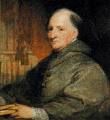
Whether or not you go for the theory that the Illuminati founded the U.S., the Jesuits and Roman Catholics don't take long to move into Washington, D.C. in force? In 1789 the Vatican approaches U.S. pres. George Washington about naming a new bishop in the U.S., which Washington consents to, although the distrust of the U.S. govt. is so great that it doesn't establish full diplomatic relations with the Vatican for almost two cents. (1984). On Jan. 23, 1789 Georgetown U. is founded in present-day Washington, D.C. by John Carroll (1735-1815), who becomes Roman Catholic bishop of Baltimore, Md. on Nov. 6 (until Dec. 3, 1815), becoming the oldest Roman Catholic univ. in the U.S.; after the U.S. Civil War they adopt blue and gray as school colors; by 1920 their athletic teams are nicknamed "the Hoyas" (Gr. "hoya" = what, such); Carroll, a Jesuit who returned to the U.S. in 1774 after their suppression in Europe, who was appointed in 1784 by Pope Pius VI as prefect apostolic of the U.S. at the recommendation of Benjamin Franklin becomes the first Roman Catholic bishop in the U.S., followed by archbishop in 1808; all the church groups in the U.S. are getting federal fever and seeking to nationalize their orgs. now.?
On July 12, 1790 the French Nat. Assembly approves the Civil Constitution of the Clergy, putting Roman Catholic bishops and priests as well as Church income under govt. control, and providing for the election of priests and bishops, pissing off Pope Pius VI, who denounces it next year, while less than half of French priests declare loyalty to the govt.; on July 14 the king accepts the constitution, and the French clergy is disestablished, and all ecclesiastical orders dissolved, causing many to become beggars, and others to cross the Alps and take refuge in the Vatican.




It's only a manly man who could? I want a perfect body I want a perfect soul? On Feb. 3, 1797 Napoleon Bonaparte (1769-1821) takes Mantua after a seige, and founds the Lombard (Cispadane) Repub., then advances toward Rome until Pope Pius VI concludes the Treaty of Tolentino with him on Feb. 19; he then crosses the Alps, marches through the Austrian Tirol (Tyrol), and comes within 80 mi. of Vienna, forcing Austria to open negotiations. On Feb. 10, 1798 French troops under gen. Louis Alexandre Berthier (1753-1815) occupy the Vatican State, and on Feb. 15 declare the Roman (Tiberina) Repub. (until 1800) (with the blue strip in the French flag replaced by a black one), demanding that Pope Pius VI renounce his temporal sovereigny, but he says stuff it and flees, is captured and taken to Siena in Tuscany, and later to Valence, France, pissing off fellow Italian King Ferdinand IV of Naples (Sicily) (1751-1825), who declares war on France.

On Aug. 29, 1799 Pope (since 1775) Pius VI (b. 1717) dies a prisoner of the French in Valence, France, and on Mar. 14, 1800 Jesuit-friendly Luigi Barnab a Chiaramonte is elected Pope (#251) Pius VII (1740-1823). In July 1800 Pope Pius VII enters Rome after Napoleon makes an agreement with the Spanish monarchy that ensures the survival of the Bourbons in Naples and the pope in Rome; Puccini's 1900 opera Tosca is set on June 17-18 of this year.

I'm walking on sunshine, whoa-oh? On July 15, 1801 the Concordat of 1801 (announced on Easter Sunday, 1802), signed in Paris by Napoleon and Pope Pius VII reconciles the French Consulate with the Roman Catholic Church, and reestablishes and governs the relations of the French Church with Rome for the next cent., esp. by recognizing Protestantism (both Lutheran and Calvinistic), Judaism, and Roman Catholicism as established religions entitled to state support and subject to state control; the consul appoints bishops, subject to confirmation by the pope, and the bishops choose their own clergy, paid by the govt.; the pope continues to control the Papal States, except Ferrara, Bologna, and Romagna; priests in Belgium and other outlying regions form the Petite Eglise (Little Church) outside Courlay in Deux-Sevres to oppose it, functioning without a priest; Joseph Fesch (1763-1839), half-uncle of Napoleon I is made archbishop of Lyons for helping bring the concordat about, and cardinal next year. Also in 1801 Pope Pius VII begins unsuppressing the Society of Jesus (Jesuits), starting in Russia.

On Oct. 31, 1803 the warship USS Philadelphia, captained by William Bainbridge founders on a reef near Tripoli, and is forced to surrender along with all 307 sailors; Tripoli adds the ship to their Muslim pirate navy. On Feb. 16, 1804 Lt. Stephen Decatur Jr. (1779-1820) leads a successful raid into Tripoli Harbor to burn the captured anchored U.S. Navy frigate USS Philadelphia, earning him the praise of British adm. Horatio Nelson, who calls it "the most bold and daring act of the age", along with a promotion to capt.; Pope Pius VII credits the U.S. with doing "more for the cause of Christianity than the most powerful nations of Christendom have done for ages", causing James Madison and Thomas Jefferson to rebuff him, claiming that they exhibit "universal toleration in matters of religion" and it was only about national interest - Osama would laugh?

Let us drink to Ricardo Montalban as Khan, er, Napoleon as Emperor? On May 18, 1804 the French Senate and Tribunate proclaim Napoleon Bonaparte as Emperor Napoleon I, and a plebiscite ratifies it by 3,572,329 to 2,569; on Dec. 2 after being persuaded by his uncle Cardinal Joseph Fesch (appointed French ambassador to Rome this year), Pope Pius VII assists in his coronation in Paris, but Nappy insists on a magic moment, placing the crown on his own head; Nappy revives absolute monarchy while modernizing it, basing it on achievement rather than birth, except when it comes to his succession, which goes to his male heir (incl. adopted children of his brothers), and then to his brothers; this all causes Beethoven to lose his respect for his hero, tear up the title page, and change the name of his newly-created E-flat Third (3rd) Symphony, Op. 55 from Bonaparte Symphony (New Groves) to Eroica (Heroic) in May, allowing the published manuscript to carry the inscription "Composed to celebrate the memory of a great man", but not Napoleon, whom he calls a "tyrant"; it is dedicated to Lobkowitz, and first performed privately in Aug.; the beginning of the Curse of the 9th Symphony, where anyone who writes or is writing a 9th symphony will soon die, incl. Antonin Dvorak, Vaughan Williams, and Anton Bruckner; on Nov. 13 the Shroud of Christ is shown privately to Pope Pius VII at Turin en route from Rome to Paris to crown Napoleon.
On Feb. 2, 1809 the French occupy Rome, then incorporate the Papal States into France on May 17 by Napoleon I's declaration, causing Pope Pius VII to excommunicate him, but on July 6 (2:00 a.m.) Nappy has the pope kidnapped in the Quirinal Palace in Rome and take him to Savona near Genoa, then to Fontainebleau, returning after five years; Nappy's uncle Cardinal Fesch is pissed-off by this and declines the archbishopric of Paris; France captures the Adriatic seaport of Fiume (Rijeka) from Hungary (until 1813).
On Aug. 7, 1814 Pope Pius VII, having returned to Napoleon-free Rome and restored the Inquisition, universally reestablishes the Jesuit Order - like they said, "we'll be baaaack"?
On May 21, 1815 Pope Pius VII stops in Turin on his return to Italy from crowning Napoleon, and personally displays the Shroud of Christ from the balcony of the Palazzo Madama.
On July 15, 1823 after a workman repairing the roof starts it, the major papal basilica of St. Paul's Outside the Walls in Rome (built 450) is destroyed by fire; it is reopened in 1840, and reconsecrated in 1855 by Pope Pius IX and 50 cardinals.

On July 20, 1823 Pope (since 1800) Pius VII (b. 1740) dies, and on Sept. 28 Annibale Sermattei Della Genga is elected Pope (#252) Leo XII (1760-1829), continuing Pius VII's policies of establishing concordats with govts. in return for state protection of the Church, while policing morals, persecuting Jews, and condemning Protestant Bible societies and anybody else in the way of the One True Church; the Rothschild family takes over the worldwide financial operations of the Church - are you making a toy angel?


On Feb. 10, 1829 Pope (since 1823) Leo XII (b. 1760) dies, and on Mar. 31 Francesco Saviero Castiglione is elected Pope (#253) Pius VIII (1761-1830), continuing with the program of his predecessors. On Nov. 30, 1830 Pope (since 1829) Pius VIII (b. 1761) dies, and on Feb. 2, 1831 after a 54-day conclave, Mauro (Bartolomeo Alberto) Capellari is elected Pope (#254) Gregory XVI (1765-1846) (until June 9, 1846). In Apr. 1831 reps. of Austria, Russia, France, Prussia, and England meet in Rome to reform the Papal States, and on May 21 issue a memorandum, which is grudgingly carried out by Pope Gregory XVI, with exceptions, causing the Papal States to go into revolt.
In 1834 the infamous Spanish Inquisition, authorized by Pope Sixtus in 1478 is officially ended for the last time - until next time?

On June 9, 1846 Pope (since 1831) Gregory XVI (b. 1765) dies, and on June 16 young (54-y.-o.) Giovanni Maria Mastai-Ferretti (the liberal candidate) is elected Pope (#255) Pius IX (1792-1878) (until Feb. 7, 1878), the last pope under 60 until John Paul II in 1978, proclaiming amnesty for political prisoners and refugees, relaxing censorship, and creating an advisory council of laymen; Italian liberals rejoice, think he's their man, and organize demonstrations demanding a new civil guard as a first step towards resistance against the Austrians; too bad, he's got a long reign ahead of him, and ends up being just like his previous papa?

On July 23, 1847 after the increase of Roman Catholic pilgrims to 4.2K makes exclusive control by the Franciscans inappropriate, Pope Pius IX issues the bull Nulla Celebrior, reestablishing the Latin Patriarchate of Jerusalem along with the Order of the Holy Sepulcure for the 1st time since the Crusades, with bishop Giuseppe (Joseph) Valerga (1813-72) as the first, superseding the Franciscan control that began in 1342; he arrives in Jerusalem next Jan. 17 and enters the Holy Sepulchre; the papacy retains the title of grand master of the Order of the Holy Sepulchre until 1949.


In 1848 after crop failures and recessions leave many of the poor on the verge of starvation, the European Revs. of 1848 (Springtime of Nations) (Springtime of the Peoples) (Year of Rev.) sees liberal revs. spring up simultaneously across Europe; only the Euro states of Britain, Russia, Netherlands, Poland, Serbia, and the Ottoman Empire are spared; too bad, most of them are quickly quashed, with tens of thousands tortured and killed, although the social changes later prove profound; "Society was cut in two: those who had nothing united in common envy, and those who had anything united in common terror" (Alexis de Tocqueville); Russia suffers from a major cholera epidemic, unusually dry weather causing fires and a bad harvest. At the start of the year, revolution-ripe Ugly Betty Italy is still divided into the Kingdom of Sardinia (incl. Piedmont, Genoa, Nice, Savoy), the Austrian provinces of Lombardy and Venetia, the duchies of Parma and Modena, the Hapsburg grand duchy of Tuscany), the Papal States (incl. Romagna, Ancona, Rome), and the Bourbon kingdom of the Two Sicilies. On Feb. 1, 1848 London Tribune reporter (managing ed. Richard Henry Dana - a coincidence? did he mention his California days?) Karl Marx (1818-83) and Friedrich Engels (1820-95) pub. The Manifesto of the Communist Party in London as a broadside for the coming revolutions, containing the immortal soundbyte "When, in the course of development, class distinctions have disappeared, and all production has been concentrated in the hands of a vast association of the whole nation, the public power will lose its political character. Political power, properly so called, is merely the organized power of one class for oppressing another. If the proletariat during its contest with the bourgeoisie is compelled, by the force of circumstances, to organize itself as a class, if, by means of a revolution, it makes itself the ruling class, and, as such, sweeps away by force the old conditions of production, then it will, along with these conditions, have swept away the conditions for the existence of class antagonisms and of classes generally, and will thereby have abolished its own supremacy as a class"; when the little revvies all fizzle the document is repub. as The Communist Manifesto 20 years later, and those who think that socialism can be implemented bloodlessly are labelled as "utopian socialists"; of course the new Communist movement is militantly atheistic and anti-clerical, appealing to disaffected Catholics of all brands, along with pagan Chinese et al.

On Mar. 18-22, 1848 the massive repub. demonstration known as the Five Days of Milan in Lombardy is opposed by the Austrian govt. and the liberals, and Marshal Radzetsky's troops in Milan are kept out of the demonstration until the govt. palace is attacked, but the barricades hold him; on Mar. 18 a liberal-radical govt. is established in Milan with Carlo Cattaneo (1801-69) as head, but the radicals are soon ousted and rural demonstrators are kept outside the city walls; meanwhile the Piedmontese intervene, and on Mar. 22 Sardinia-Piedmont (incl. Nice and Savoy) declare war on Austria, beginning the Austrian-Piedmontese War (ends 1848), sending troops to Milan on Mar. 26; Pope Pius IX waffles, refusing to release troops to attack a Roman Catholic nation, then on Aug. 29 publishing an ambiguous statement supporting all Catholics and declaring neutrality of the Papal States.

On Nov. 15, 1848 conservative papal minister of the interior (former French ambassador to Rome) Pellegrino Rossi (Luigi Edoardo Pellegrino, Count Rossi) (b. 1787) is assassinated on the steps of the assembly, causing demonstrations in Rome on Nov. 16, backed by the army and nat. guard, causing Pope Pius IX to agree to a radical govt. and the election of a nat. assembly; the new govt. abolishes the flour tax and begins public make-work programs; on Nov. 24 the pope flees Rome for Gaeta in Naples.


Smells like teen spirit? On Feb. 9, 1849 a rev. mob led by Giuseppe Mazzini (1805-72) overthrows the govt. of Pope Pius IX, and declares the Roman Repub., ending Roman Catholic control of the univ., and causing Pope Pius IX in Naples to appeal to Catholic powers for aid. On Apr. 24, 1849 a French force of 10K men under Gen. Nicolas Oudinot lands on the Italian coast and marches to Rome; on May 4 the Austrians begin bombarding Venetian garrisons, causing food riots to break out in the city in June; on May 15 Neapolitan troops reconquer Sicily, and on June 2 Gen. Oudinot sieges Rome, which is defended by Mazzini and Giuseppe Garibaldi (1807-82), until on June 30 the Roman parliament votes against Mazzini, causing him to leave the city with troops loyal to him, which are then decimated; on July 1 French troops occupy Rome, restore the pope, and dissolve the parliament; the pope then creates a conservative govt. against French wishes.
In summer 1850 Pope Pius IX issues a rescript dividing England into dioceses for the govt. of the Roman Catholic Church; British PM John Russell issues a public letter denouncing it as an insult to the queen and an attempt towards a union of the Anglican Church with Rome, and introduces the anti-Catholic Ecclesiastical Titles Bill, which forbids the assumption of titles derived from the U.K. by priests of the Roman Catholic Church; Pope Pius IX also issues a bull establishing a Roman Catholic hierarchy in England, causing Oxford bishop (since 1844) Samuel Wilberforce to get in hot water since his brother-in-law, the future Cardinal Manning converted to Catholicism.

In 1853 Scottish Free Church minister Alexander Hislop (1807-65) pub. The Two Babylons, Or The Papal Worship Proved to Be the Worship of Nimrod and His Wife (Edinburgh), rocking the house with his apparently well-documented thesis that Roman Catholicism is based on Babylonian paganism (ultimately tracing back to the worship of Nimrod), that the Roman Catholic Church is the Whore of Babylon in the Bible Book of Revelation 17:5, and "the Pope himself is truly and properly the lineal representative of Belshazzar"; IHS = Isis, Horus, Seth?
The original Sgt. Schulz on Hogan's Heroes? In July 1854 delegates from 13 U.S. states form the Know-Nothing Party, whose members pledge never to vote for any foreign-born (esp. Irish) or Roman Catholic (esp. Irish) candidate, and when asked about it to say "I know nothing"; in Nov. they sweep the Mass. legislature, winning all but two seats in the lower house; in the fall they elect 40+ congressmen, and almost control New England; too bad that the Irish keep a-comin', and by 1860 1.5M enter the U.S., drowning them out. On Mar. 16, 1854 a marble block from the Temple of Concord in Rome donated by Pope Pius IX for the Washington Monument in Washington, D.C. is stolen by anti-Catholic thieves, probably Know-Nothings.
In 1854 Pope Pius IX declares the Immaculate Conception of the Blessed Virgin Mary to be an article of faith (dogma) - like a dog's ma?
In 1857 the Great Castration sees Pope Pius IX decide that stone penises might incite lust inside the Vatican, and hack off the genitalia of every male statue in Vatican City with a chisel and mallet; later, plaster fig leaves are used to patch the damage to these hundreds of priceless sculptures.
In 1858 on the orders of Pope Pius IX, papal police abduct 6-y.-o. Jewish boy Edgardo Mortara from his parents and raise him a Roman Catholic after claiming he was secretly baptized a Catholic by a 14-y.-o. maid, causing a firestorm of controversy and stinking up Pius IX's name; on Sept. 3, 2000 Pope John Paul II beatifies Pius IX, reigniting the controversy.

The U.S. splits apart, while Italy comes together? On Mar. 17, 1861 the parliament of greater Sardinia in Turin proclaims the unified Kingdom of Italy, incl. Lombardy, Parma, Piedmont, Modena, Lucca, Romagna, Tuscany, and the Two Sicilies, and the Statuto of 1848 is extended to all of Italy, with Victor Emmanuel II (1820-78), head of the Piedmont House of Savoy declared "by the grace of God and the will of the nation, King of Italy"; too bad, he refuses to take the title of Victor Emmanuel I of Italy, pissing some off; on Mar. 20 Civitella del Tronto surrenders, and the Kingdom of the Two Sicilies is kaput; Austria still holds Venetia (until 1866), and France holds Rome (until 1870); the Treaty of Turin cedes Nice and Savoy to France; on June 7 PM (since 1852) Count Camillo di Cavour (b. 1810) dies in Turin 3 mo. after the declaration of a united kingdom of Italy; meanwhile Pope Pius IX sees red, goes into mother bear instinct mode, refuses to recognize the new secular state, excommunicates its officials, and orders all Roman Catholics to shun participation; meanwhile, after 18 cents. of close-captioned Catholic leadership, 74.7% of the Italian pop. is illiterate, so the new govt. limits the franchise to 600K middle and upper class males out of a total pop. of 20M, and lack of experience with democracy makes it ripe for bribery and graft? - I have a strict dental plan, it's called avoidance?
On July 1, 1861 the Vatican newspaper L'Osservatore Romano begins pub. as an organ for Pope Pius IX to respond to those who want the Church to give up the Papal States that he claims were given to the papacy in the Donation of Pepin way back in 756 C.E.
On Apr. 22, 1862 San Salvador signs a concordat with Pope Pius IX, making the Roman Catholic Church its state church; on July 26 Venezuela signs a similar concordat with the Church, as does Ecuador on Sept. 26; Haiti affirms its 1860 concordat; the Vatican just about has South Am. sewn up with concordats?
On Feb. 25, 1863 Pope Pius IX opens the Termini Railway Station in Rome across the street from the Baths of Diocletian (Lat. "thermae"), becoming Rome's main train station.
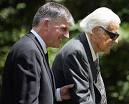
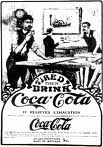
In 1863 Corsican-born Italian chemist Angelo (Ange-Francois) Mariani (1838-1914) develops Vin Mariani, containing Bordeaux wine and cocaine, which becomes a hit with Queen Victoria, Pope Pius X, Thomas Edison, and Pope Leo XIII, who awards it the Vatican gold medal; after being wounded in the Battle of Columbus, Ga. in Apr., 1865, Atlanta, Ga. pharmacist John Styth (Stith) Pemberton (1831-81) creates his own version also containing damiana (alleged impotence cure) and kola nut (source of caffeine) called Pemberton's French Wine Coca, which is reformulated in 1885 to take out the alcohol but not the cocaine or caffeine, becoming "the pause that refreshes" Coca-Cola.
On Dec. 8, 1864 Pope Pius IX issues his infamous Syllabus of Errors (Syllabus Errorum), which condemns separation of church and state, freedom of the press and religion, rationalism, modernism, liberalism, socialism, etc., all lumped together on the red ink list; on Dec. 8 he also issues the encyclical Quanta Cura (Condemning Current Errors), condemning freedom of religion and speech, and separation of church and state, especially the "insane" idea that "Liberty of conscience and worship is each man's personal right, which ought to be legally proclaimed and asserted in every rightly constituted society; and that a right resides in the citizens to an absolute liberty, which should be restrained by no authority whether ecclesiastical or civil, whereby they may be able openly and publicly to manifest and declare any of their ideas whatever, either by word of mouth, by the press, or in any other way"; meanwhile Italy renounces its claim on Rome, and the capital of Italy is moved from Turin to Florence (until 1870); after several Vs of his Repub. forces in uniting Italy from control by the papal states, Giuseppe Garibaldi is given a triumphal reception in England, with the crowds chanting "We'll get a rope and hang the pope so up with Garibaldi!"


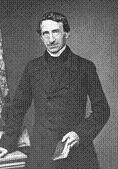

In 1867 Pope Pius IX, on the 18th centennial of St. Peter and St. Paul announces his intention to hold an ecumenical council. On June 29, 1868 the First Vatican (20th Ecumenical Council) is convoked by Pope Pius IX in the Vatican Basilica, and attended by 800 churchmen (ends Oct. 20, 1870); Cardinal Henry Edward Manning (1808-92) advances the Doctrine of Papal Infallibility, drawing opposition within the Church led by German priest-theologian Johann Joseph Ignaz von Doellinger (Döllinger) (1799-1890), who begins pub. The Letters of Janus in 1869, which claim that the 9th cent. False (Pseudo-Isidorean) Decretals, which were exposed as forgeries in 1628 by Calvinist preacher David Blondel don't support it, or anything else, going on to pub. the proceedings of the Vatican Council (1869-70) to keep the public informed of its shenanigans, and after it votes for the dogma anyway he convenes a congress in Munich in Aug. 1870 which issues a declaration against it, causing the archbishop of Munich to order him to submit, and when his letter of Mar. 28, 1871 containing the soundbyte "As a Christian, as a theologian, as an historian, and as a citizen I cannot accept this doctrine" doesn't move him he excommunicates him, making him more popular, getting him elected to rector magnificus of the U. of Munich, and honorary degrees from the univs. of Oxford, Edinburgh, Marburg, and Vienna; in protest against the First Vatican Council (1869-70), several groups of Roman Catholics in Austria-Hungary, Germany, and Switzerland form the Old Catholic Church, which Doellinger never joins; meanwhile defrocked French priest Pere (Pčre) Hyacinthe (Charles Jean Marie Loyson) (1827-1912), who joined the Carmelite Order in 1863, began preaching in the Cathedral of Notre Dame in Paris in 1865, and was silenced and excommunited for the heterodox content in July 1869 begins associating himself with the anti-papal infallibility movement. In 1931 the Bonn Agreement helps the Old Catholics and the Anglicans establish communion.

The original Everybody Hates Chris, the most important year in history to anti-Catholics? On Sept. 20, 1870 after France withdraws its troops from Rome to fight the Prussians, and Giuseppe Garibaldi (1807-82) ignores Italian public opinion in favor of the Prussians and joins the new Third Repub. of France to reuinite Italy, uttering the soundbyte: "Yesterday I said to you, war to the death to Bonaparte; today I say to you, rescue the French Republic by every means", the Bersaglieri Corps breaches the Aurelian Wall at Porta Pia and captures Rome sans Garibaldi's assistance, ending centuries of papal rule, and making it their capital city; Rome ceases to be governed by the popes, becoming the new capital of a united Italy, and the Papal States are kaput; Italia Irredenta (Unredeemed Italy), a few small districts on the other side of the Adriatic on the N (Trieste, Pola, Fiume, Gorz) remains outside the new kingdom of Italy; Fiume is detached from Croatia and given autonomy within the Hungarian kingdom; meanwhile, Pope Pius IX has himself declared the beneficiary of official Papal Infallibility in matters of faith and morals in Vatican I, and declares himself a prisoner of the new Italian govt.; when the govt. announces plans to make free mandatory public education available to all, the pope writes the king urging him to oppose it, describing it as a "plague" aimed at "totally destroying Catholic schools" - all they need is a few statues, crucifixes, and holy relics, and the pissed-off Church now tells its faithful to emigrate to the U.S. and take it over?
On May 13, 1871 the Italian Law of Guarantees abrogates the temporal power of the pope, and confines the territory of the papacy to the Vatican and Lateran Palaces and villa of Castel Gandolfo; Pope Pius IX refuses to recognize this arrangement - oh for the hilarious days of my Holy Roman Empire, let's do it again?

On Mar. 15, 1875 Pope Pius IX names New York archbishop #2 John McCloskey (1810-85) as the first U.S. cardinal.

On May 21, 1877 Pope Pius IX holds a Golden Jubilee of his priestly ordination; U.S. Gen. William Tecumseh Sherman's devout Catholic wife Ellen Ewing Sherman (1824-88) organizes U.S. observances, receiving the pope's personal thanks.

On Feb. 7, 1878 Pope (since 1846) Pius IX (b. 1792) dies, becoming the longest-reiging pope (31.6 years) (until ?), and on Feb. 20 Cardinal Count Gioacchino Vincenzo Pecci is elected Pope (#256) Leo XIII (1810-1903), going on to end the practice of castrating boys for the papal choir - he likes to swallow? In 1881 Pope Leo XIII commissions a group of theologians and scholars in Freiburg to study Corporatism; in 1884 they define it as a "system of social organization that has at its base the grouping of men according to the community of their natural interests and social functions, and as true and proper organs of the state they direct and coordinate labor and capital in matters of common interest."
Make that two? In 1879 Pope Leo XIII issues the encyclical Aeterni Patris, recommending the philosophy of St. Thomas Aquinas (1225-74) as the basis for all Catholic education - to them, 13th cent. is modern?

On Nov. 12, 1880 former U.S. Civil War Union gen. Lewis "Lew" Wallace (1827-1905) pub. Ben-Hur: A Tale of the Christ (Heb. "Ben Hur" = "son of white linen"), becoming the best-selling Am. novel until "Gone With the Wind" (1936), and the first work of fiction to be blessed by a pope, Leo XIII; it was conceived after meetings with famous Am. agnostic Robert G. Ingersoll on a train in 1875; also inspired by Alexandre Dumas pere's "The Count of Monte Cristo" (1846); mainly written in the Palace of the Governors in Santa Fe, N.M., where he met William Bonney AKA Billy the Kid; its success turns Christian audiences on to theater and film.

In 1885 Canadian ex-priest Charles Chiniquy (1809-99) pub. Fifty Years in the Church of Rome, an anti-Catholic (anti-clerical) bestseller by an ex-priest who tells all; "The marvelous power of the Gospel to raise a man above himself and give him a supernatural strength and wisdom in the presence of the most formidable difficulties has seldom been more gloriously manifested than on the 3rd of August, 1858, on the hill of St. Anne, Illinois... By the strength of their faith they had pulverized the gigantic power of Rome, put to flight the haughty representative of the Pope, and had raised the banners of Christian liberty on the very spot marked by the bishop as the future citadel of the empire of Popery in the United States."
In 1887 Pope Leo XIII beatifies martyred English politician Sir Thomas More (1478-1535) (canonized 1935).
On May 15, 1891 Pope (since 1878) Leo XIII (1810-1903) issues the encyclical Rerum Novarum (Of Revolutionary Change), arguing for the dignity of the working poor and their right to form labor unions, and against Socialism. Also in 1891 Pope Leo XIII founds the Vatican Observatory in Castel Gandolfo, Italy. On Nov. 18, 1893 Pope Leo XIII issues the encyclical Providentissimus Deus (On the Study of the Holy Scripture), flip-flopping on the 1633 Galileo condemnation and rejecting the Biblical fundamentalism of Cardinal Bellarmine and the Qualifiers of the Holy Office - wow, that sounds like a balanced article, or, Thank You for Matchless Smoking?

On Jan. 22, 1899 Pope Leo XIII issues the encyclical Testem Benevolentiae Nostrae, ("Concerning New Opinions, Virtue, Nature and Grace, with Regard to Americanism") to U.S. Cardinal (since 1888) James Gibbons, condemning the "Americanism" of U.S. priest Isaac Thomas Hecker (1819-88), 1858 founder of the Paulist Fathers, who was raised a Methodist; actually, it never mentions him by name, only condemns certain doctrines he might be holding, after which they clear him and he straightens up and flies right, and might end up a saint?
The 20th cent. goes in with a lion (Pope Leo XIII) and goes out with a lamb (Pope John Paul II)?
On Oct. 30, 1902 after the Catholic Modernist Movement founded in Saint Sulpice in Paris to fight the German school of Biblical scholarship turns into defectors and budding heretics, Pope Leo XIII issues the apostolic letter Pastoralis Vigilantiae, establishing the Pontifical Biblical Commission to insure that Biblical studies "be shielded not only from every breath of error but even from every rash opinion", and causing "a dark cloud of reactionary conservatism to settle over Roman Catholic biblical scholarship in the first half of the twentieth century" (Oxford Companion to the Bible, 1993, p. 603); in 1907 Pope Pius X issues a formal condemnation of Modernism, and on Sept. 1, 1910 the Church begins requiring clerics to swear an oath against Modernist tendencies, driving Modernism underground, with Modernist Abbe Turnel pub. under 14 different aliases until he is outed in 1929 and excommunicated.

On July 20, 1903 Pope (since 1878) Leo XIII (b. 1810) dies, and on Aug. 4 Giuseppe Melchiorre Sarto ("cape maker") is elected Pope (#257) Pius X (1835-1914), abolishing the custom of removing organs from dead popes before embalming. On Nov. 22, 1903 new old Pope Pius X issues the bull, er, bull Tra le Sollecitudini (Amidst the Cares), banning castratos and requiring boys to sing soprano and contraltro parts in the Church, while banning women from singing with men, and reaffirming the Gregorian chant over Renaissance polyphony, also banning the piano and percussion instruments. He utters the soundbyte: "The pope is not simply the representative of Jesus Christ. On the contrary, he is Jesus Christ himself, under the veil of the flesh."

In 1904 Pope Pius X appoints a commission of cardinals to codify Roman Catholic canon law, which has become an unwieldy mess filled with spurious interpolations (ends 1917); meanwhile Zionism founder Theodor Herzl (1860-1904) asks him for Vatican support for a Jewish homeland in Palestine, apparently unaware of the St. Augustine lovely brainwave that Jews are to be kept ever-wandering as proof of what they deserve for rejecting Christ; the pope's reply is the immortal soundbyte: "The Jews who should have been the first to acknowledge Jesus Christ have not done so to this day. And so if you come to Palestine and settle your people there, we will be ready with churches and priests to baptize all of you."
In 1907 Pope Pius X recognizes the validity of civil marriages, but his encyclical Pascendi Gregis condemns modernism - at first it was total denial?



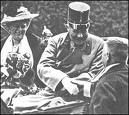



On June 28, 1914 (Sun.) after waiting seemingly forever in vain for his old fart uncle Austrian-Hungarian emperor (since 1848) Franz Joseph I (1830-1916) to die, and shooting 200K game animals in the meantime and mounting 5K in his palace hallway, Archduke Franz (Francis) Ferdinand (b. 1863), heir to the Hapsburg throne of Austria-Hungary and his morganitic wife (since 1900) Sophie, Duchess of Hohenberg (1868-1914) drive in their Graf und Stift automobile along the Appel Quay beside the Miliaca River in the Bosnian capital of Sarajevo, when a bomb is thrown onto their car, but bounces off, and they visit the Burgomaster and Bosnia-Herzegovina gov. Gen. Oskar Potiorek (1853-1933) at the town hall, who comments that Bosnians don't make two assassination attempts in the same day, causing the couple to decide to take off again to visit Potiorek's wounded aide-de-camp in a hospital; too bad, while driving to the hospital on Francis-Joseph St., the car stops to go into reverse after it discovers that they are back on the Latin Bridge on Appel Quay, and from the crowd consumptive Serb nationalist (Austrian subject) Gavrilo Princip (1894-1918) (whose portrait bears a striking resemblance to Hollywood actor Bobcat Goldthwait (1962)?), who with secret Serb military backing wants to create a Greater Serbia by breaking off Austria-Hungary's S Slav provinces in Bosnia assassinates the archduke and his wife with a Browning .380 pistol (serial #19074) (rediscovered in 2004) that had been given to him by the chief of the intel section of the Serbian gen. staff; the news is dispatched at 12:30 p.m., and by the next day Europe is buzzing with talk of Serbian intrigue, even though Serbia itself is later vindicated, and the archduke's own family ignores his funeral; instead of blowing over, this fractal moment in human history leads directly to the outbreak of World War I (ends Nov. 11, 1918) (1 of ?).
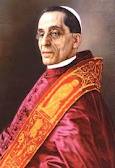

A good time for Eggs Benedict in the Vatican? The WWI pope is Jack Church? On Aug. 20, 1914 Pope (since 1903) Pius X (b. 1935) dies, and on Sept. 3 cardinal (since May 25) Giacomo Paolo Giovanni Battista della Chiesa (a man with diplomatic experience) is elected Pope (#258) Benedict XV (1854-1922), going on to steer a policy of Church neutrality in "the suicide of Europe" and establish a Vatican bureau for POWs to contact their families while making many unsuccessful attempts to negotiate peace, which piss off the gung-ho Catholics, starting with his call for a Christmas 1914 truce, which is ignored; meanwhile Belgian cardinal Desire (Désiré) Joseph Mercier (1851-1926), who attended Pius X's funeral returns to Belgium, finding that his Mechelen Cathedral was destroyed and 13 of his priests were killed by the Germans along with several civilians, causing him to prepare the Christmas pastoral Patriotism and Endurance, which is distributed by hand under the Germans' noses, causing him to be placed under house arrest and become the focus of Belgian resistance, with Benedict XV sending him a letter in 1916 saying "You saved the Church."
On Aug. 1, 1917 Pope Benedict XV submits a 7-Point Peace Proposal to the belligerents, incl. disarmament, arbitration, freedom of the seas, renunciation of indemnities, evacuation and restoration of occupied territories, and examination of conflicting territorial gains; too bad, prolonged negotiations achieve zilch.
In 1917 the New Code of Canon Law (Codex Juris Canonici), containing 2,414 canons in 5 vols. is promulgated by Pope Benedict XV, to take effect next May 19; a Catholic marrying a divorced person incurs excommunication, as does anybody joining a Masonic lodge - I stopped into a church I passed along the way, and pretended to pray?
On May 16, 1920 French toast Joan of Arc (1412-31) is canonized by Pope Benedict XV in Rome.

On Jan. 22, 1922 Pope (since 1914) Benedict XV (b. 1854) dies, and after a 5-day conclave (longest of the 20th cent.) on Feb. 6 Cardinal (since 1921, a total of only 8 mo.) Ambrogio Damiano Achille Ratti is elected Pope (#259) Pius XI (1857-1939), going on to strongly condemn Communism, and forbid the growing movement of devotion to Mary as a priest(ess) - too pagan even for them?
In 1926 Pope Pius XI bans Roman Catholic participation in the Action Francaise radical right-wing antisemitic movement in France. On Jan. 6, 1928 Pope Pius XI issues the encyclical Mortalium Animus, preaching against ecumenism as "the eternal death of soul and body in Hell" - like your sex life it's best just not to talk about it?
On Feb. 11, 1929 the Lateran Treaty is signed by Italy (ratified June 7), recognizing the 108.7-acre autonomous state of Vatican City, situated within the city of Rome as an independent state with the pope's temporal authority restored, while the papacy accepts the loss of the 17K sq. mi. papal states in return for 750M lire in cash and 1B lire in govt. bonds; on July 25 Pope Pius XI gives up his status of voluntary prisoner and leaves the Vatican for the 1st time; the activities of the Catholic youth org. Azione Cattolica remains a problem.
On Dec. 31, 1930 the encyclical Casti Connubii by Pope Pius XI castigates religiously-mixed marriages and divorce. On May 15, 1931 Pope Pius XI issues the encyclical Quadragesimo Anno, a 40-year update (supplement) to the 1891 encyclical "Rerum Novarum", calling for fairer distribution of wealth while condemning godless Communism and Socialism. Also in 1931 Pop Pius XI, bishop of Rome (pope) relinquishes all claims to territory within Italy except li'l ole Vatican City.
In Apr. 1933 Pope Pius XI inaugurates a holy year, which receives the endorsement of the U.S. pres. and his official family - after all, Good Catholic Adolf Hitler is doing so well and all?
On May 17, 1933 the Associations Law is passed in Republican Spain, abolishing church schools and nationalizing church property, plus other restrictions on the church, causing Pope Pius XI to protest in his encyclical Delectissimi Nobis.

The more the Church changes the more it stays the same, 1933 edition? On July 20, 1933 after negotiations by cardinal (since 1921) Michael von Faulhaber (1869-1952) and cardinal (since 1929) Eugenio Pacelli (1876-1958) (future Pope Pius XII) (fueled by the dissolution of the Catholic Center Party, formed in the days of Bismarck to protect their rights), Eugenio Pacelli for the Vatican and vice-chancellor Franz von Papen for pres. Paul von Hindenburg of Germany sign the Reichskonkordat (Concordat Between the Vatican and Nazi Germany, later becoming one of the worst skeletons in the Vatican's closet; they did it to ensure that the Nazis won't do to them what they are doing to the Jews, or because they secretly want them to get rid of the Jews from Europe for them, and just have to keep from leaving anything incriminating?; surprise, in 2023 a letter is discovering proving that he knew all about the Holocaust and concentration camps and did nothing to stop it; "With the concordat we are hanged, without the concordat we are hanged, drawn and quartered" (Faulhaber); "I had to choose between an agreement and the virtual elimination of the Catholic Church in the Reich", "a pistol had been held to my head", and I was negotiating "with the Devil himself" (Pacelli); on Dec. 22 the Catholic bishops of Austria release the statement "The concordat recently concluded between the Holy See and Germany does not mean that the Catholic Church approves of the three fundamental errors of Nazism... race madness... violent anti-Semitism... extreme nationalism"; after Faulhaber utters the soundbyte "Let us not forget that we were saved not by German blood but by the blood of Christ", and speaks out against euthanasia, the Nazis turn on him, but when they invade the Soviet Union in 1941 he supports them since they're fighting godless Communists, and in June 20, 1945 he protests maltreatment of Nazi Party and Wehrmacht members by the Allies; on June 29, 1951 he ordains new priests Georg Ratzinger (1924-) and his brother Joseph Ratzinger (1927-2022), who later becomes Pope Benedict XVI.
On June 29, 1936 Pope Pius XI issues the encyclical Vigilanti Cura, outlining the dangers of motion pictures to Catholics, and exhorting them to be vigilant - or end up needing to go-a to the doctor's office to get cured?

On July 17/18, 1936 the Spanish Civil War begins (ends 1939) between the ruling Popular Front (Loyalists) of leftists, incl. Communists, Socialists, Syndicalists, and Liberal Repubs. and the rightists (Nationalists), incl. Conservative Repubs., clericals, and monarchists; on July 28, 1936 the repub. loyalist govt. of Spain confiscates all Roman Catholic Church property, pissing off Pope Pius XI and causing him to recognize Franco's Fascist govt. on Aug. 27, 1937.
On Mar. 14, 1937 Pope Pius XI issues the encyclical Mit Brennender Sorge (with burning sorrow), condemning Nazi doctrines in veiled language - the curse of the wererabbit? On Mar. 19, 1937 Pope Pius XI issues the encyclical Divini Redemptoris, with the soundbyte "Since Communism is intrinsically evil, whoever wants to save Christianity and civilization from destruction must refrain from aiding it in the prosecution of any project whatever", becoming an official papal declaration of war against godless Communism.

In June 1938 Pope Pius XI commissions Am. Jesuit John La Farge Jr. (1880-1963) (son of the artist) to write the encyclical Humani Generis Unitas (On the Unity of the Human Race), expressly condemning Nazi anti-Semitism, but popey dies before it can be pub.? - the world is turning over a new leaf, not?
On Sept. 2, 1938 Pope Pius XI tells German pilgrims that no Christian can take part in anti-Semitism since all Christians are Semites - a pox upon the house of Mussolini?

On Feb. 10, 1939 Pope (since 1922) Pius XI (b. 1857) dies, leaving the anti-racist encyclical Humani Generis Unitas (The Unity of the Human Race) explicitly condemning Nazi anti-Semitism unsigned, and on Mar. 2 Cardinal (since 1929) (papal secy. of state and chief adviser to Pius XI) Eugenio Pacelli is elected Pope (#260) Pius XII (1876-1958); he is formally crowned on Mar. 12, setting his prime objects as 1: a new translation of the Psalms, 2: a definition of the Dogma of the Assumption, and 3. excavations under St. Peter's Basilica in Rome to find out if St. Peter is actually buried there; a confusing mixture of black and white comes out of the chimney of the Sistine Chapel after his election, raising eyebrows, later remembered after the smoke incident during the 1958 election of modernist pope John XXIII.

Here comes the Sun, or, You're the one that I want, ooh-hoo-hoo? On Mar. 28, 1939 after Nationalist Gen. Emilio Mola Vidal (1887-1937) announces that Franco's forces are advancing on Madrid in four columns, and that a "fifth column" of sympathizers is waiting in the city (causing the phrase to catch on), loyalist-held Madrid and Valencia surrender, and the Spanish Civil War (begun 1936) ends after nearly 1M deaths, incl. 700K lost in battle, 30K executed or assassinated, and 15K killed in air raids; "Caudillo" (Spanish for Fuehrer) Franco becomes "supreme chief, responsible only before God and history", ruling with an iron hand, ending civil rights and eliminating all opposition while giving the Church and landed aristocrats all they want; on Apr. 1 the U.S. recognizes Gen. Franco's govt.; Pope Pius XII congratulates and blesses Franco's Holy V; Franco's govt. sets up special tribunals that convict hundreds of loyalist leaders, thumbing their noses at Britain and France?



In 1939-45 horrific $3.5T World War II resulted in 24M military and 49M civilian deaths, and featured the low point of the Jewish Holocaust (Shoah) by the German Nazis, I guess it was the Jews' fault for not ransoming themselves to go to Israel before they could round them up for the camps. The whole experience turned Jews from lovers into fighters, ramping up the Zionist movement with full world sympathy and support by new world superpower U.S., which had its own guilt trip because on Nov. 24, 1942 Budapest-born Am. Zionist leader Rabbi Stephen Samuel Wise (1874-1949) announced in a press conference in Washington, D.C. that he was authorized by the U.S. State Dept. to confirm that the Nazis had murdered 2M Jews as part of a plan to exterminate all Jews in Europe; too bad, the nat. newspapers didn't consider it front page news, and the U.S. govt. did nada. After the war ended and Americans toured the concentration camps in horror, Polish-born Jewish scholar Raphael Lemkin (1900-59), who single-handedly led an unsuccessful campaign to get the League of Nations to give internat. protections against genocide starting in 1933 finally got what he wanted after his own people got it, namely the Dec. 9, 1948 U.N. Convention on the Prevention and Punishment of the Crime of Genocide (Gen. Assembly Resolution 260), which didn't come in force until Jan. 12, 1951, and which the U.S. still didn't ratify until 1988.
On Jan. 21, 1940 Pope Pius XII broadcasts a speech from the Vatican about the plight of Polish civilians, 15K of whom have died in the war, with the soundbyte: "The horror and inexcusable excesses committed on a helpless and a homeless people have been established by the unimpeachable testimony of eyewitnesses"; on Jan. 23 in another broadcast he condemns the existence of concentration camps and condemns Nazi persecution of the Jews.
On May 7, 1940 the Concordat of 1940 is signed in Vatican City by Portugal and the Holy See, limiting Church power in Portugal while throwing them a bone in that canonical marriages are not allowed to obtain a civil divorce, resulting in 91% of all marriages being canonical by 1960.
On June 13, 1940 Pope Pius XII issues the encyclical Saeculo Exeunte, honoring Portugal's 800th anniv., calling for it to modernize missionary work.
I'm so hot, not? On Dec. 31, 1940 Pope Pius XI issues the teaching document Casti Conubii (Chaste Christian Marriage), saying that any sex not in the context of marriage for procreation and education of children as an act of love is immoral; the Roman Catholic Church remains the only major denomination in this cent. that still promotes chastity and condemns contraception?
On June 12, 1941 the Croatian Ustashi Roman Catholic militant group, led by "Croatian Fuhrer" Ante Pavelic makes a deal with pro-Nazi Muslim Jerusalem grand mufti Muhammad Amin al-Husayni and the Nazi SS to begin persecuting Jews and Orthodox Christian Serbs in Croatia, causing the mufti to raise the Nazi 13th SS Handzar Div. of Bosnian Muslims that help murder 400K in Croatia and Bosnia-Herzegovina by 1945; Pope Pius XII officially backs Pavelic, and he is given sanctuary in the Vatican at the end of the war before escaping to Argentina.

On June 30, 1946 the Three Times Yes (3xTAK) (People's) Referendum in Poland is rigged to show overwhelming support for the Polish Communist Party, after which Communist Atheist Stalin puppet Wladyslaw Gomulka (1905-82) leads the Commies in winning the 1947 legislative elections, calling himself "the hegemon of Poland"; allegedly Stalin was told that the pope will never agree to an atheist Communist regime in Roman Catholic Poland, and he replies "How many divisions does the pope have?"

On July 7, 1946 Italian-born Mother Francis Xavier Cabrini (1850-1917) is canonized as the first Am. saint by Pope Pius XII, who also creates 32 new cardinals on Feb. 18 - payback for the war?
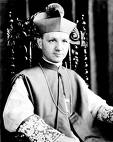
On July 20, 1946 Joseph Elmer Ritter (1892-1967) is appointed by Pope Pius XII as archbishop #4 of St. Louis, Mo., going on to end segregation in the city's parochial schools next year, fending off threats of charges under state segregation laws by pointing out that Church law automatically excommunicates anybody bringing charges against a bishop in a secular court; he also requires written permission to be given for any Catholic in his diocese to attend a non-Catholic or secular college.

Join us for lots of laughs at Atheist HQ in Hungary? On Dec. 26, 1948 after religious orders are banned, Hungarian Roman Catholic Cardinal Jozsef Mindszenty (1892-1975) and other dignitaries are arrested on treason and conspiracy charges by the Communists as part of their atheistic wave of persecution of the Mean Old Church; he had already been arrested on Nov. 26, 1944 and released in Apr. 1945, but this time it's meant to be permanent. On Feb. 8, 1949 after releasing a "Yellow Book" listing his coerced confessions, Mindszenty is sentenced to life in prison for treason by the Commies, causing him to seek asylum in the U.S. embassy in vain; on Feb. 12 Pope Pius XII excommunicates all persons involved in his trial and conviction; he is not released from priz until Oct. 30, 1956.

On July 13, 1949 the Vatican excommunicates all Roman Catholics who follow or teach the Communist doctrine, and denies sacraments to all who "consciously and freely" support Communist activities. On Aug. 8, 1949 the Holy Office of the Vatican sends an official declaration of the Catholic dogma "extra Ecclesiasm nulla salus" ("Outside the Church there is no salvation"), which pisses-off Am. Jesuit priest Leonard Feeney (1897-1978), who is excommunicated on Feb. 13, 1953 and starts his own movement called Feeneyism, founding the Slaves of the Immaculate Heart of Mary, finally being reconciled with the Church in 1972 without being required to recant; his pub. "The Point" is filled with yummy anti-Semitic Catholic tidbits, incl. "During two thousand years, the Jews have remained the msot tenacious, dangerous foes of Christ and His Church"; "Since American newspapers are a typical product of that unholy ferment which has been agitating the Western world since the time of the French Revolution, it is quite easy to isolate one cause of their being the way they are; namely, the influence of the Jews... The Jewish race constitutes a united anti-Christian bloc within Christian society, and is working for the overthrow of that society by every means at its disposal"; "Those two powers, the chief two in the world today, are Communism and Zionism. That both movements are avowedly anti-Christian, and that both are in origin and direction Jewish, is a matter of record"; "As surely and securely as the Jews have been behind Freemasonry, or Secularism, or Communism, they are behind the 'anti-hate' drive. The Jews are advocating tolerance only for its destructive value - destructive, that is, of the Catholic Church. On their part, they still keep alive their racial rancors and antipathies" - it's nice to have the Absolute Truth?
On June 30, 1950 Pope Pius XII excommunicates all plotters against legitimate ecclesiastical authorities. On Aug. 12, 1950 Pope Pius XII declares this year a Holy Year (#25) (last one in 1933), and issues the encyclical Humani Generis, affirming the Thomist philosophy of St. Thomas Aquinas as the basis of Catholic doctrine, and condemning all departures from it, incl. all neo-modernism, and delinking the creation of body and soul, allowing Darwinian Evolution to be considered as a serious hypothesis that doesn't contradict essential Church teachings; on Nov. 1 he climaxes, er, witnesses the "Miracle of the Sun" at the Vatican, and pronounces the dogma of the corporeal Assumption of the Virgin Mary.
In 1950 the Catholic Patriotic Assoc. is set up by the Red Chinese to help push the Roman Catholic Church underground. In 1951 Red China forces its millions of Roman Catholics to cut ties with the Vatican; the pope can be recognized as a spiritual leader, but worship is allowed only in govt.-controlled churches, causing millions to meet illegally in underground churches.
In 1953 Communist Party of Am. propaganda dir. Manning Johnson testifies to the U.S. Congress, claiming that Marxists have infiltrated Roman Catholic seminaries and divinity schools to "make it possible for a small Communist minority to influence the ideology of future clergymen in the paths most conducive to Communist purposes" - Pope Francis?
On May 29, 1954 Pope Pius XII canonizes Pope (1903-14) Pius X (1835-1914), declaring him a saint. In 1956 Pope Pius XII okays cornea transplants, but prohibits monkey gland rejuvenation.


On Oct. 9, 1958 (the day that the Yankees defeat the Braves by 4-3 in Game 6 of the World Series) Pope (since 1939) Pius XII (b. 1876) dies at Castel Gandolfo, becoming the last pope to be tested for death with a silver hammer, and on Oct. 28 Cardinal (since 1953) Angelo Giuseppe Roncalli, patriarch of Venice (a sgt. in the Italian army in WWI) is elected Pope (#261) John XXIII (1881-1963), and is crowned on Nov. 4, shocking the Roman Catholic world by selecting a name not used since Avignon Antipope John XXIII (1370-1419), who preached aberrant doctrines on Purgatory and the Final Judgment, and allegedly recanted on his deathbed (although he did canonize St. Thomas Aquinas, ain't that enough?); the tiny grayish puff of smoke from the chimney of the Conclave in the Sistine Chapel (it's supposed to be white to signal a decision, black to signal no decision, and was also jumbled in the 1938 election of Pope Pius XIII) causes grumbling, with some claiming that the pope really elected was conservative cardinal (since 1953) Giuseppe Siri (1906-89) of Genoa, who was forced to resign under duress for modernist Roncalli, who went on to allow Catholics to become Freemasons, write an apostolic letter in June 1960 on the "Precious Blood of Jesus", making it more important than the Crucifixion or Resurrection, and convene the Second Vatican Council in 1962, sparking the Sedevacantist Movement (Lat. "sede vacante" = the see is vacant), which claims that all popes from him until ? are illegitimate anti-pope imposters, and/or are controlled by a OWG Zionist/Jewish conspiracy; meanwhile the rockin' new pope has a bowling alley built in the Vatican. In 1976 the anon. book The Prophecies of Pope John XXIII is pub. in Italy, claiming that he was a secret member of the Rosicrucians since 1935; St. Malachy's Prophecy of the Succession of the Popes calls John XXIII "Pasteur et Nautonnier" (Shepherd and Navigator), the latter being the official title of the mysterious Priory of Sion.
In 1958 Pope John XXIII dedicates the Supreme Religious Center for World Jewry in Jerusalem.

On Jan. 25, 1959 Pope John XXIII announces plans for the Second Vatican Council. On Dec. 2, 1960 Canterbury archbishop (1945-61) Geoffrey Francis Fisher, Baron Fisher of Lambeth (1887-1972) becomes the first head of the Anglican Church to visit the pope, spending an hour with modernist Pope John XXIII in the Vatican.
On May 15, 1961 Pope John XXIII issues the encyclical Mater et Magistra, condemning materialism and stressing the need for social justice, asking for workers to be given a greater voice and appealing for aid to underdeveloped areas - sounds safe?



On Jan. 3, 1962 Pope John XXIII excommunicates Cuban Commie dictator Fidel Castro (1926-) - I'll bet he's real hurt? On Mar. 12, 1962 after visiting Rome, where she talks with Pope John XIII in French, Jacqueline Kennedy and her sister Princess Lee Radziwill arrive in New Delhi on a 2-week goodwill tour. On Oct. 11, 1962 the 1st session of the Second Vatican (21st Ecumenical) Council (Vatican II) (ends 1965) (first since 1869) of 2.7K prelates is convened by Pope John XXIII to set policies for the modernization of the medieval hidebound Roman Catholic Church; on Dec. 8 it closes after voting 2,165-9-1 to reinstate the Catechumenate, and prohibiting contraceptives; peace activist Sister Mary Luke Tobin (1908-2006) of Denver, Colo. is the only U.S. woman to participate in the council; polyglot Cardinal (since 1936) Eugene Tisserant (1884-1972), dean of the Sacred College, who negotiated the secret Metz Accord (Pact) (Vatican-Moscow Agreement) allowing Eastern Orthodox participation in return for non-condemnation of atheist Communism is the 2nd person to sign all official acts of Vatican II after the pope.
The Big Thaw of the Catholic Church vis a vis Communists begins? On Mar. 8, 1963 Nikita Khrushchev's son-in-law meets with Pope John XIII in the Vatican. On Apr. 11 Pope John XXIII issues the encyclical Pacem in Terris (beginning "Peace on Earth, which man throughout the ages has so longed for and sought after, can never be established, never guaranteed, except by the diligent observance of the divinely established order"), calling for a world community of nations to ensure peace, thawing out relations with the godless Commies, and follows this up with a private audience with Khrushchev's daughter; too bad, the Greek Orthodox Church rejects it, saying they'll never accept papal infallibility; on Apr. 21 JFK attends the centennial observances of Roman Catholic Boston College, saying that he approves the encyclical, adding "I am proud of it. As an American I have learned from it".

On May 12, 1963 Pope John XXIII calls on Italian pres. (1962-4) Antonio Segni (1891-1972), becoming the first papal visit to a pres. of the Italian Repub. (founded 1946), and the 2nd visit to an Italian head of state - the visit was about the Illuminati conspiracy?

I'm number 262, and my church smells like PU? On June 3, 1963 Pope (since 1958) John XXIII (b. 1881) dies, ending his program of reaching an accomodation with Communist regimes, and on June 21 Cardinal (since 1958) Giovanni Battista Montini is elected Pope (#262) Paul VI (1897-1978), and crowned on June 30; the cardinals bow to the demands of the media and use black (no decision) and white (decision) smoke bombs in the chimney; JFK says that the deceased pope "brought compassion and understanding drawn from wide experience to the most divisive problems of our tumultuous age"; his death slows U.S. efforts to normalize relations with Cardinal Jozsef Mindszenty, er, Hungary.
On Aug. 27, 1963 Rev. Gerald M.C. Fitzgerald, head of the Servants of the Holy Paraclete in N.M. writes a letter to Pope Paul VI recommending the removal of pedophile priests from active ministry and defrocking of repeat offenders; he never reads it?; it is released during a $660M lawsuit against the Roman Catholic Archdiocese of Los Angeles, Calif. by 500 victims of sexual abuse by clergy.
On Sept. 29, 1963 the Second Session of Vatican II is opened by Pope Paul VI, who appeals for Christian unity; on Dec. 4 the session ends after authorizing the use of vernacular languages in the Mass and sacraments.

On Jan. 5, 1964 Pope Paul VI visits Jerusalem, conferring with Ecumenical Patriarch (1948-72) Athenagoras I (1886-1972) in the first meeting between the Latin and Greek Catholic Church heads since the 15th cent; in his honor the winding road leading up to Mount Zion (the closest Jews are allowed to get to their ancient temple by the Jordanians) is paved and named Pope's Way.

On Sept. 14, 1964 the 3rd Session of Vatican II opens, and ends on Nov. 21 with the constitution De Ecclesia, providing for power-sharing between the pope and bishops, and calling for eventual Christian unity while recognizing the autonomy of the Eastern Orthodox churches. On Nov. 13, 1964 Pope Paul VI donates an expensive tiara to be used for the poor - what about the other zillion expensive treasures in the Vatican? On Nov. 21, 1964 after the Vatican II bishops approve it by 2,151 to 5, Pope Paul VI promulgates Lumen Gentium (Light of the Nations), the Dogmatic Constitution of the Church, which contains the words "The plan of salvation also incl. those who acknowledge the Creation. In the first place amongst these are the Mohammedans"; on Nov. 23 Vatican II abolishes Latin as the official language of the Roman Catholic liturgy; on Nov. 29 the U.S. Roman Catholic Church institutes sweeping changes in the liturgy, incl. the use of U.S. English rather than Latin. On Sept. 14, 1965 the 4th (Last) Session of Vatican II opens, with Pope Paul VI announcing that a synod of bishops will collaborate in governing the church; Greek Orthodox archbishop Athenagoras I agrees with Pope Pius VI to a revocation of the mutual excommunication decrees of 1054 - here it's all about tradition? On Oct. 4, 1965 Pope Paul VI becomes the first reigning pope to visit the Western hemisphere, addressing the U.N. Gen. Assembly in New York City, and celebrating Mass before a crowd of 90K at Yankee Stadium, calling for generalized meaningless peace?; Rosemary and Guy Woodhouse watch the TV coverage, then she has sex with the Devil, and the pope visits her in a vision with a red suitcase, telling her "They tell me you have been bitten by a mouse"? (Rosemary's Baby) On Oct. 28, 1965 the Second Vatican Council (Vatican II) issues a number of declarations, all validated by Pope Paul VI, incl. Nostra Aetate (In Our Age), drafted by Jesuit scholar cardinal (since 1959) Augustin Bea (1881-1968), which denounces anti-Semitism and absolves Jews of collective guilt for the crucifixion of Christ; it also says "The Church regards with esteem also the Moslems... Since in the course of centuries not a few quarrels and hostilities have arisen between Christians and Moslems, this sacred synod urges all to forget the past and to work sincerely for mutual understanding and to preserve as well as to promote together for the benefit of all mankind social justice and moral welfare, as well as peace and freedom" - I'll tell all my murdered ancestors?

1966 is the biggest Millennium Fever (MF) year in the 20th cent., featuring the hit film Rosemary's Baby (which actually debuts on June 12, 1968), proving that Hollyweird can make money on anything; a new Death of God Theology rocks Protestant churches even more than the Secular Theology of the early 1960s. On Mar. 23, 1966 English Canterbury archbishop (1961-74) Arthur Michael Ramsey (1904-88) visits Pope Paul VI as a first step in reconciling their churches - are Catherine of Aragon's descendants still mad at us?
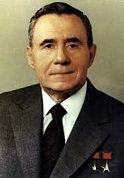
On Apr. 27, 1966 Pope Paul VI grants an audience to Soviet foreign minister Andrei Gromyko (1909-89), becoming the first official meeting between the leaders of the Roman Catholic Church and Soviet Union, beginning the Great Vatican Thaw; "Smiling broadly, [he] met Gromyko at the door of the library and held out both hands in greeting." (Newsweek) On June 14 the Roman Catholic Index of Forbidden Books (Index Librorum Prohibitorum) (begun in 1559 by Pope Paul IV) is officially abolished by Pope Paul VI (IV and VI are like bookends?), ending the horrible Inquisition, although it retains its "moral force" - millions of Catholics race to catch-up on their reading - not? On Nov. 17 Pope Paul VI issues the bull Paenitemini, and on Nov. 18 U.S. Catholic bishops do away with the rule against Eating Meat on Fridays, after which fish sales drop then rebound - that proves it's the 666 year?
A magic moment when the true meaning of Islam peeks out? On July 25-26, 1967 Pope Paul VI visits Istanbul, meeting with Patriarch Athenagoras I and dropping to his knees in prayer in the hair-trigger Hagia Sophia, pissing off Turkish officials, whose ancestors killed a shitload of Christians to prevent that?; on Oct. 26 the patriarch visits the Vatican. On Dec. 8, 1967 Pope Paul VI establishes the World Day of Peace.
The ice has been moved to the door for more space where you need it? On June 29, 1968 at St. Peter's in Rome Pope Paul VI disregards a papal commission that recognized the threat of world overpop. and recommended approval of certain types of birth control, and issues the encyclical Humanae Vitae, reaffirming the Church's opposition to abortion and to all contraception except the rhythm method; U.S. Catholics pooh-pooh it and get back to their birth control pills et al.; the encyclical shocks the world and derails Vatican efforts to obtain Roman Catholic participation in the World Council of Churches (WCC) assembly in July in Uppsala, Sweden (held every six years). On Aug. 22-24, 1968 Pope Paul VI visits Bogota, Colombia for the 39th Internat. Eucharistic Congress, becoming the first reigning pope to visit Latin Am. - to remind them not to quit breeding like rabbits for Holy Mother Church? Also in 1968 Pope Paul VI orders the disbanding of the Noble Guard and Palatine Guard of Honor, leaving only the Vatican Gendarmerie and the Swiss Guard (until 1971).


On July 31-Aug. 2, 1969 Pope Paul VI visits Uganda, becoming the first African visit by a reigning pope, and tries unsuccessfully to settle the Nigerian civil war. The more the Church changes the more it stays the same - stay tuned? Also in 1969 Pope Paul VI names 33 new cardinals and eliminates over 200 saints from the liturgical calendar; to really add insult to injury the Church finally admits that Jesus' closest disciple Mary Magdalene wasn't really a whore, as it had claimed since the year 591; even worse, the good ole tried-and-true good-enough-for-pa-and-ma 16th cent. Tridentine (Roman Rite) Latin Catholic Mass is replaced by the Novus Ordo Missae, replacing the Latin liturgy by the native language of the individual congregations, with the priest facing the congregation instead of the altar, and permitting lay readers, all causing ultra-conservative Catholics, incl. actor Mel Gibson's daddy Hutton Peter Gibson (1918-) (the 1968 "Jeopardy!" grand champ, with a genius IQ, who later becomes a Holocaust denier) to freak and become Sedevacantists (Lat. "sede vacante" = "the see is vacant"), who claim that all popes from John XIII (1958-63) are imposters, and archbishop Marcel Francois Lefebvre (1905-91) to found the Society of St. Pius X in Switzerland, denouncing Vatican openings to other religions as a "horrible apostasy" that puts Catholicism on an equal footing with other Satan-run faiths, and will lead the Church into "neo-modernist and neo-Protestant tendencies"; in Mar. 2003 Hutton gives an interview to the New York Times Mag. claiming that Vatican II was a "Masonic plot backed by the Jews", and also utters the soundbyte "The greatest benefit anyone can have is to be a Catholic. You have the lifelong satisfaciton of being right" - go spread the word, vote no on V2?
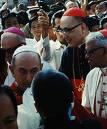

On Sept. 12-17, 1970 the World Congress on the Future of the Church in Brussels, Belgium is attended by 700 "far out" theologians, and ends up recommending democratization and decentralization of the Roman Catholic Church, plus a greater role for women; meanwhile on Sept. 27 Pope Paul VI declares St. Teresa of Avila (1515-82) the first woman doctor of the Church, followed on Oct. 4 by St. Catherine of Siena (1347-80), then on Oct. 12 sends a message to a convention of Catholic physicians, declaring legal abortion the equivalent of infanticide, and calling for "absolute respect for man from the first moment of his conception to his last breath of life" - what role? what democracy? Humanae vitae was just 2 years ago, remember? On Nov. 23, 1970 Pope Paul VI issues the encyclical Motu Proprio, decreeing a voluntary retirement age of 75 for Curia officials and that cardinals past 80 should no longer vote for pope - their sperm motility is no longer appropriate, and that's as far as we'll go with democratization at this time? On Nov. 26-Dec. 6, 1970 Pope Paul VI goes on a journey through Southeast Asia, the Philippines, Samoa, and Australia; on Nov. 27 (9:30 a.m.) after disembarking from his chartered DC-8 jet he is slightly wounded at the Manila airport by kris-wielding surrealist Bolivian painter Benjamin Mendoza y Amor Flores (1935-), who later utters the soundbyte "I acted alone to save humanity from superstition"; on Apr. 21, 1971 Mendoza is sentenced to an indefinite prison sentence, and later released from Manila's Bilibid Prison and deported to Bolivia - disguised as a priest? Welcome to Last Comic Standing? The once almighty Roman Catholic Church is reduced to soundbyte artists? In 1970 anti-war anti-desegregation human rights activist (dean of Boston College Law School since 1956) Rev. Robert Frederick Drinan (1920-2007) (a Jesuit who just returned from a trip to Vietnam where he claims to have discovered that the number of political prisoners being held in South Vietnam is rapidly increasing) becomes the first Roman Catholic priest to serve as a voting member of the U.S. Congress, over the objections of his superiors, being elected after defeating longtime Dem. Rep. Philip J. Philbin in a primary; after urging the Church to condemn the Vietnam War as "morally objectionable" and becoming the first member of Congress to call for Nixon's impeachment (for the undeclared war against Cambodia) he steps down in 1980 after Pope John Paul II issues a worldwide directive barring priests from holding public office; he later testifies against Clinton's impeachment, saying that it should be for an official not private blow, er, act; the only other Roman Catholic priest to serve in Congress is Robert John Cornell (1919-) of the White Canon Norbertine Order, who is elected to two House Terms in Wisc. and serves from Jan. 1975-Jan. 1979. Also in 1970 Pope Paul VI declares priestly celibacy to be a fundamental principle of the Roman Catholic Church - send in the clowns or run for cover?

On Mar. 29, 1971 Yugoslav pres. (since 1945) Josip Broz Tito (1892-1980) becomes the first Communist leader to officially meet with the pope (Paul VI) during a formal state visit to Italy - titopapa jokes here? On Sept. 28, 1971 after Pope Paul VI annuls the excommunications of his political opponents and calls him a "victim of history" (intead of Communism), Hungarian Cardinal Jozsef Mindszenty ends a 15-year exile in the U.S. embassy in Budapest (since 1956), and moves to Vienna; too bad, the pope decides he's too old to be primate of the Hungarian Roman Catholic Church, and offers a deal to publish his memoirs if he steps down, but he refuses - I'm plum worn out not? In 1971 Pope Paul VI dissolves the Vatican Gendarmerie, leaving only the Swiss Guard to run security in Vatican City, although Italian police patrol St. Peter's Square.

In 1971 Hans Kung (Küng) (1928-) of Switzerland pub. Infallible? An Inquiry, becoming the first major Roman Catholic theologian in the 20th cent. to question papal infallibility; on Dec. 18, 1979 he is stripped of his license to teach as a RC theologian but is not excommunicated.
On June 29, 1972 (9th anniv. of his coronation) Pope Paul VI utters the soundbyte that "the smoke of Satan" has entered the Church.
On Aug. 15, 1972 Pope Paul VI issues the encyclical Motu Proprio Ministeria Quaedam, replacing the term "minor orders" with "ministries" (reader, acolyte, etc.) and abolishing mandatory tonsure for seminarians, ending a practice going back to the late 5th cent. C.E. - the Beatles strike again?

In Dec. 1973 Pope Paul VI offers to collaborate on a solution to the Middle East problem, causing visits by Arab and African leaders; he also finally strips exiled Hungarian Cardinal Jozsef Mindszenty (d. 1975) of his titles and declares his seat vacated, but refuses to fill the seat while he remains alive; he also canonizes 19th cent. Spanish Little Sisters of the Poor founder nun St. Teresa of Jesus Jornet Ibars (1843-97).

On Sept. 14, 1975 Pope Paul VI declares Mother St. Elizabeth Ann Bayley Seton (1774-1821) the first U.S.-born Roman Catholic saint. Also in 1975 Pope Paul VI chooses this year as a holy year; the last was 1950; he canonizes five saints, and becomes the first pope to kiss the feet of an envoy of the Orthodox Patriarch - does that make him the Roman Idol?

On June 7-9, 1977 Hungarian Communist Party first secy. (since 1956) Janos Kadar (1912-89) meets with Pope Paul VI at the Vatican, marking "new progress" in relations with the Church.

On June 19, 1977 Pope Paul VI proclaims Bohemian-born 19th-cent. Philadelphia bishop John Nepomucene Neumann (1811-60) as the first male U.S. saint.


The Beatles become so popular in Rome that there are two popes named John-Paul in one year, or, The Walrus is Paul, or, Ratti, Pacelli, Roncalli, Montini, Luciani, Wojtyla - which name doesn't seem to fit? On Aug. 6, 1978 Pope (since 1963) Paul VI (b. 1897) dies suddenly at Castel Gandolfo, and on Aug. 26 Cardinal (since 1973) Albino Luciani (don't call him Lucky) is elected Pope (#263) John Paul I (1912-78) (first born in 20th cent.); the funeral is on Aug. 11; Paul VI's body is only lightly embalmed by the Signoracci family (who also embalmed John XXIII in 1963, and soon, John Paul I), and after two days on display in the hot summer his skin and fingernails begin losing their color; early on Sept. 28 John Paul I dies after 33 days in office (5 weeks) (shortest in papal history until ?) (about the same as Pope Adrian V in 1276?) (Leo XI in 1605 lasted 8 weeks) under mysterious circumstances (his heart medicine, or deliberately poisoned?) while allegedly reading a copy of Thomas a Kempis' Imitation of Christ (Pope Paul VI's 1975 decree that autopsies are "undignified and unnecessary" is cited); funeral services are held at the Vatican for him on Oct. 4; on Oct. 16 58-y.-o. Cardinal (since 1967) Karol Wojtyla, archbishop of Cracow (Krakow) is elected Pope (#264) John Paul II (1920-2005), becoming the first non-Italian pope in 455 years since Adrian VI of Utrecht (1522-3), and the first pope under age 60 since Pius IX in 1846, going on to win frequent-flier miles, visiting over 50 nations in six continents; his goal is to keep the Church the same, like all the other popes?; during his days as a bishop in Poland he wrote the play The Jeweler's Shop (pub. Dec. 1960); the 1990 film The Godfather, Part 3 claims a plot by internat. bankers, the Vatican, and the Mafia.
In 1978 Roman Catholic priest Michael Teta arrives in the diocese of Tucson, Ariz., beginning a reign of terror on boys, molesting them in the confessional et al.; despite pleases from his bishop Manuel Moreno, who describes him as "Satanic", future Pope Benedict XVI, head of the Congregation of the Doctrine of the Faith takes charge of the case in June 1992, then sits on it until he becomes pope, then forces him to retire without defrocking him, which is not publicized until 2010.

On June 2, 1979 just 8 mo. after his consecration, Pope John Paul II returns to his native Poland for a triumphal 9-day visit (ends June 10), challenging its Communist leaders while urging the people to "not be afraid"; after the big success, the Vatican bankrolls the Solidarity Movement, and Communism in Poland starts to crack. On Sept. 29-31, 1979 John Paul II becomes the first pope to visit troubled Ireland for a 3-day tour on the anniv. of his predecessor's death, pleading for an end to violence in North Ireland - come to mama? On Oct. 1, 1979 Pope John Paul II arrives in Boston, Mass. for the start of a 6-day U.S. visit (ends Oct. 6); on Oct. 5 he holds a mass for 1M in Grant Park in Chicago, Ill.; on Oct. 6 he becomes the first pontiff to visit the White House, where he is received by Mr. Peanut Jimmy Carter, who is still bragging about his killer rabbit battle? On Nov. 30 John Paul II becomes the first pope in 1K years to attend an Eastern Orthodox Catholic mass; on ? he visits the Hagia Sophia in Istanbul, Turkey and refrains from outward gestures of worship while zealous Muslim Turkish officials look over his shoulder, still pissed-off by Pope Paul VI's 1967 power-grab. Also in 1979 Pope John Paul II decrees that the New Vulgate Bible is to be used in Roman Catholic liturgy.
On May 30, 1980 Pope John Paul II arrives in France on the first visit by the head of the Roman Catholic Church since the early 19th cent. - the churches are still empty on Sundays? On July 9, 1980 Pope John Paul II visits Brazil; too bad, seven are crushed to death in the crowd trying to meet him.
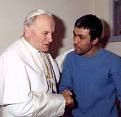
On May 13, 1981 (Sun.) Pope John Paul II (1920-2005) is shot twice in the abdomen and hand by Turkish Muslim assassin Mehmet Ali Agca (1958-) as he enters St. Peter's Square; a year earlier Agca (who was suffering from fantasies about being the Messiah?) escaped from a military prison where he was serving time for killing journalist Abdi Ipekci in 1979, and evaded mandatory Turkish army service; on May 18 the pope publicly forgives him from his hospital bed, attributing his recovery to the Virgin of Fatima, and leaves the hospital in Rome on June 3 and returns to the Vatican after three weeks, then meets with him in his prison cell in Rome in 1983 for 21 min., personally pardoning him; on June 9 the Italians link the Communist Bulgarians to the attack; on July 22 Agca is sentenced to life in prison after a 3-day trial, and on June 13, 2000 he is extradited to Turkey to serve a 10-year sentence for murdering Turkish journalist Abdi Ipekci (b. 1929) on Feb. 1, 1979, plus another 7 years 4 mo. for two 1979 Turkish robberies, then released on parole on Jan. 12, 2006 after an Istanbul court rules in 2004 that he should only serve the longer sentence, which is 36 years, less 6 mo. he served before escaping to assassinate the pope, minus 10 years for a 2000 amnesty, minus 20 years for his time in prison in Italy; on Jan. 18, 2010 he is released from prison in Turkey after 19 years, saying that he wants to visit John Paul II's tomb and meet Pope Benedict XVI; on Feb. 1, 2013 he pub. a memoir claiming that Ayatollah Khomeini told him to do it.
In Sept. 1981 Pope John Paul II issues the encyclical Laborem Exercens, proposing a new economic order that is neither Capitalist nor Marxist based on the dignity of work and the rights of workers - Dignitism? Also in 1981 Cardinal Joseph Ratzinger of Germany is appointed guardian of the Roman Catholic Church's doctrinal orthodoxy, becoming one of the key men relied on by Pope John Paul II to silence dissident theologians.

On May 12, 1982 in Fatima, Portugal, security guards overpower Spanish Roman Catholic priest (who lives in France) Juan Maria Fernandez y Krohn (1948-), who is armed with a bayonet while trying to reach Pope John Paul II at the altar, who is visiting to thank his dream babe Mother Mary for saving him from the previous assassination attempt; Krohn's seminary was founded by Marcel Lefebvre, who was suspended by the pope for opposition to Vatican II; in Oct. at his trial Krohn says the pope "betrayed the Church and encouraged Communism through compromise with Soviet Bloc countries", adding that he got the idea from seeing Sadat's assassination on TV; he is sentenced to six years and serves three, leaving the priesthood and moving to Belgium, where he becomes an atty., getting into several brushes with the law - JPII mentioned Fatima in his first close call?
On May 29, 1982 Pope John Paul II makes the first papal visit to Britain since 1531, and visits Canterbury Cathedral and embraces the archbishop of Canterbury Robert Runcie and prays with him at the tomb of St. Thomas Becket, becoming the latest in a long line of pilgrims that incl. King Henry II of England, King Louis VII of France, and Renaissance scholar Erasmus.
Also in 1982 the Vatican's Inst. for Religious Works (Vatican Bank) goes bankrupt, and, after the ultra-right Roman Catholic org. Opus Dei transfers almost $1B to it, Pope John Paul II elevates the latter to a "personal prelature of the Pope", an official sanction of all their practices.
On Jan. 1, 1983 Pope John Paul II declares this year to be an extraordinary Holy Year to mark the 1950th anniversary of the death and resurrection of Jesus Christ in 33 C.E. On Jan. 25, 1983 Pope John Paul II signs the new Code of Canon Law, incorporating Vatican II changes, expanding women's rights in the Church, and promoting ecumenism - oxymorons? On Mar. 9, 1983 Pope John Paul II visits Haiti, snubs the Duvaliers, and declares publicly "Things must change here"; on Mar. 10 he ends his visit to seven Central Am. countries. On June 16, 1983 Pope John Paul II visits his native Poland; NBC and ABC provide live coverage, while CBS airs "The Price Is Right" because of budget cuts.
On May 2-11, 1984 Pope John Paul II visits the Far East, and conducts the first canonization outside Rome since the Middle Ages, of ?. The Roman Catholic Church rolls in the mud of several scandals at once? In 1984 in Italy the Vatican pays $244M for its part in a bank scandal that caused the collapse of an Italian bank; Fr. Gilbert Gauthe in La. is indicted for sexual abuse of altar boys, beginning the pedophile sex scandal in the U.S. Catholic Church; meanwhile, talking about scandals, the Roman Catholic Church finally gets around to admitting that the little ole Inquisition was in error in its 1632 condemnation of Galileo's support of the Copernican theory of the Solar System.
On Jan. 27, 1985 Pope John Paul II says Mass to 1M in Venezuela. On Mar. 31 Pope John Paul II founds World Youth Day. On June 3 the Vatican and Italy ratify the 1985 Vatican Concordat to replace the Lateran Pact of 1929; the Vatican's independence is reaffirmed, along with religious freedom for non-Catholics, but Rome's status as a sacred city is ended, along with the Roman Catholic Church's status as the state religion of Italy. On ?, 1985 Pope John Paul II visits Morocco, and issues his first major plea for Christian-Muslim solidarity against secular materialism.

In 1985 Brazilian Franciscan liberation theologian Leonardo Boff (1938-), known for supporting Communism and homosexuality while trying to help the poor and downtrodden is silenced for a year for his 1981 book Charism and Power by the Congregation for the Doctrine of the Faith, headed by Cardinal Joseph Ratzinger, whom he calls a "religious terrorist"; he later quits the priesthood to become a professor, and toys with ideas about democratizing the Church, then stinks himself up by calling 9/11 "a new planetary and humanistic paradigm"?
On Apr. 13, 1986 Pope John Paul II visits a synagogue in Rome in the first recorded papal visit of its kind, and expresses abhorrence at the Jewish genocode during WWII.

On Apr. 4, 1987 during a visit to Chile, Pope John Paul II denounces torture and pleads for reconciliation - this coming from the head of the church that gave us the Inquisition? On Apr. 30, 1987 Pope John Paul II begins a 5-day visit to West Germany; on May 1 he beatifies German Jewish Carmelite nun Edith Stein (1891-1942), who was gassed at Auschwitz; she is canonized as St. Teresia Benedicta of the Cross in 1998; on May 4 he ends his visit with a call for religious freedom in the Soviet bloc and praise for those who had opposed the "mass hysteria and propaganda" of the Nazi era. On June 6, 1987 Roman Catholic U.S. Pres. Reagan meets with Pope John Paul II in the Vatican. On June 25, 1987 Pope John Paul II receives crypto-Nazi Austrian pres. Kurt Waldheim in the Vatican - will you marry me? On Sept. 1, 1987 after Jewish leaders meet with Pope John Paul II at Castel Gandolfo, it is announced that a document will be produced apologizing for the Holocaust; it is released on Mar. 16, 1998. On Sept. 10, 1987 Pope John Paul II arrives in Miami, Fla. where he is welcomed by the Reagans, and begins a 10-day U.S. tour; in Los Angeles, Calif. the "Hollywood" sign is changed to "Holywood"; earlier the sign was briefly changed to "Ollywood" during the Iran-Contra Scandal; on Sept. 20 he concludes an 11-day visit to North Am. as he celebrates Mass for thousands of Indians at Fort Simpson in Canada's Northwest Territories. On Dec. 30, 1987 Pope John Paul II pub. his 7th encyclical Sollicitudo Rei Socialis (On Social Concern) (written Dec. 30, 1987), addressing the need for internat. solidarity and development on the 20th anniv. of "Populorum Progressio", along with ecology; too bad, it disses both the East and West.
On Jan. 29, 1988 Nicaraguan Pres. Daniel Ortega receives a coolly polite reception from Pope John Paul II at the Vatican - you mean I ain't saved? On June 23, 1988 Pope John Paul II begins his 2nd papal visit to Austria, where he meets with Pres. Kurt Waldheim despite controversy over the latter's alleged involvement in Nazi war crimes; on June 24 the pope condemns Nazism during a stopover at the Mauthausen death camp. On June 30, 1988 ultraconservative traditionalist anti-Vatican II Roman Catholic Archbishop Marcel Lefebvre consecrates four bishops in defiance of papal authority; on July 1 Pope John Paul III excommunicates all five for causing a schism. On Aug. 15, 1988 Pope Paul II delivers the apostolic letter Mulieris Dignitatem (on the dignity of women), apologizing in the name of the Church to women for blaming only Eve for Original Sin. On Dec. 23, 1988 Pope John Paul II meets with Yasser Arafat at the Vatican, telling him that he believes Palestinians and Jews have "an identical fundamental right" to their own countries.

On Dec. 1, 1989 Soviet leader (since 1985) Mikhail Sergeyevich Gorbachev (1931-) meets with Pope John Paul II in the Vatican, becoming the first meeting with the head of an atheist superpower by a pope - which is worse, your Catlick spunk or my Commie spit?
On Apr. 21, 1990 Pope John Paul II is greeted by hundreds of thousands of people as he visits Czech. to help celebrate the nation's peaceful overthrow of Commie rule. On May 9, 1990 Pope John Paul II tours Mexico City. On June 16, 1990 after meeting with Pope John Paul II in Vatican City, African Nat. Congress leader Nelson Mandela is greeted by a crowd in the Netherlands, then flies to Ottawa on June 17, followed by an 11-day tour of the U.S., starting with a ticker-tape parade in New York, then an address to the U.N. on June 22, where he says victory is "within our grasp" in South Africa; on June 25 he meets with Pres. Bush at the White House, and addresses the U.S. Congress on June 26.

On Jan. 16, 1991 the Vatican appoints 10 bishops for the Ukraine, rebooting the country's Roman Catholic hierarchy after years of atheist Communist suppression; on Mar. 30 Myroslav Cardinal Lubachivsky returns to his Ukrainian diocese of Lvov after 45 years in exile; on Apr. 13 Tadeusz Kondrusiewicz (1949-) is appointed archbishop of Moscow, becoming the highest Roman Catholic public official in the Soviet Union since the 1917 Oct. Rev. On Jan. 22 Pope Paul II issues the 153-page encyclical The Church's Missionary Mandate, urging the faithful to proselytize in Christian areas of Africa and the Middle East where Islam is making inroads - within a decade they better start proselytizing in England, Netherlands, and Sweden too? On May 2, 1991 Pope John Paul II issues The Hundredth Year to mark the 100th anniv. of the encyclical On the Condition of Workers, issued in 1891 by Pope Leo XIII in defense of private property and the free market against Socialism. On May 12, 1991 Pope John Paul II says Mass for 50K on Portugal's Madeira Island. On June 2, 1991 Pope John Paul II makes a pilgrimage to his native Poland, visiting the town of Przemysl, close to the Soviet border, causing 10K Ukrainians to cross the Polish border to see him; he uses his platform to speak out frequently against abortion and secularism. On Aug. 14, 1991 Pope John Paul II returns to Poland to lead the World Day of Youth, which draws a crowd of 1M to the Jasna Gora (Góra) Monastery in Czestochowa, which houses Poland's most sacred icon, the Black Madonna; he also visits Hungary. On Oct. 12-21, 1991 Pope John Paul II visits Brazil, expressing concern over the growing gap between rich and poor, calling for the problem of social justice to be solved, and urging its 115M Catholics to crusade against fundamentalist Protestant groups, who have made 35M converts (600K a year). On Dec. 30 the Commonwealth of Independent States agrees that member states can form their own armies, although all states are to be equal. In Dec. 1991 Roman Catholic Cardinal Joseph Ratzinger declares the 1981 Final Report of the Anglican-Roman Catholic Internat. Commission to not be in accord with the fullness of the Catholic faith; meanwhile a special Synod on the Problems of Europe called by Pope John Paul II is snubbed by the Eastern Orthodox Church, which is pissed-off at Roman Catholic proselytism in C and E Europe.
On July 15, 1992 Pope John Paul II undergoes an operation for a benign tumor on his holy colon, leaving the hospital on July 28, becoming his first public medical problem since 1981. On Oct. 31, 1992 Pope John Paul II gives an Address to the Pontifical Academy of Sciences, finally admitting that Galileo's views on the Solar System were correct, or at least that he was more adept at scriptural interpretation than theologians of his day.
On Aug. 12, 1993 Pope John Paul II lands in a heli to visit 90K in Denver, Colo.'s Mile High Stadium (home of the Broncos), touring the stadium in his popemobile to kick off World Youth Day VIII (first held in 1984) in Cherry Creek State Park near Denver (attendance 186K), meeting with Pres. Clinton and Vice-Pres. Gore; his heli flies right by TLW's house as he visits Denver's Regis College? (coulda been a decoy); on Aug. 13 he says a private Mass for 1.5K at the Basilica of the Immaculate Conception in downtown Denver (Archbishop Cardinal Francis James Stafford), then hikes and reads poetry at a Catholic retreat in Allenspark; on Aug. 14 he gives a speech at Denver's McNichols Arena (home of the Nuggets), denouncing child abuse among U.S. priests; the closing 3-hour Mass on Aug. 15 is attended by 500K, the largest public gathering in Colo. history; 14K are treated for heat exhaustion; the visit becomes known as "God's Woodstock" for inspiring Catholic youth - too bad there's that celibacy thing?
On Jan. 14, 1995 Pope John Paul II offers Mass to a crowd of 4M-5M at Luneta Park in Manila, Philippines, the largest ever. On May 2, 1995 Pope John Paul II issues the encyclical Orientale Lumen, encouraging East-West reunion; he also goes after in vitro fertilization, genetic manipulation, euthanasia, and the usual, birth control and abortion - you know the rules, you know the lifelines? On July 10, 1995 Pope John Paul II issues an informal Letter to Women (dated June 29), condemning bias against women, and apologizing for the Church's endless history of sex discrimination - I'm sorry that your female ancestors were all f-d? On Oct. 4, 1995 Pope John Paul II arrives at Newark Internat. Aiport in N.J. to begin a 5-day U.S. visit, and is greeted by Pres. Clinton; on Oct. 5 he visits U.N. HQ (his first visit) for the 50th anniv. of the U.N. (attended by 138 heads of state and govt.), and addresses the Gen. Assembly, saying that the world is facing "enormous challenges", and urging nations to overcome "our fear of the future".
On Feb. 22, 1996 Pope John Paul II pub. Universi Dominici Gregis, ordering that cardinals who have reached age 80 before the day the Holy See becomes vacant can't vote in the papal election. On ?, 1996 Pope John Paul II gives an Address to the Pontifical Academy of Sciences, admitting that Darwinian Evolution "is more than an hypothesis".
On May 10, 1997 Pope John Paul II issues an Apostolic Exhortation on Lebanon titled "A New Hope for Lebanon", with a commission established in 1995 that incl. Muslim members. On Dec. 21-25, 1997 Pope John Paul II visits Cuba, which overturns a 1969 law banning Christmas just for him.
On Jan. 22, 1998 Pope John Paul II meets with (still excommunicated?) Cuban dictator Fidel Castro after opening his mission to Cuba with a mass attended by 60K-80K; on Mar. 19 the U.S. State Dept. reveals that Pres. Clinton, at the urging of Pope John Paul II is easing aid and travel restrictions on Cuba. On Mar. 16, 1998 as per a meeting with Jewish leaders on Sept. 1, 1987, Pope John Paul II issues an Apology for the Holocaust, and calls it a moral imperative for Christians to insure that it never happens again - we guarantee it or we'll give you one thousand Hail Marys?

On May 14, 1999 Pope John Paul II shocks conservative Catholics when he kisses the Quran in the Vatican for visitors from Iraq, causing Mel Gibson's Sedavacantist genius daddy Hutton Gibson to begin calling him "Garrulous Karolus the Koran Kisser". On June 15, 1999 Pope John Paul II misses celebrating mass in Crakow, Poland for 1M pilgrims because of flu and slight fever. On Sept. 19, 1999 Pope John Paul II visits Slovenia for the 2nd time since its 1991 independence - you're just as slovenly as ever?

On Feb. 24, 2000 after Iraq refuses him entry, Pope John Paul II makes a "virtual pilgrimage" of Old Testament prophet Abraham's city of Ur, using props and videotape, then travels for real to Egypt, where he visits the place believed by many to be the Biblical Mount Sinai, then goes to Bethlehem and Jerusalem in an effort to reconcile all three Abrahamic faiths (Judaism, Christianity, and Islam); too bad, when he visits a Palestinian refugee camp on the West Bank to deplore the plight of the residents, and expresses empathy in English for the hardships of refugee life, his remarks are not translated into Arabic. On Feb. 26, 2000 Pope John Paul II vists Mount Sinai in Egypt - to look for the rest of the 70 Commandments? On Mar. 12, 2000 Pope John Paul II apologizes for the Church's past sins, incl. mistreatment of Jews, heretics, women, and aborigines - are they entitled to reparations? On Mar. 21, 2000 Pope John Paul II begins the first official visit by a Roman Catholic pontiff to Israel. On Sept. 3, 2000 Pope John Paul II beatifies pope (1958-63) John XXIII (1881-1963); too bad, he also sneaks in pope (1846-78) Pius IX (1792-1878) (the one who started the dogma of Papal Infallibility and worked against democracy), to the outrage of many, incl. the Jewish Anti-Defense League (ADL), who won't let anybody forget that he was responsible for the abduction and forced Catholicization of a 6-y.-o. Jewish child in 1858. On Nov. 25, 2000 Vienna unveils the Austrian Holocaust Memorial in the Judenplatz, designed by English sculptor Rachel Whiteread (1963-) to look like an inside-out library; Austrian Roman Catholic cardinal-archbishop (of Vienna) Christoph Schonborn (1945-) acknowledges the Church's "culpability in the persecution of Jews" before and during the Nazi era.
On May 6, 2001 Pope John Paul II becomes the first Roman pope to enter a mosque, in Damascus, Syria, where he says that religious conviction is never a justification for violence - what planet is he from? On Sept. 11, 2001 (9/11) a bunch of violent Muslims do you know what, while clueless Pope John Paul II does who knows what. On Nov. 22, 2001 Pope John Paul II becomes the first pope to send an e-mail apology over the Internet for injustices committed by Roman Catholic clergy in Pacific nations against aborigines.
On Mar. 21, 2002 Pope John Paul II sends a letter to priests lamenting the pedophile sex scandals stinking up the Church's name around the world; on Apr. 15 he summons U.S. Catholic bishops to Rome to discuss the problem of priestly pedophilia - pass the latest issue of Playchoirboy?

On July 31, 2002 in Mexico City Pope John Paul II canonizes Juan Diego (1474-1548), the Church's first Indian saint. In Nov. 2002 Pope John Paul II declares 16th cent. martyr Thomas More (1478-1535) of England the patron saint of politicians for sticking to Catholicism and not bowing to attempts to make him kiss heretical king Henry VIII's fat butt.

On May 17, 2003 Cardinal Giovanni Battista Re of the Vatican acknowledges that Pope John Paul II is suffering from Parkinson's Disease. On June 3, 2003 the document Considerations, approved on Mar. 28 by co-author Pope John Paul II is released by the Congregation of the Doctrine of the Faith, headed by co-author Cardinal Ratzinger, condemning same-sex marriage, saying that all Catholics are "obliged to oppose the legal recognition of homosexual unions", while a Catholic politician "has a moral duty to express his opposition clearly and publicly and to vote against it, with the soundbyte that "homosexuality is a troubling moral and social phenomenon", adding "Men and women are equal as persons and complementary as male and female", and "No ideology can erase from the human spirit the certainty that marriage exists solely between a man and a woman." On Oct. 19, 2003 a nun gets some as Pope John Paul II beatifies Mother Teresa (1910-97) in St. Peter's Square in front of 300K pilgrims.

On Feb. 25, 2004 Mel Gibson's The Passion of the Christ was released, reenacting the Catholicized Gospel story of the Stations of the Cross with actors speaking the original languages (with subtitles), becoming a bloody lovefest for millions of Christians, bringing in $370M in the U.S. (#3 movie of 2004) and $611M worldwide, becoming the top-grossing R-rated film in history (until ?), and making Mel too rich to want to be Pope Mel I?; he gyps the screenwriter Benedict Fitzgerald, who later sues him; too bad, in Mar. 2003 Mel's ultra-conservative Roman Catholic daddy Hutton Peter "Red" Gibson (1918-) (the 1968 "Jeopardy!" grand champ, with a genius IQ) gave an interview to The New York Times Mag., saying that Vatican II was a "Masonic plot backed by the Jews", that the 9/11 attacks were perpetrated by remote control, and that the WWII Holocaust was impossible as stated because the Nazis couldn't have disposed of 6M corpses without a trace, and census figures prove there were more Jews in Europe after WWII than before, also adding that certain Jews want a OWG with a global religion, then reiterated these views a week before the film's release to radio talk show host Steve Feuerstein, after which charges of anti-Semitism are denied by Mel, who is defended by Focus on the Family and other anti-Semitic, er, Christian groups.

On Jan. 10, 2005 Pope John Paul II puts lobbying against same-sex marriage at the top of the Vatican's agenda for the year; also on the anti-list are abortion, cloning, assisted procreation, and embryonic stem cell use. On Jan. 31, 2005 the Vatican announces that Pope John Paul II has a mild case of flu, forcing cancellation of appearances; on Feb. 1 he is rushed to the hospital after upper respiratory problems and larynx spasms cause breathing difficulties; on Feb. 9 he misses the Ash Wed. ceremony for the 1st time, allowing Am. Cardinal J. Francis Stafford (b. 1832) to preside in his place; he leaves the hospital in the evening of Feb. 10 in his white popemobile, makes a 30 min. public appearance on Feb. 23, but is rushed back by ambulance on Feb. 24 for an emergency tracheotomy to relieve more flu-like symptoms; he then makes a surprise public appearance on Sun. Feb. 27 from his hospital window; On Feb. 27 Pope John Paul II makes a surprise first public appearance after surgery at his hospital window in Rome; on Mar. 13 he returns to his Vatican apt. overlooking St. Peter's Square; on Mar. 20 he misses his first Palm Sunday Mass in his 26 years as pope, appearing only briefly on his 3rd-story balcony, appearing frustrated; on Mar. 27 he delivers an Easter Sunday blessing in St. Peter's Square, but is unable to speak and makes the sign of the cross. Rome goes for Easter eggs benedict with sauerkraut? On Apr. 2, 2005 Parkinson's disease sufferer Pope (since 1978) John Paul II (b. 1920) dies (3rd-longest reigning pope at 26 years), and on Apr. 3 his body lies in state while millions attend services worldwide, incl. 100K at Pilsudski Square in Warsaw and 60K in Krakow; on Apr. 4 his unembalmed body is carried on a crimson platform to St. Peter's Basilica, where 2M view it; on Apr. 8 he becomes the 147th pope to be buried beneath St. Peter's Basilica (in the tomb formerly used by dead Pope John XXII before he was moved to the main floor following his beatification), joining Emperor Otto II, Queen Christina of Sweden, Pope Pius XII, Pope John Paul I, and of course St. Peter himself; archbishop of Canterbury #104 (since 2003) Rowan Douglas Williams (1950-) becomes the first English archbishop of Canterbury to attend a papal funeral since Henry VIII, and he also attends Benedict's installation; Pope John Paul II's last words: "totus tuus" (completely yours) (a dedication to the Virgin Mary); he visited 129 countries (last was Lourdes, France in 2004), and uttered the 1994 soundbyte "The pope becomes persona non grata when he tries to convince the world of human sin."



On Apr. 17, 2005 (Sun.) the 183 cardinals (of whom only 115 are young enough to vote) go into conclave to pick a new pope, and on Apr. 19 (Adolf Hitler's birthday, three days after his own birthday) strict orthodox archconservative Munich Archbishop and "Iron Cardinal" (since 1977) (prefect emeritus of the Doctrine of the Faith in the Roman Curia and Dean of the College of Cardinals, who is behind John Paul II's policy of a "strong Rome") Joseph Ratzinger (a WWII member of the Hitler Youth who deserted and became a U.S. POW while erecting defenses for the Nazis?) is elected Pope (#265) Benedict XVI (1927-2022) on the 4th ballot (1st German pope since Victor II in 1055-57, and 1st Pope Benedict since 1922); Argentine Jesuit Cardinal Jorge Mario Bergoglio (1936-2025) comes in 2nd in each ballot; according to John Paul II's request, the Vatican departs from tradition by ringing bells at 6:04 p.m. in addition to sending white smoke up the chimney at 5:49 p.m. to signal the completion of the election after just a little over 24 hours in conclave; the new pope receives 56K emails in his first two days, and fast-tracks his predecessor for sainthood within weeks; in 2007 Sister Marie Simon Pierre (1960-) publicly claims that praying to Pope John Paul II cured her of Parkinson's Disease, becoming the first of two miracles required to make him a saint - the whole thing is proof that the Nazis, having toppled Soviet Communism and reunified Germany are slowly regaining strength and positioning for a Fourth Reich?

On Aug. 16, 2005 Pope Benedict XVI arrives in Cologne for the 20th (2005) World Youth Day in his first foreign trip and first return to Germany since his elevation; on Aug. 21 (Sun.) he addresss 1M participants. On Oct. 23, 2005 Pope Benedict XVI presides over his first saint-making Mass in Vatican City at the 250-member Synod of Bishops, naming five new saints incl. Chilean Jesuit Alberto Hurtado Cruchaga, while reaffirming the church's position on celibacy for priests, calling it a "precious gift" - give me a word that rhymes with choir boy? On Nov. 9, 2005 Pope Benedict XVI makes comments in his gen. audience in Vatican City that the Universe was made by an "intelligent project", quoting 4th cent. St. Basil the Great; Austrian Cardinal-Archbishop Christoph Schoenborn (1945-), who backed Intelligent Design and dismissed Pope John Paul II's 1996 statement that evolution is "more than just a hypothesis", attends the audience; on Jan. 17, 2006 the Vatican newspaper L'Osservatore Romano pub. an article saying that Intelligent Design isn't science, and that teaching it alongside evolutionary theory in classrooms only creates confusion, but adds "In a vision that goes beyond the empirical horizon, we can say that we aren't men by chance or by necessity, and that the human experience has a sense and a direction signaled by a superior design"; the article echoes the Vatican's chief astronomer Rev. George Coyne, and either rebuffs or clarifies Pope Benedict XVI's Nov. off-the-cuff comments that the Universe was made by an "intelligent project".
On Jan. 9, 2006 Pope Benedict XVI addresses the 174 ambassadors accredited to the Holy See to give his First State of the World Address, pointing to "political ideology combined with aberrant religious ideas" as the root cause of terrorism, along with a "clash of civilizations". On Jan. 25, 2006 Pope Benedict XVI issues God Is Love, his first encyclical, in which he says that the Church has a duty through charitable work to influence political leaders, and warns against sex without unconditional love, which he says risks turning people into merchandise; in marriage between man and woman eros and agape are united, as well as in God's love for mankind, he says - what about cowboy lovers Heath and Jake?

Allah vs. Superman, or, Maybe that pope was right who called Muhammad the Antichrist? On Feb. 3, 2006 the reprinting of 12 cartoon caricatures of the Muslim Prophet Muhammad from the Sept. 30, 2005 issue of Denmark's Jyllands-Posten, ed. by Flemming Rose (1958-) causes madass protests by Muslims in Britain, Turkey, Lebanon, Syria, Pakistan, Indonesia, Malaysia and Palestine, incl. 50K in Khartoum, Sudan, causing the Danish govt. to apologize, and U.S. State Dept. spokesperson Janelle Hironimus to criticize the papers for "inciting religious or ethnic hatred in this manner", which she calls "not acceptable" (never criticizes the madass Muslims?); on Feb. 4 crazed caricatures of, er, Muslim protesters in Damascus attack the Danish and Norwegian embassies, then on Feb. 5 set fire to the Danish mission in Beirut, while Iran recalls its ambassador to Denmark; on Feb. 6 400 madass Muslims running loose in Tehran attack the Danish Embassy in the name of their prince of darkness Muhammad, the prophet of Satan who preaches hate and murder, intolerance, subjection of women and non-Muslims, polygamy and pedophilia, and doesn't claim to be divine or a healer but is an admitted killer, yet can't even be portrayed, while worshippers must dance around a black meteorite idol from outer space sent by his father the Devil?; in support many other European newspapers reprint them, the headline of France Soir reading "Yes, we have the right to caricature God" (Oui, on a le droit de caricaturer Dieu); on Oct. 28, 2005 a coalition of Dutch Muslim groups try to press criminal charges against the paper, but the prosecutor drops them; on Jan. 1, 2006 Danish PM Anders Fogh Rasmussen backs up the paper's right to freedom of speech; on Jan. 1, 2006 a Christian newspaper in Norway reprints the cartoons; on Jan. 25 Muslim leaders in Saudi Arabia demand punishment of the Danish newspaper, and on Jan. 26 withdraws their ambassador from Denmark as the country begins a boycott of Danish products; on Jan. 30 the paper apologizes for offending the Morons, er, Muslims, but stands by its decision to print them; on Jan. 31 Danish Muslims demand a clearer apology; on Feb. 2 the Jordanian weekly Shihan reprints them with an editorial by former Sen. Jihad Momani, who is then fired as the publisher withdraws the issue from circulation; in 2010 WikiLeaks reveals the Syria helped orchestrate the Motoon riots; meanwhile on Feb. 6 200 more criminals attack the Austrian Embassy in Tehran, yet more crazies storm a U.S. military base outside Bagram, Afghanistan (four being put to sleep by Afghan troops like the mad dogs they are by being shot in the street), and yet more crazed mad dogs stampede in Somalia, killing a teen boy; on Feb. 6 Lebanon apologizes to Denmark about being home to deathhead moth loonies with turbans and beards who can't stand unsevered infidel heads existing on the same planet with them (how can anyone portray the real Muhammad anyway when there are no original pics of him to go by, and don't half of the lookalike loonies call themselves Muhammad, and how is the "idolatrous" behavior of non-believers in the non-Muslim world any business of theirs to punish by taking the law in their own hands?); meanwhile on Feb. 6 Iran's parliament issues a statement mentioning what happened to Salman Rushdie (1947-), with thinly veiled threats that the British author of the cartoons will soon have a death warrant out on him, and sure enough, a $1M reward is put out for the head of the cartoonist; in Nigeria the heavily Muslim north goes bananas and kills 100 Christians in the heavily Christian SE, becoming the bloodiest cartoon fighting; the Muslims then begin pressuring the U.N. to make "defamation of Islam" a world crime, with a yearly vote that starts out strong then dwindles until ? - shouldn't Islam be the world crime, with a worldwide death warrant out for each and every mental zombie suffering from this incurable mental virus for the good of the world? Are there actually any intelligent, sane people in this sick mass mind-control hypnocult ruled by a graveyard Hitler?
On Feb. 22, 2006 Pope Benedict XVI names 15 new cardinals, incl. John Paul II's longtime private secy., the archbishops of Hong Kong (Joseph Zen), Caracas, Seoul, Bordeaux, Toledo, Manilla, Boston (Sean P. O'Malley), and William Levada of the U.S. (Benedict's successor at the Congregation for the Doctrine of the Faith); 12 of them are under still 80 and thus eligible to pick a new pope.
On Mar. 2, 2006 an Italian parliamentary commission announces that it has concluded that top Soviet leaders were behind the failed plot to kill Pope John Paul II in 1981, saying that they hired Bulgarian secret agent Serghei Ivanov Antonov (former dir. of Balkan Air) et al. to eliminate him for supporting the Solidarity trade union; as if everybody hasn't read Tom Clancy's 2002 novel Red Rabbit? On Mar. 21 the Bush admin. issues a whimpy subdued appeal to Afghanistan to let Afghan man Abdul Rahman (1965-), who converted from Islam to Christianity be spared the death penalty; on Mar. 29 he is freed from prison in Kabul after a court drops capital charges of apostasy, and receives asylum in Italy after an internat. uproar incl. an appeal by Pope Benedict XVI - it should be a world crime to be a Muslim in the first place?
On Apr. 16, 2006 Pope Benedict XVI gives his First Easter Message, calling for nations to use diplomacy to defuse nuclear crises, and praying for Palestinians to have their own state alongside Israel; Grace Episcopal Church in Providence, R.I. hosts a U2 Eucharist (U2Charist), playing the Irish rock band's religious music, and handing out glow sticks and earplugs.

On May 19, 2006 Pope Benedict XVI disciplines 86-y.-o. Mexican priest Fr. Marcial Maciel Degollado (1920-2008), founder of the conservative Legionaries of Christ for sexual abuse allegations, making him "renounce every public ministry", making him a priest in name only after nine former seminaries accused him of abuse when they were young boys or teens in semen, er, seminaries in Spain and Italy in the 1940s through 1960s - that blows?
On May 25, 2006 Pope Benedict VI begins a 4-day visit to Poland, meeting with Eastern Orthodox Archbishop Jeremiasz in Warsaw after his plane touches down at 11 a.m., and he doesn't do a JPII and kiss the tarmac?; newspapers suspend their daily pics of topless women; he speaks in Italian rather than his native German because of WWII sensitivities: he visits Wadowice on May 27, gives a Mass in a meadow in Krakow attended by 900 on May 28, then visits Auschwitz-Birkenau as "a son of the German people" on May 28, asking God why he remained silent during the "unprecedented mass crimes" of the Holocaust (Shoah), in which "the rulers of the Third Reich wanted to crush the entire Jewish people, to cancel it from the register of the peoples of the Earth... they ultimately wanted to tear up the taproot of the Christian faith and to replace it with a faith of their own invention"; this is his third visit to Auschwitz incl. one in 1979 with Pope John Paul II; not originally scheduled to see the camp, he tells his handlers, "I want to go, I have to go."
You can do it put your back into it? On Sept. 14, 2006 Pope Benedict XVI gives his Regensburg Lecture at Regensburg U. which quotes 14th cent. Byzantine emperor Manuel II Palaeologus (1350-1425) in 1391 that some of the teachings of Muhammad are "evil and inhuman", with the soundbyte "Show me just what Muhammad brought that was new, and there you will find things only evil and inhuman, such as his command to spread by the sword the faith he preached", adding that violence is contrary to God's nature and to reason; no surprise, his mere quoting of 600-y.-o. words to history ignoramus Westerners sparks a worldwide reaction of Muslim hate and anger to prove him right, incl. death threats, violence in the streets, attacks on Christian churches in Palestinian areas, and the murder of 65-y.-o. Italian missionary nun Sister Leonela in Mogadishu, Somalia hours after a Somalian cleric condemned the pope's speech, with Muslim disifnormation artists ignoring their own criminals and the Quran that created them, and instead savaging the Catholic Church, bringing up the usual trinity of the Crusades, Inquisition and Vatican relations with the Nazis; on Sept. 17 the pope says that he's "deeply sorry" that his remarks offended the Allah Akbars, and lamely claims he doesn't believe the words he was quoting, after which on Sept. 18 Al-Qaida in Iraq issues the soundbyte "You and the West are doomed", saying its war with the West and Christianity will never end until Islam takes over the world, adding "We will break up the cross, spill the liquor and impose the jizya tax, then the only thing acceptable is a conversion or the sword"; on Sept. 25 the pope tells Muslim envoys that their two faiths can overcome historic enmities and together reject violence, saying that the future of humanity is at stake, and urges "reciprocity" in religious freedom, calling for preserving the rights of Christians throughout the Islamic world - how much jumpin' and moving' around are you doing up there? - just walking slowly down the stairs?
On Oct. 11, 2006 Pope Benedict XVI announces a loosening of restrictions of use on the 16th cent. Tridentine Latin Mass, permitting priests to say it after getting permission from the local bishop - the more the Church changes?
On Nov. 26, 2006 tens of thousands protest the pope's visit at a rally in Istanbul, Turkey. On Nov. 26, 2006 The Nativity Story becomes the first feature film to debut at the Vatican, in Paul VI Hall. Did you ever dance with the Devil in the pale blue mosque? On Nov. 28, 2006 Pope Benedict XVI begins a 4-day visit to Turkey, two days after 25K hate-filled Muslim protesters demonstrated in Istanbul, pissed-off about his equating Islaughter, er, Islam and its prophet Manslaughter, er, Muhammad with violence, and calling for his blood and for the Christian church of Hagia Sophia to be turned into a Muslim mosque; the pope tells diplomats that all religions must "utterly refuse to sanction recourse to violence as a legitimate expression of faith", and greets Turkey's top religious official Ali Bardakoglu (1952-), who puts in the soundbyte, "The so-called conviction that the sword is used to expand Islam in the world and growing Islamophobia hurts all Muslims" (they're the ones who are hurt?); on Nov. 29 he visits Turkey's tiny (20K Roman Catholic, 65K Armenian Orthodox, 3.5K Protestant, out of a total pop. of 70M) Christian communities, and meets with ecumenical patriarch Bartholomew (Bartholomeos) I (1940-) (known as the "green patriarch" for his environmentalism), while Al-Qaida calls his visit a "Crusader campaign" designed to "extinguish the burning ember of Islam" in Turkey; on Nov. 30 he visits the mausoleum of Kemal Ataturk, then leaves for Ephesus after issuing saying "I should like to reiterate today all the esteem and profound respect that I have for Muslim believers" (not Muhammad or his crap?); on Nov. 31 he visits the Hagia Sophia, on guard not to make the sign of the cross or appear to be worshipping in "their" place that they took by, er, violence after 1K years; he then goes across the street and becomes the second pope to visit a Muslim house of worship, entering Istanbul's Sultanahmet (Blue) Mosque (built by Sultan Ahmed I in 1603-17), where he faces toward Mecca and meditates with eyes closed along with head cleric Mustafa Cagrici (1950-); he also issues a joint declaration calling for the preservation of Europe's Christian roots and for membership to the EU to require religious freedom, knowing that current candidate Turkey doesn't recognize Bart Simpson, er, Bartholomew I as leader of 300M Orthodox Christians and has rejected EU demands to open an Orthodox seminary.
On Jan. 14, 2007 Pope Benedict XVI urges immigrants to respect the social values of their new countries and says laws are needed to protect their dignity, and that migrants should be seen as a resource not a problem. On Apr. 15, 2007 Monsignor Antonio Franco, Vatican ambassador to Israel attends a Holocaust memorial service in Jerusalem, reversing his earlier decision to boycott it for a caption at the Yad Vashem Holocaust museum saying, "Even when reports about the murder of Jews reached the Vatican, the pope [Pius XII] did not protest", and goes on to criticize his "silence and absence of guidelines." On May 9, 2007 Pope Benedict XVI visits Brazil, and says that Mexican lawmakers who legalized abortion on Apr. 24 excommunicated themselves. On June 28, 2007 the Vatican announces the Pope Benedict XVI is planning for the old Latin Mass to be used again. On July 10, 2007 Pope Benedict XVI approves a document saying that other Christian communities are either defective or not true churches, and that Roman Catholicism provides the only true path to salvation - the more it changes the more it stays the same, 2007 ed.?
In 2007 Pope Benedict XVI pub. Jesus of Nazareth, becoming an internat. bestseller.
On Apr. 15, 2008 Pope Benedict XVI arrives for his first U.S. visit, becoming the first pope to be greeted by a U.S. pres. at Edwards AFB in Washington, D.C., where evangelical Methodist cowboy Pres. George W. Bush calls him "the most listened-to man in the world", apologizing for the Church's sex scandals while salivating over the 70M U.S. Catholics, whose numbers grow daily with illegal immigration; popey makes no public statements on Iraq because of the murder of Christian churchmen changing his mind about pulling out too quick?; on Apr. 16 a musical ceremony on the White House Lawn sings happy birthday to him, and he goes on to admit that the clergy sex-abuse scandal has been "very badly handled", then adds "What does it mean to speak of child protection when pornography and violence can be viewed in so many homes through media widely available today?"; on Apr. 17 he meets with victims of sexual abuse in the Boston area, and is given a list of 1K children who were abused going back several decades by Cardinal Sean Patrick O'Malley of Boston, issuing the soundbyte "No words of mine could describe the pain and harm inflicted by such abuse"; on Apr. 18 the pope gives an address to the the U.N., saying that respect for human rights and not violence is the key to solving many of the world's problems (what church has more experience?), and complaining about decision power resting in the hands of a few powerful (unnamed) nations; he leaves on Apr. 20 after leading a Mass before 60K at Yankee Stadium in New York City and telling them to be "obedient" to Church authority - a contradiction? On Apr. 17 ex-U.S. pres. candidate Tom Tancredo (1945-) alleges that Pope Benedict XVI is encouraging illegal immigration to the U.S. in order to boost Church membership.
On Nov. 4-6, 2008 Pope Benedict XVI and 25 Catholic scholars meet with 25 Muslim clerics and scholars in the Vatican who are pissed-off at his baptism of a prominent Egyptian-born Muslim last Easter in St. Peter's, his 2006 statements on Islam, etc., with the pope telling them they must overcome their misunderstandings - just give up Muhammad? no, you give up Christ?

On Feb. 12, 2009 after comments by Bishop Richard Williamson of the Society of St. Pius X, the Conference of Presidents of Major Am. Jewish Orgs. (founded 1956) meets with Pope Benedict VI to reassert the importance of good Jewish-Roman Catholic relations. On Feb. 23 Pope Benedict XVI names Timothy Michael Dolan (1950-) (archbishop of Milwaukee, Wisc. since 2002) as the new Roman Catholic archbishop of New York, the 2nd largest diocese in the U.S. after Los Angeles, Calif. On Mar. 21 Pope Bendedict XVI visits Luanda, Angola, uttering the soundbyte: "In today's Angola, Catholics should offer the message of Christ to the many who live in the fear of spirits, of evil powers by whom they feel threatened"; too bad, on his way to Africa he makes remarks about AIDS and condom use, saying that condoms aren't the answer to Africa's AIDS epidemic and could make it worse, and that the Church should promote abstinence and monogamy, bringing out the PC police, and causing the Belgian parliament on Apr. 2 to pass a resolution calling his remarks "unacceptable", which the Vatican counters on Apr. 17 by calling it an attempt to intimidate him into silence - stick your remarks up what? On May 8 Pope Benedict XVI begins his First Trip to the Middle East, incl. Jordan, Israel, and the Palestinian territories, becoming the 1st time that a pope has made an official visit to a Muslim country, Jordan; on May 11 he visits the Yad Vashem Holocaust Memorial in Jerusalem, saying the victims "lost their lives but they will never lose their names", pissing off the Jewish PC police, who wanted him to use the hot button words "murder" and "Nazi" in his speech, and make a stand on Pope Pius XII, whom they claim didn't do enough to save Jews from guess what by guess what on his watch; on May 13 he is welcomed to the West Bank by Palestinian pres. Mahmoud Abbas, since he shares his goal of a separate Palestinian state.
On July 7-10, 2009 the 35th G-88 Summit is held in Italy by the U.S., U.K., Germany, Italy, France, Russia, Canada and Japan; on July 10 they agree to raise $20B over the next three years for food and farm aid; on July 7 Pope Benedict XIV issues the encyclical Charity in Truth (Caritas in Veritate) for the summit, backing the rights of workers to form unions, and calling for a "true world authority", despite the possibility of "a dangerous universal power of a tyrannical nature"; he is really backing the U.N.? On July 10, 2009 Pres. Obama visits the Vatican, discussing abortion and stem cell research with Pope Benedict XVI, promising to try to reduce the number of abortions in the U.S. On July 17, 2009 Pope Benedict XVI slips in his bath and breaks his right wrist while on holiday in N Italy.
On Oct. 20 the Vatican surprises Anglicans by announcing plans to make it easier to convert, especially those who don't like female and gay bishops, permitting married hetero priests and other distinctive Anglican traditions; this despite 400 years of Anglicans calling the pope the Antichrist and his church the Whore of Babylon.
On Dec. 11, 2009 Pope Benedict XVI meets with Irish church leaders and issues a statement that he shares the "outrage, betrayal and shame" felt by the Irish people over the govt. report detailing Church coverup of widespread sexual abuse of children for 30 years, and promising to write a pastoral letter to the Irish people, the first-ever about sexual abuse of children by clergy.
On Dec. 19, 2009 the Vatican declares a copyright on the figure of the pope - so it was about money all along? On Dec. 24, 2009 Pope Benedict XVI is attacked by mentally unstable Susanna Maiolo in St. Peter's Basilica, causing him to fall to the floor, then get back up unhurt; she tried the same thing a year earlier but was stopped by guards; on Jan. 13 he meets with her, and she apologizes and he forgives her.
On Jan. 7-8, 2010 race riots by underpaid African workers in Rosarno, Italy in Calabria (toe of the boot) cause more than 1K to be shipped to immigrant detention centers, after which Pope Benedict XVI urges Italians to respect their rights, with the soundbyte "An immigrant is a human being, different only in where he comes from, his culture and tradition"; on Jan. 11 the pope denounces the failure at the Dec. 2009 Hopenhagen Conference, saying that world peace depends on safeguarding God's creation. On Feb. 1, 2010 Pope Benedict XVI makes comments on the British Labour Party's proposed Equality Bill, saying it will limit religious freedom by forcing them to accept gays into Church ranks, saying "The effect of some of the legislation designed to achieve this goal has been to impose unjust limitations on the freedom of religious communities to act in accordance with their beliefs." On Feb. 15, 2010 Irish bishops meet in Rome with Pope Benedict XVI to discuss the huge Irish clergy pedophilia scandal.
On Mar. 4, 2010 the Vatican is rocked by a sex scandal reaching into Pope Benedict XVI's household after chorister Angelo Balducci is sacked for allegedly procuring male hos for a papal gentleman-in-waiting; meanwhile after archibishop Robert Zollitsch, head of the German Bishops Conference apologized in Feb. for 100+ cases of sexual abuse of children by priests in elite Jesuit boarding schools, the pope's brother Rev. George Ratzinger is discovered to have led the cathedral choir in Regensburg in 1964-94, where some of the abuse occurred, but denies knowledge; on May 1 the pope takes over the scandal-plagued Legionaries of Christ after revelations that its founder Father Marcial Maciel sexually abused young seminarians and fathered a child.
On Apr. 2, 2010 (Good Friday), Roman Catholic Rev. Raniero Cantalamessa gives a Good Friday sermon in St. Peter's Basilica in Rome attended by Pope Benedict XVI, saying that recent accusations about sexual abuse of priests reminds him of the "more shameful aspects of anti-Semitism", pissing off Jewish and victims groups; meanwhile Cardinal Tarcisio Bertone claims that homosexuality not celibacy is behind clergy child sex abuse, drawing criticism from gay rights activists, and Mass. priest James Scahill calls for the pope to resign over the sexual abuse scandal. On Apr. 4, 2010 (Easter Sun.) Pope Benedict XVI delivers his 2010 Easter Sermon; meanwhile on Apr. 2 Cardinal William Levada, head of the Vatican Congregation for the Dictrine of the Faith denies that the pope declined to punish pedophile priest Lawrence C. Murphy of Wisc., who is accused of abusing up to 200 deaf boys from the 1950s-1970s.
On Apr. 10-May 23, 2010 the Shroud of Turin is publicly exhibited, and Pope Benedict XVI visits it on May 2, all-but endorsing its authenticity, with the soundbyte "This is a burial cloth that wrapped the remains of a crucified man in full correspondence with what the Gospels tell us of Jesus." On Apr. 12, 2010 British atheists Richard Dawkins and Christopher Hitchens announce that when Pope Benedict XVI enters Britain that they will attempt to arrest him for "crimes against humanity" a la Augusto Pinochet in 1998. On Apr. 29, 2010 Moroccan terrorist suspects Mohammed Hlal and Errahmouni Ahmed are deported from Italy for allegedly plotting to kill Pope Benedict XVI. On May 31, 2010 Pope Benedict XVI appoints a high profile team of bishops incl. the archbishop of New York to investigate sexual abuse in Irish dioceses and seminaries.
On June 3, 2010 Roman Catholic bishop (the pope's apostolic vicar in Anatolia) Luigi Padovese is stabbed to death in S Turkey in his house then beheaded a day before he is scheduled to leave for Cyprus to meet with the pope by Allah Akbar-shouting Islamic nutcase Murat Altun, who claims to have killed him for being homosexual and/or a "command from Allah"; the govt. tries to coverup by claiming he has psychological problems and that it wasn't about Islam.
On June 5, 2010 after meeting with Orthodox archbishop Chrysostomos II the day before, Pope Benedict XVI meets with N Cyprus Muslim Sufi leader Sheik Mehmet Nazim Adil (1922-) outside the Vatican embassy in Cyprus to discuss the Turkish occupation since 1974, becoming the first pope to visit Cyprus, and uttering the soundbybe that the plight of Christians in the Middle East should be "a source of concern to all of Christ's followers"; meanwhile on June 6 the Vatican pub. The Catholic Church in the Middle East: Communion and Witness, which criticizes Israel, Egypt, Islam, and even Christian fundamentalists for using the Bible to justify Israeli occupation of Palestine.
On June 11, 2010 Pope Bendedict XVI begs forgiveness from God and victims for child sexual abuse by priests, and vows that the Church will do everything in its power to ensure that it never happens again - cancel the orders for the minidresses? On June 24, 2010 police raid a Roman Catholic Church HQ in Mechelen, Belgium during a child abuse investigation; on June 27 Pope Benedict XVI calls the raid "deplorable".
On Aug. 29, 2010 Libyan dictator Muammar Gaddafi calls for Europe to convert to Islam, saying that "Islam should become the religion of all of Europe", causing the Vatican to call that disrespectful to the pope and Catholic Italy.
On Sept. 16-19, 2010 Pope Benedict XVI visits Britain (at a cost of 10M pounds to the British govt.), offering to "extend the hand of friendship", and urging it to resist "more aggressive forms of secularism" after the queen welcomes him at Holyroodhouse in Edinbugh, praising Britain for fighting Hitler's "atheist extremism", and saying that though it had a "great history of anti-Catholicism" it also had a "great history of tolerance"; he also expresses a "great sadness" for the pedophile priest scandal, saying "It is difficult to understand how this perversion of the priestly ministry was possible", and why the "authority of the Church" was not "sufficiently vigilant"; the Vatican is shocked at the hostile British reaction to him; on Sept. 15 six Algerian Muslims are arrested for a plot to kill him, then released after the police decide there's "no credible threat"; during his flight from Rome, he said the child sex abuse scandal by the clergy was a great personal shock to him; the pope meets with the secy.-gen. of the Muslim Council of Britain; on Sept. 18 the Raelians file suit against the pope, claiming that he violated human rights by claiming that condoms don't stop the spread of AIDS.
On Oct. 9, 2010 French pres. Nicolas Sarkozy meets with Pope Benedict XVI over recent French actions against the Roma (Gypsy) pop. of clearing several illegal camps in Aug. and forcing repatriation.

On Oct. 20, 2010 U.N. secy.-gen. Ban Ki-moon (1944-) warns against "a dangerous trend" of polarizing Europe over Muslim immigrants by accusing them "of violating European values", saying "Too often it is the accusers who subvert these values and thus the very idea of what it means to be a citizen of the European Union"; meanwhile 250 Roman Catholic bishops meet at the Vatican in the 2-week Special Assembly for the Middle East for the Synod of Bishops, and discuss Muslim aggression and murder and how it is driving Christians out of the Middle East, with Antioch patriarch archbishop Raboula Beylouni uttering the soundbyte "The Koran gives Muslims the right to judge Christians and kill them with Jihad. It gives orders to impose religion with force, with the sword. For this reason, Muslims don't recognise the freedom of religion among themselves or others"; after trying to draw a sharp distinction between extremist and moderate Muslims, the synod adds "but for Christians on the ground in Muslim-run countries, such distinctions are often hard to maintain"; on Oct. 23 the bishops close the meeting with a statement that Israel shouldn't try to use the Bible to justify "injustices" against the Palestinians, with Pope Benedict XVI on Oct. 24 uttering the soundbyte "Peace is possible. Peace is urgent. Peace is the precondition for a life worthy of human beings and society"; meanwhile a report by the Christian group the Gift Foundation claims Christian asylum seekers fleeing Muslim countries to the Netherlands are often threatened or physically abused by fellow refugees who are Muslims, and a proposed giant mosque near the Royal Military Academy in Sandhurst, England is cancelled after local opposition. On Oct. 26, 2010 Pope Benedict VI delivers his Message for the Church's World Day of Migrants and Refugees, saying that all states have the right to regulate immigration and defend their borders as long as they treat immigrants with dignity.
On Nov. 7, 2010 Israel charges Imam Nazim Mahmoud Salim of Nazareth with inciting violence against Pope Benedict XVI and supporting al-Qaida and global jihad. On Nov. 20, 2010 Pope Benedict XVI elevates 24 new cardinals in a ceremony in St. Peter's Basilica, and unwraps, er, opens up the subject of condoms, saying they are the "first step" of assuming morality for male hos in order to reduce the risk of infection, even though they are not a moral solution to stopping AIDS; he wades into the debate on Islam on Europe with "Christians are tolerant, and in that respectthey also allow others to have their self-image", and "As for the burqa, I can see no reason for a general ban" - or else they'll ban nuns' habits?
On Jan. 9, 2011 50K march in Karachi, Pakistan in support of blasphemy laws and in support of Mumtaz Qadri, the assassin of Punjab gov. Salman Taseer; on Jan. 10 Pope Benedict XIV calls on Pakistan to repeal its blasphemy laws, sayhing that they serve as a pretext for acts of injustice and violence against religious minorities, and calling on Middle East govts. to do more to protect Christian minorities, causing Egypt to recall its ambassador to the Vatican for "unacceptable interference"; meanwhile on Jan. 11 Pakistan jails Muslim imam Mohammed Shafi (1965-) and his 20-y.-o. son Mohammad Aslan (1990-) for life for damaging a poster containing verses from the Quran as part of a rivalry between the Deobandia and Barelvi sects. On Jan. 29, 2011 Pope Benedict XVI launches a new outreach called the Courtyard of the Gentiles as an outreach to atheists, starting with a 3-day event in Paris in Mar. On Feb. 5, 2011 the Vatican announces that Pope Benedict XVI doesn't carry an organ donor card - because his organs are too holy to donate to lesser mortals? On Feb. 23-24, 2011 Egyptian army forces storm the 5th cent. St. Bishoy Monastery in Wadi el-Natroun (66 mi. from Cairo), injuring 19; meanwhile a 2-day meeting between the Vatican and the Egyptian Inst. of Sunni Islam set for Feb. 23-24 is suspended because the Muslims want the pope to apologize first, causing Pope Benedict XVI to refuse and reply that the dialogue will continue on God's time.
On Mar. 10, 2011 Pope Benedict XVI pub. Jesus of Nazareth - Holy Week: From the Entrance into Jerusalem to the Resurrection, becoming an internat. bestseller.
On May 1, 2011 (Sun.) after Pope Benedict XVI signs off on his first miracle on Jan. 14, Pope John Paul II is beatified. On May 6, 2011 Francesc Antich, pres. of the Balearic Islands issues the first official Spanish apology for the execution of Jews during the Spanish Inquisition. On July 18, 2011 Malaysia agrees to establish diplomatic ties with the Vatican after a meeting between PM Datuk Seri Najib Tun Razak and Pope Benedict XVI in Castel Gandolfo outside Rome. On Sept. 23, 2011 Pope Benedict XVI calls for Christianity and Islam to forge a relationship based on "dialogue and mutual esteem", claming they could enjoy a "fruitful collaboration". On Oct. 27, 2011 Pope Benedict XVI speaks at a gathering of 300 world religious leaders in Rome, and acknowledges "with great shame" that Christianity has used force in its long history, but claims that violence in God's name has no place in the modern world. On Nov. 16, 2011 Benetton clothing co. in Italy starts an ad campaign featuring a PhotoShopped photo of Pope Benedict VI kissing Egyptian #1 imam Sheikh Ahmed el-Tayed, pissing-off the Vatican and causing them to threaten legal action.
On Dec. 23-24, 2011 a shootout between Boko Haram and govt. forces in Damaturu, Nigeria kills 61; on Dec. 25 Nigeria's Blackest Christmas sees Boko Haram bomb three churches, killing 39, incl. a Roman Catholic church in Madalla (near Abuja), killing 35, causing Pope Benedict XVI on Dec. 25 to call for peace in the world, and the Christian Assoc. of Nigeria on Dec. 29 to tell Christian Nigerian pres. Goodluck Jonathan that this is a "declaration of war on Christians and Nigeria as an entity", causing him to declare a nat. emergency on Dec. 31 for the states NE states of Yobe and Borno, and vow to "crush the terrorists".
On Jan. 9, 2012 3M Roman Catholics hold their annual day-long procession in Manila, Philippines despite a pres. warning that Muslim terrorists might be targeting it; meanwhile Pope Benedict XVI delivers his 2012 State of the World Address, claiming that same-sex marriage undermines the family, and "threatens human dignity and the future of humanity itself".
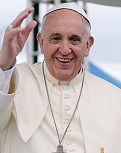

On Feb. 11, 2013 Pope (since 2005) Benedict XVI announces that he's resigning on Feb. 28 (8:00 p.m.) due to ill health, with the soundbyte: "My strengths, due to an advanced age, are no longer suited to an adequate exercise of the Petrine Ministry", becoming the first pope to resign since Gregory XII in 1415; he decided to resign after his Mar. 2012 Mexico-Cuba trip; at 6:00 p.m. hours after his resignation lightning strikes the dome of St. Peter's Basilica; black African Cardinal Peter Kodwo Appiah Turkson (1948-) of Ghana is a crowd favorite for next pope; another candidate is Cardinal Rodriguez Maradiaga of Honduras, an anti-Israel pro-Palestine borderline anti-Semite; on Feb. 21 the Italian newspaper La Repubblica claims that Benedict XVI resigned because "various lobbies within the Holy See were consistently breaking" the 6th and 7th Commandments "thou shalt not commit adultery" and "thou shalt not steal", referring to a gay underground network; on Mar. 12 the papal conclave convenes, and on Mar. 13 on the 5th vote it selects cardinal (since 2001) Jorge Mario Bardoglio of Argentina (of Italian roots, who came in #2 in the 2005 voting) as pope #266 Francis I (1936-) (until ?), becoming the first pope in 600 years to take office after another pope resigns, first South Am. pope, first from the American continent, first non-European pope since Gregory III (731-41), and first Jesuit pope; he appears on the balcony 66 min. after the white smoke; a strategic move to prepare South Am. as a haven for when the Muslims take over Europe?; he refuses to live in the papal apartments in the Apostolic Palace, moving into St. Martha's guesthouse next to St. Peter's Basilica, where he often dines in the common dining room; on Oct. 30 the Italian news mag. Panorama claims that the NSA spied on the conclave - a New Age plant? On June 24 Pope Francis tells the Internat. Jewish Committee on Interreligious Consultations (IJCIC): "Because of our common roots, a true Christian cannot be anti-Semitic." On July 5 Popes Benedict XVI and Francis I issue a religious co-text, saying that faith should serve the "common good" and restating their opposition to same-sex marriage. On July 25 Pope Francis kicks off World Youth Day at Copacabana Beach in Rio de Janeiro, Brazil; on July 25 he receives reps of the Afro-Brazilian Candomble religion in the Municipal Theatre, a first; on July 28 (a.m.) he addresses 3M at a final Mass at Copacabana Beach, and utters the soundbyte "Who am I to judge a gay person?" to reporters on the plane back to Rome, er, "If a person is gay and accepts the Lord and has good will, who am I to judge them?", adding that this only applies if they don't engage in active homosexuality, adding "The tendency is not the problem... they're our brothers." On Aug. 2 (Muslim holiday of Eid al-Fitr) Pope Francis speaks at the Cathedral of Rio de Janeiro, giving a Speech to World Muslims, calling for "mutual respect" between Christianity and Islam, and an end to "unfair criticism" - did I say what I think I said? On Sept. 19 Pope Francis utters the soundbyte that the Church has become "obsessed" with gays, abortion, and contraception to the detriment of its basic mission to be a "home for all", and that the Church can share its views but should not "interfere spiritually" with fags and dikes, er, gays and lesbians. On Nov. 21 Pope Francis meets with Eastern Orthodox leaders, and utters the soundbyte: "Syria, Iraq, Egypt and other areas of the Holy Land sometimes overflow with tears. We won't resign ourselves to a Middle East without Christians who for two thousand years confess the name of Jesus, as full citizens in social, cultural and religious life of the nations to which they belong." On Nov. 26 Pope Francis issues the encyclical Evangelii Gaudium, calling for a renewal of the Church, and attacking the "idolatry of money", stinking himself up with misguided lenient generalizations about Islam, incl.: "Faced with disconcerting episodes of violent fundamentalism, our respect for true followers of Islam should lead us to avoid hateful generalisations, for authentic Islam and the proper reading of the Koran are opposed to every form of violence"; meanwhile the Obama admin. announces that they're closing down their diplomatic post at the Vatican, and merging it with the Italian embassy, citing security concerns. On Dec. 25 Pope Francis delivers his first Christmas message, (Urbi et Orbi), praying for protection for Christians under attack, battered women and trafficked children, peace in the Middle East and Africa, and dignity for refugees fleeing misery and conflict around the globe.

On Mar. 28, 2014 Pope Francis issues a call to the Church to "intensify" its dialogue with Islam. On May 24-26 Pope Francis visits the Holy Land incl. Bethlehem and Jerusalem, where he declares himself the "Che Guevara of the Palestinians", becoming the first pope to fly directly into the West Bank and refer to the "State of Palestine"; on May 25 he makes an unscheduled stop at the security fence in Bethlehem, with "Free Palestine" in large letters facing him, issuing an invitation to host the Israeli and Palestinian presidents for a prayer summit meeting in Vatican City. On June 8 at Pope Francis' instigation, Muslim prayers will be heard from the Vatican for the first time ever supposedly to usher in peace between Israelis and Palestinians to go along with his invitation to Israeli pres. Shimon Peres and PA pres. Mahmoud Abbas to pray with him, which they do on June 8; the Muslim prayer calls for victory over the infidels? - Francis will be the last pope after all? On June 21 Pope Francis excommunicates all members of the Mafia, calling it an example of "the adoration of evil"; a spokesman later says that the ecommunication is theological only. On Aug. 18 Pope Francis endorses the use of force to stop Islamic militants from attacking religious minorities in Iraq, but leaves it to the internat. country to decide how, adding that it is legitimate to "stop the unjust aggressor", but that "to stop" doesn't mean "to bomb". On Sept. 21 Pope Francis gives a Speech on ISIS, with the soundbyte: "May no one use religion as a pretext for actions against human dignity and against the fundamental rights of every man and woman, above all, the right to life and the right of everyone to religious freedom." On Nov. 28 Pope Francis visits Turkey, meeting with pres. Recep Tayyip Erogan and top cleric Mehmet Gormez; on Nov. 29 he visits the Blue Mosque in Constantinople amid the Muslim call to prayer, and prays with his head bowed in the direction of Mecca, going on to betray his predecessor by claiming that Islam shouldn't be equated with violence, and calling for Europe to open up to mass Muslim immigration.
On Jan. 12, 2015 Pope Francis gives his yearly address to the Vatican diplomatic corps, with the soundbyte that religious (Islamic) fundamentalism is a "deviant form of religion... born of a corrupt heart, a heart incapable of recognizing and doing good, of pursuing peace"; "Religious fundamentalism, even before it eliminates human being by perpetrating horrendous killings, eliminates God himself, turning him into a mere ideological pretext", adding "A unanimous reponse is needed"; "I appeal to the entire international community, as I do to the respective governments involved, to take concrete steps to bring about peace and to protect all those who are victims of war and persecution, driven from their homes and their homeland." On Jan. 14-18 Pope Francis visits the Philippines, greeting a record crowd of 6M in Manila on Jan. 18. On Mar. 8 Pope Francis demotes ultraconservative Cardinal Raymond Leo Burke, the highest-ranking U.S. cardinal in the Vatican for his stance against homosexuality. On Mar. 13 (Fri.) Pope Francis releases an interview with Argentine news outlet La Carcova, with the soundbyte: "I have the feeling that my pontificate will be brief, 4 or 5 years, I do not know, even 2 or 3... Two have already passed. It's a somewhat strange sensation... I feel that the Lord has placed me here for a short time, and nothing more." On Mar. 15 (Sun.) Pope Francis gives a speech in St. Peter's Square, lamenting the news of Muslim suicide bombings of churches in Pakistan, and suggesting that the world plays down the fact that Christians are being targeted, with the soundbyte: "Our brothers shed blood only because they are Christians." On Apr. 5 (Easter Sun.) Pope Francis gives an Easter sermon in St. Peter's Square in Rome, condemning indifference and "complicit silence" about jihadist attacks on Christians like in Kenya; on Apr. 6 he utters the soundbyte that there are more martyrs today than in the first centuries. On Apr. 11 (Sun.) Pope Francis beats Pres. Obama to the punch and labels the killing of 1.5M Armenians a century ago "genocide", the "first genocide of the 20th century". On Apr. 16 the Vatican unexpectedly ends the probation of the Leadership Conference of Women Religious, which represents 80% of U.S. nuns andt akes a soft line on birth control and homosexuality while lobbying for Obamacare et al. On May 13 the Vatican announces that it plans to recognize a Palestine state, switching relations from the PLO; on May 16 Pope Francis welcomes Palestinian Authority pres. Mahmoud Abbas, calling him an "angel of peace". On May 19 top Vatican adviser Jeffrey Sachs, dir. of the Earth Inst. at Columbia U. utters the soundbyte that when Pope Francis visits the U.S. in Sept. he will directly challenge the "American idea" of God-given rights embodied in the Declaration of Independence, calling for a OWG and its priorities to eclipse them. On May 24 Pope Francis pub. the Socialist encyclical Laudato Si, co-written by pantheist climate scientist Hans Schellnhuber, calling for solutions to global climate change that are rooted in our "deepest convictions about love, justice, and peace", with the soundbytes: "We have to realize that a true ecological approach always becomes a social approach; it must integrate questions of justice in debates on the environment, so as to hear both the cry of the earth and the cry of the poor"; "Obstructionist attitudes, even on the part of believers, can range from denial of the problem to indifference, nonchalant resignation, or blind confidence in technical solutions"; "The economy accepts every advance in technology with a view to profit, without concern for its potentially negative impact on human beings"; "In light of these considerations, we believe it is both unwise and unjust to adopt policies requiring reduced use of fossil fuels for energy. Such policies would condemn hundreds of millions of our fellow human beings to ongoing poverty. We respectfully appeal to you to advise the world's leaders to reject them"; "We know that technology based on the use of highly polluting fossil fuels... needs to be progressively replaced without delay"; "A true 'ecological debt' exists, particularly between the global north and south... In different ways, developing countries, where the most important reserves of the biosphere are found, continue to fuel the development of richer countries at the cost of their own present and future"; on Apr. 27 An Open Letter to Pope Francis on Climate Change is pub., organized by Carl Beisner of the Cornwall Alliance and signed by 202 mainly scientists, urging Pope Francis to reconsider his views on climate change before issuing the encyclical, containing the soundbytes: "Good climate policy must recognize human exceptionalism, the God-given call for human persons to 'have dominion' in the natural world (Genesis 1:28), and the need to protect the poor from harm, including actions that hinder their ascent out of poverty"; "The models are wrong. They therefore provide no rational basis to forecast dangerous human-induced global warming, and therefore no rational basis for efforts to reduce warming by restricting the use of fossil fuels or any other means."
On June 1, 2015 Pope Senseless, er, Francis gives a speech on tolerance, claiming that the spiritual teachings of the Quran are just as valid as those of the Bible, with the soundbyte: "Jesus Christ, Jehovah, Allah, these are all names employed to describe an entity that is distinctly the same across the world. For centuries blood has been needlessly shed because of the desire to segregate our faiths. This, however, should be the very concept which unites us as people, as nations, and as a world bound by faith. Together we can bring about an unprecedented age of peace. All we need to achieve such a state is respect each others beliefs, for we are all children of God regardless of the name we choose to address him by. We can accomplish miraculous things in the world by merging our faiths, and the time for such a movement is now." On June 10 Pope Francis approves a new Vatican tribunal for trying bishops accused of covering-up or failing to act in cases of child sexual abuse by priests. On June 24 Pope France speaks at St. Peter's Square in Rome, uttering a soundbyte referring to the Gospel of Matthew, where Christ said that marriage is the indissoluble union of a man and a woman, and that those who harm children would be better if a millstone were hung around their necks and they were cast into the sea. On June 26 the Vatican legally recognizes the "State of Palestine" and signs a treaty with it, claiming this will stimulate peace with Israel and become a model to follow; the signers are Vatican foreign minister Paul Gallagher and Palestinian foreign minister Riad al-Malki. On Sept. 1 Pope Francis announces that all priests will be given the discretion to forgive women who have had abortions during the upcoming Jubilee Year (Dec. 8-Nov. 26), whose theme of mercy he announced in Mar. i On Sept. 22-27 Pope Francis visits the U.S., landing in Washington, D.C., becoming the first pope to address the U.S. Congress (joint session); on Sept. 26 he gives a speech outside Independence Hall in Philly, standing at the same lectern that Pres. Lincoln used to deliver the Gettysburg Address. On Sept. 6 as Muslims immigrants flood Europe, Pope Francis calls for a new Crusade, er, orders all Roman Catholic churches in the EU to take in one migrant family each in a gesture of solidarity, starting with Vatican City.
On Jan. 5, 2016 Pope Francis releases his first-ever video message on his monthly prayer intentions, claiming that all faiths are the same and that "we are all children of God". On Jan. 15 Pope Francis meets in a closed door meeting with top Google exec Eric Schmidt, giving conspiracy theorists ammo. In Jan. 2016 Pope Francis appoints Barbara Jatta as the first female dir. of the Vatican Museums (until ?). On Feb. 9 (night) the first Roman Catholic Church service is held in Henry VIII's Hampton Court Palace since the reign of his daughter Queen Mary in 1553-8. On Feb. 10 (Ash Wed.) Pope Francis dispatches an army of 1K super-confessor priests called the Missionaries of Mercy around the world to forgive sins during the Vatican's Jubilee Year, which ends in Nov. On Feb. 12 Pope Francis meets with Russian Orthodox Patriarch Kirill in Cuba, becoming the first meeting between the leaders of the two churches since their split in 1066, er, 1054, with Pope Francis telling him "We are brothers". On Feb. 13 Pope Francis visits Mexico City, Mexico, giving a speech to his bishops denouncing the "insidious threat" of the drug lords. On Feb. 17 Pope Francis visits the U.S.-Mexico border town of Juarez, Mexico, dissing U.S. immigration policy, capitalism, etc., walking up a ramp covered with flowers towards a cross "erected... in memory of migrants who have perished trying to reach the United States just a stone's throw away", uttering the soundbyte: "The flow of capital cannot decide the flow of people"; on Feb. 18 Pope Francis disses Donald Trump, uttering the soundbyte "A person who thinks only about building walls, whatever they may be, and not of building bridges is not Christian", causing Trump to respond that it's "disgraceful" to question a person's religion (except when he does it?), and that when ISIS comes for him he will wish that he was U.S. pres.; meanwhile since 846 the Vatican has been surrounded by high walls to keep out Muslims. On Mar. 3 Pope Francis delivers a speech to French Christians, with the soundbyte: "We can speak today of Arab invasion. It is a social fact.... How many invasions has Europe experienced in the course of its history! But it has always been able to overcome and go ahead, finding themselves increased by the exchange between cultures", adding: "A healthy secularism includes an opening to all forms of transcendence, according to the different religious and philosophical traditions." On Mar. 19 Pope Francis joins Instagram, posting on Twitter: "I am beginning a new journey, on Instagram, to walk with you along the path of mercy and the tenderness of God." On Mar. 24 (Holy Thur.) Pope Francis performs the annual foot-washing ritual at Castelnuovo di Porto near Rome, taking care to incl. Muslim refugees, along with Hindu refugees. On Mar. 27 (Easter Sun.) Pope Francis gives his 2016 Easter Message, urging the world to use the "weapons of love" to combat the evil of "blind and brutal violence". On Apr. 8, 2016 Pope Francis pub. the 260-page paper Amoris Laetitia (On Love in the Family), urging priests to be more accepting of gays and lesbians along with divorce Catholics, dissing the idea of "living in sin". On Apr. 14 the 80-member Pontifical Council for Justice and Peace releases an appeal to Pope Francis, calling on him to pub. a "major teaching document" stating that there is no "just war", reversing the long-held Just War Theory of the Church. On Apr. 16 (Sat.) (6:00 a.m.) Bernie Sanders meets privately with Pope Francis for 5 min. at his residence in the Vatican to discuss a "moral economy"; the pope then visits Lesbos, Greece to meet with Muslim invaders, er, migrants, taking four families (12) back to the Vatican aboard his papal plane. On May 17 Pope Francis gives an interview to La Croix, with the soundbyte: "I don't think that there is a fear of Islam as such but of ISIS and its war of conquest, which is partly drawn from Islam. It is true that the idea of conquest is inherent in the soul of Islam. However, it is also possible to interpret the objective in Matthew's Gospel, where Jesus sends his disciples to all nations, in terms of the same idea of conquest." On May 25 Pope Francis gives a speech in St. Peter's Square about the Islamist terrorist attacks in "beloved Syria", with the soundbbyte that he prays to God to "convert the hearts of those who sow death and destruction." On June 26 Pope Francis utters the soundbyte that Catholics should seek forgiveness from gays for they way they treated them, along with women and child labor. On July 27 after uttering the soundbyte: "This is war. When I speak of war, I speak of real war, not of a war of religion, no. There is war for interests, there is war for money, there is war for the resources of nature, there is war for the domination of peoples: this is war. Someone may think: 'He is talking about a war of religion'. No. All the religions, we want peace. Others want war. Do you understand?" Pope Francis visits the Wawel Cathedral in Cracow, Poland, stinking himself up by totally ignoring the existential threat of Muslim immigration, instead calling for "a spirit of readiness to welcome those fleeing from wars and hunger, and solidarity with those deprived of their fundamental rights, including the right to profess one's faith in freedom and safety"; he then visits Auschwitz Concentration Camp; on Aug. 1 ISIS pub. its mag. Dabiq, dissing the pope for his naivete, assuring him that their sole motivation is religious and sanctioned by Allah in the Quran, with the soundbyte: "The fact is, even if you were to stop bombing us, imprisoning us, torturing us, vilifying us, and usurping our lands, we would continue to hate you because our primary reason for hating you will not cease to exist until you embrace Islam. Even if you were to pay jizyah [tax for infidels] and live under the authority of Islam in humiliation, we would continue to hate you." On Aug. 2 the Vatican announces that Pope Francis has set up a commission to study the possibility of allowing women to become deacons; becoming priests that can celebrate Mass is not on the table. On Nov. 19 Pres. Andrzei Duda and the Roman Catholic bishops of Poland declare Jesus Christ as the king of Poland in a ceremony at the Church of Divine Mercy in Cracow, calling upon him to rule over their nation; meanwhile Pope Francis elevates Detroit, Mich.-born archbishop of Indianapolis, Ind. (since 2012) Joseph William Tobin (1952-) to cardinal as a "surprise pick" and "political message" because he's a critic of Ind. gov. Mike Pence, who wants to bar Syrian refugees from the state; in 2017 he moves to Newark, N.J. On Dec. 26 Pope Francis gives his Feast of St. Stephen blessing in St. Peter's Square, uttering the soundbyte that there are more Christian martyrs now than in the early days of the Church.
On Feb. 26, 2017 Italian newspaper Corriere della Sera announces that the Vatican has hired the law firm of Baker McKenzie to protect its copyright on Pope Francis. On May 20 Pres. Trump begins a 9-day trip, starting with a visit to Saudi Arabia to discuss a $110B-$350B 10-year arms deal to counter Iran, receiving a royal welcome; his speech goes mainstream, backing down from his anti-Muslim campaign rhetoric while urging Arab leaders to "fight Islamic extremism" (not "radical Islamic terrorism"); he gives the Saudi king a handshake instead of bowing like Pres. Obama; First Lady Melania Trump and daughter Ivanka are given a pass on wearing a headscarf; on after ending the Saudi prohibition on flying directly there from Meccaland, May 22 Trump visits Israel, meeting with PM Benjamin Netanyahu, his wife Sara, pres. Reuven Rivlin, and members of the cabinet, praying at the Western Wall (first U.S. pres.) and visiting the Church of the Holy Sepulchre; on May 23 he visits Bethlehem in the West Bank; on May 23 (8:00 a.m.) he visits Pope Francis in the Vatican, who doesn't talk or smile at first, during which visit First Lady Melania reveals that she's a devout Roman Catholic, with the pope giving Trump a copy of his May 24, 2015 encyclical "Laudato Si" preaching climate change theory, and Trump giving the pope a set of books by MLK Jr., a piece of granite from his memorial, and a sculpture representing "hope for a peaceful tomorrow"; on May 25 Trump visits Brussels, where the Marxist leftist overlords give him an icy reception. On Nov. 9 the Vatican announces that it is banning the sale of cigarettes but not cigars; cigarettes had been sold at a reduced price to employees and pensioners. On Dec. 25 (Mon.) Pope Francis delivers his Christmas 2017 Message, calling for a 2-state solution to Israel and the Palestinians.
On Jan. 15, 2018 (night) Pope Francis arrives in Santiago, Chile, where he faces protests over failure to punish child molesting priest Fernando Karadima. On Mar. 28 despite a personal appeal by Canadian PM Justin Trudeau, Pope Francis refuses to apologize for the Roman Catholic Church role in the Canadian system that forced generations of indigenous children into boarding schools, which was called cultural genocide by a 2015 nat. Truth and Reconciliation Commission. On Mar. 29 the Vatican releases a statement about a private meeting between Pope Francis and the founder of the La Repubblica newspaper in which he allegedly denied the existence of Hell, claiming the transcription is not faithful but failing to disavow the pope's alleged statement - it's where I'm gonna go when I die? On Mar. 30 Pope Francis makes a prayer during the Good Friday Via Crucis at the Colosseum in Rome, telling Christians that they should express shame for the actions of those who are leaving future generations a world "fractured by divisions and wars". On Apr. 1 Pope Francis delivers his 2018 Easter Message, calling for an end to "the ongoing extermination in Syria, and for "reconciliation in the Holy Land". On Apr. 9 prominent Dutch Roman Catholics pub. a petition their bishops to warn Pope Francis about his "serious errors" against the faith and his "destructive polities", incl. adulterous couples to receive Communion, support for female deacons, married priests, and contraception, praise for Martin Luther, and deals with the Red Chinese to recognize their atheist Catholic Patriotic Assoc. On Apr. 11 a letter from Pope Francis to the bishops of Chile is pub., apologizing for "grave errors" in the handling of sexual abuse cases there and inviting reps of the abuse victims to visit Rome so he can apologize. On June 2 Pope Francis holds a conference in the Vatican with the heads of Exxon, Mobil, Eni, and BP, telling them to quit pumping and shift to clean energy. On July 9 Pope Francis hosts a conference at the Vatican with oil co. execs, urging them to get with it and follow his 2015 climate change encyclical "Laudato Si" despite it not being obligatory. On Dec. 14 Pope Francis delivers a speech at a Vatican Christmas concert, saying that migrants are trying to "escape wars, miseries caused by social injustices and climate change."
On Feb. 3-5, 2019 Pope Francis visits Abu Dhabi, UAE, meeting with the grand imam of Al-Azhar Ahmed El-Tayed for the 2nd time (first in 2017), a lame attempt at aping the 1219 trip of St. Francis of Assisi to Sultan Malik el Kamil in Egypt, becoming the first pope to visit the Arabian Peninsula, signing a joint statement on Feb. 4 titled "A Document on Human Fraternity for World Peace and Living Together", then celebrating Mass in the Abu Dhabi stadium on Feb. 5 before 150K; Il Folio cultural ed. Giulio Meotti pub. an article criticizing the pope for his silence over the persecution and destruction of Christian communities in the Muslim World. On Feb. 21-24 amid grumbling about being too little too late, a child sex abuse conference at the Vatican, attended by 200 is opened by Pope Francis, who says that victims deserve "concrete nd efficient measures" and not mere condemnations, with Bogota Cardinal Ruben Salazar Gomez uttering the soundbyte: "The first enemies are within us, among us bishops and priests and consecrated persons who have not lived up to our vocation. We have to recognize that the enemy is within." On May 28 Pope Francis gives an interview to Mexican network Televisa, uttering the soundbyte tht the U.S.-Mexico border wall is like the Berlin Wall; "We knew of one, of Berlin [Wall], and the many headaches and suffering it caused us, but it appears that man does what animals don't, right? Man is the only animal that falls twice into the same hole, right? We are returning to the same thing, right? Building walls as if it were a defense, right? Defense is dialogue, growth, acceptance and education, integration, and the healthy but human limit of 'no more than this'", saying that he would say to Pres. Trump: "He who builds walls winds up a prisoner of the walls he builds." On June 5 Pope Francis changes the phrase phrase "lead us not into temptation" into "do not let us fall into temptation" in the Lord's Prayer (Matt. 6:13). On June 14 Pope Francis speaks at a conference in the Vatican, with the soundbyte that the world has reached a "critical moment" in reacting to the threat of climate change: "Dear friends, time is running out! We cannot afford the luxury of waiting for others to come forward or of prioritizing short-term economic benefits. The climate crisis requires decisive action from us, here and now." On July 4 Russian pres. Vladimir Putin meets with Pope Francis at the Vatican, becoming their 3rd. On Sept. 1 (Sun.) (World Day of Prayer for the Care of Creation), Pope Francis writes the soundbyte that this is "a season to reflect on our lifestyles" incl. how we "act like tyrants with regards to creation", calling for "prophetic actions" to save the Earth by adopting "more simple and respectful lifestyles" and "abandon our dependence on fossil fuels" while moving "quickly and decisively towards forms of clean energy and a sustainable and circular economy", concluding: "Melting of glaciers, scarcity of water, neglect of water basins and the considerable presence of plastic and microplastics in the oceans are equally troubling, and testify to the urgent need for interventions that can no longer be postponed. We have caused a climate emergency that gravely threatens nature and life itself, including our own." On Sept. 5 Pope Francis visits Mozambique, meeting with 24 Jesuits and endorsing a 2017 essay criticizing relations between Evangelical Protestants and Roman Catholics in the U.S. as an "ecumenism of hate", suggesting that the Protestants "cannot really be defined as Christian." On Oct. 6-17 the Vatican Pan-Amazon Synod seeks to secularize the Church and make it more palatable to Amazon natives, causing Cardinal Raymond Burke to call it an "apostasy" that "cannot become the teaching of the Church". On Dec. 25 Pope Francis delivers his 2019 Christmas Address, claiming that "rigid" conservative Catholics are creating a "minefield" of "hatred".
On Feb. 9, 2020 Pope Francis condemns human trafficking as a "true plague", calling for an internat. effort to eradicate it.
On Oct. 3, 2020 Pope Francis issues the encyclical All Brothers: On Fraternity and Social Friendship (Fratelli tutti: sulla fraternitŕ e l'amicizia sociale), "a sequel to his controversial [2019] Abu Dhabi pact with Grand Imam Ahmad al-Tayyeb last year, and will cite Abu Mazen [Mahmoud Abbas], a Palestinian backer of terrorism, as an example of 'peace' and 'fraternity'"; he calls for a New World Order led by the U.N.?
On Oct. 25, 2020 (Sun.) Pope Francis names 13 new cardinals, incl. Archbishop Wilton Gregory of Washington, D.C., who becomes the first African-Am.; the ceremony will takes place on Nov. 28.
On Mar. 18, 2022 Pope Francis gives a speech, with the soundbytes: "A war is always always! the defeat of humanity, always. We, the educated, who work in education, are defeated by this war, because on another side we are responsible", and "There is no such thing as a just war; they do not exist."
On Dec. 11, 2022 Pope Francis gives a Lady of Guadalupe Mass, warning of omens of destruction for mankind.
On Jan. 24, 2023 Pope Frances gives an interview to the Associated Press, calling homosexuality a sin then critidizing laws criminalizing it as "unjust", with the soundbyte "Homosexuality isn't a crime" because God loves all his children as they are, calling on Roman Catholic bishops to support laws welcoming LGBTQ people into the church.
On Feb. 9, 2023 Pope Francis condemns human trafficking as a "true plague", calling for an internat. effort to eradicate it.
On Feb. 23, 2023 Pope Francis declares that pedophilia is a mysterious disease that Roman Catholics must not judge, but must accept that God loves them and has a special place in heaven for them - up his ass?
On Oct. 4, 2023 Pope Francis pub. a Papal Exhortation on the Climate Crisis, calling on Roman Catholics to make "a broad change in the irresponsible lifestyle connected with the Western model", incl. "a decisive acceleration of energy transition" from fossil fuels to renewable energy, but cautioning against carbon capture, which he likens to "pushing a snowball down a hill", claiming that without profound changes in lifestyles and decisive action the world will face "the point of no return", concluding: "Our responses have not been adequate, while the world in which we live is collapsing and may be nearing the breaking point" - where did he get his mail-order doctorate in climate pseudoscience?
On Dec. 19, 2023 reversing the longstanding policy, Pope Francis declares that the Church may now bless same-sex couples as long as they aren't called unions and blessed via liturgical rites that resemble the sacrament of marriage.
On Jan. 2, 2024 Pope Francis announces that "diversity in the Church" is his prayer intention for Jan. 2024.
On May 28, 2024 Pope Francis utters the soundbyte that Roman Catholic seminaries are too full of "faggotry" and that fags should be excluded from the priesthood - only choir boys allowed?
On June 13-15, 2024 the 2024 (50th) G7 Summit in Apulia, Italy discusses the ethical implications of AI; on June 15 Pope Francis becomes the firt pope to participate in a G7 summit; on June 14 before flying to the summit, Pope Francis meets with 100+ comedians from 15 countries, with the soundbyte: "In the midst of so much gloomy news, immersed as we are in many social and even personal emergencies, you have the power to spread peace and smiles."
Peter the Roman (Petrus Romanus), where are you?